Poetry About Travel: 21 Most Inspiring Travel Poems
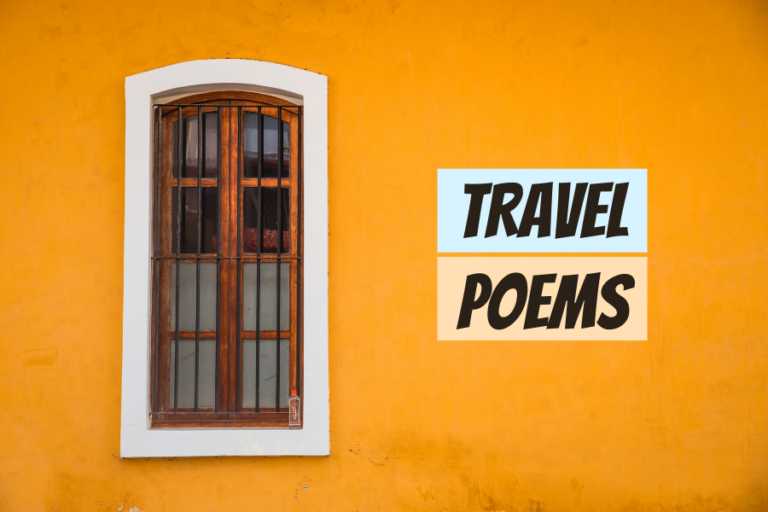
Are you looking for beautiful poetry about travel? Then you have come to the right place! This post features some of the most inspiring travel poems out there.
Travel experiences are often shared in blog posts, videos, books, songs or quotes , but poetry about travel is a bit harder to find. Poetry is a beautiful way to capture how travel makes us feel though, and there are some amazing poems about travel and adventure out there!
I collected 21 of the most beautiful travelling poems in this post. Let me know in the comments if you think there’s a beautiful poem that’s missing from this list, as I’m updating it frequently!

Poetry About Travel: The Most Beautiful Travel Poems

1. The Farewell by Kahlil Gibran
Even though the poetry about travel in this list is in no particular order, the first poem I had to think of was The Farewell by Kahlil Gibran (1883-1931). This beautiful poem can be found in Gibran’s book The Prophet , which is one of the most translated books in history.
I only included my favourite part in this post, as the poem is quite long, but you can read the full version on the link below.
We wanderers, ever seeking the lonelier way, begin no day where we have ended another day; and no sunrise finds us where sunset left us. Even while the earth sleeps we travel. We are the seeds of the tenacious plant, and it is in our ripeness and our fullness of heart that we are given to the wind and are scattered.
Read the full version of Farewell here

2. Freedom by Olive Runner
This short but powerful travel poem by Olive Runner embraces the feeling of freedom that can be found in travelling. It’s one of the most inspiring poems about exploring the world.
Give me the long, straight road before me, A clear, cold day with a nipping air, Tall, bare trees to run on beside me, A heart that is light and free from care. Then let me go! – I care not whither My feet may lead, for my spirit shall be Free as the brook that flows to the river, Free as the river that flows to the sea.
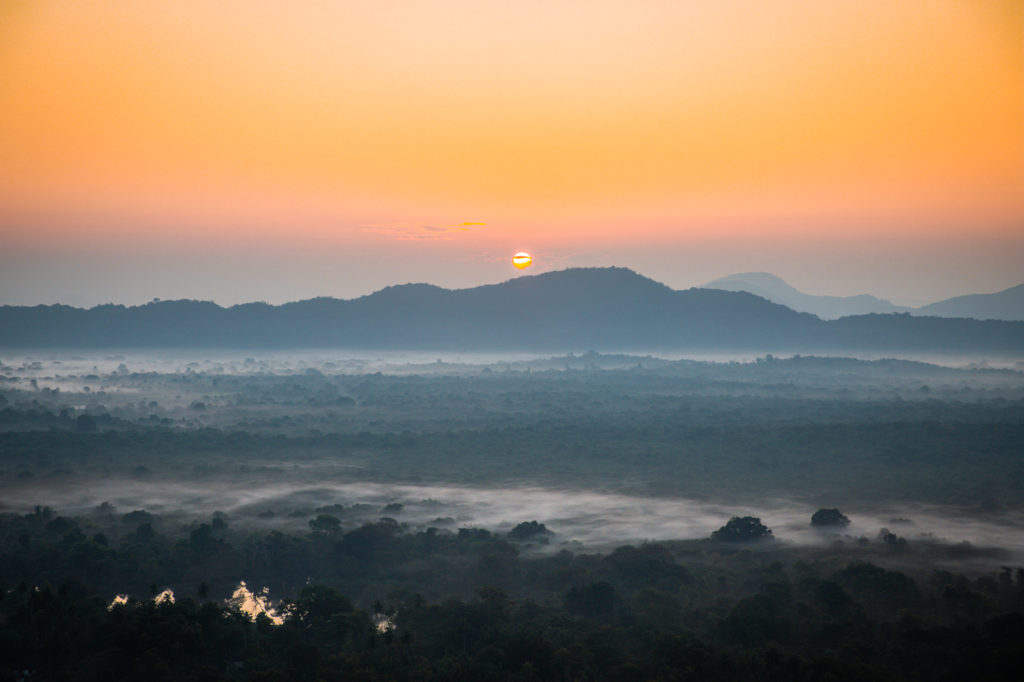
3. Song of the Open Road by Walt Whitman
The main themes in Whitman’s (1819-1892) Song of the Open Road are freedom, joy and independence. This piece of travel poetry inspires us to be free from expectations, follow our own path and enjoy life – it holds a very beautiful message if you’re asking me!
Afoot and light-hearted I take to the open road, Healthy, free, the world before me,
The long brown path before me leading wherever I choose.
Henceforth I ask not good-fortune, I myself am good-fortune, Henceforth I whimper no more, postpone no more, need nothing, Done with indoor complaints, libraries, querulous criticisms, Strong and content I travel the open road.
The earth, that is sufficient, I do not want the constellations any nearer, I know they are very well where they are, I know they suffice for those who belong to them.

4. A Song of Joys by Walt Whitman
You can find the last part of A Song of Joys by Walt Whitman (1819-1892) below. In this poem, Whitman describes different types of people and what brings joy to them. The last part speaks about the joy of travelling and exploring.
You can find the entire poem on the link below if you want to read the entire piece.
O to sail in a ship, To leave this steady unendurable land, To leave the tiresome sameness of the streets, the sidewalks and the houses, To leave you, O you solid motionless land, and entering a ship, To sail and sail and sail! O to have my life henceforth a poem of new joys! To dance, clap hands, exult, shout, skip, leap, roll on, float on, To be a sailor of the world, bound for all ports, A ship itself, (see indeed these sails I spread to the sun and air,) A swift and swelling ship, full of rich words—full of joys.
Read the full version here

5. Travelling Again by Du Fu
Often called “the Poet-Historian”, Du Fu (712-770 AD) is considered one of the greatest Chinese poets. His poem Traveling Again was written in 761 AD, which makes it the oldest of the travelling poems on this list. Fu wrote it during his second visit to a temple in a turbulent time for his country.
Temple remember once travel place Bridge remember again cross time River mountain like waiting Flower willow become selfless Country vivid mist shine thin Sand soft sun colour late Traveller sorrow all become decrease Stay here again what this
I remember the temple, this route I’ve travelled before, I recall the bridge as I cross it again. It seems the hills and rivers have been waiting, The flowers and willows all are selfless now. The field is sleek and vivid, thin mist shines, On soft sand, the sunlight’s colour shows it’s late. All the traveller’s sorrow fades away, What better place to rest than this?

6. Hearthside by Dorothy Parker
In Hearthside by Dorothy Parker (1893-1967), someone is sitting by a fire and thinking about all the places they will never see. It’s a touching piece of travel poetry that makes you dream about visiting places you haven’t been to (yet).
Half across the world from me Lie the lands I’ll never see- I, whose longing lives and dies Where a ship has sailed away; I, that never close my eyes But to look upon Cathay.
Things I may not know nor tell Wait, where older waters swell; Ways that flowered at Sappho’s tread, Winds that sighed in Homer’s strings, Vibrant with the singing dead, Golden with the dust of wings.
Under deeper skies than mine, Quiet valleys dip and shine. Where their tender grasses heal Ancient scars of trench and tomb I shall never walk: nor kneel Where the bones of poets bloom.
If I seek a lovelier part, Where I travel goes my heart; Where I stray my thought must go; With me wanders my desire. Best to sit and watch the snow, Turn the lock, and poke the fire.
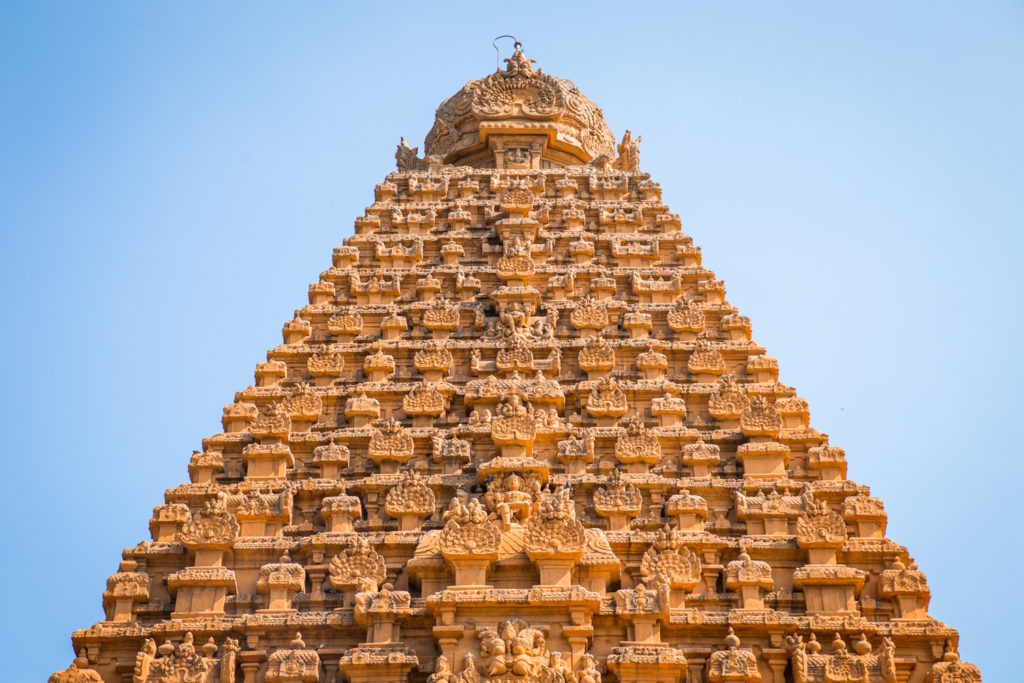
7. The Road Not Taken by Robert Frost
A list full of poetry about travel wouldn’t be complete without The Road Not Taken . This deep poem by Robert Frost (1874-1963) talks about how the choices we make, no matter how small they may seem, can impact and shape our lives.
This is one of the most famous poems in the world, where the speaker chooses to take the “road less travelled by”. He/she doesn’t choose the life most people choose and thanks to this, the speaker of this poem is often celebrated for their individualism.
Two roads diverged in a yellow wood, And sorry I could not travel both And be one traveler, long I stood And looked down one as far as I could To where it bent in the undergrowth;
Then took the other, as just as fair, And having perhaps the better claim, Because it was grassy and wanted wear; Though as for that the passing there Had worn them really about the same,
And both that morning equally lay In leaves no step had trodden black. Oh, I kept the first for another day! Yet knowing how way leads on to way, I doubted if I should ever come back.
I shall be telling this with a sigh Somewhere ages and ages hence: Two roads diverged in a wood, and I— I took the one less traveled by, And that has made all the difference.
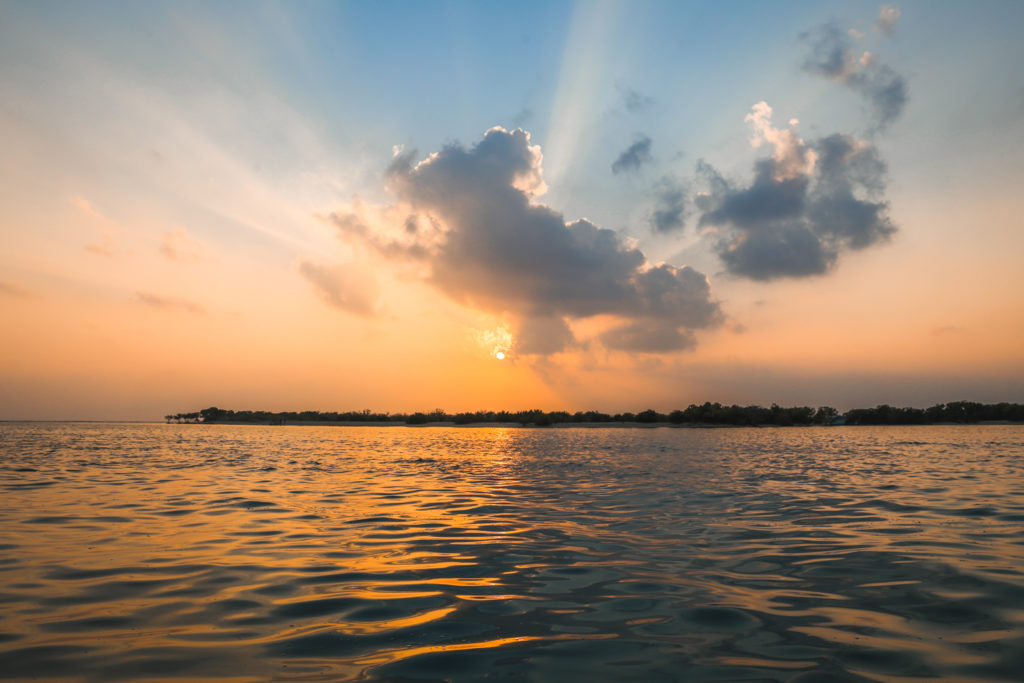
8. Eldorado by Edgar Allan Poe
Edgar Allan Poe (1809-1849) was my favourite poet as a teenager, and he’s still one of my favourite poets today. It’s believed that Eldorado is one of his last poems, as he wrote it six months before his death.
Eldorado tells the story of a knight who travels in search of a city of gold. According to scholars, parallels can be seen between the knight’s quest in this poem and Poe’s quest to find happiness in his life.
Gaily bedight, A gallant knight, In sunshine and in shadow, Had journeyed long, Singing a song, In search of Eldorado. But he grew old – This knight so bold – And o’er his heart a shadow Fell, as he found No spot of ground That looked like Eldorado. And, as his strength Failed him at length, He met a pilgrim shadow – ‘Shadow,’ said he, ‘Where can it be – This land of Eldorado?’ ‘Over the Mountains Of the Moon, Down the Valley of the Shadow, Ride, boldly ride,’ The shade replied, ‘If you seek for Eldorado!’

9. Rootless by Jenny Xie
In Rootless , Jenny Xie describes what she sees on a sleeper train between Hanoi and Sapa in Vietnam. The landscapes around the speaker constantly change while he/she is the only constant.
Between Hanoi and Sapa there are clean slabs of rice fields and no two brick houses in a row.
I mean, no three— See, counting’s hard in half-sleep, and the rain pulls a sheet
over the sugar palms and their untroubled leaves. Hours ago, I crossed a motorbike with a hog strapped to its seat,
the size of a date pit from a distance. Can this solitude be rootless, unhooked from the ground?
No matter. The mind resides both inside and out. It can think itself and think itself into existence.
I sponge off the eyes, no worse for wear. My frugal mouth spends the only foreign words it owns.
At present, on this sleeper train, there’s nowhere to arrive. Me? I’m just here in my traveller’s clothes, trying on each passing town for size.

10. Travel by Robert Louis Stevenson
This travel poem by Robert Louis Stevenson (1850-1894) talks about the dreams and ambitions of a young boy who wants to travel around the world when he grows up. It’s part of Stevenson’s collection A Child’s Garden of Verses .
I should like to rise and go Where the golden apples grow;— Where below another sky Parrot islands anchored lie, And, watched by cockatoos and goats, Lonely Crusoes building boats;— Where in sunshine reaching out Eastern cities, miles about, Are with mosque and minaret Among sandy gardens set, And the rich goods from near and far Hang for sale in the bazaar,— Where the Great Wall round China goes, And on one side the desert blows, And with bell and voice and drum Cities on the other hum;— Where are forests, hot as fire, Wide as England, tall as a spire, Full of apes and cocoa-nuts And the negro hunters’ huts;— Where the knotty crocodile Lies and blinks in the Nile, And the red flamingo flies Hunting fish before his eyes;— Where in jungles, near and far, Man-devouring tigers are, Lying close and giving ear Lest the hunt be drawing near, Or a comer-by be seen Swinging in a palanquin;— Where among the desert sands Some deserted city stands, All its children, sweep and prince, Grown to manhood ages since, Not a foot in street or house, Not a stir of child or mouse, And when kindly falls the night, In all the town no spark of light. There I’ll come when I’m a man With a camel caravan; Light a fire in the gloom Of some dusty dining-room; See the pictures on the walls, Heroes, fights and festivals; And in a corner find the toys Of the old Egyptian boys.

11. Dislocation by Simon Constam
Simon Constam wrote this beautiful travel poem during his round-the-world trip when he was 19. It’s about the difference between travelling long term and going on a holiday, which are two different things.
Long-term travel comes with its difficulties and challenges, and it’s different from vacationing.
I envy those who envy me for traveling. Sometimes I sit on a foreign street in a busy cafe, imagining you wishing you were here, feeling for the first time the thrilling flush of wanting to be elsewhere, the frisson of happiness that wishes bring. And so I sit quietly knowing that now it’s time to figure out just what it is I meant to do here.

12. Questions of travel by Elizabeth Bishop
In the poem Questions of Travel , Elizabeth Bishop (1911-1979) touches on subjects like travel, home, conflict and regret. This piece of travel poetry is one that depicts the pros and cons of travelling, and why we do it.
There are too many waterfalls here; the crowded streams hurry too rapidly down to the sea, and the pressure of so many clouds on the mountaintops makes them spill over the sides in soft slow-motion, turning to waterfalls under our very eyes. –For if those streaks, those mile-long, shiny, tearstains, aren’t waterfalls yet, in a quick age or so, as ages go here, they probably will be. But if the streams and clouds keep travelling, travelling, the mountains look like the hulls of capsized ships, slime-hung and barnacled.
Think of the long trip home. Should we have stayed at home and thought of here? Where should we be today? Is it right to be watching strangers in a play in this strangest of theatres? What childishness is it that while there’s a breath of life in our bodies, we are determined to rush to see the sun the other way around? The tiniest green hummingbird in the world? To stare at some inexplicable old stonework, inexplicable and impenetrable, at any view, instantly seen and always, always delightful? Oh, must we dream our dreams and have them, too? And have we room for one more folded sunset, still quite warm?
But surely it would have been a pity not to have seen the trees along this road, really exaggerated in their beauty, not to have seen them gesturing like noble pantomimists, robed in pink. –Not to have had to stop for gas and heard the sad, two-noted, wooden tune of disparate wooden clogs carelessly clacking over a grease-stained filling-station floor. (In another country the clogs would all be tested. Each pair there would have identical pitch.) –A pity not to have heard the other, less primitive music of the fat brown bird who sings above the broken gasoline pump in a bamboo church of Jesuit baroque: three towers, five silver crosses. –Yes, a pity not to have pondered, blurr’dly and inconclusively, on what connection can exist for centuries between the crudest wooden footwear and, careful and finicky, the whittled fantasies of wooden footwear and, careful and finicky, the whittled fantasies of wooden cages. –Never to have studied history in the weak calligraphy of songbirds’ cages. –And never to have had to listen to rain so much like politicians’ speeches: two hours of unrelenting oratory and then a sudden golden silence in which the traveller takes a notebook, writes:
“Is it lack of imagination that makes us come to imagined places, not just stay at home? Or could Pascal have been not entirely right about just sitting quietly in one’s room?
Continent, city, country, society: the choice is never wide and never free. And here, or there . . . No. Should we have stayed at home, wherever that may be?”

13. For the Traveler by John O’Donohue
In For the Traveler , John O’Donohue (1956-2008) describes how travelling can change us, and how enriching it is. This poem is about exploring, going on a journey and coming back as a different person – something I can relate to!
Every time you leave home, Another road takes you Into a world you were never in.
New strangers on other paths await. New places that have never seen you Will startle a little at your entry. Old places that know you well Will pretend nothing Changed since your last visit.
When you travel, you find yourself Alone in a different way, More attentive now To the self you bring along, Your more subtle eye watching You abroad; and how what meets you Touches that part of the heart That lies low at home:
How you unexpectedly attune To the timbre in some voice, Opening in conversation You want to take in To where your longing Has pressed hard enough Inward, on some unsaid dark, To create a crystal of insight You could not have known You needed To illuminate Your way.
When you travel, A new silence Goes with you, And if you listen, You will hear What your heart would Love to say.
A journey can become a sacred thing: Make sure, before you go, To take the time To bless your going forth, To free your heart of ballast So that the compass of your soul Might direct you toward The territories of spirit Where you will discover More of your hidden life, And the urgencies That deserve to claim you.
May you travel in an awakened way, Gathered wisely into your inner ground; That you may not waste the invitations Which wait along the way to transform you.
May you travel safely, arrive refreshed, And live your time away to its fullest; Return home more enriched, and free To balance the gift of days which call you.

14. The Return by Geneen Marie Haugen
Similarly to For the Traveler (#13 on this list), The Return speaks about coming back from a journey as a different person. The difference, however, is that this poem focuses on other people’s points of view, including people’s prejudice and expectations.
Some day, if you are lucky, you’ll return from a thunderous journey trailing snake scales, wing fragments and the musk of Earth and moon .
Eyes will examine you for signs of damage, or change and you, too, will wonder if your skin shows traces
of fur, or leaves, if thrushes have built a nest of your hair, if Andromeda burns from your eyes.
Do not be surprised by prickly questions from those who barely inhabit their own fleeting lives, who barely taste their own possibility, who barely dream.
If your hands are empty, treasureless, if your toes have not grown claws, if your obedient voice has not become a wild cry, a howl,
you will reassure them. We warned you, they might declare, there is nothing else, no point, no meaning, no mystery at all, just this frantic waiting to die.
And yet, they tremble, mute, afraid you’ve returned without sweet elixir for unspeakable thirst, without a fluent dance or holy language to teach them, without a compass bearing to a forgotten border where no one crosses without weeping for the terrible beauty of galaxies
and granite and bone. They tremble, hoping your lips hold a secret, that the song your body now sings will redeem them, yet they fear
your secret is dangerous, shattering, and once it flies from your astonished mouth, they — like you — must disintegrate before unfolding tremulous wings.
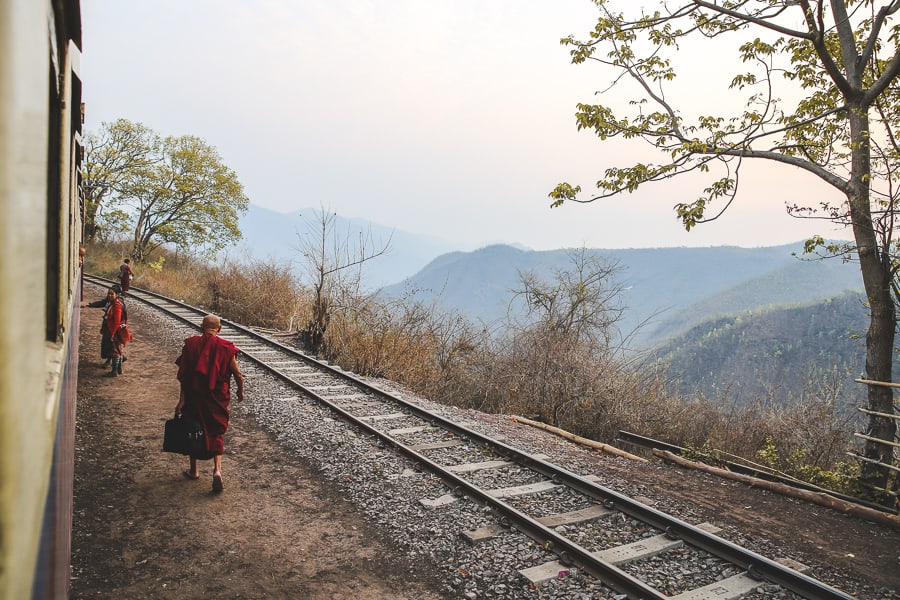
15. Travel by Edna St. Vincent Millay
In this beautiful piece of travel poetry by Edna St. Vincent Millay (1892 – 1950), the narrator longs to escape from their everyday life. They hear how the train goes by in the distance and dream about how it could take them somewhere new.
The railroad track is miles away, And the day is loud with voices speaking, Yet there isn’t a train goes by all day But I hear its whistle shrieking.
All night there isn’t a train goes by, Though the night is still for sleep and dreaming, But I see its cinders red on the sky, And hear its engine steaming.
My heart is warm with the friends I make, And better friends I’ll not be knowing, Yet there isn’t a train I wouldn’t take, No matter where it’s going.

16. Traveling by Nayyirah Waheed
Nayyirah Waheed has been described as “the most famous poet on Instagram”, as her poems are frequently shared on this platform.
Apart from her poems, not much is known about Waheed. She doesn’t reveal many details about her life and describes herself as a “quiet poet” – which is quite fascinating! Waheed’s poem Traveling is a beautiful example of her repertoire.
be insecure in peace. allow yourself lowness. know that it is only a country on the way to who you are.
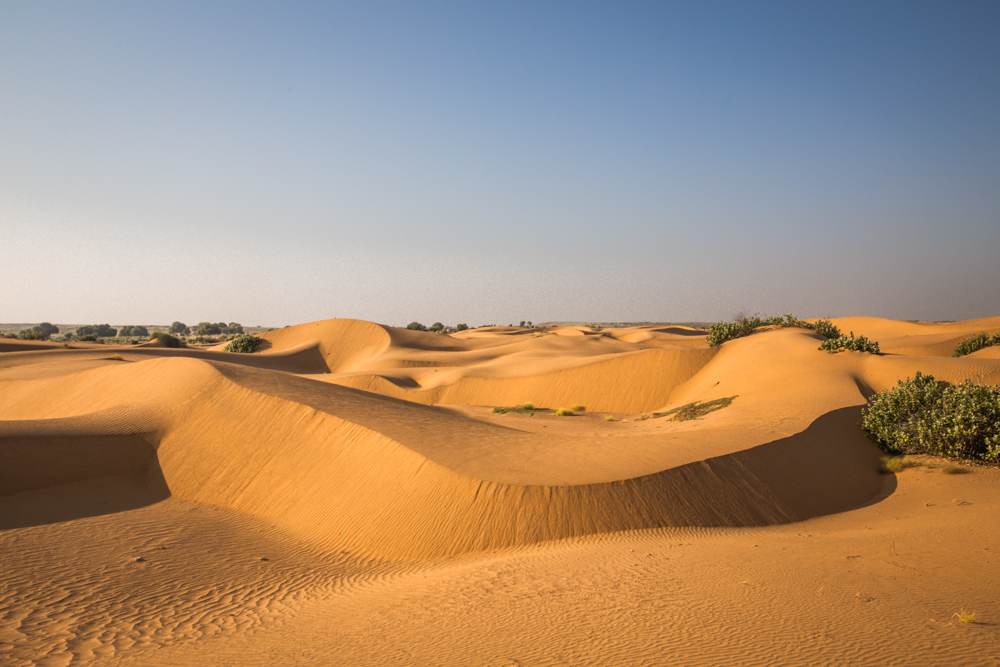
17. On the World by Francis Quarles
On the World is another short and beautiful travel poem that describes the life of a traveller.
The world’s an Inn; and I her guest. I eat; I drink; I take my rest. My hostess, nature, does deny me Nothing, wherewith she can supply me; Where, having stayed a while, I pay Her lavish bills, and go my way.
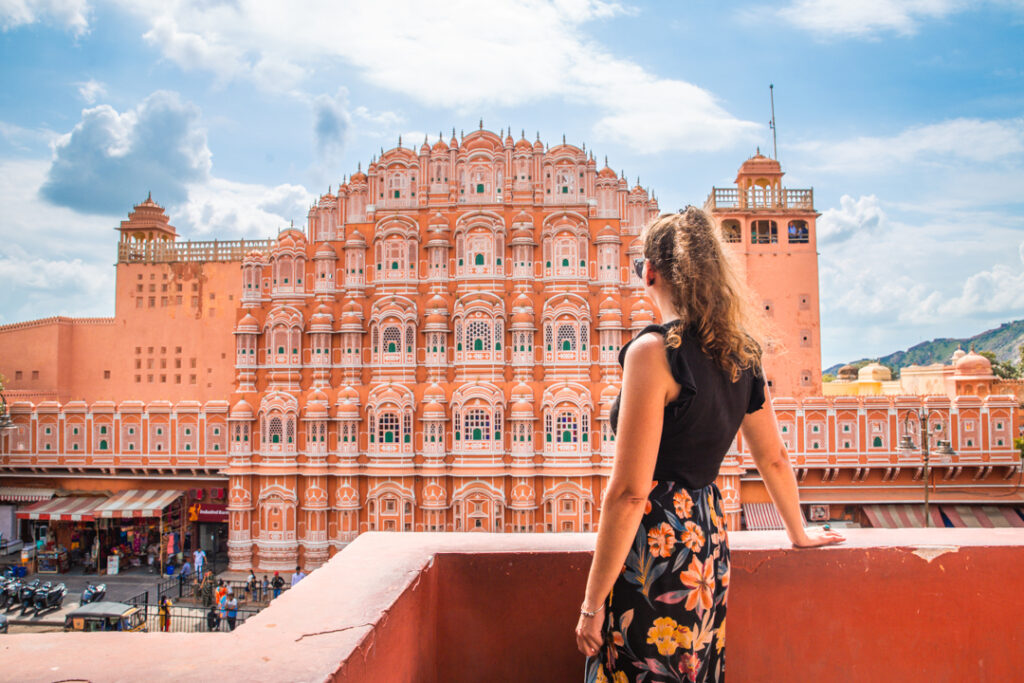
18. Why Do I Travel by an unknown author
If you love traveling, you might relate to this poem which explains why the author travels. This piece is about what travel is all about, the adventure and the lessons it brings.
It is on the road that my inner voice speaks the loudest and my heart beats the strongest. It is on the road that I take extra pride in my wooly hair, full features and lineage. It is on the road that I develop extra senses and the hairs on my arms stand up and say “Sana, don’t go there”, and I listen. It’s when I safety pin my money to my underclothes and count it a million times before I go to sleep. It is on the road that I am a poet, an ambassador, a dancer, medicine woman, an angel and even a genius. It’s on the road that I am fearless and unstoppable and if necessary ball up my fist and fight back. It is on the road that I talk to my deceased parents and they speak back. It’s on the road that I reprimand myself, and set new goals, refuel, stop and begin again. It is on the road that I experience what freedom truly is. It is my travel that has transformed me making me a citizen of the world. When my humanness, compassion and affection are raised to a new level and I share unconditionally.
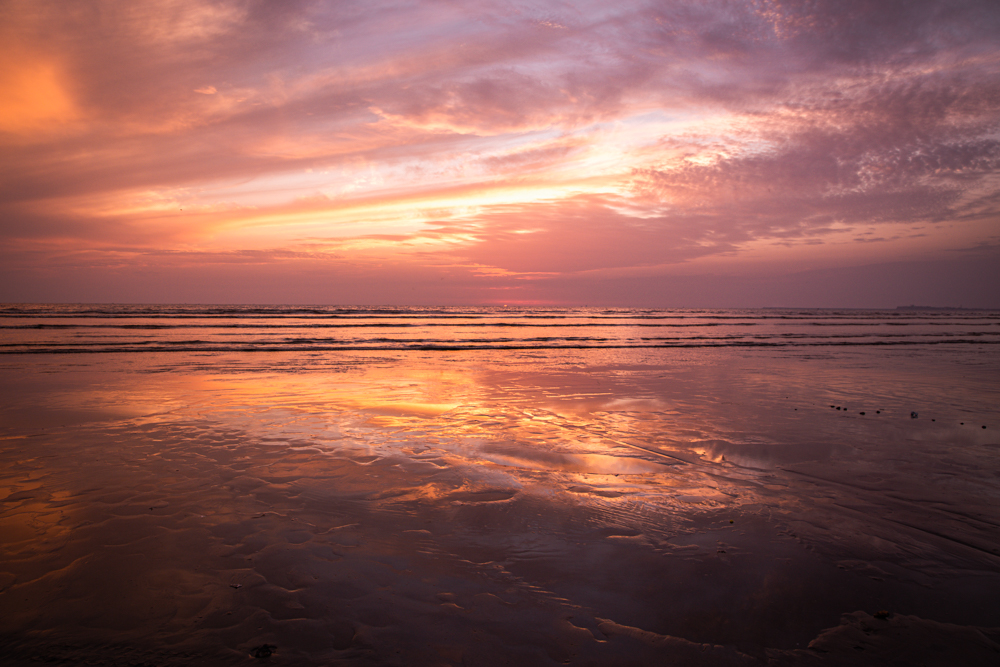
19. If Once You’ve Slept on an Island by Rachel Field
This beautiful poem talks about how travel changes you and how you will not be the same after sleeping on an island.
If once you have slept on an island You’ll never be quite the same; You may look as you looked the day before And go by the same old name, You may bustle about in street and shop You may sit at home and sew, But you’ll see blue water and wheeling gulls Wherever your feet may go. You may chat with the neighbors of this and that And close to your fire keep, But you’ll hear ship whistle and lighthouse bell And tides beat through your sleep. Oh! you won’t know why and you can’t say how Such a change upon you came, But once you have slept on an island, You’ll never be quite the same.
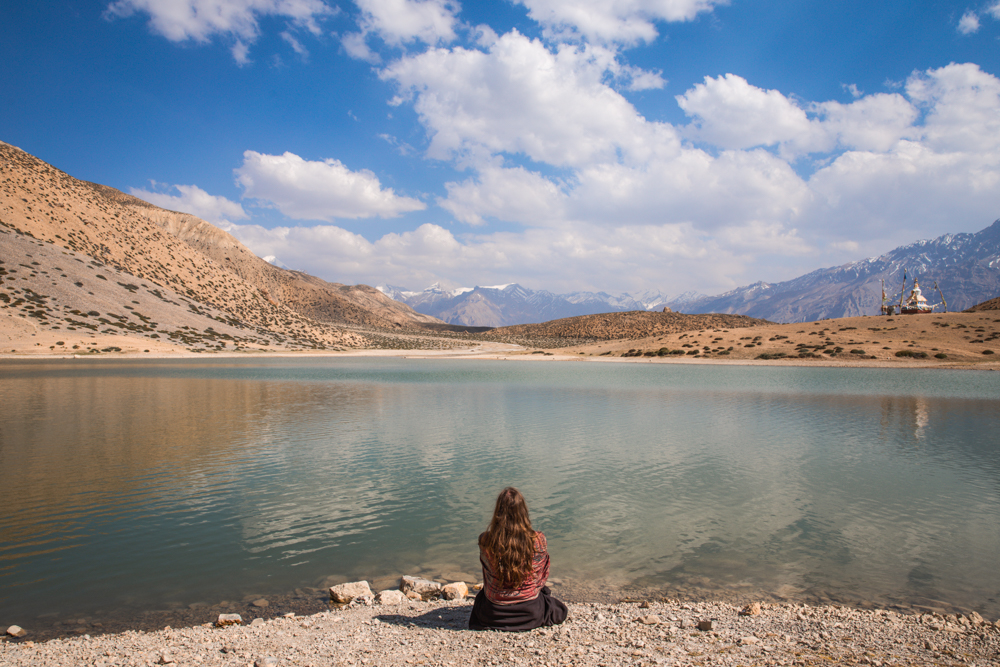
20. Die Slowly by Martha Medeiros
Although this poem covers more than travel alone, it’s incredibly relatable!
He who does not travel, who does not read, who can not hear music, who does not find grace in himself, she who does not find grace in herself, dies slowly.
He who slowly destroys his own self-esteem, who does not allow himself to be helped, who spends days on end complaining about his own bad luck, about the rain that never stops, dies slowly.
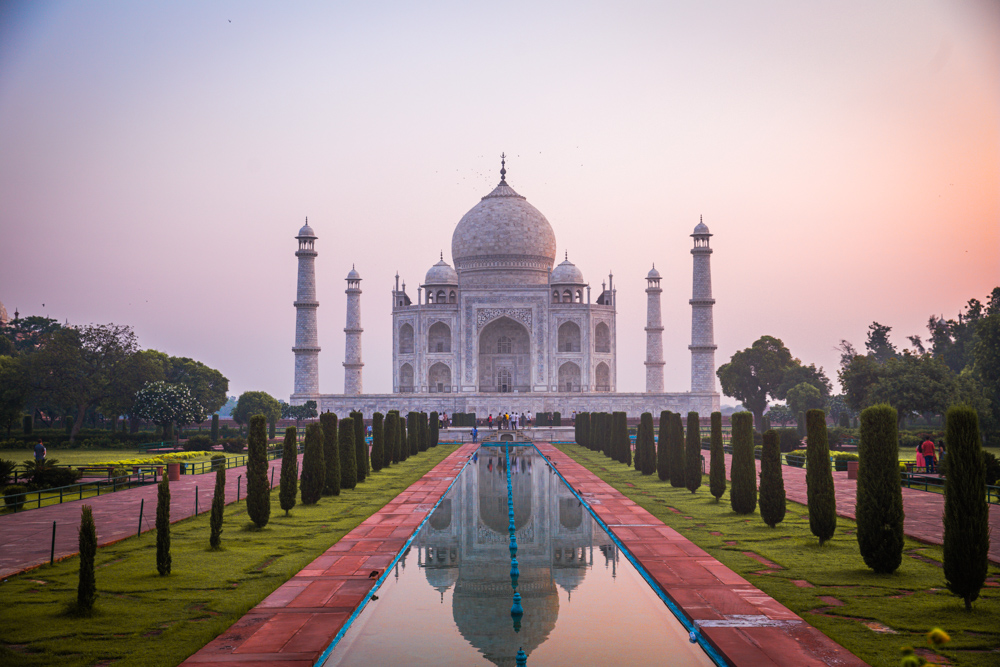
21. Oh, the Places You’ll Go by Dr. Seuss
This is another one of my favourite poems about travelling. It was written for the children’s book “Oh, the Places You’ll Go”, which was published in 1990.
Oh, the Places You’ll Go!
Congratulations! Today is your day. You’re off to Great Places! You’re off and away!
You have brains in your head. You have feet in your shoes You can steer yourself Any direction you choose. You’re on your own. And you know what you know. And YOU are the guy who’ll decide where to go.
>> Read the full Dr. Seuss poem here
Poetry About Travel: Final Thoughts
And that was it, 21 of the best travel poems out there! I hope that you have found exactly what you were looking for in this list of travel poetry and that it gave you some inspiration.
I’m curious to hear what your favourite poem about travel is (mine are #1, #7 and 21)! Or did you come across other beautiful poetry about travel that’s not on this list? Let me know in the comments as I’m updating this post frequently.
Find more travel inspiration in the posts below:
- 56 Songs About Travel
- 21 Movies About Nomads
- 50 Solo Travel Quotes
Pin it for later: Did you find this post helpful? Save it on Pinterest and follow me on Instagram and Facebook for more travel tips and inspiration.

Laura Meyers
Laura Meyers is the founder of Laure Wanders. She was born in Belgium and has travelled to over 40 countries, many of them solo. She currently spends most of her time between Belgium and South Asia and loves helping other travellers plan their adventures abroad.
You may also like
29 souvenirs from london that don’t suck, 43 useful gifts for hikers: for every budget..., 31 prettiest european cities to visit on your..., 36 famous landmarks in asia to visit in..., 57 crazy bucket list ideas for adrenaline junkies, 21 souvenirs from indonesia that don’t suck, 21 movies about nomads that will inspire you, 27 souvenirs from amsterdam that don’t suck, 45 best souvenir ideas to bring home in..., 19 best climbing documentaries that will inspire you, leave a comment cancel reply.
Save my name, email, and website in this browser for the next time I comment.
- Destinations
18 Poems About Travel to Inspire Your Traveler’s Soul to See the World
This site uses affiliate links, meaning that if you make a purchase through our links, we may earn an affiliate commission.
Within the depths of every adventurous spirit lies a yearning for exploration, a longing to traverse the far reaches of the Earth, and a desire to witness the wonders that lie beyond our familiar horizons.
The world is a tapestry of enchanting landscapes, vibrant cultures, and hidden treasures, inviting us to venture forth and embrace its splendor.
Through the evocative power of poetry, let us embark on a journey of inspiration and discovery , as these poems transport us to distant lands, stoke the flames of wanderlust, and awaken the traveler within. So pack your bags, open your heart to the allure of the unknown, and let these verses guide you to see the world with new eyes. Welcome to poems about travel to inspire your traveler’s soul.
You Might Also Like:
21 Best Poems About Friendship Celebrating Timeless Bond
277 Life-Changing Solo Female Travel Quotes (Never Give Up and Be Fearless)
- 1. The Road Not Taken by Robert Frost
- 2. Against the Shore by Atticus
- 3. The Opportune Moment by Sheenagh Pugh
- 4. A Prayer for Travelers by Anon
- 5. Song of the Open Road by Walt Whitman
- 6. Travel by Edna St. Vincent Millay
- 7. On the World by Francis Quarles
- 8. Die Slowly by Martha Medeiros
- 9. If Once You Have Slept on an Island by Rachel Field
- 10. The Moment by Margaret Atwood
- 11. Freedom by Olive Runner
- 12. Poem About Travel by Drewniverses
- 13. Traveling by Nayyirah Waheed
- 14. P.S. I Love You by H. Jackson Brown
- 15. For the Traveler by John O’Donohue
- 16. Why Do I Travel? Author Unknown
- 17. Travel by Robert Louis Stevenson
- 18. Night Traveler by Deepa Thomas
The Road Not Taken by Robert Frost
Two roads diverged in a yellow wood,
And sorry I could not travel both
And be one traveler, long I stood
And looked down one as far as I could
To where it bent in the undergrowth;
Then took the other, as just as fair,
And having perhaps the better claim,
Because it was grassy and wanted wear;
Though as for that the passing there
Had worn them really about the same,
And both that morning equally lay
In leaves no step had trodden black.
Oh, I kept the first for another day!
Yet knowing how way leads on to way,
I doubted if I should ever come back.
I shall be telling this with a sigh
Somewhere ages and ages hence:
Two roads diverged in a wood, and I—
I took the one less traveled by,
And that has made all the difference.
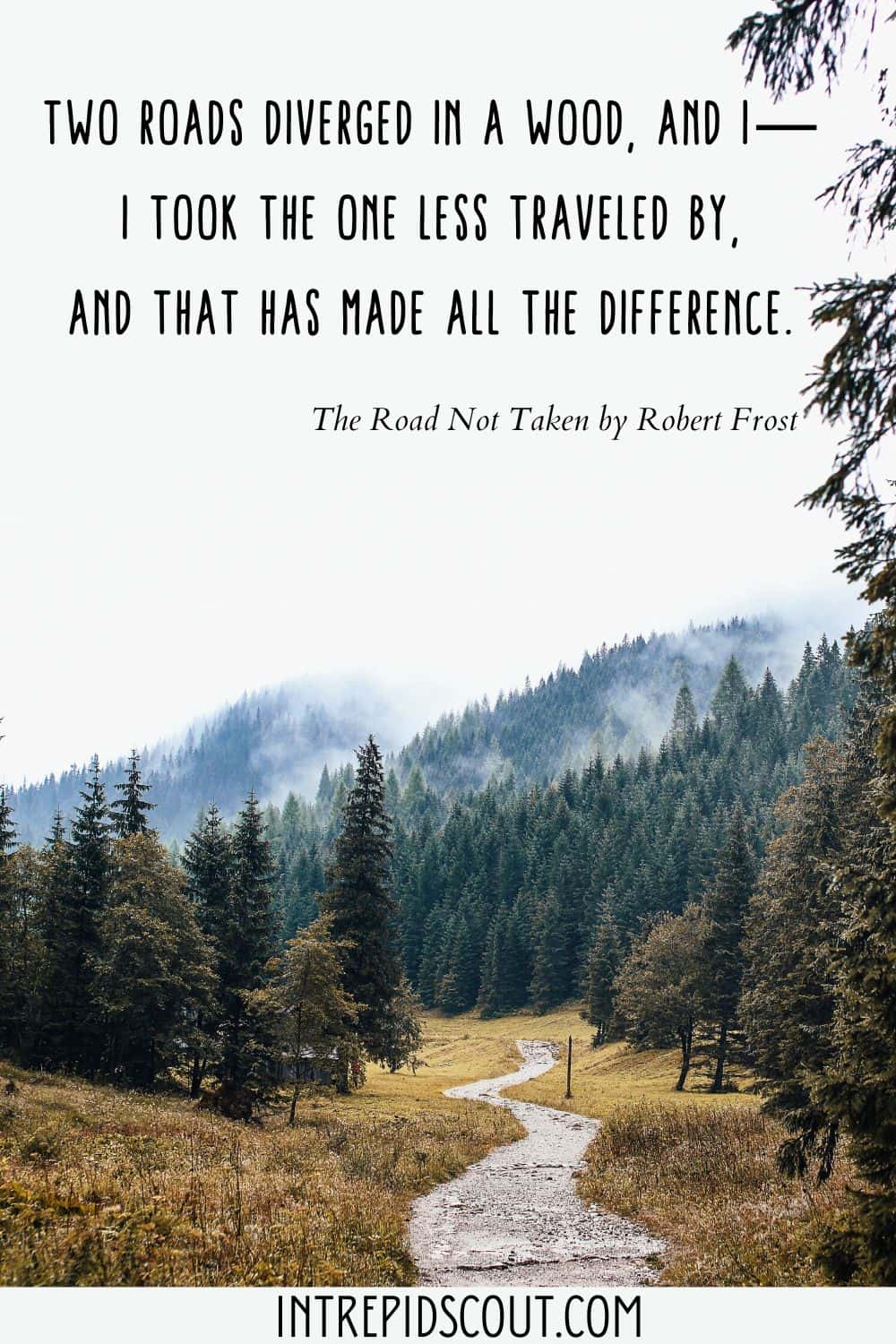
The Road Not Taken by Robert Frost / Poems About Travel
Against the Shore by Atticus
against the shore,
restless like
for any adventure,
that blew along her way
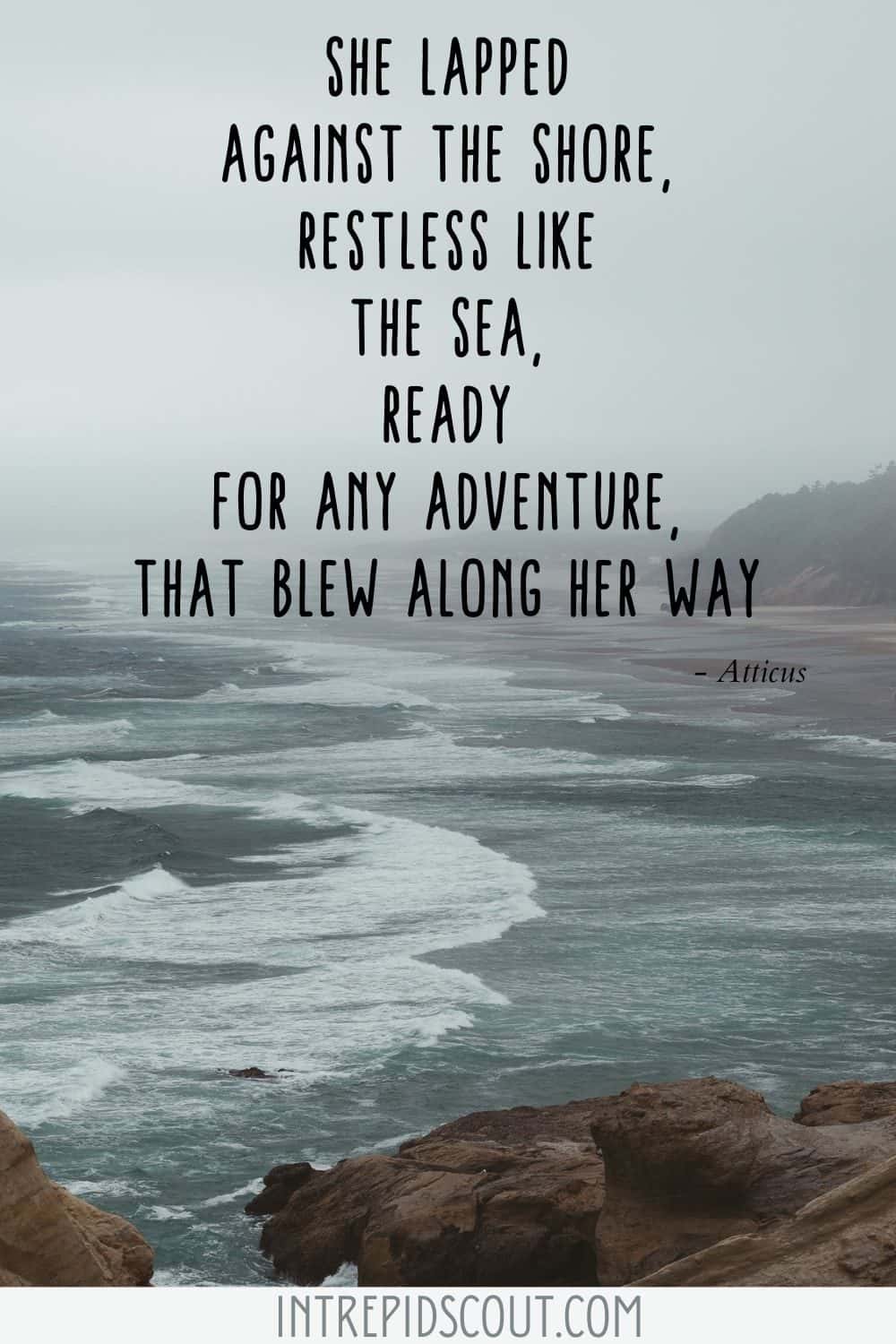
Against the Shore by Atticus / Poems About Travel
The Opportune Moment by Sheenagh Pugh
When you go ashore in that town,
take neither a camera nor a notebook.
However many photographs you upload
of that street, the smell of almond paste
will be missing; the harbour will not sound
of wind slapping on chains. You will read
notes like “Sami church”, later, and know
you saw nothing, never put it where
you could find it again, were never
really there. When you go ashore
in the small port with the rusty trawlers,
there will be fur hawkers who all look
like Genghis Khan on a market stall,
crumbling pavements, roses frozen in bud,
an altar with wool hangings, vessels
like canal ware, a Madonna
with a Russian doll face. When you go
ashore, take nothing but the knowledge
that where you are, you never will be again.
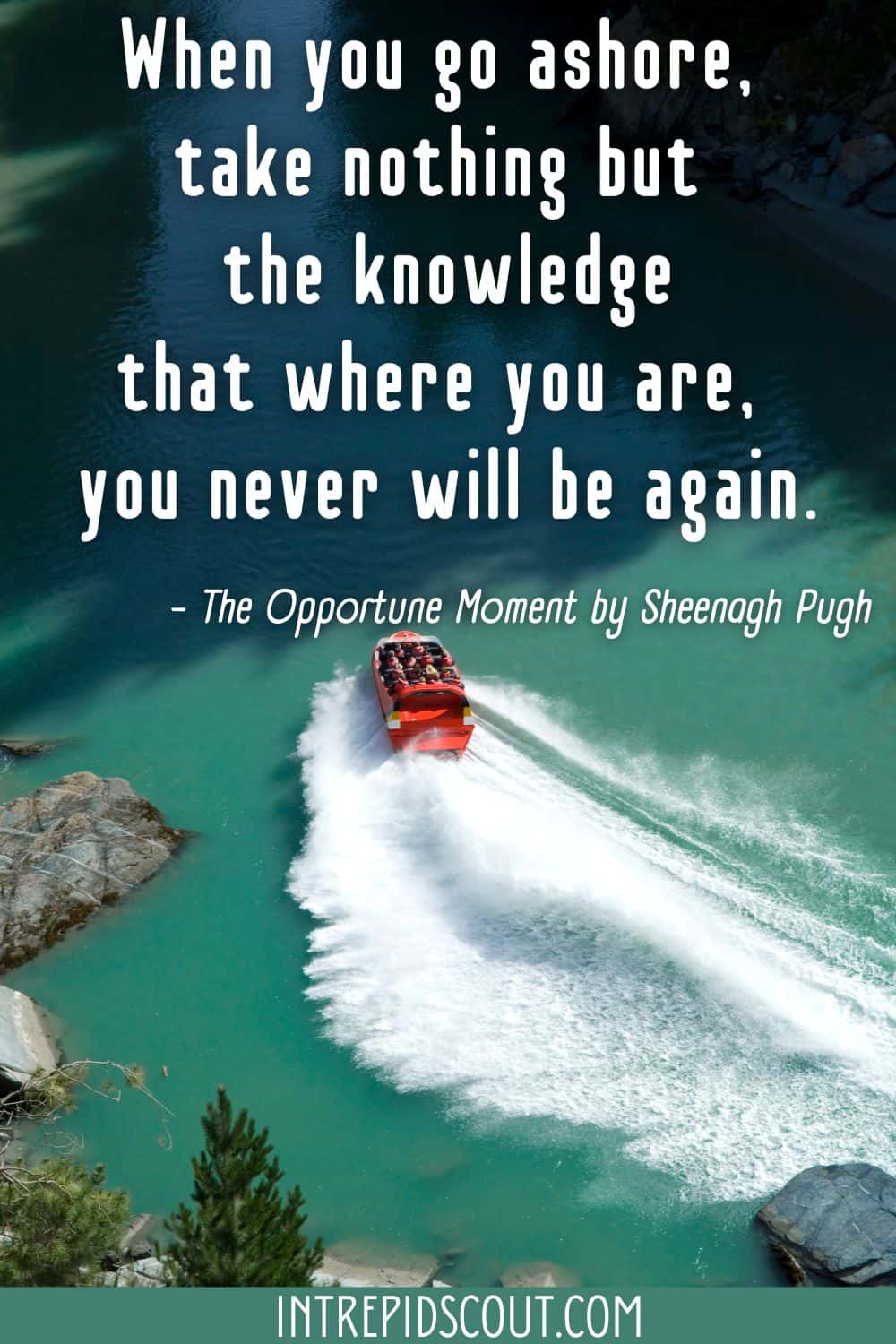
The Opportune Moment by Sheenagh Pugh / Poems About Travel Journeys
A Prayer for Travelers by Anon
May the road rise up to meet you.
May the wind be always at your back.
May the sun shine warm upon your face;
The rains fall soft upon your fields.
And until we meet again,
May God hold you in the palm of His hand.
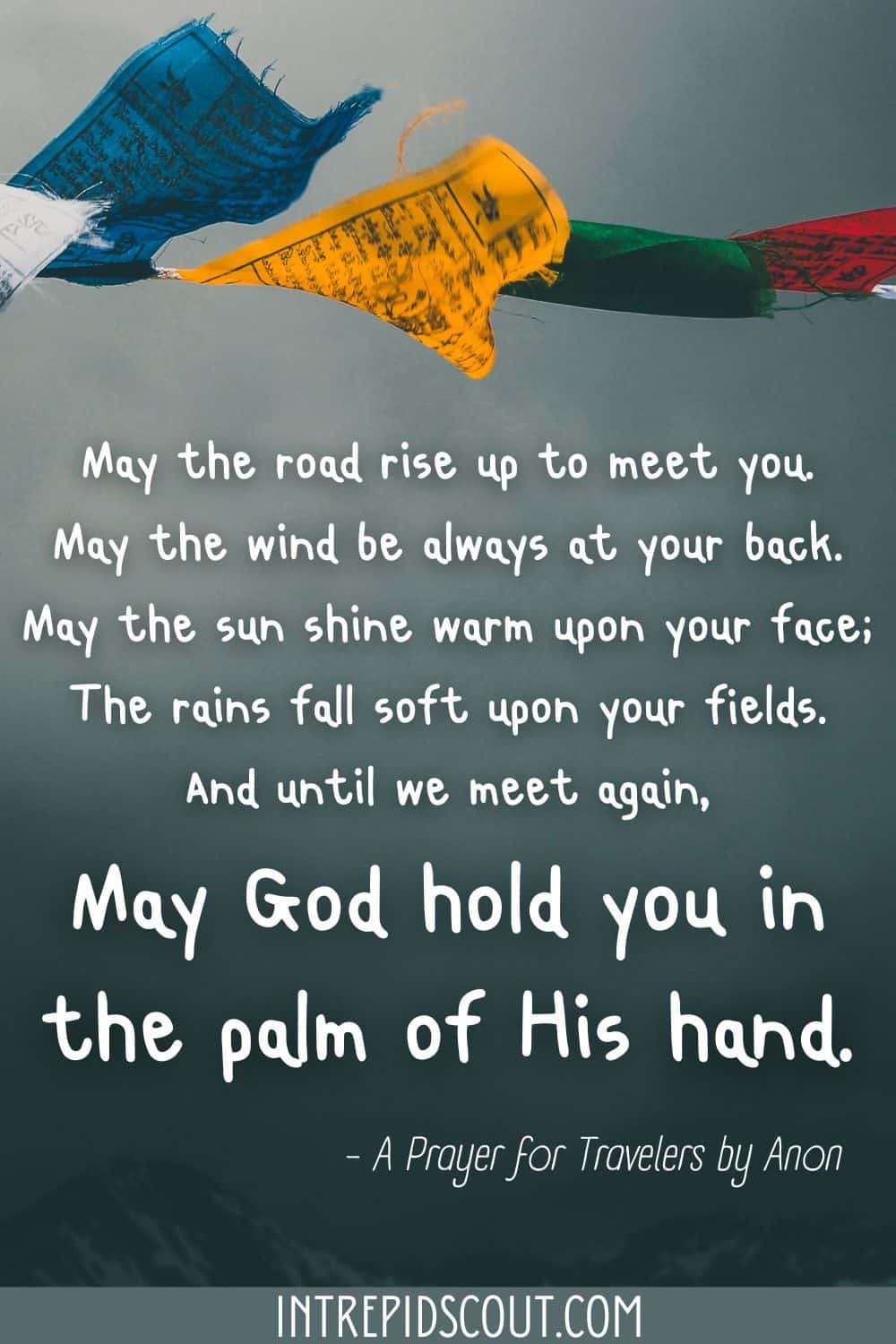
A Prayer for Travelers by Anon / Travel Poetry
Song of the Open Road by Walt Whitman
Afoot and light-hearted I take to the open road,
Healthy, free, the world before me,
The long brown path before me leading me wherever I choose.
Henceforth I ask not good-fortune, I myself am good-fortune,
Henceforth I whimper no more, postpone no more, need nothing,
Done with indoor complaints, libraries, querulous criticisms,
Strong and content I travel the open road.
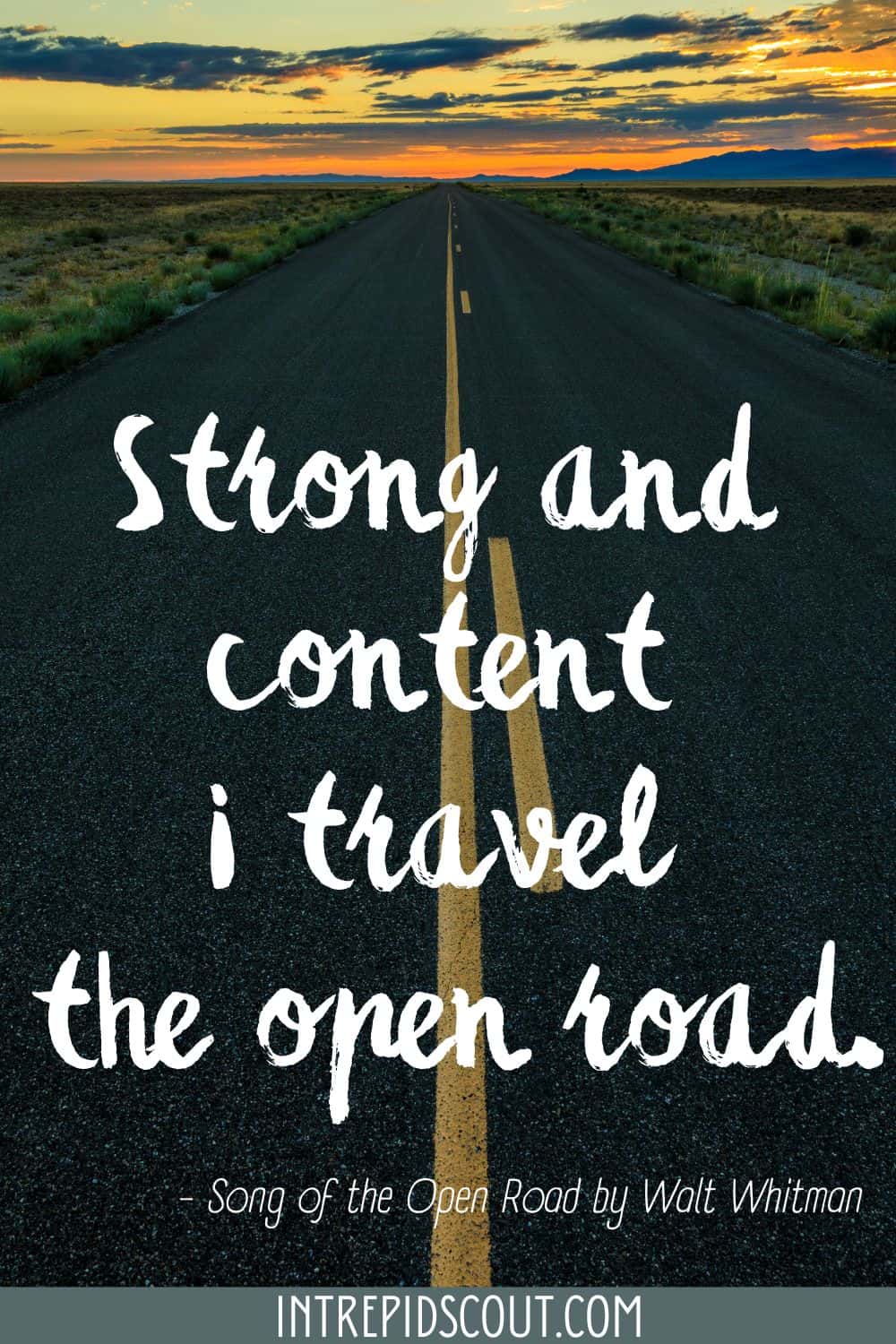
Song of the Open Road by Walt Whitman / Poems About Traveling Through Life
Travel by Edna St. Vincent Millay
The railroad track is miles away,
And the day is loud with voices speaking,
Yet there isn’t a train goes by all day
But I hear its whistle shrieking.
All night there isn’t a train goes by,
Though the night is still for sleep and dreaming,
But I see its cinders red on the sky,
And hear its engine steaming.
My heart is warm with the friends I make,
And better friends I’ll not be knowing;
Yet there isn’t a train I wouldn’t take,
No matter where it’s going.
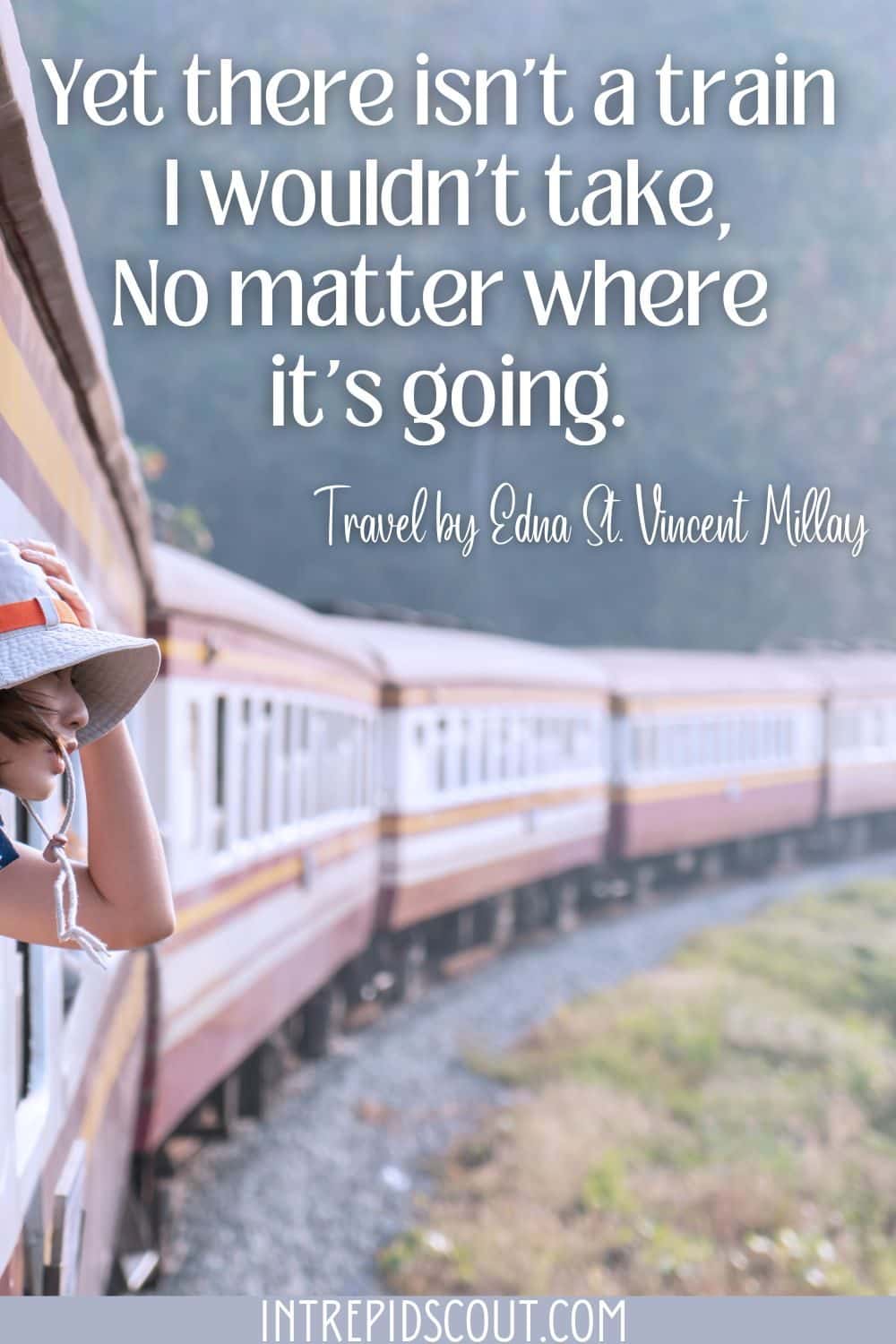
Travel by Edna St. Vincent Millay / Poems About Travel
On the World by Francis Quarles
The world’s an inn; and I her guest.
I eat; I drink; I take my rest.
My hostess, nature, does deny me
Nothing, wherewith she can supply me;
Where, having stayed a while, I pay
Her lavish bills, and go my way.
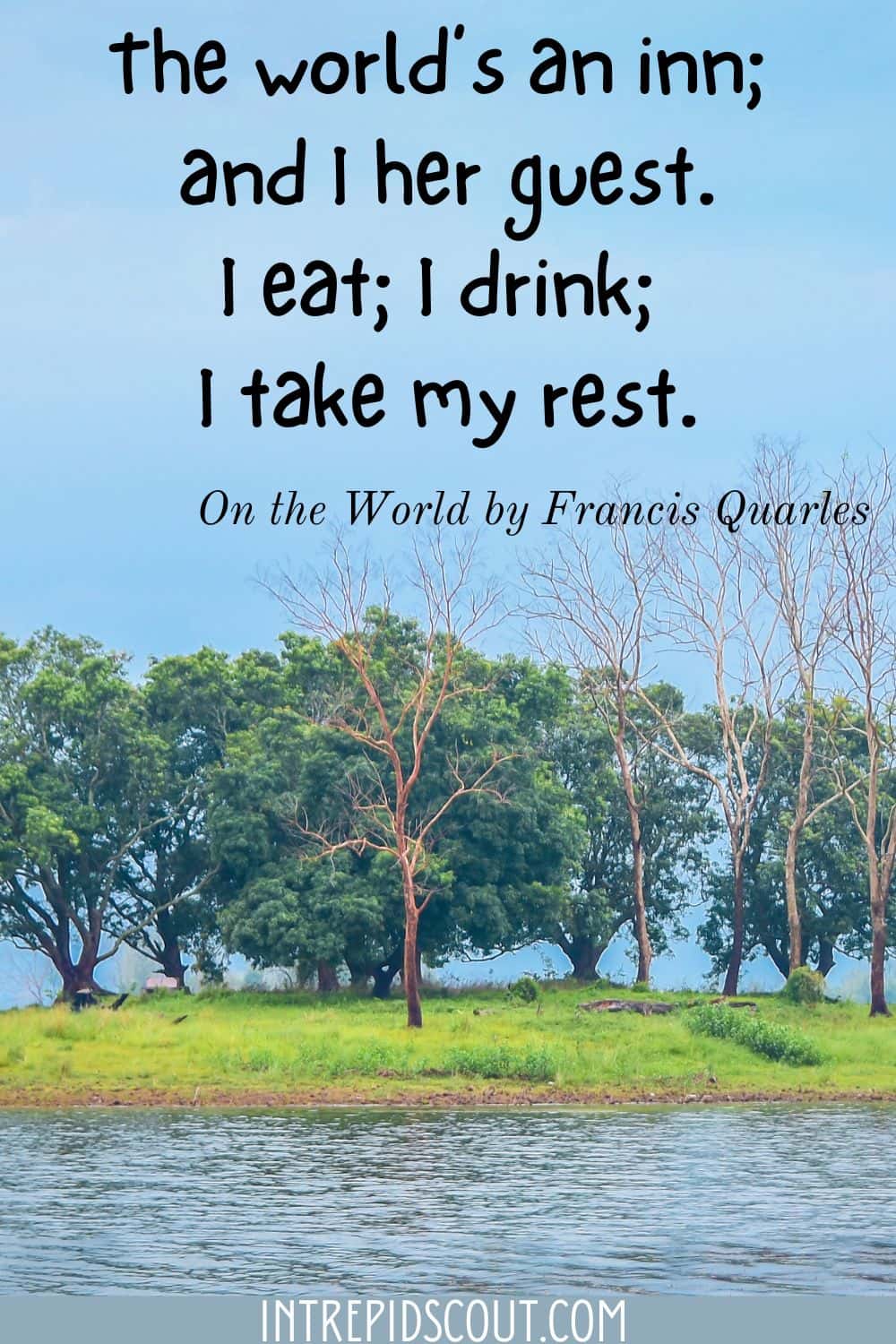
On the World by Francis Quarles / Poems About Traveling the World
Die Slowly by Martha Medeiros
He who becomes the slave of habit,
who follows the same routes every day,
who never changes pace,
who does not risk and change the color of his clothes,
who does not speak and does not experience,
dies slowly.
He or she who shuns passion,
who prefers black on white,
dotting ones i’s rather than a bundle of emotions, the kind that make your eyes glimmer,
that turn a yawn into a smile,
that make the heart pound in the face of mistakes and feelings,
He or she who does not turn things topsy-turvy,
who is unhappy at work,
who does not risk certainty for uncertainty,
to thus follow a dream,
those who do not forego sound advice at least once in their lives,
die slowly.
He who does not travel, who does not read,
who does not listen to music,
who does not find grace in himself,
she who does not find grace in herself,
He who slowly destroys his own self-esteem,
who does not allow himself to be helped,
who spends days on end complaining about his own bad luck, about the rain that never stops,
He or she who abandons a project before starting it, who fails to ask questions on subjects he doesn’t know, he or she who doesn’t reply when they are asked something they do know,
Let’s try and avoid death in small doses,
reminding oneself that being alive requires an effort far greater than the simple fact of breathing.
Only a burning patience will lead
to the attainment of a splendid happiness
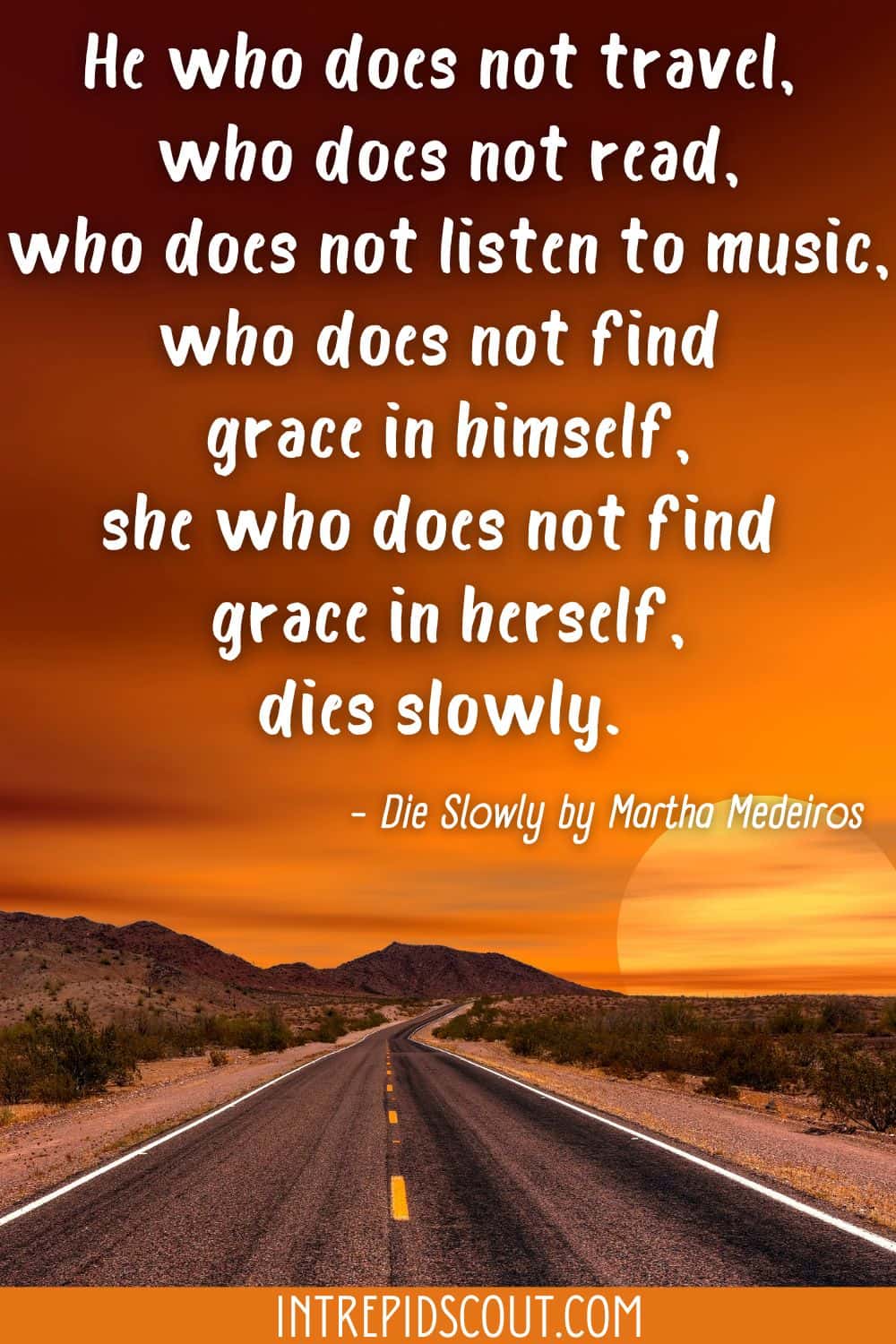
Die Slowly by Martha Medeiros / Poems About Why You Need to Travel
If Once You Have Slept on an Island by Rachel Field
If once you have slept on an island
You’ll never be quite the same;
You may look as you looked the day before
And go by the same old name,
You may bustle about in street and shop;
You may sit at home and sew,
But you’ll see blue water and wheeling gulls
Wherever your feet may go.
You may chat with the neighbors of this and that
And close to your fire keep,
But you’ll hear ship whistle and lighthouse bell
And tides beat through your sleep.
Oh, you won’t know why, and you can’t say how
Such change upon you came,
But – once you have slept on an island
You’ll never be quite the same!
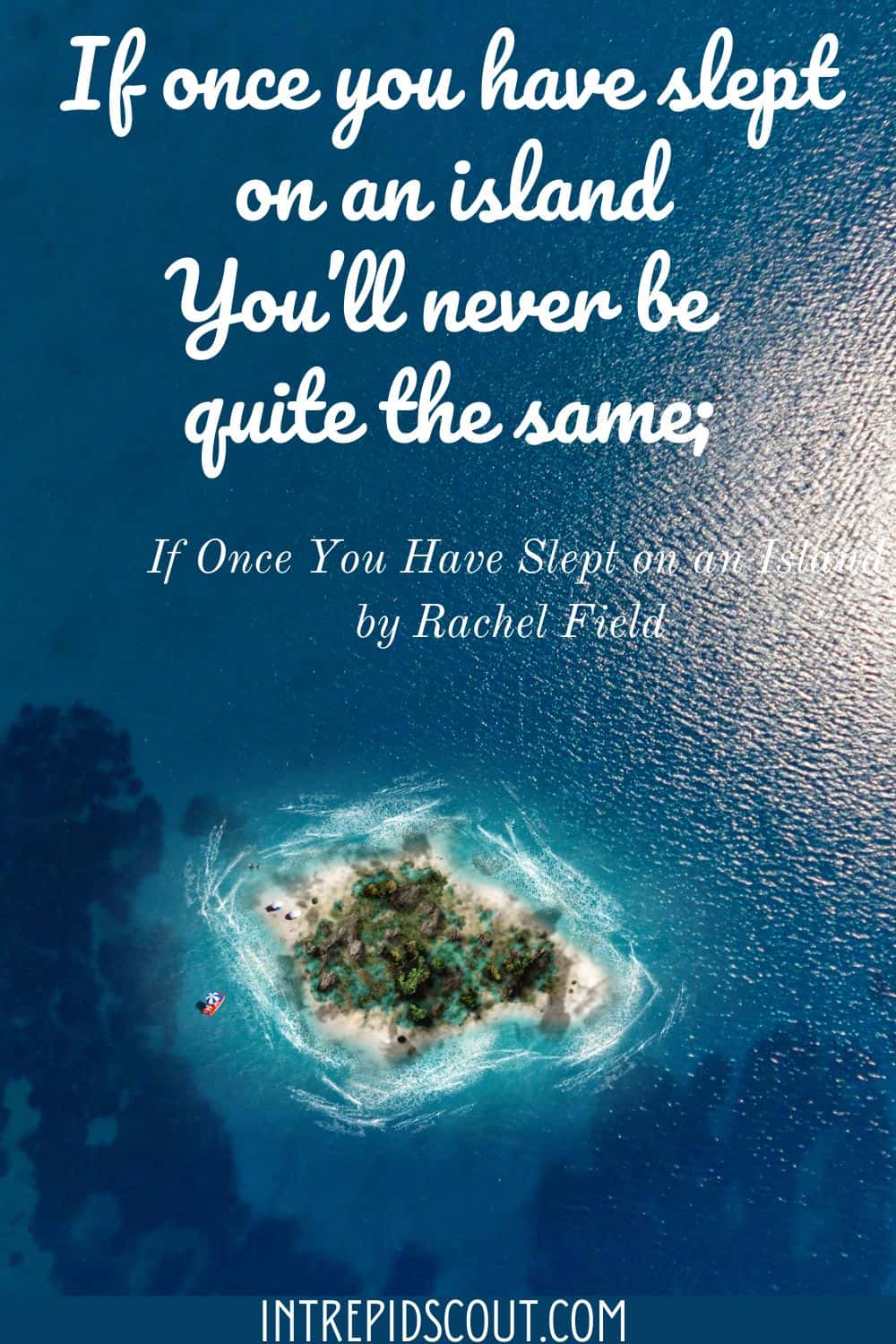
If Once You Have Slept on an Island by Rachel Field / Poems About Travel And How It Changes Us
The Moment by Margaret Atwood
The moment when, after many years
of hard work and a long voyage
you stand in the centre of your room,
house, half-acre, square mile, island, country,
knowing at last how you got there,
and say, I own this,
is the same moment when the trees unloose
their soft arms from around you,
the birds take back their language,
the cliffs fissure and collapse,
the air moves back from you like a wave
and you can’t breathe.
No, they whisper. You own nothing.
You were a visitor, time after time
climbing the hill, planting the flag, proclaiming.
We never belonged to you.
You never found us.
It was always the other way round.
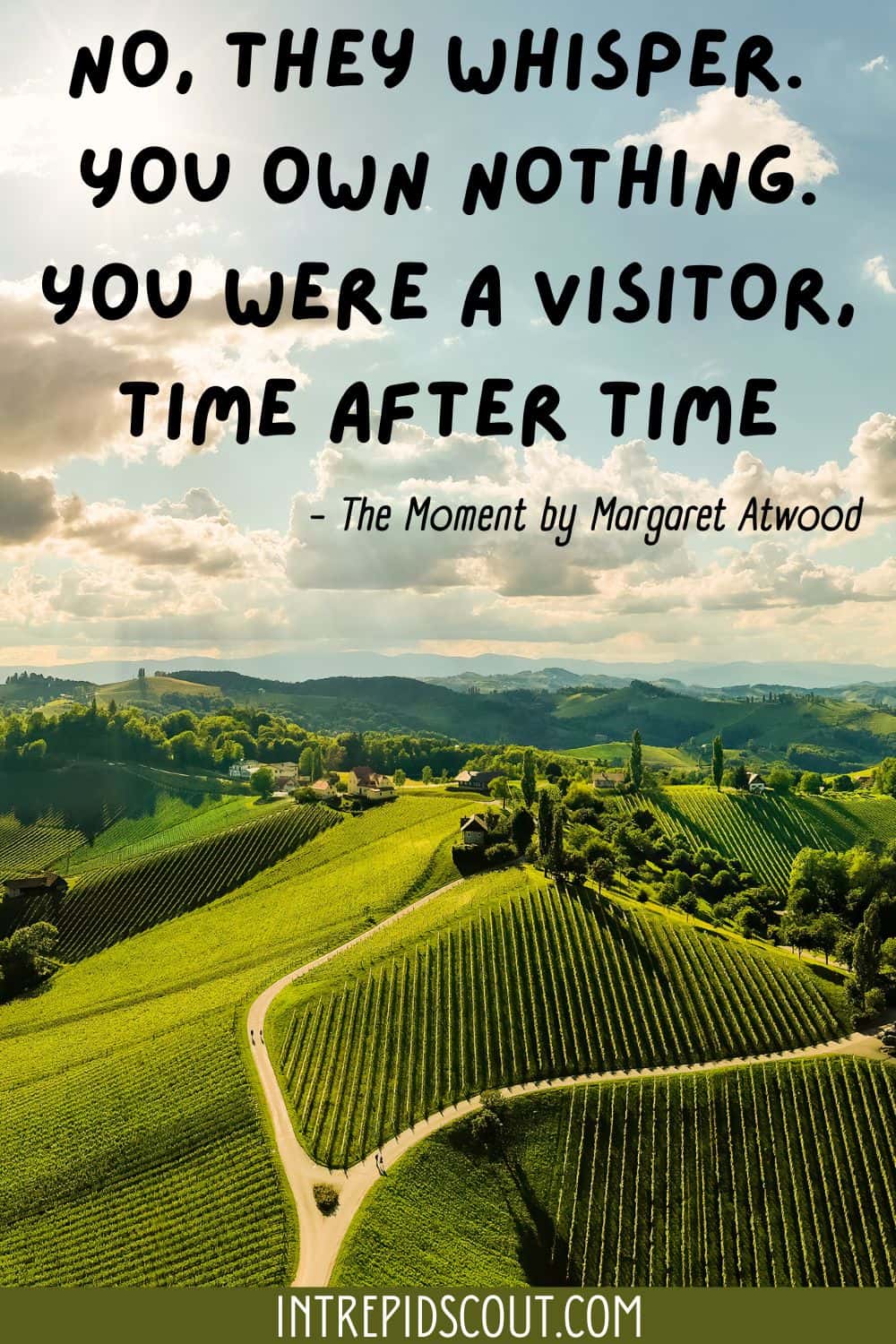
The Moment by Margaret Atwood / Famous Travel Poems
Freedom by Olive Runner
Give me the long, straight road before me,
A clear, cold day with a nipping air,
Tall, bare trees to run on beside me,
A heart that is light and free from care.
Then let me go! – I care not whither
My feet may lead, for my spirit shall be
Free as the brook that flows to the river,
Free as the river that flows to the sea.
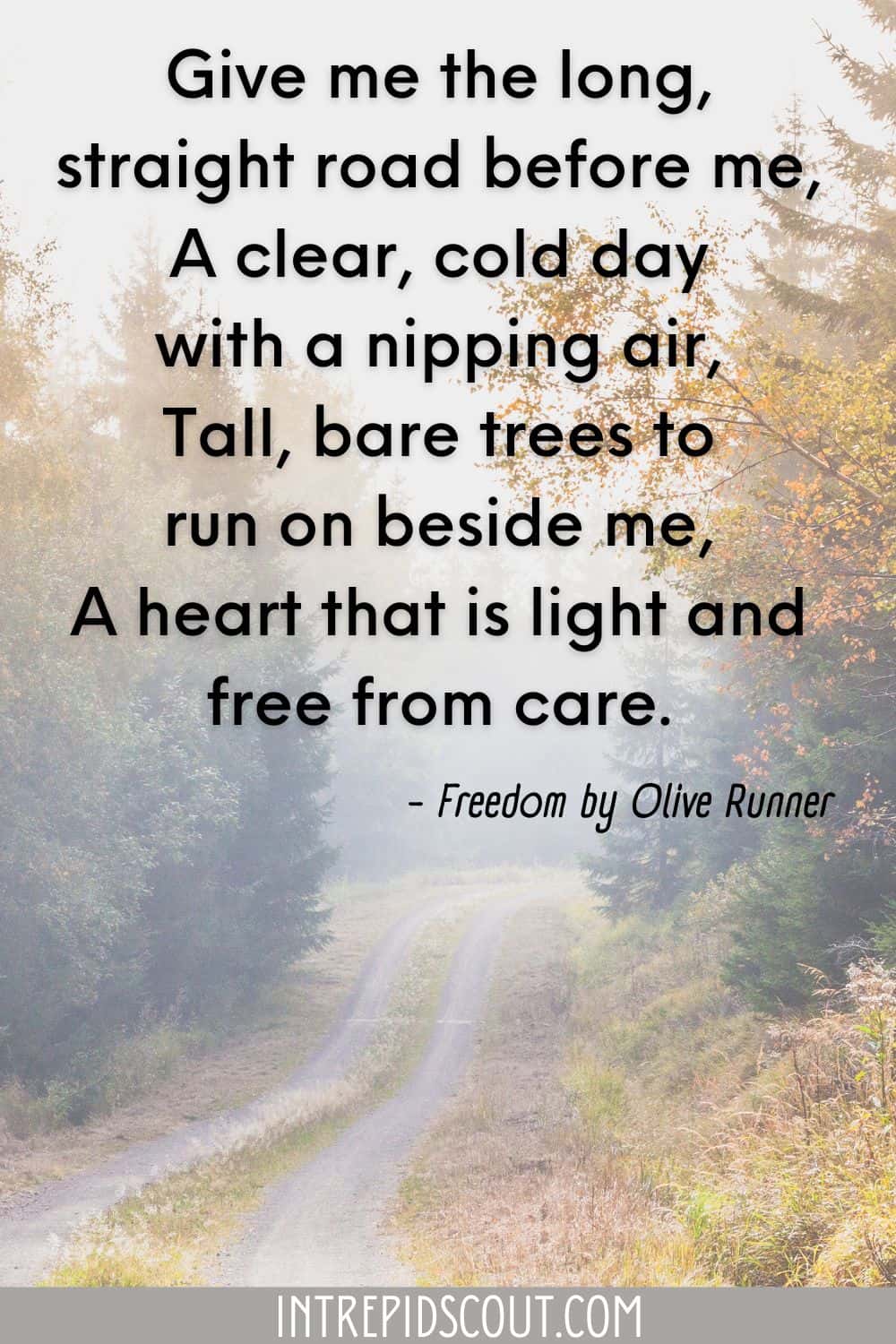
Freedom by Olive Runner / Poems About Travel
Poem About Travel by Drewniverses
You are not a tree. You are not bound
to the ground you walk on. You have
wings and dreams and a heart full of
wonder. So pick up your feet and go.
Spread kindness like a wildflower
wherever you go. Fall in love with the
life you live, and always leave people
better than you found them.
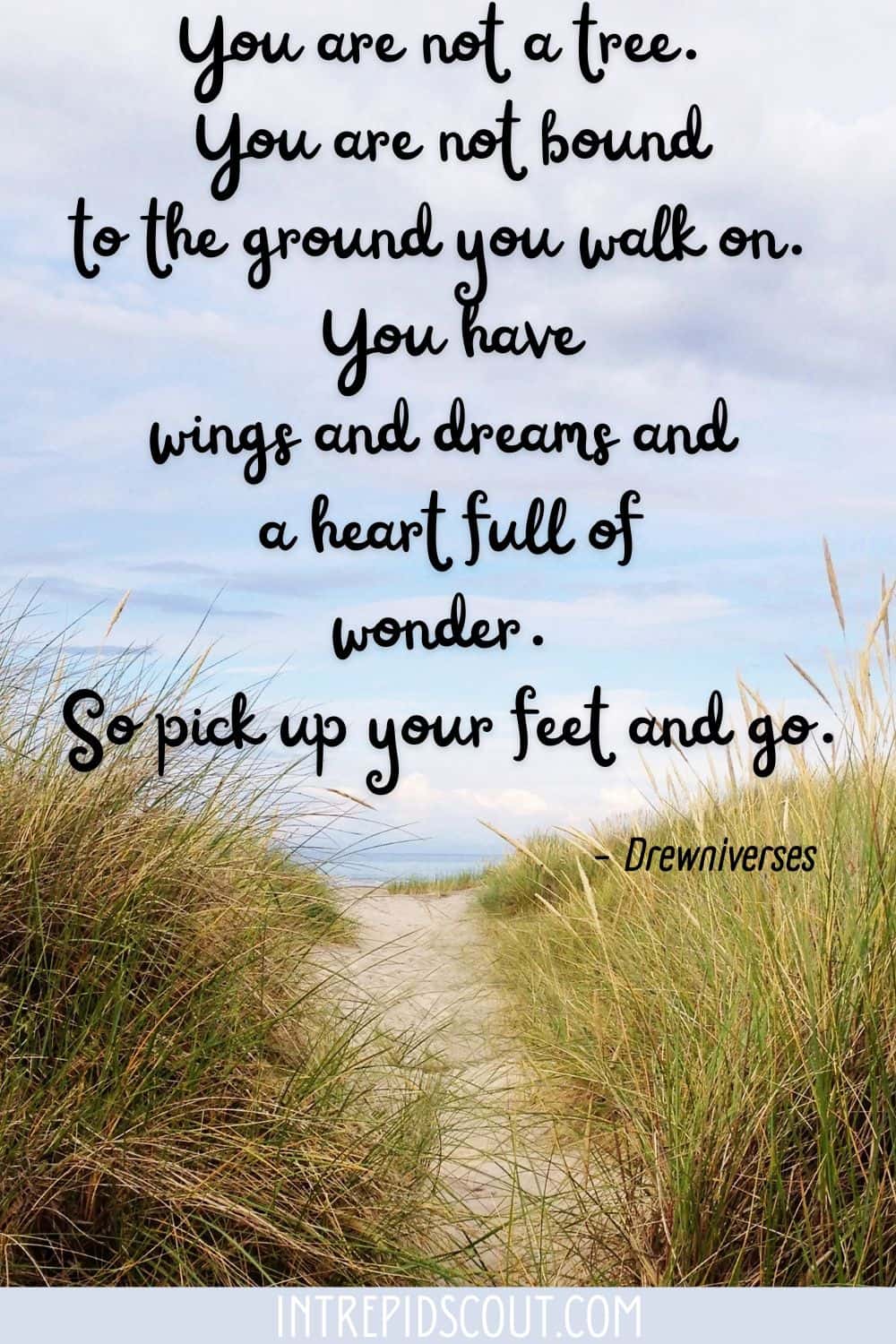
Poem About Travel by Drewniverses / Poems About Travel
Traveling by Nayyirah Waheed
be insecure
allow yourself lowness.
know that it is
the way to who you are.
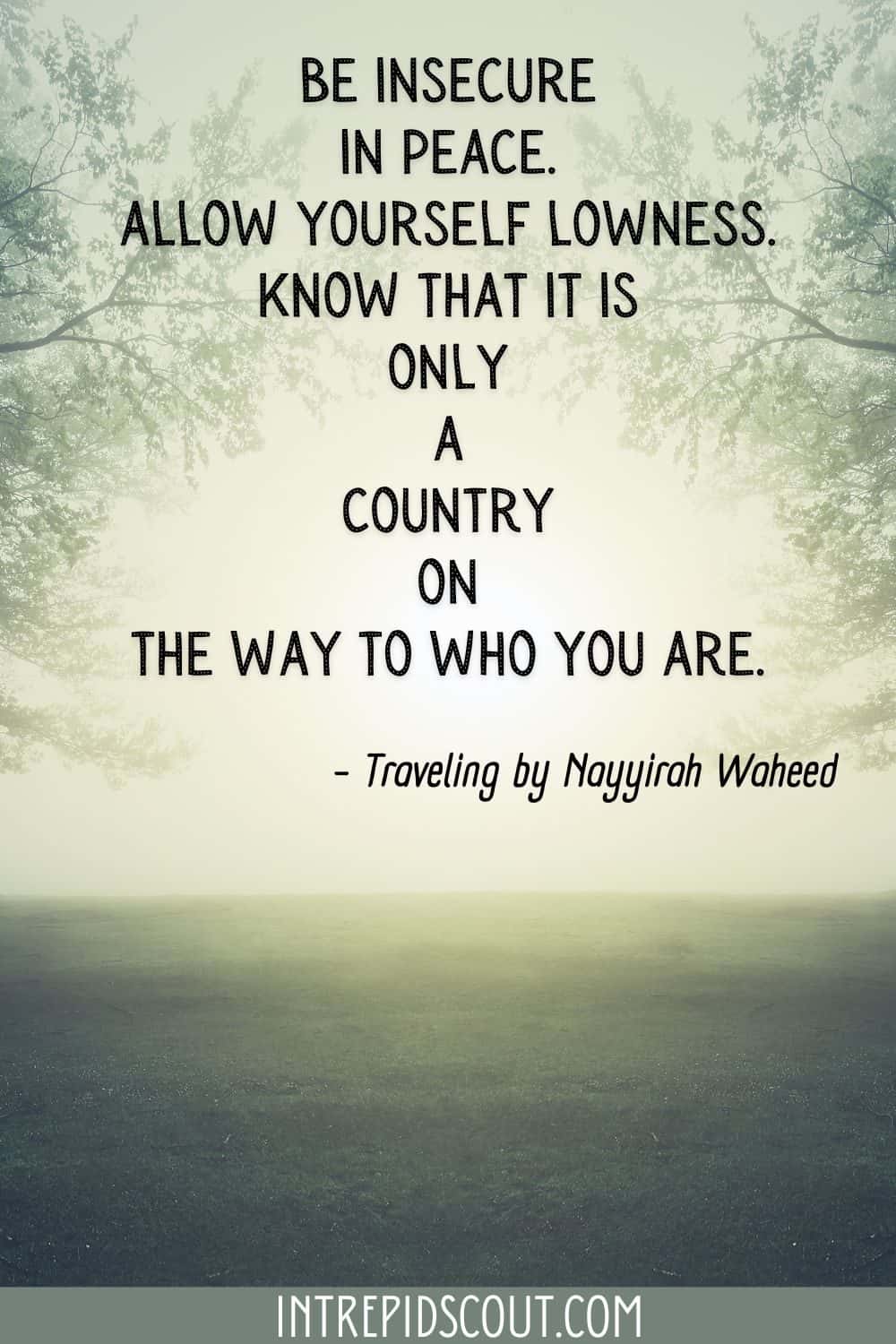
Traveling by Nayyirah Waheed / Poems About Travel and Adventure
P.S. I Love You by H. Jackson Brown
Twenty years from now
You’ll be more disappointed
By the things you didn’t do
Than by the ones you did do.
So throw off the bowlines.
Sail away from the harbor.
Catch the trade winds in your sails.
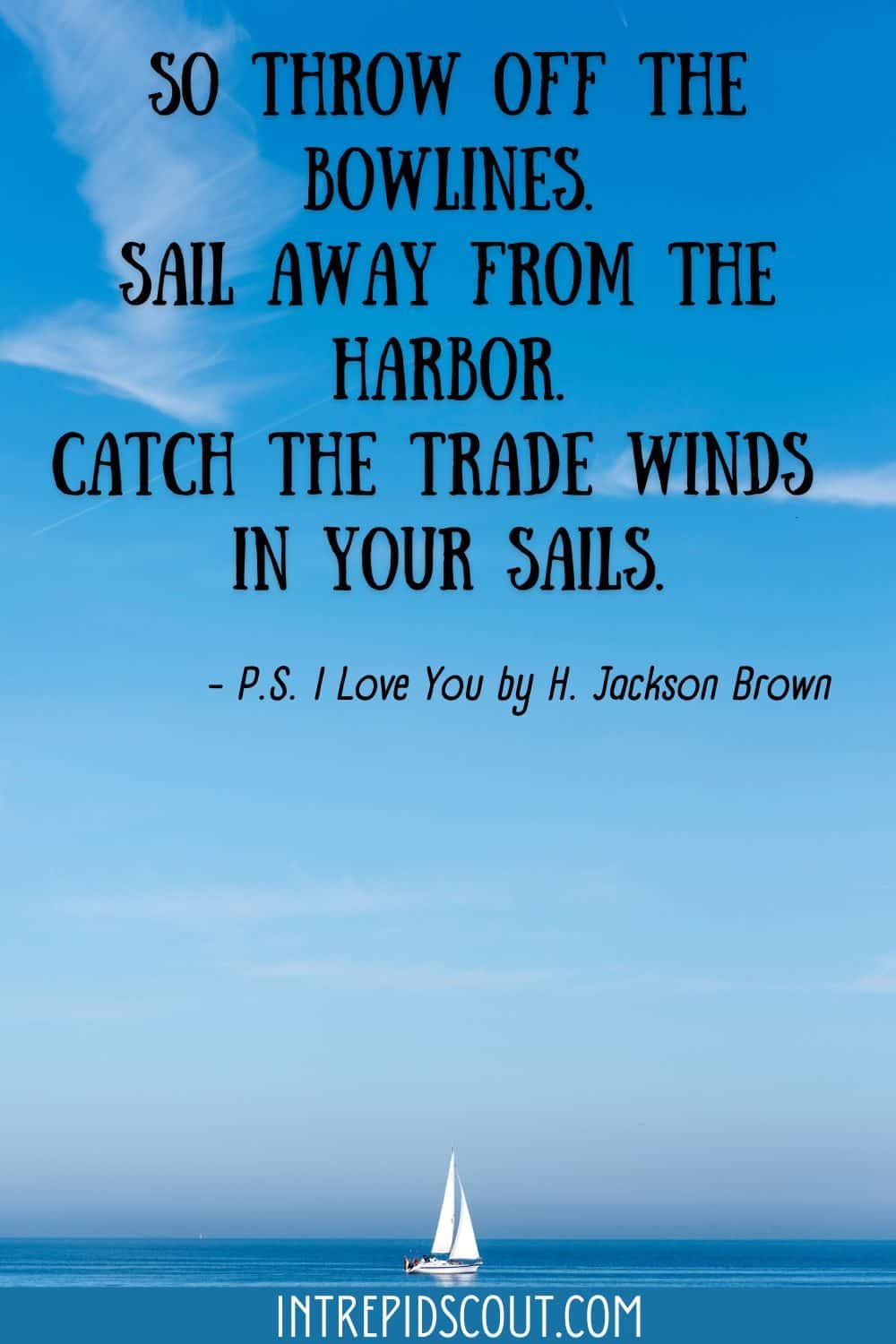
P.S. I Love You by H. Jackson Brown / Poems About Travel Why You Need to Travel the World
For the Traveler by John O’Donohue
Every time you leave home,
Another road takes you
Into a world you were never in.
New strangers on other paths await.
New places that have never seen you
Will startle a little at your entry.
Old places that know you well
Will pretend nothing
Changed since your last visit.
When you travel, you find yourself
Alone in a different way,
More attentive now
To the self you bring along,
Your more subtle eye watching
You abroad; and how what meets you
Touches that part of the heart
That lies low at home:
How you unexpectedly attune
To the timbre in some voice,
Opening in conversation
You want to take in
To where your longing
Has pressed hard enough
Inward, on some unsaid dark,
To create a crystal of insight
You could not have known
To illuminate
When you travel,
A new silence
Goes with you,
And if you listen,
You will hear
What your heart would
Love to say.
A journey can become a sacred thing:
Make sure, before you go,
To take the time
To bless your going forth,
To free your heart of ballast
So that the compass of your soul
Might direct you toward
The territories of spirit
Where you will discover
More of your hidden life,
And the urgencies
That deserve to claim you.
May you travel in an awakened way,
Gathered wisely into your inner ground;
That you may not waste the invitations
Which wait along the way to transform you.
May you travel safely, arrive refreshed,
And live your time away to its fullest;
Return home more enriched, and free
To balance the gift of days which call you.
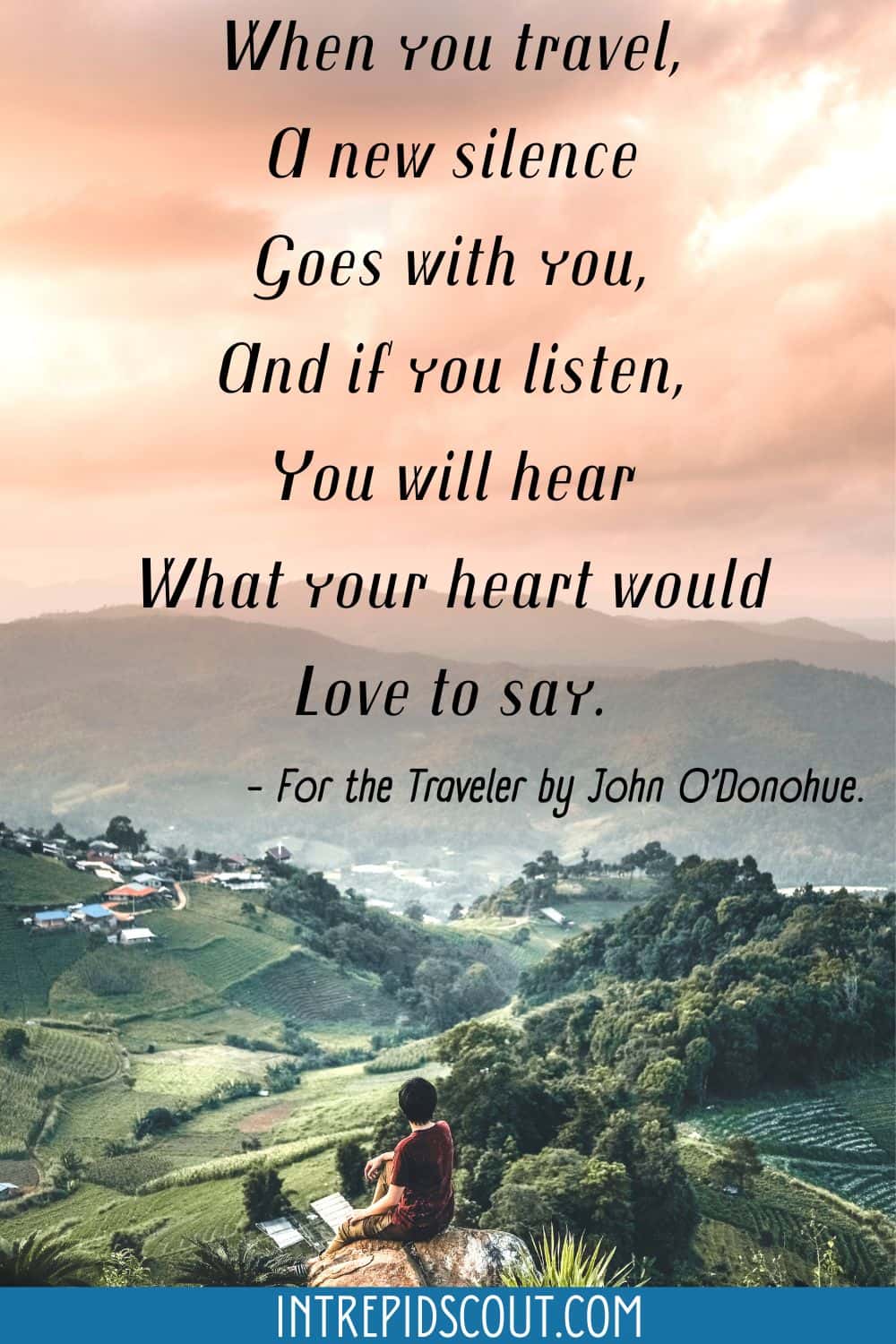
For the Traveler by John O’Donohue / Poems About Travel and How It Changes Us
Why Do I Travel? Author Unknown
It is on the road that my inner voice speaks the loudest and my heart beats the strongest.
It is on the road that I take extra pride in my wooly hair, full features and lineage.
It is on the road that I develop extra senses and the hairs on my arms stand up and say “Sana, don’t go there”, and I listen.
It’s when I safety pin my money to my underclothes and count it a million times before I go to sleep,
It is on the road that I am a poet, an ambassador, a dancer, medicine woman, an angel and even a genius.
It’s on the road that I am fearless and unstoppable and if necessary ball up my fist and fight back.
It is on the road that I talk to my deceased parents and they speak back
It’s on the road that I reprimand myself, and set new goals, refuel, stop and begin again.
It is on the road that I experience what freedom truly is.
It is my travel that has transformed me making me a citizen of the world. When my humanness, compassion and affection are raised to a new level and I share unconditionally.
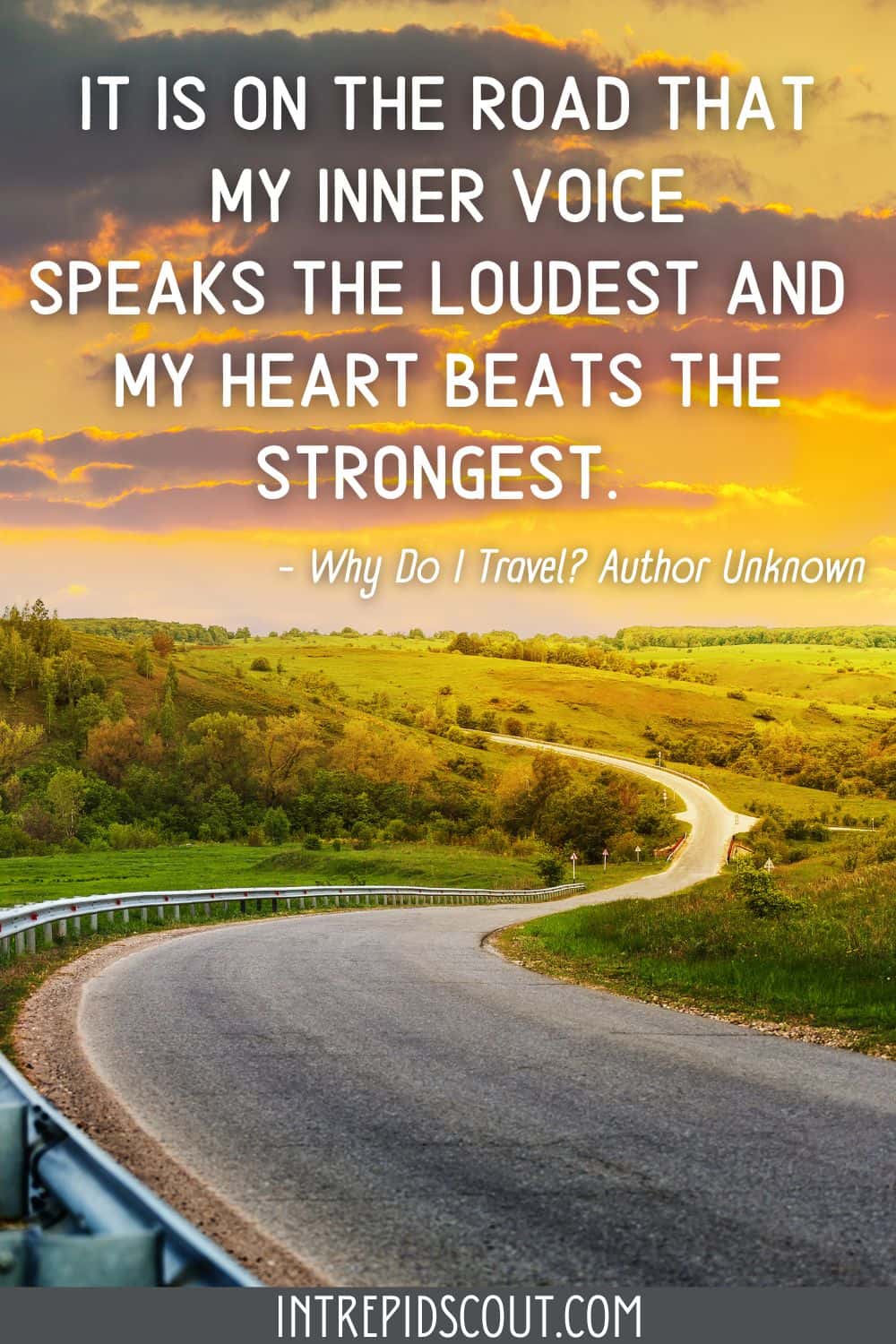
Why Do I Travel? Author Unknown / Poems About Travel
Travel by Robert Louis Stevenson
I should like to rise and go
Where the golden apples grow;—
Where below another sky
Parrot islands anchored lie,
And, watched by cockatoos and goats,
Lonely Crusoes building boats;—
Where in sunshine reaching out
Eastern cities, miles about,
Are with mosque and minaret
Among sandy gardens set,
And the rich goods from near and far
Hang for sale in the bazaar,—
Where the Great Wall round China goes,
And on one side the desert blows,
And with bell and voice and drum
Cities on the other hum;—
Where are forests, hot as fire,
Wide as England, tall as a spire,
Full of apes and cocoa-nuts
And the negro hunters’ huts;—
Where the knotty crocodile
Lies and blinks in the Nile,
And the red flamingo flies
Hunting fish before his eyes;—
Where in jungles, near and far,
Man-devouring tigers are,
Lying close and giving ear
Lest the hunt be drawing near,
Or a comer-by be seen
Swinging in a palanquin;—
Where among the desert sands
Some deserted city stands,
All its children, sweep and prince,
Grown to manhood ages since,
Not a foot in street or house,
Not a stir of child or mouse,
And when kindly falls the night,
In all the town no spark of light.
There I’ll come when I’m a man
With a camel caravan;
Light a fire in the gloom
Of some dusty dining-room;
See the pictures on the walls,
Heroes, fights and festivals;
And in a corner find the toys
Of the old Egyptian boys.
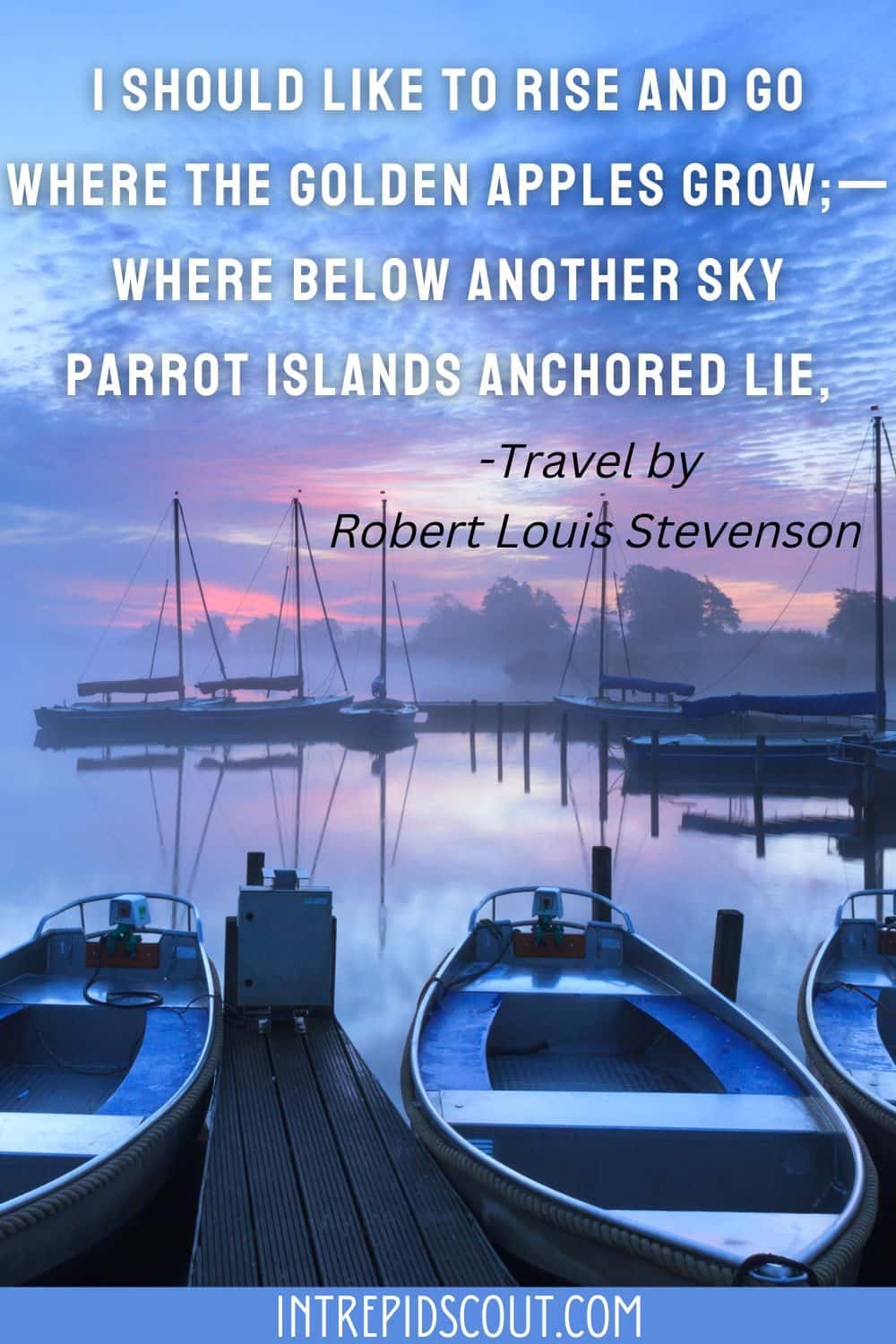
Travel by Robert Louis Stevenson / Poems About Travel
Night Traveler by Deepa Thomas
I am a night traveler
Travel all through the night
And my bed is a sailing boat
I reach for my bed every night
And take a trip places far away
To see new things and people
I travel past the harbors
Full of anchored boats
I travel past the beaches
With swaying coconut trees
I watch the waves
Embracing the shore
I watch the kids playing
And reach out my arms
Then I touch my own bed
Here comes a flash
And my boat is back
And I am back in bed
My boat sails every night
And reach home with morning light
Never did it anchor once
Still traveling every day
Hoping to reach
That unknown destination
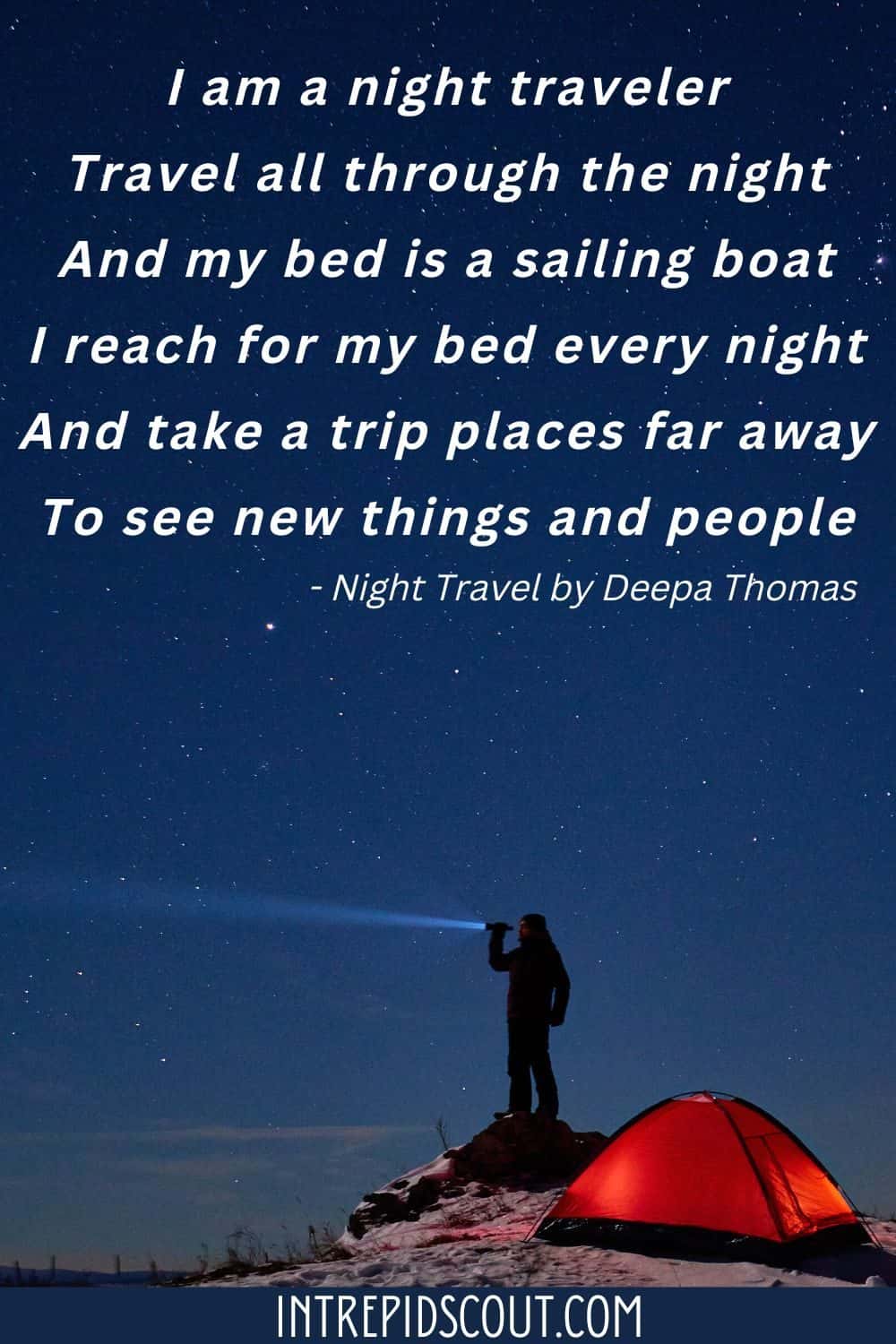
Night Travel by Deepa Thomas / Poems About Travel
More Posts with Quotes and Captions
235 Terrific Family Trip Captions and Quotes (Perfect for Vacation Photos)
299 Gorgeous Tropical Vacation Quotes and Captions (Dreaming About Summer)
247 Autumn Changing Leaves Captions and Quotes (Fall in Love with Autumn)
232 Jack-o’-lantern Pumpkin Captions and Quotes for Instagram
218 Ultimate Lake Captions and Quotes for Instagram (+Hashtags)
265 Magical Golden Hour Captions and Quotes
165 Beautiful Cherry Blossom Quotes and Captions
371 Ultimate Moutain Captions and Quotes for Instagram
298 Adorable Christmas Dog Captions and Quotes (Paws-itively Howl-iday)
275 Best QUOTES About JAPAN (JAPANESE Culture, Nature, Food, Anime, Proverbs)
223 Sharp-Witted PROVERBS About TRAVEL (Collected From Around the World)
Read All the Posts With Quotes and Captions:
Quotes and Captions
Did You Find Poems About Travel Useful?
Why not save it to your pinterest board.
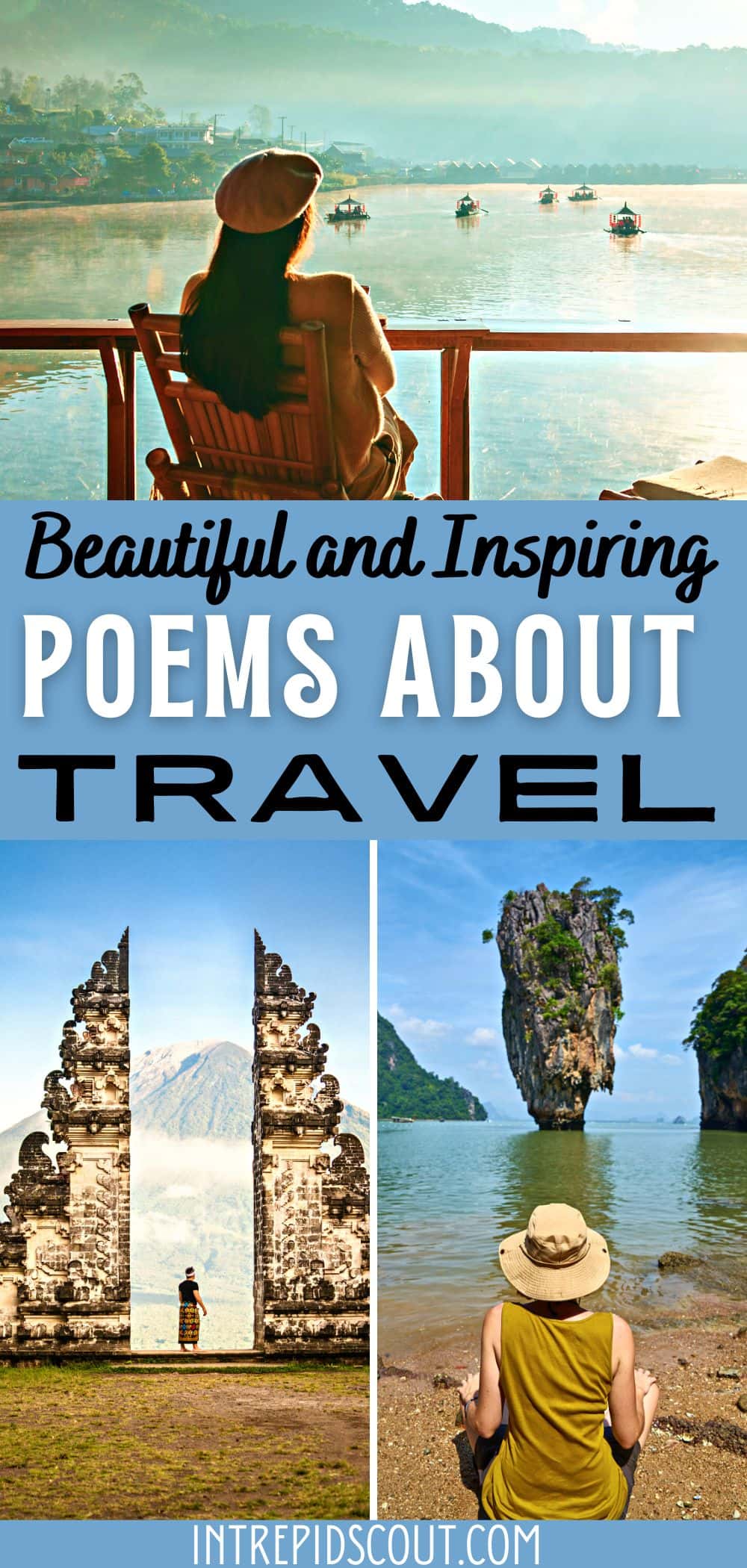
Poems About Travel
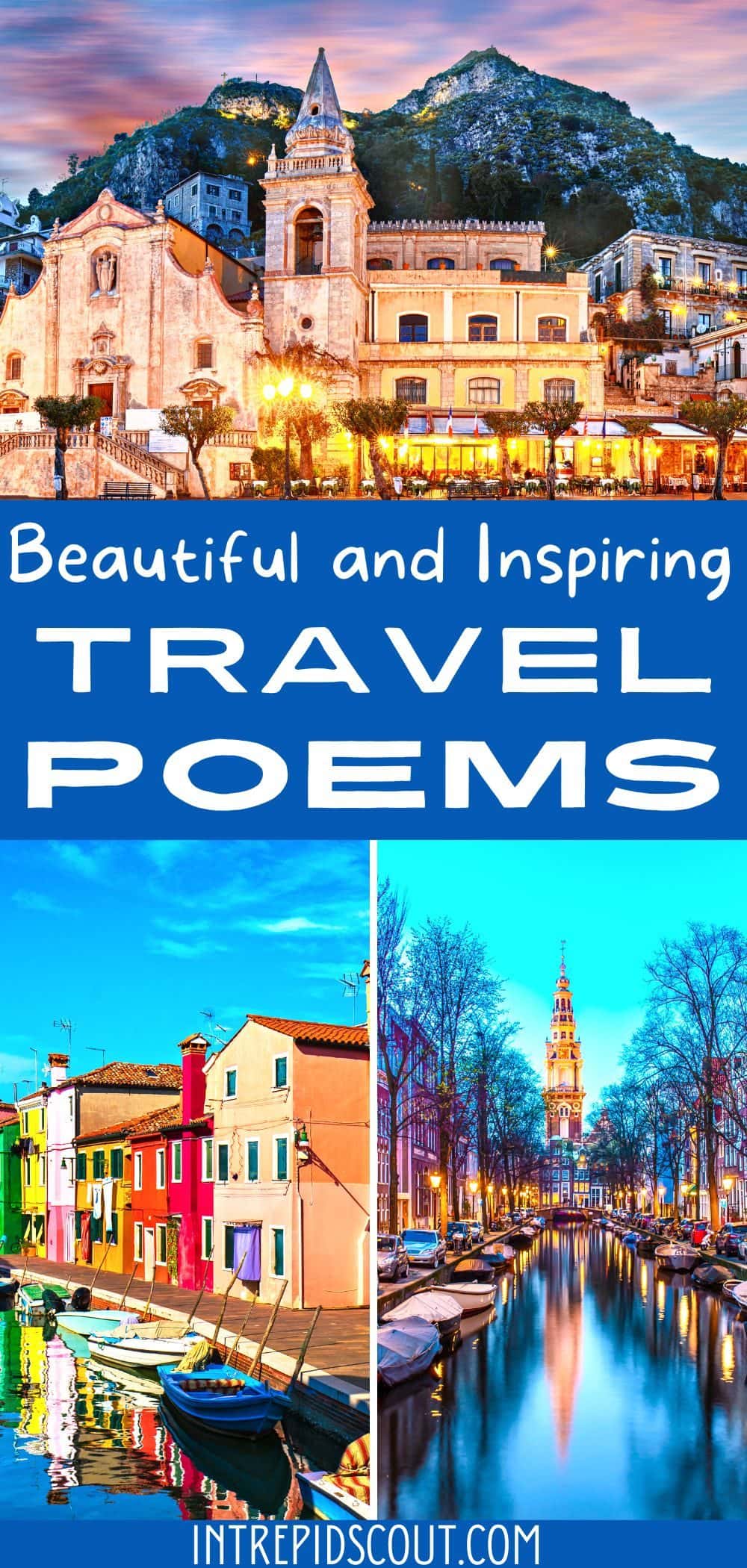
Poems About Travel
Now, It Is Your Turn, I Would Like to Hear Back from You!
What is your favorite poem about travel?
Please let me know and I will add it to the list!
- alert('URL copied to clipboard.')).catch(err => console.error('Unable to copy to clipboard.', err))">
Share via Email

218 Beautiful LAKE CAPTIONS and QUOTES to Accompany Your Lake Photos

181 Golden Hour Captions and Quotes Celebrating the Magical Time
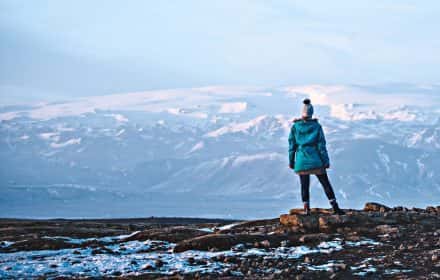
277 Solo Female Travel Quotes and Captions (Embrace Adventure and Independence)
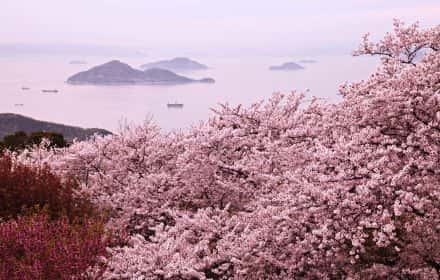
165 Beautiful CHERRY BLOSSOM QUOTES and CAPTIONS for Instagram

299 Gorgeous Tropical Vacation Captions and Quotes (Escape to Paradise)

235 Unforgettable FAMILY TRIP CAPTIONS and QUOTES (Perfect for Vacation Photos)
@intrepid.scout
Leave an answer Cancel reply
Your email address will not be published. Required fields are marked *
The company processes your data to facilitate the publication and management of comments. You can exercise your rights of access, rectification, deletion and objection, among others, according to our Privacy policy .

10 Beautiful Travel Poems For The Adventurer In You
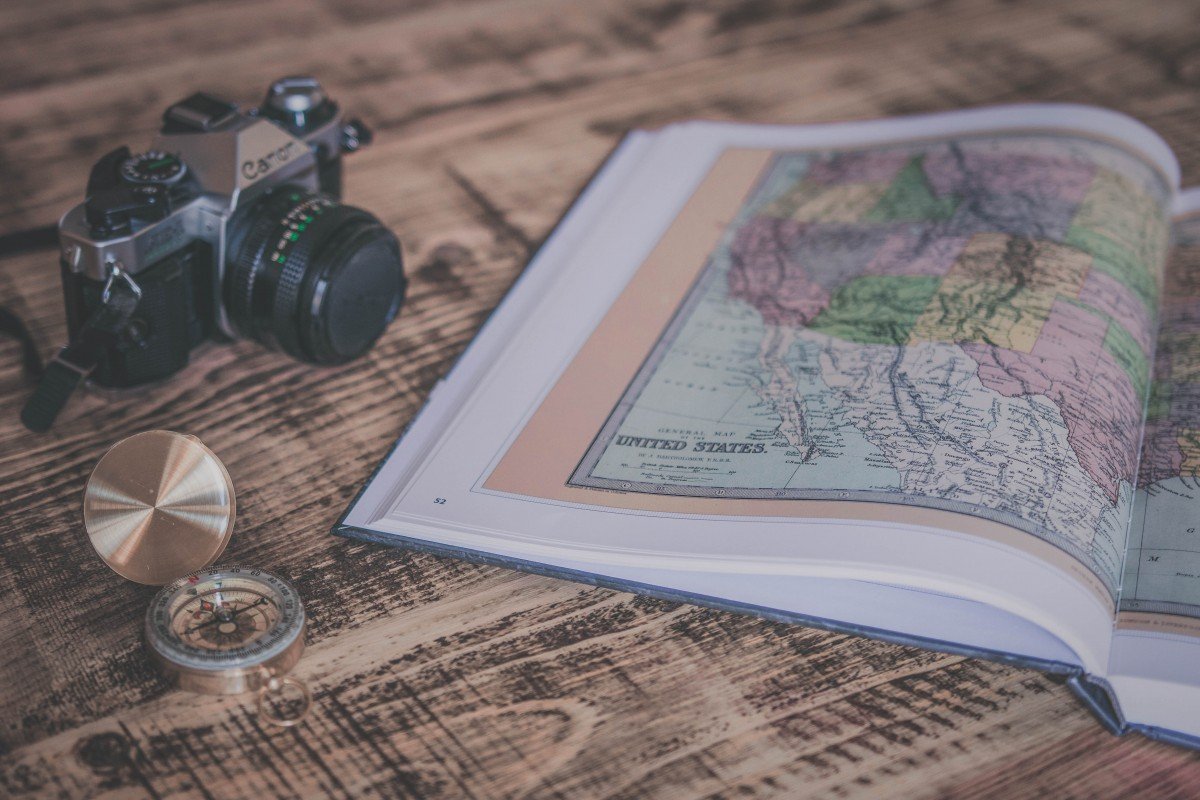
Travel poems breathe wanderlust into words. Here are ten beautiful travel poems for the adventurer in you.
Disclosure: Heads up, this post contains affiliate links, which means Passport To Eden may get a commission (at no extra cost to you) if you make an online purchase. Don’t feel pressured to buy anything. We still love that you’re here, reading our content (side note: we suggest getting a coffee or tea first because our blog posts tend to be long). You can read our full affiliate disclosure here to find out more.
Table of Contents
A Travel Poem For The Girl With Itchy Feet
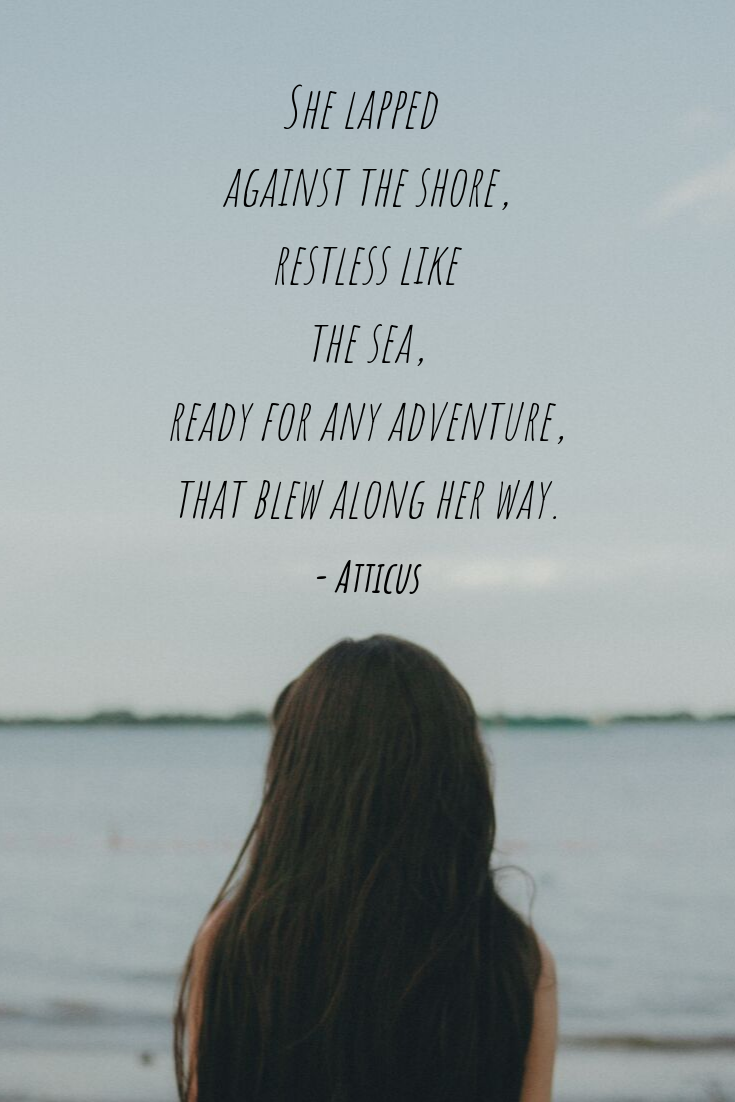
against the shore,
restless like
for any adventure,
that blew along her way
– Atticus
A Travel Poem For The One On A Journey. Any Journey.
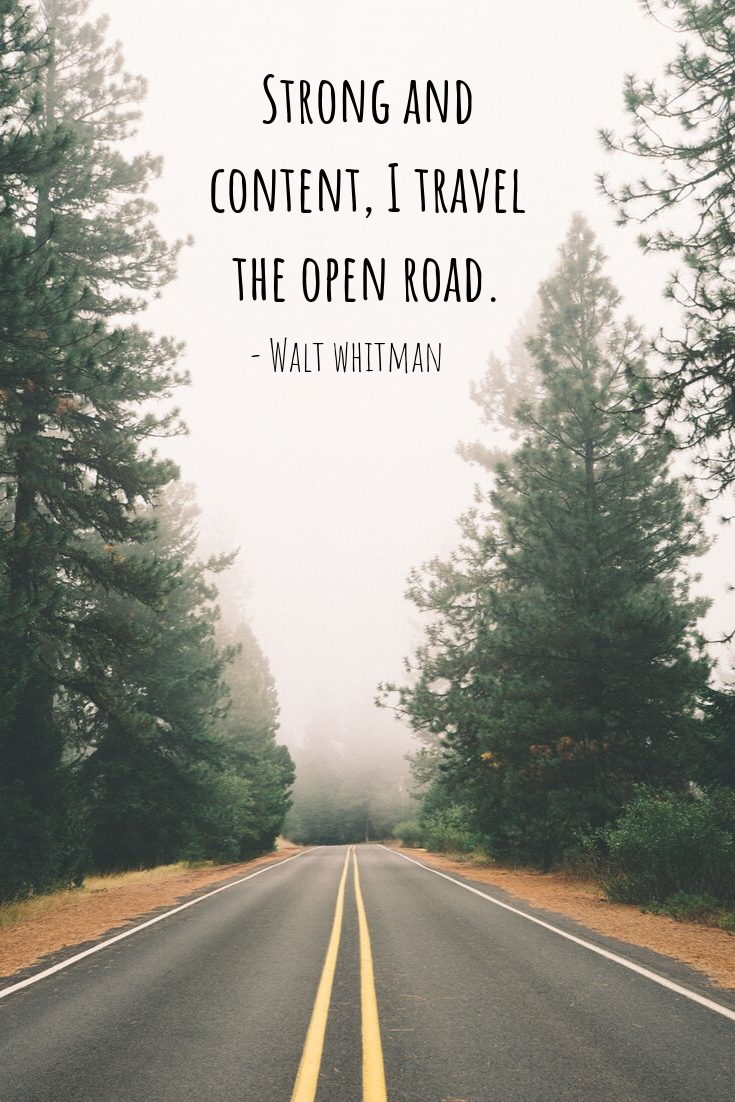
Afoot and light-hearted I take to the open road,
Healthy, free, the world before me,
The long brown path before me leading me wherever I choose,
Henceforth I ask not good-fortune, I myself am good-fortune,
Henceforth I whimper no more, postpone no more, need nothing,
Done with indoor complaints, libraries, querulous criticisms,
Strong and content I travel the open road.
– Walt Whitman, from Song of the Open Road
A Travel Poem That Sums Up Adventure In Four Gorgeous Lines
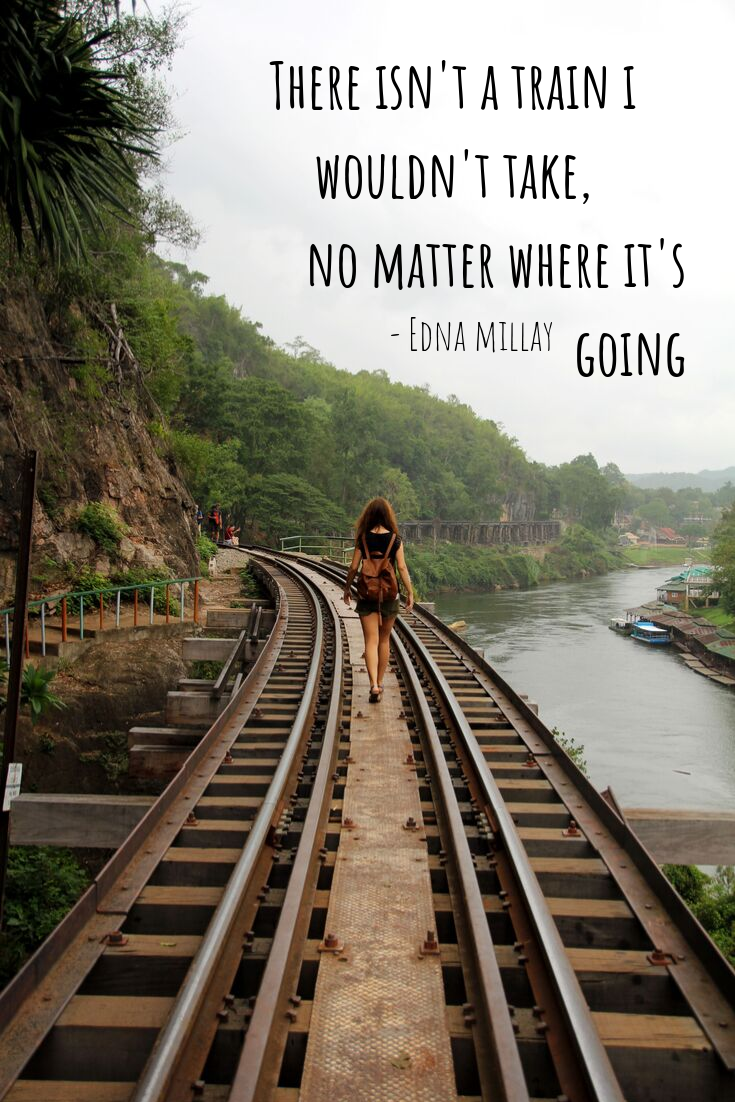
My heart is warm with the friends I make,
And better friends I’ll not be knowing,
Yet there isn’t a train I wouldn’t take,
No matter where it’s going.
– Edna St. Vincent Millay, from Travel
A Travel Poem From Margaret Atwood Because She Never Disappoints
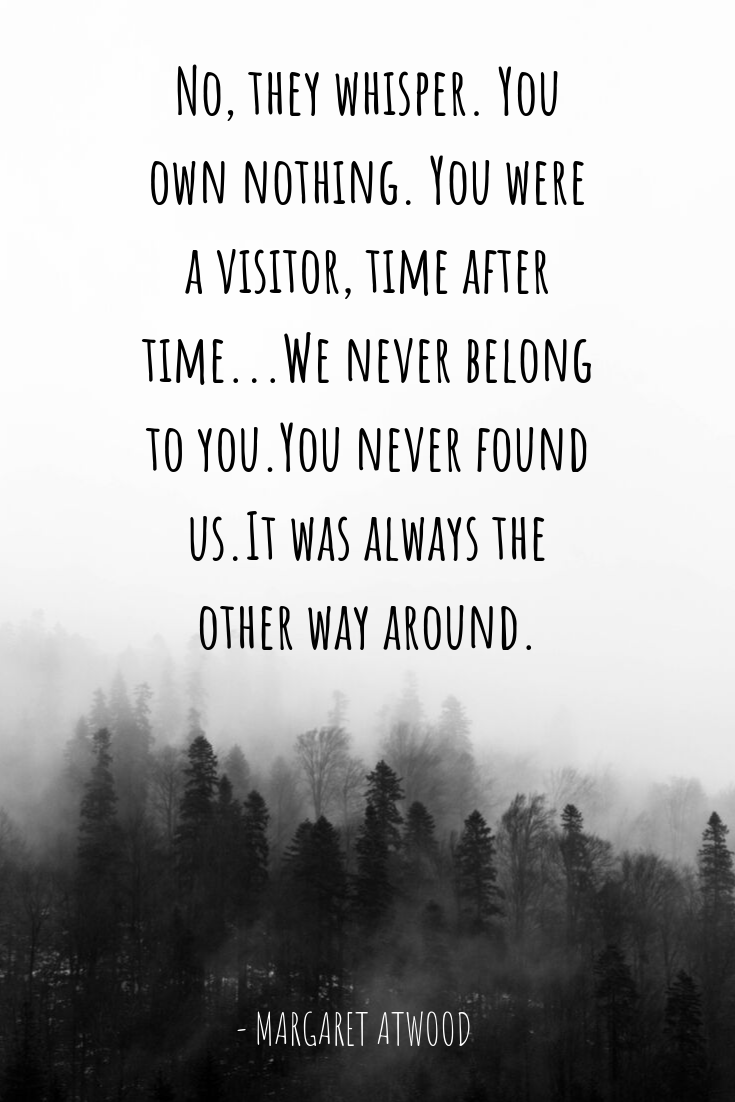
No, they whisper. You own nothing.
You were a visitor, time after time
climbing the hill, planting the flag, proclaiming.
We never belong to you.
You never found us.
It was always the other way around.
– Margaret Atwood, from The Moment
This Travel Poem Is Just Everything
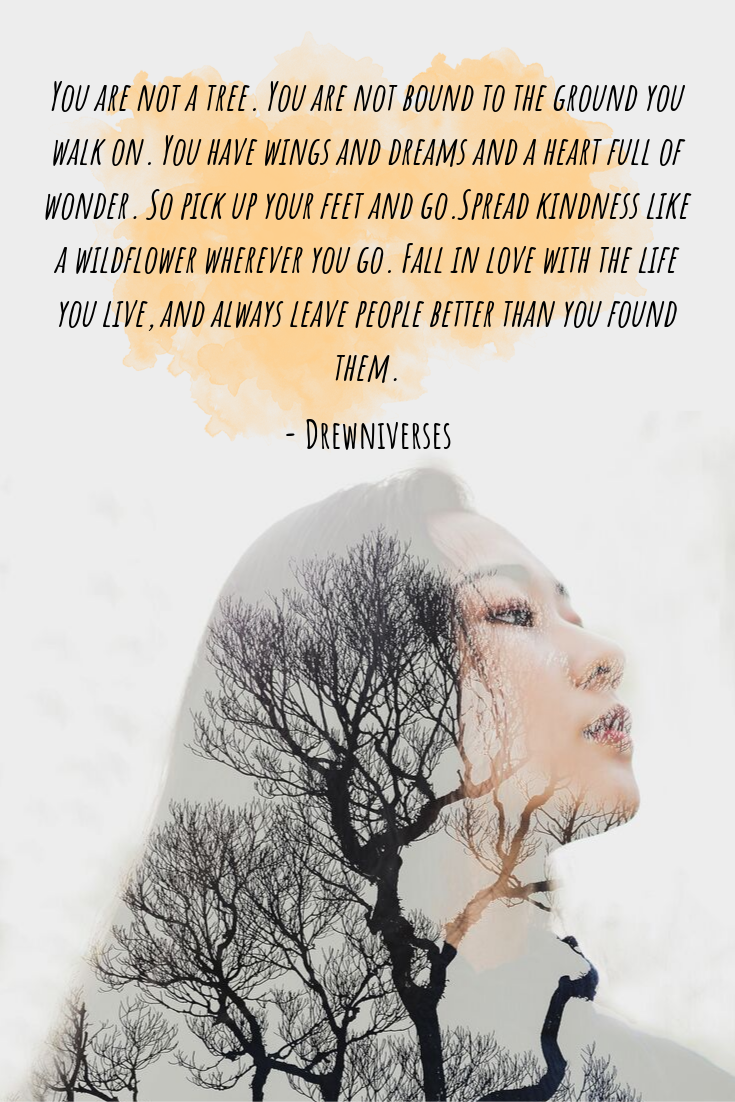
You are not a tree. You are not bound
to the ground you walk on. You have
wings and dreams and a heart full of
wonder. So pick up your feet and go.
Spread kindness like a wildflower
wherever you go. Fall in love with the
life you live, and always leave people
better than you found them.
– Drewniverses, from Tumblr
This 19th Century Travel Poem Is Just. So. Good.
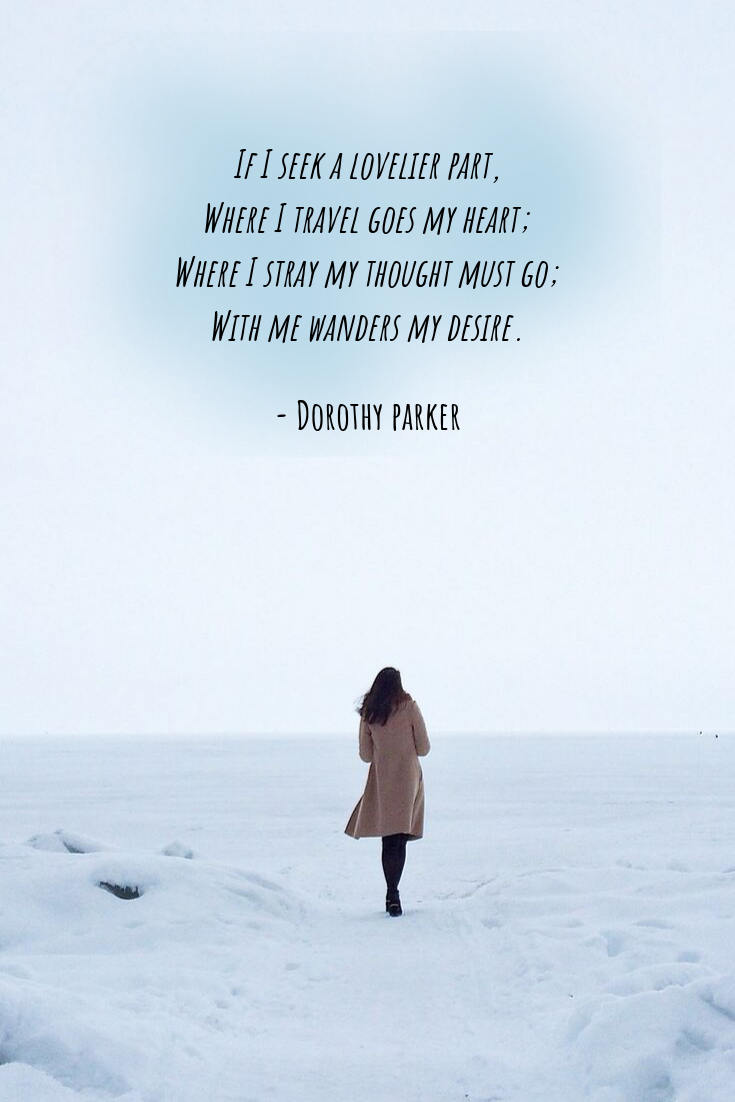
Half across the world from me
Lie the lands I’ll never see- I, whose longing lives and dies Where a ship has sailed away; I, that never close my eyes But to look upon Cathay.
Things I may not know nor tell Wait, where older waters swell; Ways that flowered at Sappho’s tread, Winds that sighed in Homer’s strings, Vibrant with the singing dead, Golden with the dust of wings.
Under deeper skies than mine, Quiet valleys dip and shine. Where their tender grasses heal Ancient scars of trench and tomb I shall never walk: nor kneel Where the bones of poets bloom.
If I seek a lovelier part, Where I travel goes my heart; Where I stray my thought must go; With me wanders my desire. Best to sit and watch the snow, Turn the lock, and poke the fire.
– Dorothy Parker, from Hearthside
If Only I Could Swallow This Modern Travel Poem
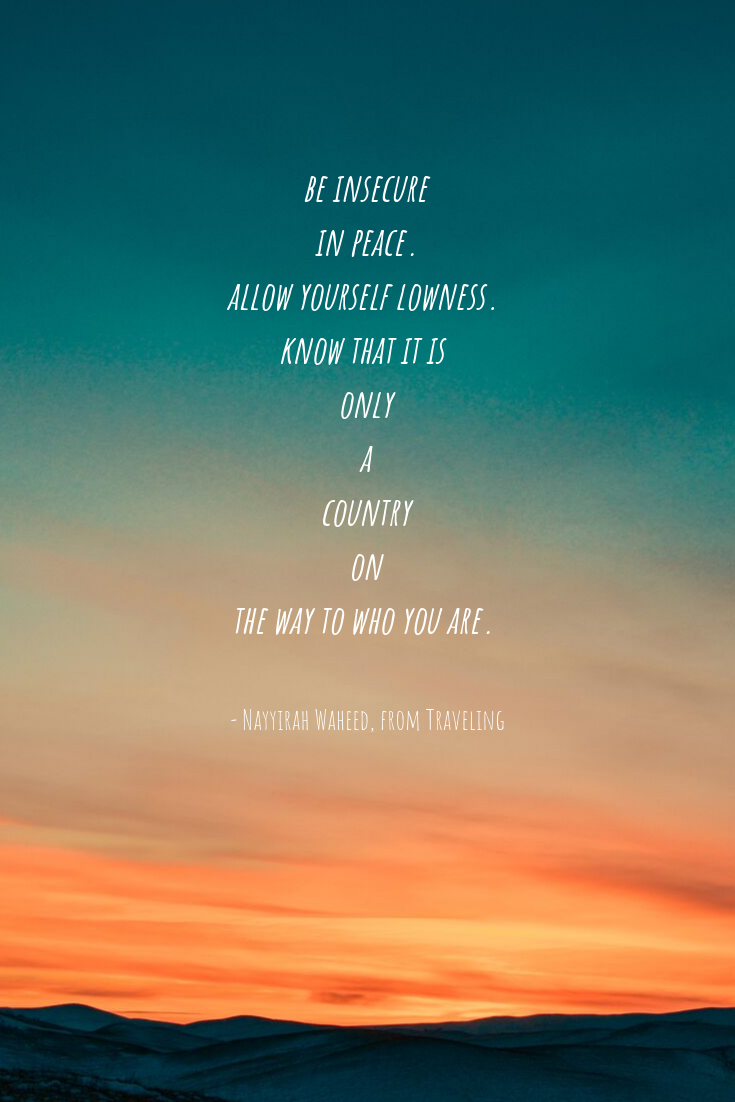
be insecure
allow yourself lowness.
know that it is
the way to who you are.
– Nayyirah Waheed, from Traveling
Then, There’s This Transcendent Travel Poem
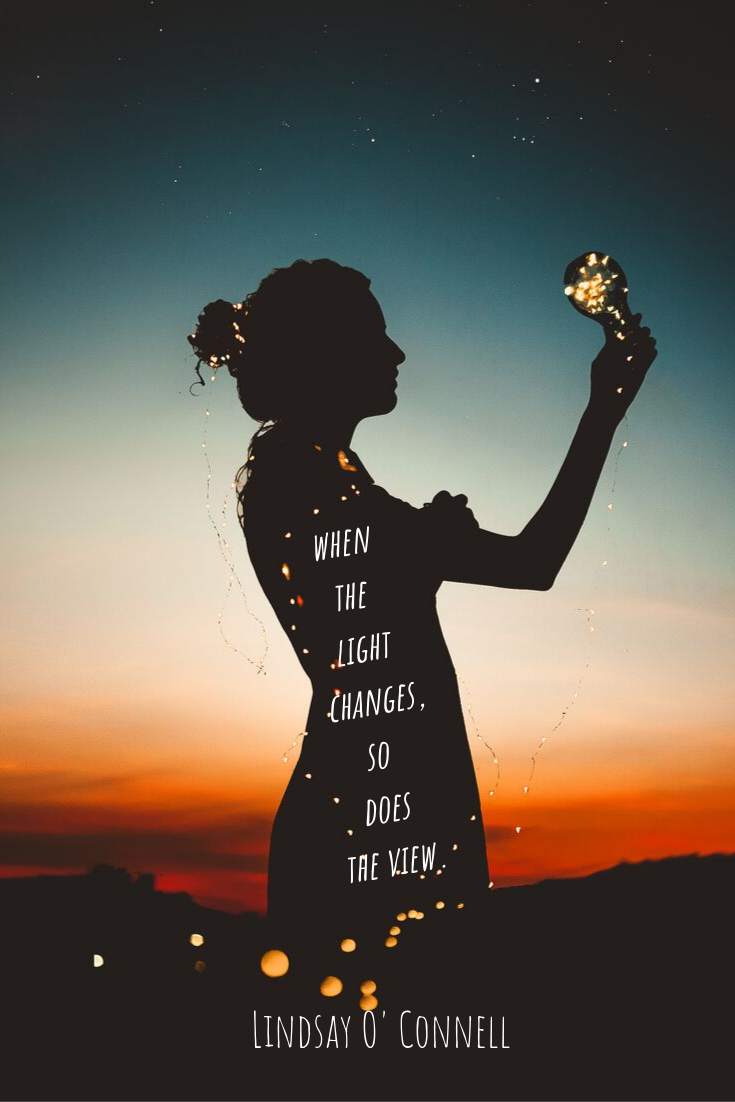
my eyes will remember
how to love the world
under changing skies.
when the light changes,
so does the view.
– Lindsay O’Connell
And This One
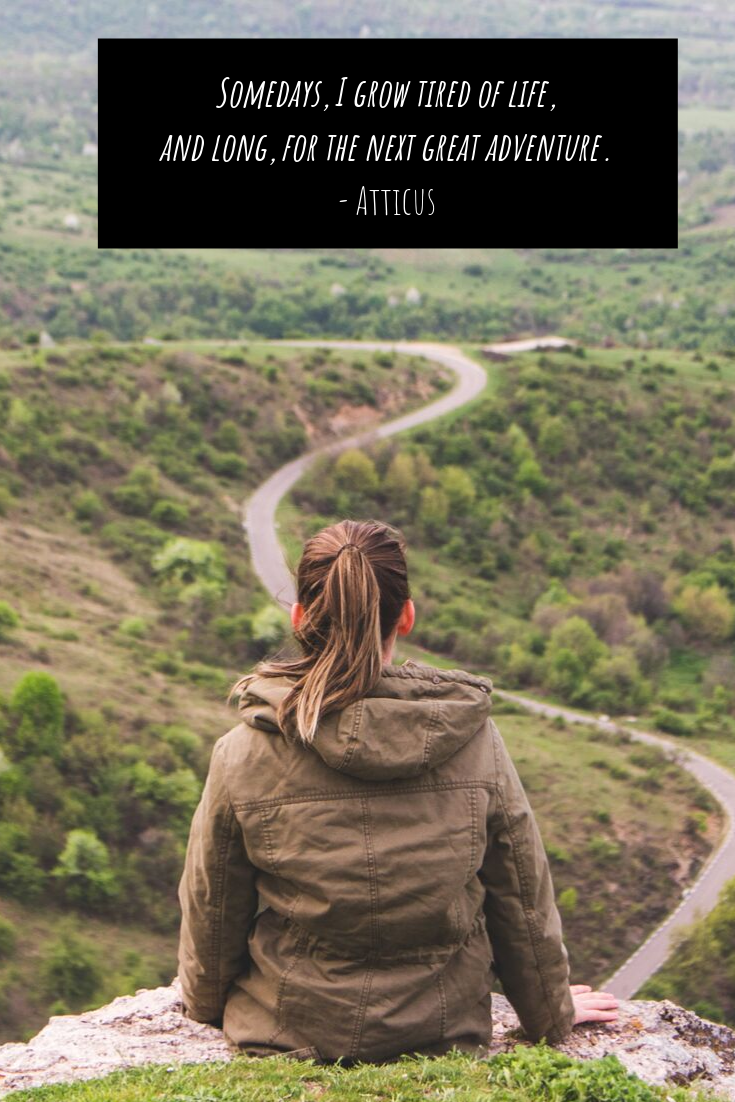
Somedays, I grow tired of life,
and long, for the next great adventure.
Finally, If You’re Waiting To Pack Your Bags And Go…
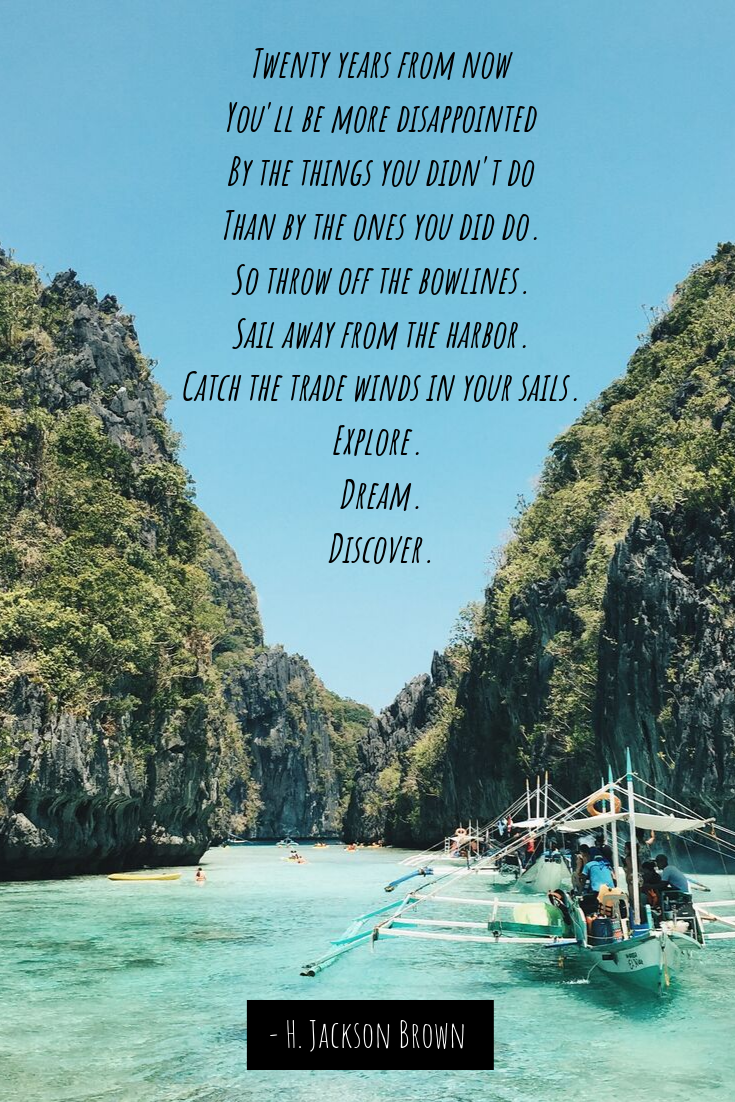
Twenty years from now
You’ll be more disappointed
By the things you didn’t do
Than by the ones you did do.
So throw off the bowlines.
Sail away from the harbor.
Catch the trade winds in your sails.
– H. Jackson Brown, from P.S. I Love You (well, sort of. It’s a quote from his mother).
Did you enjoy these travel poems? Let me know in the comments below which one of these travel poems was your favorite! Mine is definitely #5, but I love them all!
FOR THOSE WHO LOVE POETRY
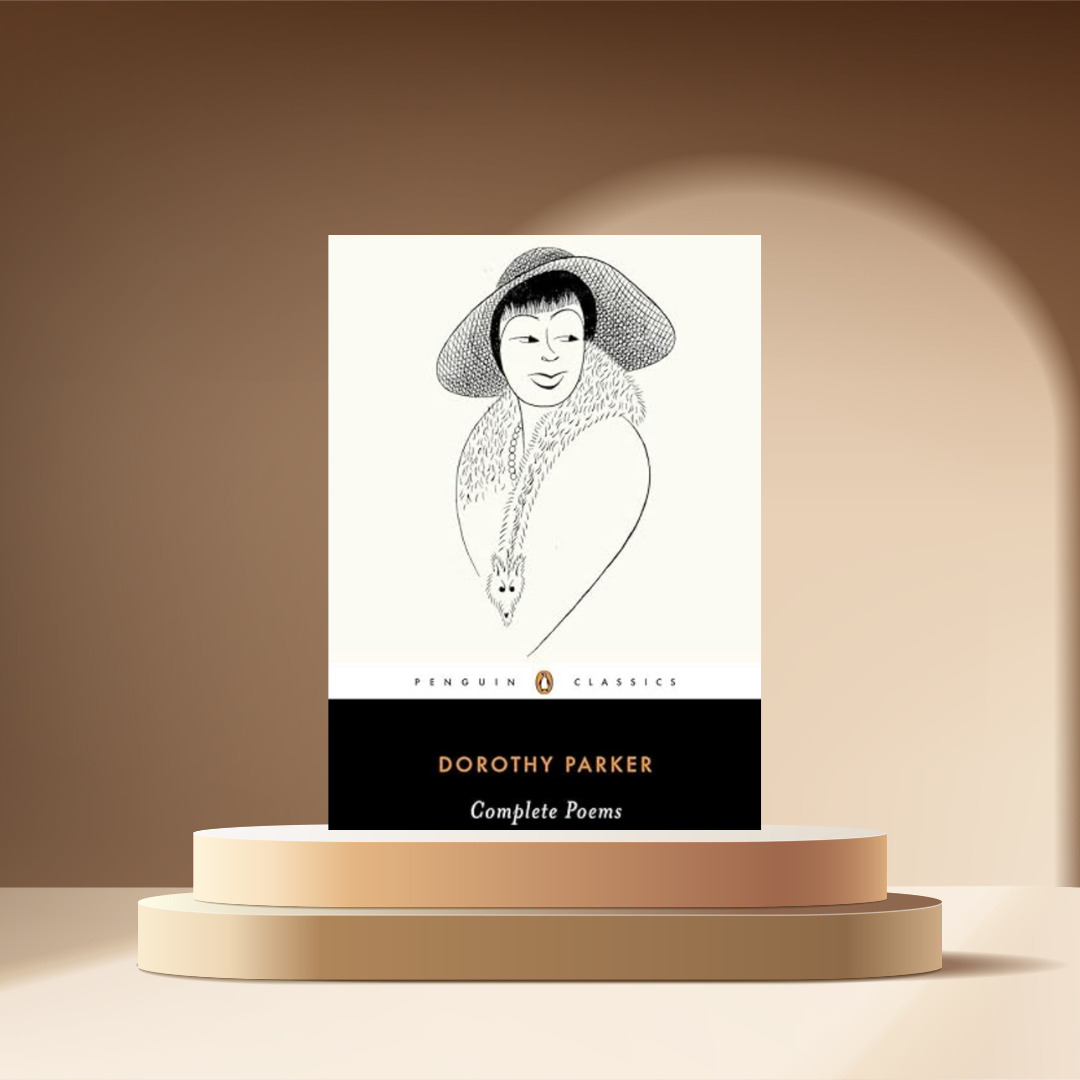
PENGUIN CLASSICS
Complete Poems
Dorothy Parker’s poem is our favorite on this list. If you loved it as much as we did, here’s a complete collection of her works
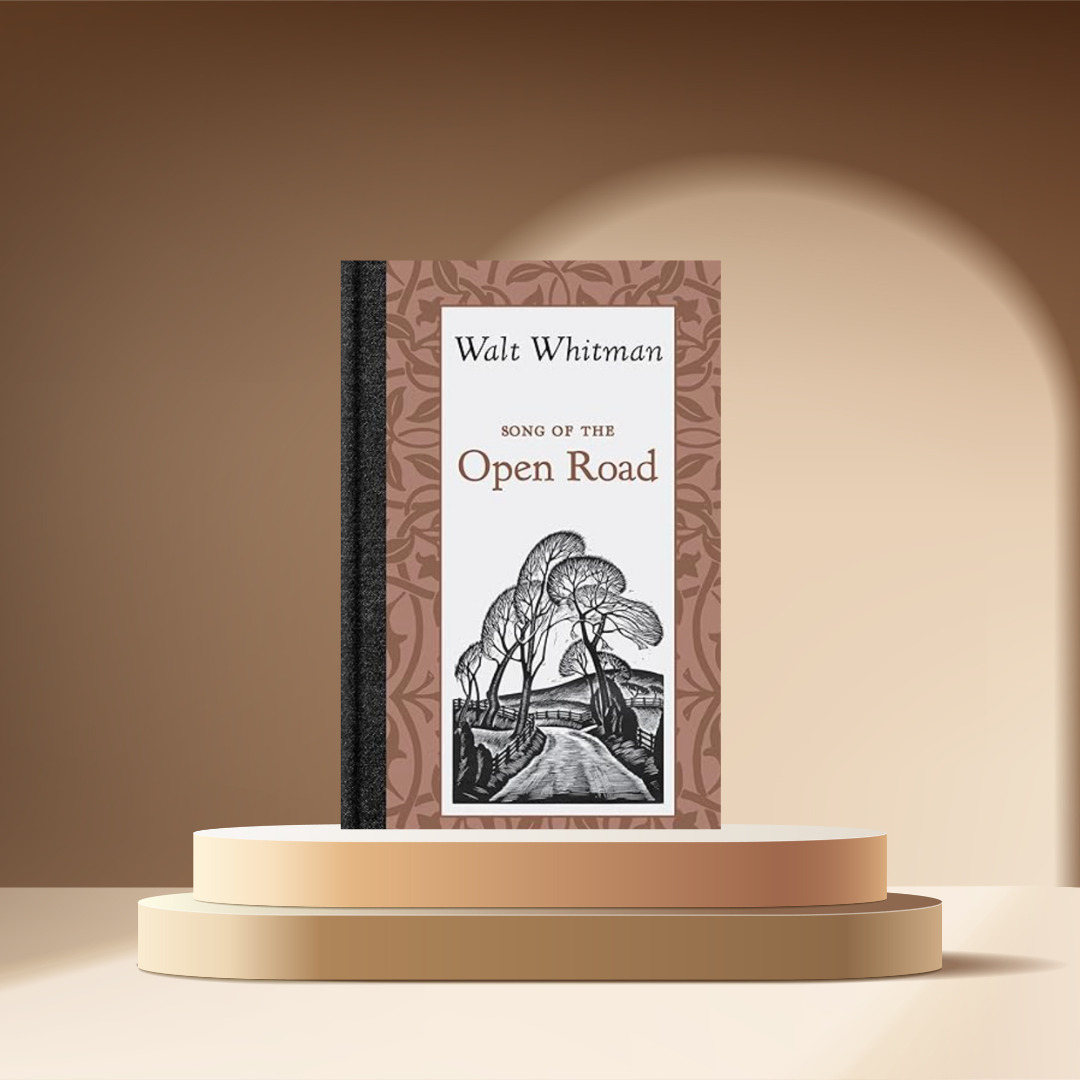
APPLEWOOD BOOKS
Song Of The Open Road
a hardcover edition of Walt Whitman’s poem about journeying, adventure, and finding yourself
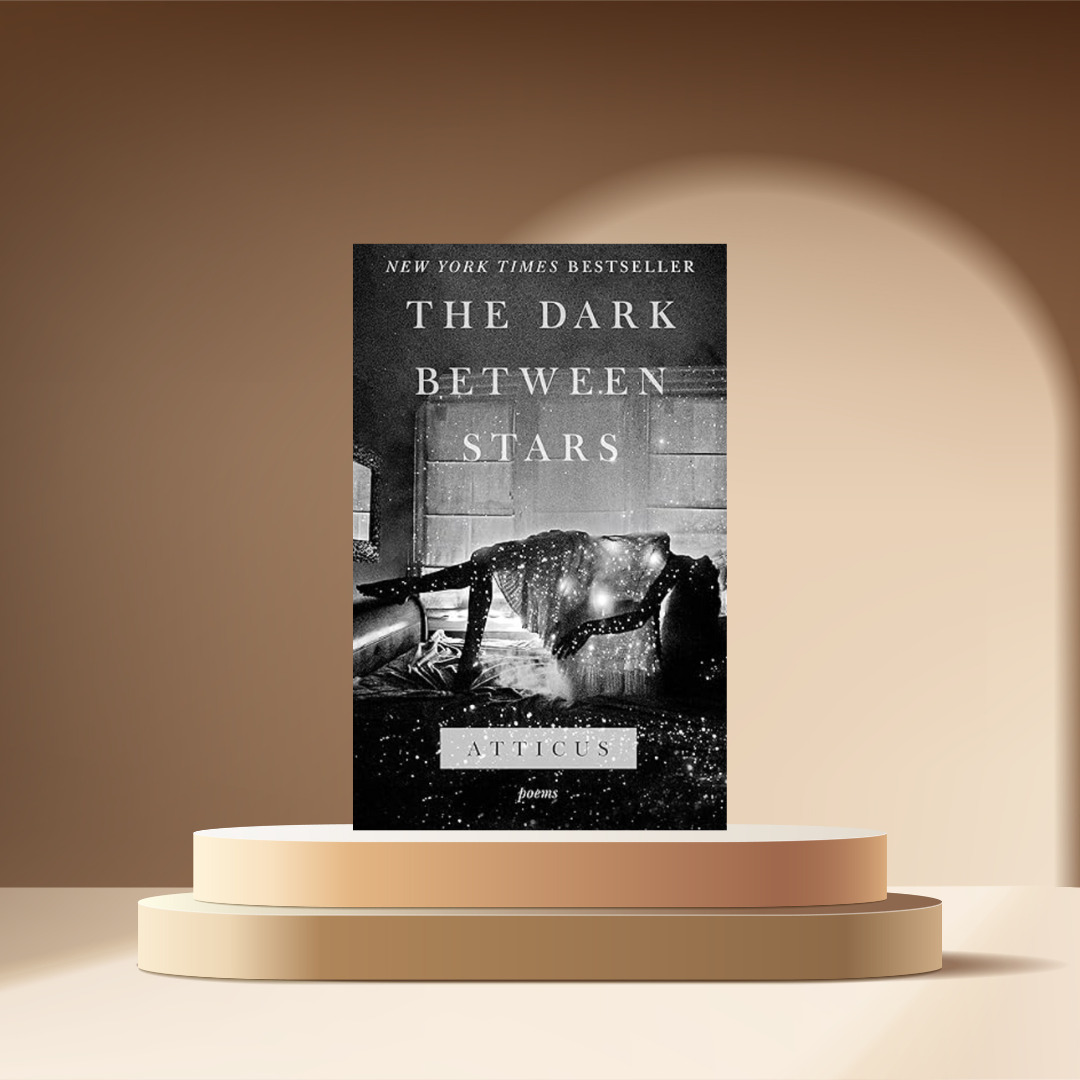
ATRIA BOOKS
The Dark Between Stars
for those who devoured Milk & Honey and Pillow Thoughts and want to read Atticus’ contribution to the Insta-popular poetry format
Editor-In-Chief
Anshula grew up with a love of stories and places. Thirty-five states and 100 bookstores later, she's made her hobbit home in Middle Tennessee. Her Tookish side still takes over and leaves her chasing window seats, literary destinations, adventure books, sunrise coffee, and indie bookshops. She's appeared as a travel source on HuffPost, Reader's Digest, and MSN.
Related Posts
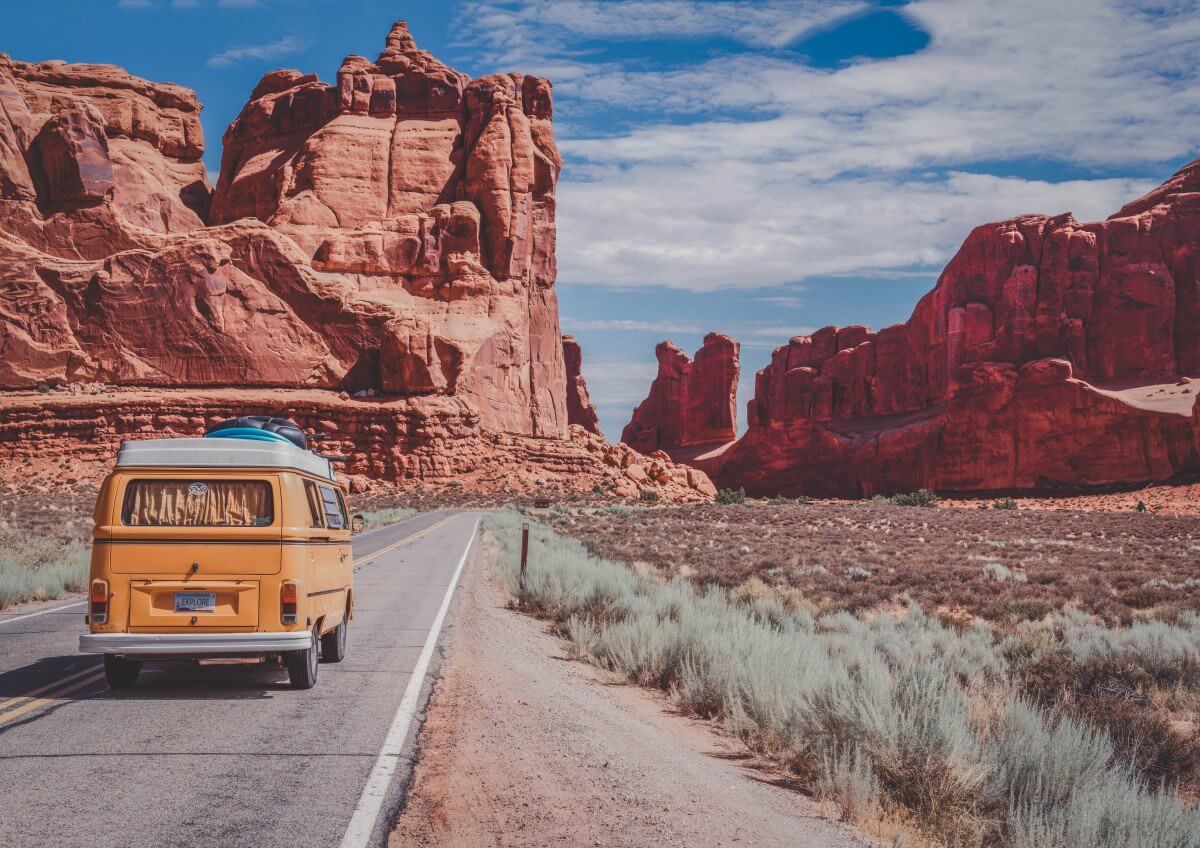
20 Travel Proverbs From Around The World
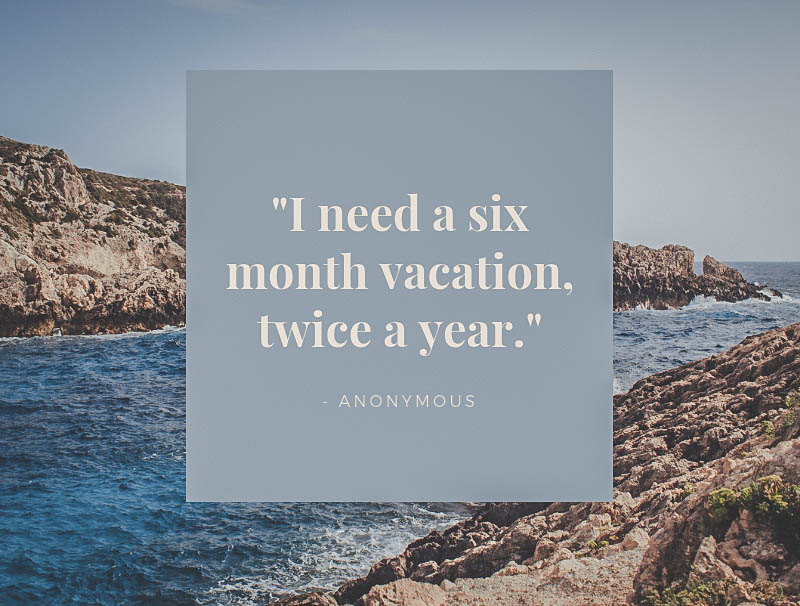
Funny Travel Quotes (That Are Laughably Relatable)
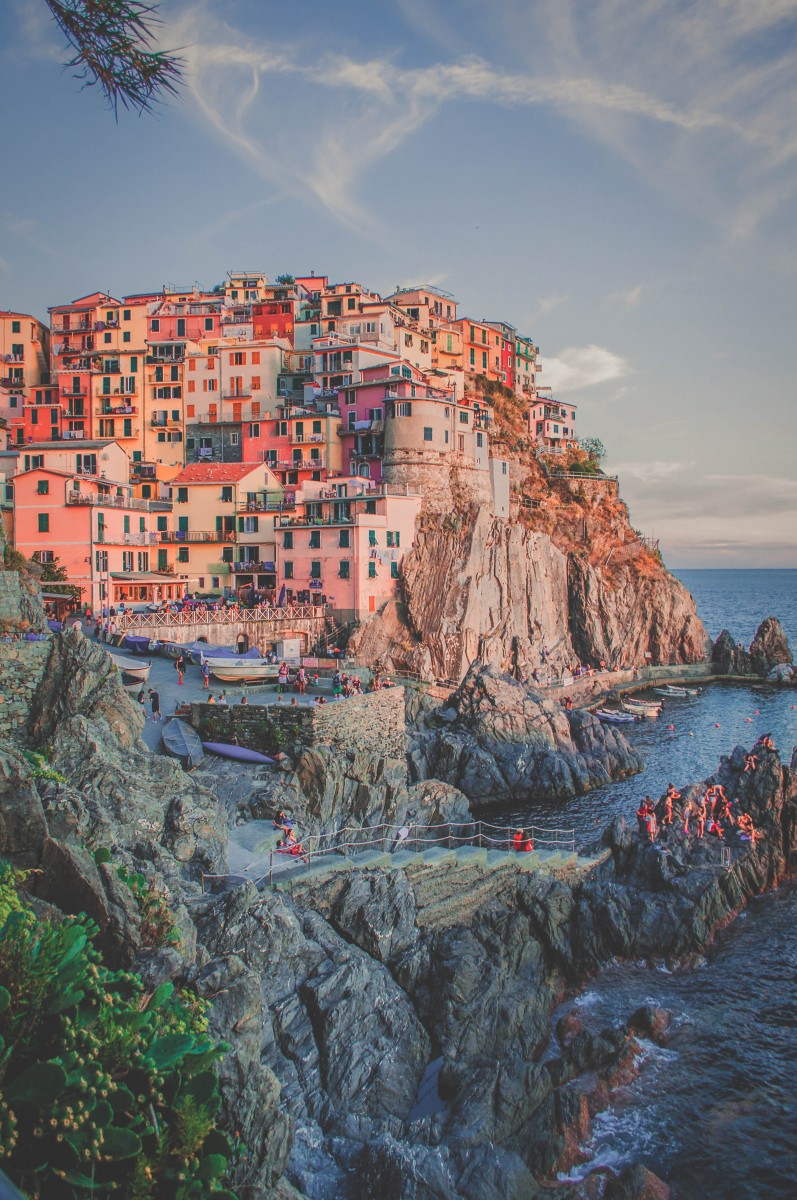
36 Eat Pray Love Quotes That Will Speak To Your Heart
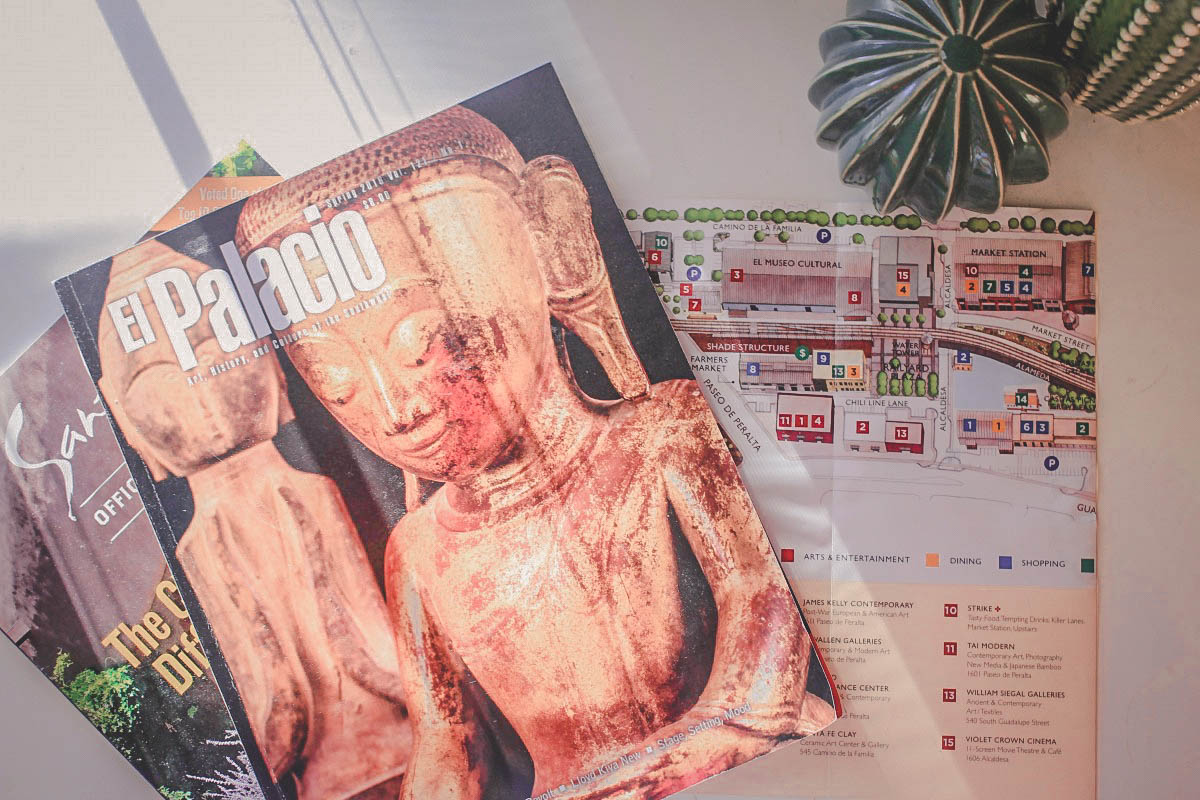
21 Best Travel Souvenir Ideas
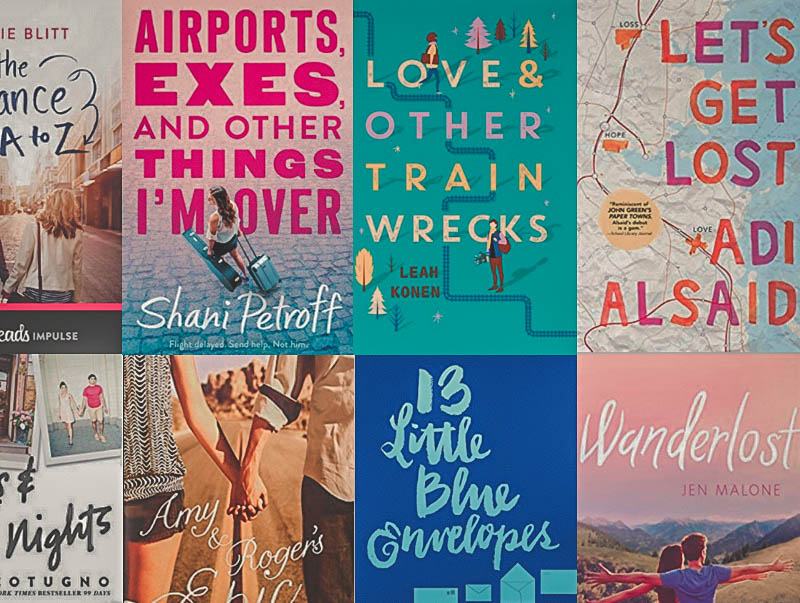
20 YA Travel Books For The Adventurer In You

55 Travel Journal Prompts
I love Atticus.
How beautiful, Anshula! These are so inspiring.
Dee ~ Vanilla Papers
I love these, thanks. Time to share to my friends on FB!
Leave a Reply Cancel reply
Your email address will not be published. Required fields are marked *
Notify me of new posts by email.
What are you looking for?
The best poems on travel
Discover some of the best poems about travel including verses from thomas hardy, walt whitman and edgar allan poe..
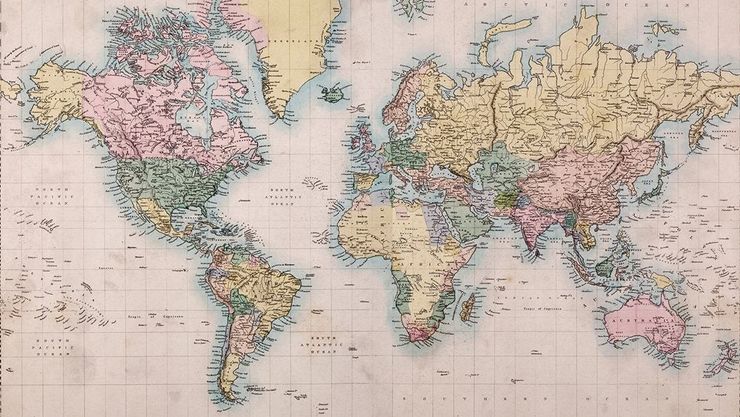
Here, we have gathered some of the greatest poems written about the allure of travel, and the wonders that can be discovered when we venture beyond our own doorsteps.
Discover our edit of the best poetry books.
From The Silverado Squatters
There are no foreign lands. It is the traveller only who is foreign.
Robert Louis Stevenson (1850–1894)
A Prayer for Travellers
May the road rise up to meet you.
May the wind be always at your back.
May the sun shine warm upon your face;
The rains fall soft upon your fields.
And until we meet again,
May God hold you in the palm of His hand.
On the World
The world’s an inn; and I her guest.
I eat; I drink; I take my rest.
My hostess, nature, does deny me
Nothing, wherewith she can supply me;
Where, having stayed a while, I pay
Her lavish bills, and go my way.
Francis Quarles (1592–1644)
If Once You Have Slept on an Island
If once you have slept on an island
You’ll never be quite the same;
You may look as you looked the day before
And go by the same old name,
You may bustle about in street and shop;
You may sit at home and sew,
But you’ll see blue water and wheeling gulls
Wherever your feet may go.
You may chat with the neighbors of this and that
And close to your fire keep,
But you’ll hear ship whistle and lighthouse bell
And tides beat through your sleep.
Oh, you won’t know why, and you can’t say how
Such change upon you came,
But – once you have slept on an island
You’ll never be quite the same!
Rachel Field (1894–1942)
Gaily bedight,
A gallant knight,
In sunshine and in shadow,
Had journeyed long,
Singing a song,
In search of Eldorado.
But he grew old –
This knight so bold –
And o’er his heart a shadow
Fell, as he found
No spot of ground
That looked like Eldorado.
And, as his strength
Failed him at length,
He met a pilgrim shadow –
‘Shadow,’ said he,
‘Where can it be –
This land of Eldorado?’
‘Over the Mountains
Of the Moon,
Down the Valley of the Shadow,
Ride, boldly ride,’
The shade replied,
‘If you seek for Eldorado!’
Edgar Allan Poe (1809–1849)
I met a traveller from an antique land
Who said: Two vast and trunkless legs of stone
Stand in the desert. Near them, on the sand,
Half sunk, a shattered visage lies, whose frown,
And wrinkled lip, and sneer of cold command
Tell that its sculptor well those passions read
Which yet survive (stamped on these lifeless things)
The hand that mocked them and the heart that fed:
And on the pedestal these words appear:
‘My name is Ozymandias, King of Kings:
Look on my works, ye Mighty, and despair!’
Nothing beside remains. Round the decay
Of that colossal wreck, boundless and bare
The lone and level sands stretch far away.
Percy Bysshe Shelley (1792–1822)
A Strip of Blue
I do not own an inch of land,
But all I see is mine, –
The orchard and the mowing fields,
The lawns and gardens fine.
The winds my tax-collectors are,
They bring me tithes divine, –
Wild scents and subtle essences,
A tribute rare and free;
And, more magnificent than all,
My window keeps for me
A glimpse of blue immensity, –
A little strip of sea.
Richer am I than he who owns
Great fleets and argosies;
I have a share in every ship
Won by the inland breeze,
To loiter on yon airy road
Above the apple-trees,
I freight them with my untold dreams;
Each bears my own picked crew;
And nobler cargoes wait for them
Than ever India knew, –
My ships that sail into the East
Across that outlet blue.
Sometimes they seem like living shapes, –
The people of the sky, –
Guests in white raiment coming down
From heaven, which is close by;
I call them by familiar names,
As one by one draws nigh,
So white, so light, so spirit-like,
From violet mists they bloom!
The aching wastes of the unknown
Are half reclaimed from gloom,
Since on life’s hospitable sea
All souls find sailing-room.
The ocean grows a weariness
With nothing else in sight;
Its east and west, its north and south,
Spread out from morn till night;
We miss the warm, caressing shore,
Its brooding shade and light.
Lucy Larcom (1824–1893)
O to sail in a ship,
To leave this steady unendurable land,
To leave the tiresome sameness of the streets,
the sidewalks and the houses,
To leave you, O you solid motionless land, and
entering a ship,
To sail and sail and sail!
Walt Whitman (1819–1892)
Midnight on the Great Western
In the third-class sat the journeying boy,
And the roof-lamp’s oily flame
Played down on his listless form and face,
Bewrapt past knowing to what he was going,
Or whence he came.
In the band of his hat the journeying boy
Had a ticket stuck; and a string
Around his neck bore the key of his box,
That twinkled gleams of the lamp’s sad beams
Like a living thing.
What past can be yours, O journeying boy,
Towards a world unknown,
Who calmly, as if incurious quite
On all at stake, can undertake
This plunge alone?
Knows your soul a sphere, O journeying boy,
Our rude realms far above,
Whence with spacious vision you mark and mete
This region of sin that you find you in
But are not of?
Thomas Hardy (1840–1928)
Give me the long, straight road before me,
A clear, cold day with a nipping air,
Tall, bare trees to run on beside me,
A heart that is light and free from care.
Then let me go! – I care not whither
My feet may lead, for my spirit shall be
Free as the brook that flows to the river,
Free as the river that flows to the sea.
Olive Runner
Poems for Travellers
By gaby morgan.
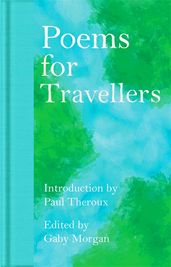
Poems for Travellers is part of the Macmillan Collector’s Library, with an introduction from the esteemed travel writer Paul Theroux. From Walt Whitman to Christina Rossetti, this collection contains some of the finest poems ever written about travel.
You may also like
Clive james: writer, poet and broadcaster 1939-2019, our edit of the greatest american poets, twelve autumn poems.
Solo Traveler
Solo travel tips, destinations, stories... the source for those who travel alone.
16 Best Poems About Travel and Life
December 17, 2021 by Tracey Nesbitt
We have compiled some of the best poems about travel into one post. They represent a wide variety of views and are taken from different time periods. They raise questions, share the joys of travel, and remind us to not take it for granted. Enjoy!

Table of Contents
If You Were in Cairo by Simon Constam
Members of the Solo Traveler Insiders , our premium membership program, were treated to a reading of this poem by the author at a recent virtual event.
If You Were in Cairo
If you were in Cairo, and I in Kampala; if you took to Phoenix, and I to Havana; if you sojourned in Saigon, and I in Phnom Penh even that short distance would deeply offend. And seeing as how I’d want to stay close to you, I’d find every which way to stay in touch with you.
If you moved to Tuvalu, to live or to work, And email was stalled and the phones didn’t work. I’d train clever pigeons to soar up above, to faithfully reach you with my missives of love.
I’d vouchsafe a letter with a monk in a monastery. I’d entrust my love note to an Amazon missionary. I’d hire a Sherpa to mountain climb after you on Everest, on Lhotse, Nanga Parbat or K2…
I would do anything to keep myself close to you. I’d learn Swahili, Hindi, and even Urdu. No hurdle of language I’d have to confront, could ever deter my untiring want.
You can travel as far and as long as you like by plane, train, or boat, by car or by bike. I’d find a way, some way, to reach out to you, I’d even use snail mail if I absolutely had to.
If you flew supersonically out into the blue, I’d radio the pilot to tell you I love you. If you pined for space travel and lived in the shuttle, and our back and forth was a quite public muddle, and officials below and your crewmates above had all grown quite tired of such raging, unending, fulsome, embarrassing love,
no matter the trouble I’d have surely incurred, I’d carry on calling, could not be deterred by pleading from NASA, complaints or protests, they’d have to come get me, put me under arrest.
If not-talking was something that you took a vow for, I’d read to you, sing to you, whatever you’d need me to. I’d learn to lip read and learn to sign too There’s really no end to what I would do.
I’d follow you through darkness. I’d follow you through rain. My daily attention might drive you insane.
Have I made my point clear? You have nothing to fear I’m resourceful enough to keep loving you.
So great is my love, I am indefatigable . When it comes to you, love, I can’t stop loving you!

Viaggiate by Gio Evan
I recently came across this poem when a friend shared it on Facebook. From what I can piece together (most information I could find about him is written in Italian, so I am at the mercy of Google Translate) Gio Evan spent about eight years traveling around India, South America, and Europe by bike. Perhaps the inspiration for this piece came from his journey. His website describes him as a “multifaceted artist, writer and poet, philosopher, humorist, performer, songwriter and street artist.”
New poems about travel don't come along every day, so this one is a nice surprise. Evan encourages us to travel for learning and personal growth, greater understanding and acceptance, and a feeling of connection to the world.
As I was unable to find an official English translation, I have posted the poem in the original Italian, straight from Evan's Facebook page, alongside the English version I first read online.
Travel/Viaggiate

Consolation by Billy Collins
This poem, by former US Poet Laureate Billy Collins, who was the first recipient of the Mark Twain Prize for Humor in Poetry, celebrates the time we spend at home. It encourages us to appreciate our time not traveling as much as our time traveling. It takes on a slightly different meaning now, at a time when none of us can travel
Consolation
How agreeable it is not to be touring Italy this summer, wandering her cities and ascending her torrid hilltowns. How much better to cruise these local, familiar streets, fully grasping the meaning of every roadsign and billboard and all the sudden hand gestures of my compatriots. There are no abbeys here, no crumbling frescoes or famous domes and there is no need to memorize a succession of kings or tour the dripping corners of a dungeon. No need to stand around a sarcophagus, see Napoleon's little bed on Elba, or view the bones of a saint under glass. How much better to command the simple precinct of home than be dwarfed by pillar, arch, and basilica. Why hide my head in phrase books and wrinkled maps? Why feed scenery into a hungry, one-eyes camera eager to eat the world one monument at a time? Instead of slouching in a café ignorant of the word for ice, I will head down to the coffee shop and the waitress known as Dot. I will slide into the flow of the morning paper, all language barriers down, rivers of idiom running freely, eggs over easy on the way. And after breakfast, I will not have to find someone willing to photograph me with my arm around the owner. I will not puzzle over the bill or record in a journal what I had to eat and how the sun came in the window. It is enough to climb back into the car as if it were the great car of English itself and sounding my loud vernacular horn, speed off down a road that will never lead to Rome, not even Bologna.
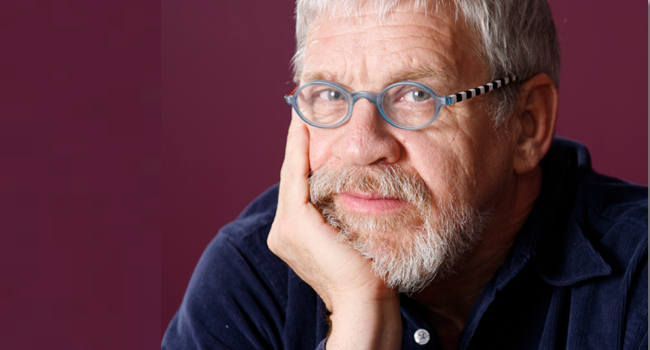
Dislocation by Simon Constam
People who don't travel a lot don't always understand how hard it can be. They often mistake traveling for taking a holiday. But they are very different things. Traveling, especially long term, challenges and stretches one in many ways. Time constraints on short trips can cause you to explore from morning to night, returning at the end exhausted yet ready to do it again the next day.
Dislocation
I envy those who envy me for traveling. Sometimes I sit on a foreign street in a busy cafe, imagining you wishing you were here, feeling for the first time the thrilling flush of wanting to be elsewhere, the frisson of happiness that wishes bring. And so I sit quietly knowing that now it’s time to figure out just what it is I meant to do here.
Of this poem about travel, Simon says: “I wrote Dislocation back when I was 19, in the middle of my round-the-world trip. The meaning and purpose of travel is not always evident. To build confidence, some would say. To open one's eyes, say others. And some would say to realize their destinies. I would often sit at an outdoor cafe wondering what it was exactly I was doing while the wheels and gears of everyday were spinning relentlessly at home.”
You can follow Simon on Instagram @dailyferocity where he publishes a new aphorism every day, or sign up to receive them by email .
More Thoughtful Posts
Travel Memories to Last a Lifetime Solo Travel to Cope with Loss
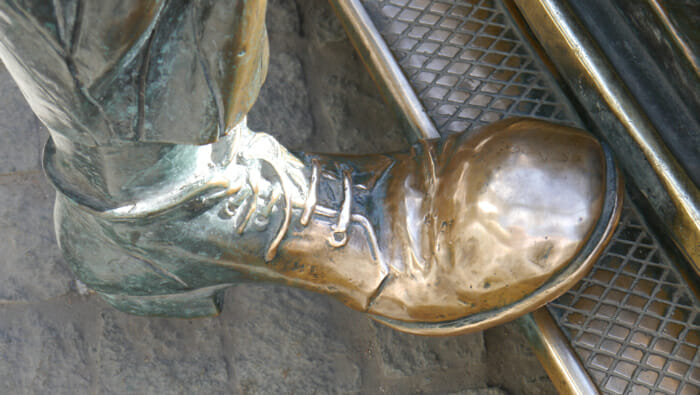
Learning to Travel by Julene Tripp Weaver
Traveling long-term allows you to travel slowly. In fact, it demands that you travel slowly. And what are the benefits of that? It's about learning the language, cooking with an old woman, having children knock on your door when something exciting is happening. How wonderful.
But then, in this poem by Julene Tripp Weaver, the circus comes to town. New opportunities arise. And the traveler picks up and follows the opportunities “beneath the throw of the knife”. They ignore the risk of leaving what is comfortable and explore new horizons.
Learning to Travel
She will learn French, enough to greet and shop become known. A French baker befriends her. After a long summer she stays on into the fall writes poems, picks wild herbs. An old woman cooks with her. They sit in silence while the sun sets. In the evening she lights candles, when hungry they share bread and cheese. A circus comes to town, young children knock on her door to watch elephants parade in the street. Tents are raised. A knife thrower invites her for his act. The wind of flying knives pulses dreams of moving on with the circus until there is no question. She will go. She pulls together a bag says goodbye to the old woman to the baker, to the children, moves to the next town beneath the throw of the knife.

Majorca by John Cooper Clarke
Instead of treating travel with reverence, this poem offers another truth about travel which is not quite, well, reverential. As Clarke says in his intro, it's about holiday packages. Love them or hate them, most of us can relate to this poem in one way or another.
Don't miss hearing Clarke perform this piece himself by scrolling to the bottom of the poem.
fasten your seatbelts says a voice inside the plane you can't hear no noise engines made by rolls royce take your choice …make mine majorca check out the parachutes can't be found alert those passengers they'll be drowned a friendly mug says “settle down” when i came round i was gagged and bound …for Majorca and the eyes caress the neat hostess her unapproachable flip finesse i found the meaning of the word excess they've got little bags if you wanna make a mess i fancied Cuba but it cost me less …to Majorca (Whose blonde sand fondly kisses the cool fathoms of the blue mediteranean) they packed us into the white hotel you could still smell the polycell wet white paint in the air-conditioned cells the waiter smelled of fake Chanel Gaulois… Garlic as well says if i like… i can call him “Miguel” …well really i got drunk with another fella who'd just brought up a previous paella he wanted a fight but said they were yella' …in Majorca the guitars rang and the castinets clicked the dancer's stamped and the dancer's kicked it's likely if you sang in the street you'd be nicked the double diamond flowed like sick mother's pride, tortilla and chips pneumatic drills when you try to kip …in Majorca a stomach infection put me in the shade must have been something in the lemonade but by the balls of franco i paid had to pawn my bucket and spade next year I'll take the international brigade …to Majorca
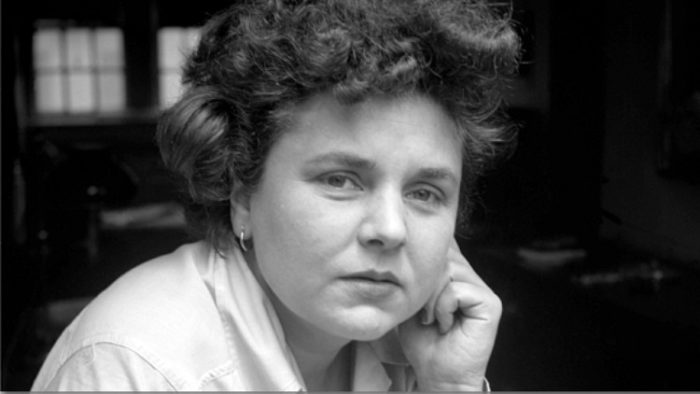
Questions of Travel by Elizabeth Bishop
Why do we travel? Is it, as Elizabeth Bishop suggests, a lack of imagination?
Elizabeth Bishop (1911-1979) is considered one of the great American poets of the 20th century. Enjoy this beautiful poem about travel.
Questions of Travel
There are too many waterfalls here; the crowded streams hurry too rapidly down to the sea, and the pressure of so many clouds on the mountaintops makes them spill over the sides in soft slow-motion, turning to waterfalls under our very eyes. –For if those streaks, those mile-long, shiny, tearstains, aren't waterfalls yet, in a quick age or so, as ages go here, they probably will be. But if the streams and clouds keep travelling, travelling, the mountains look like the hulls of capsized ships, slime-hung and barnacled.
Think of the long trip home. Should we have stayed at home and thought of here? Where should we be today? Is it right to be watching strangers in a play in this strangest of theatres? What childishness is it that while there's a breath of life in our bodies, we are determined to rush to see the sun the other way around? The tiniest green hummingbird in the world? To stare at some inexplicable old stonework, inexplicable and impenetrable, at any view, instantly seen and always, always delightful? Oh, must we dream our dreams and have them, too? And have we room for one more folded sunset, still quite warm?
But surely it would have been a pity not to have seen the trees along this road, really exaggerated in their beauty, not to have seen them gesturing like noble pantomimists, robed in pink. –Not to have had to stop for gas and heard the sad, two-noted, wooden tune of disparate wooden clogs carelessly clacking over a grease-stained filling-station floor. (In another country the clogs would all be tested. Each pair there would have identical pitch.) –A pity not to have heard the other, less primitive music of the fat brown bird who sings above the broken gasoline pump in a bamboo church of Jesuit baroque: three towers, five silver crosses. –Yes, a pity not to have pondered, blurr'dly and inconclusively, on what connection can exist for centuries between the crudest wooden footwear and, careful and finicky, the whittled fantasies of wooden footwear and, careful and finicky, the whittled fantasies of wooden cages. –Never to have studied history in the weak calligraphy of songbirds' cages. –And never to have had to listen to rain so much like politicians' speeches: two hours of unrelenting oratory and then a sudden golden silence in which the traveller takes a notebook, writes:
“Is it lack of imagination that makes us come to imagined places, not just stay at home? Or could Pascal have been not entirely right about just sitting quietly in one's room?
Continent, city, country, society: the choice is never wide and never free. And here, or there . . . No. Should we have stayed at home, wherever that may be?”
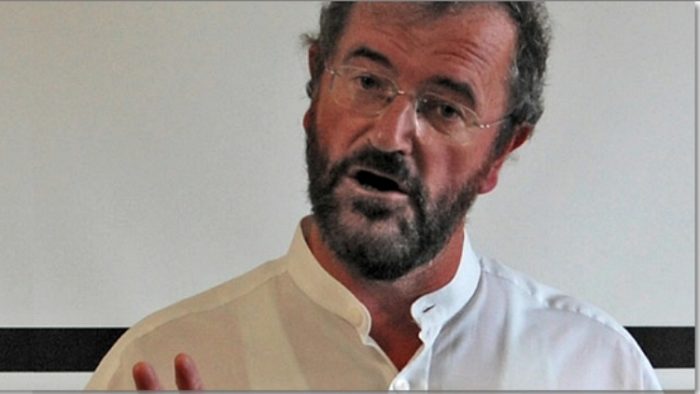
For the Traveler by John O’Donohue
Aren't poetry and travel simply two different modes of exploring the world? Of learning who we are, what we believe, and how it all fits together?
When we are surrounded by family and friends, we are subject to their expectations of us. Our behavior, even our thoughts, are circumscribed by a desire for acceptance. Traveling solo you have time to discover who you are, what's really in your heart, when no one is looking.
John O'Donohue was born in 1956 and died in 2008. An Irish scholar, philosopher, priest, and poet, his first published work was “Anam Cara” which holds a wonderful quote for solo travelers:
“When you cease to fear your solitude, a new creativity awakens in you. Your forgotten or neglected wealth begins to reveal itself. You come home to yourself and learn to rest within. Thoughts are our inner senses. Infused with silence and solitude, they bring out the mystery of inner landscape.”
For the Traveler
Every time you leave home, Another road takes you Into a world you were never in. New strangers on other paths await. New places that have never seen you Will startle a little at your entry. Old places that know you well Will pretend nothing Changed since your last visit. When you travel, you find yourself Alone in a different way, More attentive now To the self you bring along, Your more subtle eye watching You abroad; and how what meets you Touches that part of the heart That lies low at home: How you unexpectedly attune To the timbre in some voice, Opening in conversation You want to take in To where your longing Has pressed hard enough Inward, on some unsaid dark, To create a crystal of insight You could not have known You needed To illuminate Your way. When you travel, A new silence Goes with you, And if you listen, You will hear What your heart would Love to say. A journey can become a sacred thing: Make sure, before you go, To take the time To bless your going forth, To free your heart of ballast So that the compass of your soul Might direct you toward The territories of spirit Where you will discover More of your hidden life, And the urgencies That deserve to claim you. May you travel in an awakened way, Gathered wisely into your inner ground; That you may not waste the invitations Which wait along the way to transform you. May you travel safely, arrive refreshed, And live your time away to its fullest; Return home more enriched, and free To balance the gift of days which call you.

The Lady in 38C by Lori Jakiela
Traveling on a regular basis, flight attendants have a chance to see the world. Serving hundreds of people every day from different cultures, different economic classes, genders, ages, and every other attribute that contributes to making individuals unique, they are positioned to observe and appreciate the human condition.
Poet Lori Jakiela worked for Delta Air Lines for six years. She is now a professor at The University of Pittsburgh-Greensburg.
This poem is about unadulterated joy. Using her experience as a flight attendant, Jakiela focuses us on how we often miss the joy that life has to offer.
The Lady in 38C
The Lady in 38 C gets confused. She thinks I'm her nurse. “Nurse!” she yells. “My finger!” So I bring her a band-aid and put it on even though she's fine. “Oh thank you nurse!” she yells. “You're a good one.” She winks and smiles and the woman next to her glares into her computer. I think the old lady's charming. She's 86, still pretty. Her eyes are blue. Her hair is a cloud. She looks exactly like what's outside. She's the only air in this cabin, the only light. “Nurse!” she yells, and I look back over the sad heads, eggs in a carton, faces pressed against the mite-ridden blankets and pillows they fought for, and there she is, beaming. “Nurse,” she says. “Where are we?” I take her hand and look out the window. I scratch my head, smile and say, “Somewhere over Idunno.” She's the only passenger who's ever gotten that joke. Up here, nearly everyone is miserable. I count on small joys to get by. The woman in 38C says, “Oh, Nurse!” and the woman next to her who probably thinks we're somewhere over Idaho, that wonderland of Hemingway and golden potatoes, rolls her eyes and bangs the computer keys until the seatbelt sign goes on and the captain says, “We'll be experiencing weather.” which is what people say instead of scary things like storm and turbulence and pretty soon the plane is bouncing and the woman with the computer grips her armrest while the old lady throws her arms up like she's on a roller coaster and yells, “They should charge extra for this!”
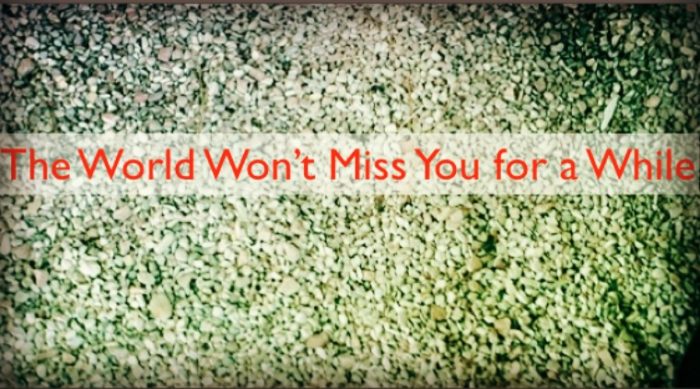
The World Won’t Miss You for a While by Kathryn Simmonds
Perhaps the world will continue turning if you take a break now and then. And, just maybe, on your return you’ll make a better contribution to it.
In this poem, Kathryn Simmonds, a British poet born in 1972 illustrates that stepping off the planet is not just for busy Type A personalities. It is for Hare Krishnas, sous chefs, and apprentice pharmacists. It is for everyone.
The World Won’t Miss You for a While
Lie down with me you hillwalkers and rest, untie your boots and separate your toes, ignore the compass wavering north/north west. Quit trailing through the overcrowded streets with tinkling bells, you child of Hare Krishna. Hush. Unfurl your saffron robes. How sweet the grass. And you, photographer of wars, lie down and cap your lens. Ambassador, take off your dancing shoes. There are no laws by which you must abide oh blushing boy with Stanley knife, no county magistrates are waiting here to dress you down: employ yourself with cutting up these wild flowers as you like. Sous chef with baby guinea fowl to stuff, surveillance officer with hours to fill, and anorexic weighing up a meal, lie down. Girl riding to an interview, turn back before they force you to reveal your hidey holes. Apprentice pharmacist, leave carousels of second generation happy pills. The long term sad. And journalist with dreams, forget the man from Lancashire who lost his tongue, the youth who found it, kept it quivering in a matchbox for a year.

3 Poems About Travel by Sheenagh Pugh
Ah, if the roads we take every day could offer us the surprises, even on occasion, that travel delivers.
In this first poem about travel by Sheenagh Pugh, a British poet (originally from Wales) who says in her biography “I have been accused of being ‘populist’ and ‘too accessible,’ both of which I hope are true,” we are offered a road to explore what we don't know. To see what could be. What could happen.
Travel cannot always be on our agenda but we can still look around blind corners for new discoveries.
What If This Road
What if this road, that has held no surprises these many years, decided not to go home after all; what if it could turn left or right with no more ado than a kite-tail? What if its tarry skin were like a long, supple bolt of cloth, that is shaken and rolled out, and takes a new shape from the contours beneath? And if it chose to lay itself down in a new way; around a blind corner, across hills you must climb without knowing what's on the other side; who would not hanker to be going, at all risks? Who wants to know a story's end, or where a road will go?
Many of us spend too much time documenting our travels rather than experiencing them.
We could live more fully in the moment. We could savor the experience to learn more deeply and remember more clearly.
In this second poem by Sheenagh Pugh, we are advised that notes and images offer little upon our return.
The Opportune Moment
If you were waiting for the opportune moment, that was it” – Capt Jack Sparrow, Pirates of the Caribbean: Curse of the Black Pearl When you go ashore in that town, take neither a camera nor a notebook. However many photographs you upload of that street, the smell of almond paste will be missing; the harbour will not sound of wind slapping on chains. You will read notes like “Sami church”, later, and know you saw nothing, never put it where you could find it again, were never really there. When you go ashore in the small port with the rusty trawlers, there will be fur hawkers who all look like Genghis Khan on a market stall, crumbling pavements, roses frozen in bud, an altar with wool hangings, vessels like canal ware, a Madonna with a Russian doll face. When you go ashore, take nothing but the knowledge that where you are, you never will be again
There are two parts to this final poem about travel by Sheenagh Pugh. The first projects a future when our travel is not around the world but to Earth. It muses on a time when we have ruined our planet to the point that we no longer live here and it has become a destination suitable only for the “young and fit”. Do our travels contribute to this potential future?
The second part urges the reader to take it all in deeply, with all your senses. This applies equally to today's travelers as tomorrow’s. It explores the possible ways of experiencing a new place. It is gorgeous.
Do You Think We’ll Ever Get to See Earth, Sir?
I hear they're hoping to run trips one day, for the young and fit, of course. I don't see much use in it myself; there'll be any number of places you can't land, because they're still toxic, and even in the relatively safe bits you won't see what it was; what it could be. I can't fancy a tour through the ruins of my home with a party of twenty-five and a guide to tell me what to see. But if you should see some beautiful thing, some leaf, say, damascened with frost, some iridescence on a pigeon's neck, some stone, some curve, some clear water; look at it as if you were made of eyes, as if you were nothing but an eye, lidless and tender, to be probed and scorched by extreme light. Look at it with your skin, with the small hairs on the back of your neck. If it is well-shaped, look at it with your hands; if it has fragrance, breathe it into yourself; if it tastes sweet, put your tongue to it. Look at it as a happening, a moment; let nothing of it go unrecorded, map it as if it were already passing. Look at it with the inside of your head, look at it for later, look at it for ever, and look at it once for me.
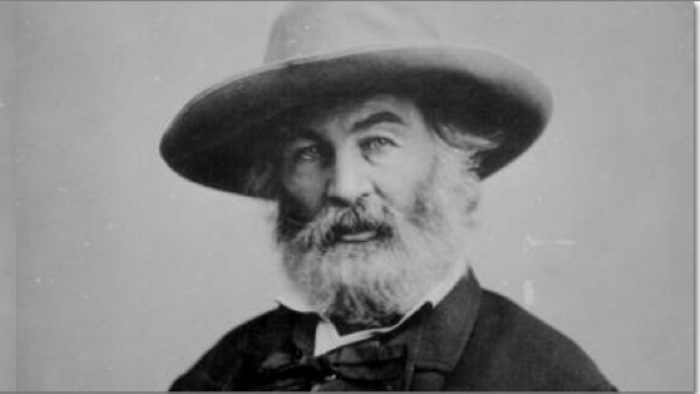
Song of the Open Road by Walt Whitman
The open road holds the pleasures of solitude as well as surprising adventures.
Walt Whitman (American poet, essayist, and journalist, 1819-1892) wrote his “Song of the Open Road” long before the automobile was invented. But somehow, that notion of the open road was already present in the American psyche. This is a massive poem, epic in nature.
Song of the Open Road
Afoot and light-hearted I take to the open road, Healthy, free, the world before me, The long brown path before me leading wherever I choose. Henceforth I ask not good-fortune, I myself am good-fortune, Henceforth I whimper no more, postpone no more, need nothing, Done with indoor complaints, libraries, querulous criticisms, Strong and content I travel the open road. The earth, that is sufficient, I do not want the constellations any nearer, I know they are very well where they are, I know they suffice for those who belong to them. (Still here I carry my old delicious burdens, I carry them, men and women, I carry them with me wherever I go, I swear it is impossible for me to get rid of them, I am fill'd with them, and I will fill them in return.) 2 You road I enter upon and look around, I believe you are not all that is here, I believe that much unseen is also here. Here the profound lesson of reception, nor preference nor denial, The black with his woolly head, the felon, the diseas'd, the illiterate person, are not denied; The birth, the hasting after the physician, the beggar's tramp, the drunkard's stagger, the laughing party of mechanics, The escaped youth, the rich person's carriage, the fop, the eloping couple, The early market-man, the hearse, the moving of furniture into the town, the return back from the town, They pass, I also pass, any thing passes, none can be interdicted, None but are accepted, none but shall be dear to me. 3 You air that serves me with breath to speak! You objects that call from diffusion my meanings and give them shape! You light that wraps me and all things in delicate equable showers! You paths worn in the irregular hollows by the roadsides! I believe you are latent with unseen existences, you are so dear to me. You flagg'd walks of the cities! you strong curbs at the edges! You ferries! you planks and posts of wharves! you timber-lined side! you distant ships! You rows of houses! you window-pierc'd facades! you roofs! You porches and entrances! you copings and iron guards! You windows whose transparent shells might expose so much! You doors and ascending steps! you arches! You gray stones of interminable pavements! you trodden crossings! From all that has touch'd you I believe you have imparted to yourselves, and now would impart the same secretly to me, From the living and the dead you have peopled your impassive surfaces, and the spirits thereof would be evident and amicable with me. 4 The earth expanding right hand and left hand, The picture alive, every part in its best light, The music falling in where it is wanted, and stopping where it is not wanted, The cheerful voice of the public road, the gay fresh sentiment of the road. O highway I travel, do you say to me Do not leave me? Do you say Venture not–if you leave me you are lost? Do you say I am already prepared, I am well-beaten and undenied, adhere to me? O public road, I say back I am not afraid to leave you, yet I love you, You express me better than I can express myself, You shall be more to me than my poem. I think heroic deeds were all conceiv'd in the open air, and all free poems also, I think I could stop here myself and do miracles, I think whatever I shall meet on the road I shall like, and whoever beholds me shall like me, I think whoever I see must be happy. 5 From this hour I ordain myself loos'd of limits and imaginary lines, Going where I list, my own master total and absolute, Listening to others, considering well what they say, Pausing, searching, receiving, contemplating, Gently, but with undeniable will, divesting myself of the holds that would hold me. I inhale great draughts of space, The east and the west are mine, and the north and the south are mine. I am larger, better than I thought, I did not know I held so much goodness. All seems beautiful to me, can repeat over to men and women You have done such good to me I would do the same to you, I will recruit for myself and you as I go, I will scatter myself among men and women as I go, I will toss a new gladness and roughness among them, Whoever denies me it shall not trouble me, Whoever accepts me he or she shall be blessed and shall bless me. 6 Now if a thousand perfect men were to appear it would not amaze me, Now if a thousand beautiful forms of women appear'd it would not astonish me. Now I see the secret of the making of the best persons, It is to grow in the open air and to eat and sleep with the earth. Here a great personal deed has room, (Such a deed seizes upon the hearts of the whole race of men, Its effusion of strength and will overwhelms law and mocks all authority and all argument against it.) Here is the test of wisdom, Wisdom is not finally tested in schools, Wisdom cannot be pass'd from one having it to another not having it, Wisdom is of the soul, is not susceptible of proof, is its own proof, Applies to all stages and objects and qualities and is content, Is the certainty of the reality and immortality of things, and the excellence of things; Something there is in the float of the sight of things that provokes it out of the soul. Now I re-examine philosophies and religions, They may prove well in lecture-rooms, yet not prove at all under the spacious clouds and along the landscape and flowing currents. Here is realization, Here is a man tallied–he realizes here what he has in him, The past, the future, majesty, love–if they are vacant of you, you are vacant of them. Only the kernel of every object nourishes; Where is he who tears off the husks for you and me? Where is he that undoes stratagems and envelopes for you and me? Here is adhesiveness, it is not previously fashion'd, it is apropos; Do you know what it is as you pass to be loved by strangers? Do you know the talk of those turning eye-balls? 7 Here is the efflux of the soul, The efflux of the soul comes from within through embower'd gates, ever provoking questions, These yearnings why are they? these thoughts in the darkness why are they? Why are there men and women that while they are nigh me the sunlight expands my blood? Why when they leave me do my pennants of joy sink flat and lank? Why are there trees I never walk under but large and melodious thoughts descend upon me? (I think they hang there winter and summer on those trees and always drop fruit as I pass;) What is it I interchange so suddenly with strangers? What with some driver as I ride on the seat by his side? What with some fisherman drawing his seine by the shore as I walk by and pause? What gives me to be free to a woman's and man's good-will? what gives them to be free to mine? 8 The efflux of the soul is happiness, here is happiness, I think it pervades the open air, waiting at all times, Now it flows unto us, we are rightly charged. Here rises the fluid and attaching character, The fluid and attaching character is the freshness and sweetness of man and woman, (The herbs of the morning sprout no fresher and sweeter every day out of the roots of themselves, than it sprouts fresh and sweet continually out of itself.) Toward the fluid and attaching character exudes the sweat of the love of young and old, From it falls distill'd the charm that mocks beauty and attainments, Toward it heaves the shuddering longing ache of contact. 9 Allons! whoever you are come travel with me! Traveling with me you find what never tires. The earth never tires, The earth is rude, silent, incomprehensible at first, Nature is rude and incomprehensible at first, Be not discouraged, keep on, there are divine things well envelop'd, I swear to you there are divine things more beautiful than words can tell. Allons! we must not stop here, However sweet these laid-up stores, however convenient this dwelling we cannot remain here, However shelter'd this port and however calm these waters we must not anchor here, However welcome the hospitality that surrounds us we are permitted to receive it but a little while. 10 Allons! the inducements shall be greater, We will sail pathless and wild seas, We will go where winds blow, waves dash, and the Yankee clipper speeds by under full sail. Allons! with power, liberty, the earth, the elements, Health, defiance, gayety, self-esteem, curiosity; Allons! from all formules! From your formules, O bat-eyed and materialistic priests. The stale cadaver blocks up the passage–the burial waits no longer. Allons! yet take warning! He traveling with me needs the best blood, thews, endurance, None may come to the trial till he or she bring courage and health, Come not here if you have already spent the best of yourself, Only those may come who come in sweet and determin'd bodies, No diseas'd person, no rum-drinker or venereal taint is permitted here. (I and mine do not convince by arguments, similes, rhymes, We convince by our presence.) 11 Listen! I will be honest with you, I do not offer the old smooth prizes, but offer rough new prizes, These are the days that must happen to you: You shall not heap up what is call'd riches, You shall scatter with lavish hand all that you earn or achieve, You but arrive at the city to which you were destin'd, you hardly settle yourself to satisfaction before you are call'd by an irresistible call to depart, You shall be treated to the ironical smiles and mockings of those who remain behind you, What beckonings of love you receive you shall only answer with passionate kisses of parting, You shall not allow the hold of those who spread their reach'd hands toward you. 12 Allons! after the great Companions, and to belong to them! They too are on the road–they are the swift and majestic men–they are the greatest women, Enjoyers of calms of seas and storms of seas, Sailors of many a ship, walkers of many a mile of land, Habitues of many distant countries, habitues of far-distant dwellings, Trusters of men and women, observers of cities, solitary toilers, Pausers and contemplators of tufts, blossoms, shells of the shore, Dancers at wedding-dances, kissers of brides, tender helpers of children, bearers of children, Soldiers of revolts, standers by gaping graves, lowerers-down of coffins, Journeyers over consecutive seasons, over the years, the curious years each emerging from that which preceded it, Journeyers as with companions, namely their own diverse phases, Forth-steppers from the latent unrealized baby-days, Journeyers gayly with their own youth, journeyers with their bearded and well-grain'd manhood, Journeyers with their womanhood, ample, unsurpass'd, content, Journeyers with their own sublime old age of manhood or womanhood, Old age, calm, expanded, broad with the haughty breadth of the universe, Old age, flowing free with the delicious near-by freedom of death. 13 Allons! to that which is endless as it was beginningless, To undergo much, tramps of days, rests of nights, To merge all in the travel they tend to, and the days and nights they tend to, Again to merge them in the start of superior journeys, To see nothing anywhere but what you may reach it and pass it, To conceive no time, however distant, but what you may reach it and pass it, To look up or down no road but it stretches and waits for you, however long but it stretches and waits for you, To see no being, not God's or any, but you also go thither, To see no possession but you may possess it, enjoying all without labor or purchase, abstracting the feast yet not abstracting one particle of it, To take the best of the farmer's farm and the rich man's elegant villa, and the chaste blessings of the well-married couple, and the fruits of orchards and flowers of gardens, To take to your use out of the compact cities as you pass through, To carry buildings and streets with you afterward wherever you go, To gather the minds of men out of their brains as you encounter them, to gather the love out of their hearts, To take your lovers on the road with you, for all that you leave them behind you, To know the universe itself as a road, as many roads, as roads for traveling souls. All parts away for the progress of souls, All religion, all solid things, arts, governments–all that was or is apparent upon this globe or any globe, falls into niches and corners before the procession of souls along the grand roads of the universe. Of the progress of the souls of men and women along the grand roads of the universe, all other progress is the needed emblem and sustenance. Forever alive, forever forward, Stately, solemn, sad, withdrawn, baffled, mad, turbulent, feeble, dissatisfied, Desperate, proud, fond, sick, accepted by men, rejected by men, They go! they go! I know that they go, but I know not where they go, But I know that they go toward the best–toward something great. Whoever you are, come forth! or man or woman come forth! You must not stay sleeping and dallying there in the house, though you built it, or though it has been built for you. Out of the dark confinement! out from behind the screen! It is useless to protest, I know all and expose it. Behold through you as bad as the rest, Through the laughter, dancing, dining, supping, of people, Inside of dresses and ornaments, inside of those wash'd and trimm'd faces, Behold a secret silent loathing and despair. No husband, no wife, no friend, trusted to hear the confession, Another self, a duplicate of every one, skulking and hiding it goes, Formless and wordless through the streets of the cities, polite and bland in the parlors, In the cars of railroads, in steamboats, in the public assembly, Home to the houses of men and women, at the table, in the bedroom, everywhere, Smartly attired, countenance smiling, form upright, death under the breast-bones, hell under the skull-bones, Under the broadcloth and gloves, under the ribbons and artificial flowers, Keeping fair with the customs, speaking not a syllable of itself, Speaking of any thing else but never of itself. 14 Allons! through struggles and wars! The goal that was named cannot be countermanded. Have the past struggles succeeded? What has succeeded? yourself? your nation? Nature? Now understand me well–it is provided in the essence of things that from any fruition of success, no matter what, shall come forth something to make a greater struggle necessary. My call is the call of battle, I nourish active rebellion, He going with me must go well arm'd, He going with me goes often with spare diet, poverty, angry enemies, desertions. 15 Allons! the road is before us! It is safe–I have tried it–my own feet have tried it well–be not detain'd! Let the paper remain on the desk unwritten, and the book on the shelf unopen'd! Let the tools remain in the workshop! let the money remain unearn'd! Let the school stand! mind not the cry of the teacher! Let the preacher preach in his pulpit! let the lawyer plead in the court, and the judge expound the law. Camerado, I give you my hand! I give you my love more precious than money, I give you myself before preaching or law; Will you give me yourselp. will you come travel with me? Shall we stick by each other as long as we live?

Why Do I Travel? Author Unknown
It is on the road that I am a poet, an ambassador, a dancer, medicine woman, an angel and even a genius
Traveling solo provides an opportunity to explore that aspect of your life which may be overshadowed by responsibilities and the expectations of others. It is an opportunity to live as a poet, an ambassador, a dancer, or whatever role you would, in a perfect world, take on. In doing so you will be that much closer to a well-earned label of genius.
We’ve been unable to confirm the author of this poem about travel. Perhaps Sana Musama or Musasama, but we can’t be certain. Regardless, it's a beautiful and significant piece of writing. If you have more details on the poet, please let us know so we can properly acknowledge them.
Why do I travel?
It is on the road that my inner voice speaks the loudest and my heart beats the strongest. It is on the road that I take extra pride in my wooly hair, full features and lineage. It is on the road that I develop extra senses and the hairs on my arms stand up and say “Sana, don't go there”, and I listen. It's when I safety pin my money to my underclothes and count it a million times before I go to sleep, It is on the road that I am a poet, an ambassador, a dancer, medicine woman, an angel and even a genius. It's on the road that I am fearless and unstoppable and if necessary ball up my fist and fight back. It is on the road that I talk to my deceased parents and they speak back It's on the road that I reprimand myself, and set new goals, refuel, stop and begin again. It is on the road that I experience what freedom truly is. It is my travel that has transformed me making me a citizen of the world. When my humanness, compassion and affection are raised to a new level and I share unconditionally.

The Return by Geneen Marie Haugen
Single people are frequently the butt of jokes and jibes about “getting lucky”. But this term takes on a whole new meaning through solo travel, as it does in this poem. Here, one gets lucky when they return from travel “trailing snake scales, wing fragments and the musk of Earth and moon”.
Not everyone understands the need to travel and fewer still understand the need of solo travelers to head out on their own. By traveling solo, you can connect more deeply with a place and its people than when you are distracted by a companion. You get close to the ground, to the “musk of the earth”. You will be more affected by travel.
The poet, Geneen Marie Haugen is a writer, wilderness wanderer, and scholar.
Some day, if you are lucky, you'll return from a thunderous journey trailing snake scales, wing fragments and the musk of Earth and moon. Eyes will examine you for signs of damage, or change and you, too, will wonder if your skin shows traces of fur, or leaves, if thrushes have built a nest of your hair, if Andromeda burns from your eyes. Do not be surprised by prickly questions from those who barely inhabit their own fleeting lives, who barely taste their own possibility, who barely dream. If your hands are empty, treasureless, if your toes have not grown claws, if your obedient voice has not become a wild cry, a howl, you will reassure them. We warned you, they might declare, there is nothing else, no point, no meaning, no mystery at all, just this frantic waiting to die. And yet, they tremble, mute, afraid you've returned without sweet elixir for unspeakable thirst, without a fluent dance or holy language to teach them, without a compass bearing to a forgotten border where no one crosses without weeping for the terrible beauty of galaxies and granite and bone. They tremble, hoping your lips hold a secret, that the song your body now sings will redeem them, yet they fear your secret is dangerous, shattering, and once it flies from your astonished mouth, they — like you — must disintegrate before unfolding tremulous wings.


The Road Not Taken by Robert Frost
This may be one of the most well known poems about travel.
In travel, in life, is the road less traveled more courageous? Is it better? Maybe. Maybe not. But whatever course you take it will make all the difference.
The Road Not Taken
Two roads diverged in a yellow wood, And sorry I could not travel both And be one traveler, long I stood And looked down one as far as I could To where it bent in the undergrowth; Then took the other, as just as fair, And having perhaps the better claim Because it was grassy and wanted wear, Though as for that the passing there Had worn them really about the same, And both that morning equally lay In leaves no step had trodden black. Oh, I marked the first for another day! Yet knowing how way leads on to way I doubted if I should ever come back. I shall be telling this with a sigh Somewhere ages and ages hence: Two roads diverged in a wood, and I, I took the one less traveled by, And that has made all the difference.

Die Slowly by Martha Medeiros
This poem delivers a most positive outlook on life from the most negative angle possible.
Solo travel helps you flip on its head all that Martha Medeiros says contributes to a slow death. It causes you to change routines in your own rhythm, challenge yourself, build self-esteem, ask questions, explore with curiosity, and expand your world.
We all deserve splendid happiness. I hope you find yours.
He who becomes the slave of habit, who follows the same routes every day, who never changes pace, who does not risk and change the color of his clothes, who does not speak and does not experience, dies slowly. He or she who shuns passion, who prefers black on white, dotting ones i's rather than a bundle of emotions, the kind that make your eyes glimmer, that turn a yawn into a smile, that make the heart pound in the face of mistakes and feelings, dies slowly. He or she who does not turn things topsy-turvy, who is unhappy at work, who does not risk certainty for uncertainty, to thus follow a dream, those who do not forego sound advice at least once in their lives, die slowly. He who does not travel, who does not read, who does not listen to music, who does not find grace in himself, she who does not find grace in herself, dies slowly. He who slowly destroys his own self-esteem, who does not allow himself to be helped, who spends days on end complaining about his own bad luck, about the rain that never stops, dies slowly. He or she who abandons a project before starting it, who fails to ask questions on subjects he doesn't know, he or she who doesn't reply when they are asked something they do know, dies slowly. Let's try and avoid death in small doses, reminding oneself that being alive requires an effort far greater than the simple fact of breathing. Only a burning patience will lead to the attainment of a splendid happiness
What are your favorite poems about travel? Tell us about them and their meaning for you in the comments section below.
Thinking about hitting the open road? Check out our Solo Road Trip category . Do you have a solo travel story to tell? Share your photos and the story of your trip here.
Sharing is caring!
Publisher Janice: info @ solotravelerworld.com
Editor Tracey: tracey @ solotravelerworld.com
Sales Simon: simon @ solotravelerworld.com
Get Solo Travel News & Deals
- Create Your Advertiser Account
- Login to Your Advertiser Account
- Solo Travel Statistics
- Media & Speaking
- Privacy Policy & Disclosure

The content of Solo Traveler and any resources published by Solo Traveler are meant for entertainment and inspiration only. Please note that while we have advertising clients promoting destinations, products, services, trips and tours on Solo Traveler and that we endeavour to only work with companies in which we have confidence, we are not responsible for the delivery or quality of their products or services. Every person and every travel situation is different. Your safety, satisfaction and fun traveling solo are your responsibility alone and not that of Solo Traveler, its publisher, editor and/or writers.
PRIVACY POLICY & DISCLOSURE: In accordance with FTC guidelines, I disclose that I may be compensated if consumers choose to utilize links located throughout the content on this site. Additionally, some posts might be sponsored to support this site. Please do the appropriate research before participating in any third party offers. All opinions are my own. Please read our full Privacy Policy here.
Ten Poems about Travel
Poetry about all kinds of travel—from grand adventures to family vacations—by Elizabeth Bishop, Rita Dove, and more.

Poetry and wanderlust often go hand in hand. As Joseph Brodsky writes in his poem “Pilgrims”: “all that’s left is / the Road and the Dreaming.” Whether you’re dreaming of new vistas or hitting the road yourself, here are ten favorite travel poems from JSTOR’s digital library, available for free download:

“Questions of Travel,” Elizabeth Bishop
“Her Island,” Rita Dove
“Crossing Boston Harbor,” Richard Blanco
“At the Bambi Motel,” Elizabeth Spires
“The Chemical Blonde,” Alice Goodman
“From California Sorrow,” Mary Kinzie
“The Ocean Liner,” Harriet Monroe
“In the Wilderness Motel,” David Bottoms
“Bournemouth,” Vona Groarke
“Pilgrims,” by Joseph Brodsky

JSTOR is a digital library for scholars, researchers, and students. JSTOR Daily readers can access the original research behind our articles for free on JSTOR.
Get Our Newsletter
Get your fix of JSTOR Daily’s best stories in your inbox each Thursday.
Privacy Policy Contact Us You may unsubscribe at any time by clicking on the provided link on any marketing message.
More Stories

Arakawa and Gins: An Eternal Architecture

Fredric Wertham, Cartoon Villain

Separated by a Common Language in Singapore

Katherine Mansfield and Anton Chekhov
Recent posts.
- The Vital Near-Magic of Fire-Eating Fungi
- Growing Guerrilla Warfare
- The Long History of Live Animal Export
- Wasp Viruses, Athleisure, and Humans in Flight
- Haunted Soldiers in Mesopotamia
Support JSTOR Daily
Sign up for our weekly newsletter.

The Most Inspiring Travel Poems
by Melissa Giroux | Last updated Feb 25, 2023 | Quotes , Travel Tips
Searching for the best poems about adventure and travel?
We created this list featuring the best travel poems so that you can find the inspiration you’re looking for.
These poems about travel are specifically written for travelers.
Without further ado, let’s take a look at these unique poems for travelers.

If Once You Have Slept On An Island
If once you have slept on an island
You’ll never be quite the same;
You may look as you looked the day before
And go by the same old name,
You may bustle about in street and shop;
You may sit at home and sew,
But you’ll see blue water and wheeling gulls
Wherever your feet may go.
You may chat with the neighbors of this and that
And close to your fire keep,
But you’ll hear ship whistle and lighthouse bell
And tides beat through your sleep.
Oh, you won’t know why, and you can’t say how
Such change upon you came,
But – once you have slept on an island
You’ll never be quite the same!
Rachel Field
The Road Not Taken
Two roads diverged in a yellow wood,
And sorry I could not travel both
And be one traveler, long I stood
And looked down one as far as I could
To where it bent in the undergrowth,
Then took the other, as just as fair,
And having perhaps the better claim,
Because it was grassy and wanted wear;
Though as for that the passing there
Had worn them really about the same,
And both that morning equally lay
In leaves no step had trodden black.
Oh, I kept the first for another day!
Yet knowing how way leads on to way,
I doubted if I should ever come back.
I shall be telling this with a sigh
Somewhere ages and ages hence:
Two roads diverged in a wood, and I—
I took the one less traveled by,
And that has made all the difference.
Robert Frost
Half across the world from me
Lie the lands I’ll never see-
I, whose longing lives and dies
Where a ship has sailed away;
I, that never close my eyes
But to look upon Cathay.
Things I may not know nor tell
Wait, where older waters swell;
Ways that flowered at Sappho’s tread,
Winds that sighed in Homer’s strings,
Vibrant with the singing dead,
Golden with the dust of wings.
Under deeper skies than mine,
Quiet valleys dip and shine.
Where their tender grasses heal
Ancient scars of trench and tomb
I shall never walk: nor kneel
Where the bones of poets bloom.
If I seek a lovelier part,
Where I travel goes my heart;
Where I stray my thought must go;
With me wanders my desire.
Best to sit and watch the snow,
Turn the lock, and poke the fire.
Dorothy Parker
The Opportune Moment
When you go ashore in that town,
take neither a camera nor a notebook.
However many photographs you upload
of that street, the smell of almond paste
will be missing; the harbour will not sound
of wind slapping on chains. You will read
notes like “Sami church”, later, and know
you saw nothing, never put it where
you could find it again, were never
really there. When you go ashore
in the small port with the rusty trawlers,
there will be fur hawkers who all look
like Genghis Khan on a market stall,
crumbling pavements, roses frozen in bud,
an altar with wool hangings, vessels
like canal ware, a Madonna
with a Russian doll face. When you go
ashore, take nothing but the knowledge
that where you are, you never will be again.
Sheenagh Pugh
I Want A Life Measured
I want a life measured
in first steps on foreign soils
and deep breaths
in brand new seas.
in Welcome Signs,
each stamped
with a different name,
borders marked with metal and paint.
Show me the streets
that don’t know the music
of my meandering feet,
and I will play their song
Perfume me please
in the smells of far away,
I will never wash my hair
if it promises to stay.
in the places I haven’t gone,
short sleeps on long flights,
strange voices teaching me
new words to
describe the dawn.
Tyler Knott Gregson
Travel Poem (Untitled)
We’re all wayfaring travellers,
Trudging down our separate roads,
Hoping, wishing, praying,
Someone will come to share our load,
There’s sunburn on our shoulders,
And there are blisters on our feet,
We brave the wildest blizzards,
And the scorching summer heat,
Sometimes we find somebody,
Who is going our way too,
And while they walk beside us,
The sky seems a bit more blue,
But all roads twist and turn,
And when you reach an intersection,
It’s likely life will take them,
In the opposite direction,
But don’t give up on hoping,
When your road is a dead end,
It’s likely that you’ll find,
It’s only really just a bend,
And though the other’s roads are different,
It doesn’t mean that yours is wrong,
So pick yourself back up again,
And just keep trudging on.
Erin Hansen
The Far North
I often wonder of the Tundra,
as I watch the plains go by.
Or I’ll dream of higher mountains
that almost seem to pierce the sky.
I yearn for vaster spaces
and for roaring, winding rivers.
Or of breezes rolling forward
that leave forests full of shivers.
I hear the voice of comfort
say I shouldn’t go alone
yet I’m pulled by tugs from elsewhere
that may someday be my home.
Jesse Humman
Questions Of Travel
There are too many waterfalls here; the crowded streams
hurry too rapidly down to the sea,
and the pressure of so many clouds on the mountaintops
makes them spill over the sides in soft slow-motion,
turning to waterfalls under our very eyes.
–For if those streaks, those mile-long, shiny, tearstains,
aren’t waterfalls yet,
in a quick age or so, as ages go here,
they probably will be.
But if the streams and clouds keep travelling, travelling,
the mountains look like the hulls of capsized ships,
slime-hung and barnacled.
Think of the long trip home.
Should we have stayed at home and thought of here?
Where should we be today?
Is it right to be watching strangers in a play
in this strangest of theatres?
What childishness is it that while there’s a breath of life
in our bodies, we are determined to rush
to see the sun the other way around?
The tiniest green hummingbird in the world?
To stare at some inexplicable old stonework,
inexplicable and impenetrable,
at any view,
instantly seen and always, always delightful?
Oh, must we dream our dreams
and have them, too?
And have we room
for one more folded sunset, still quite warm?
Elizabeth Bishop
I should like to rise and go
Where the golden apples grow;–
Where below another sky
Parrot islands anchored lie,
And, watched by cockatoos and goats,
Lonely Crusoes building boats;–
Where in sunshine reaching out
Eastern cities, miles about,
Are with mosque and minaret
Among sandy gardens set,
And the rich goods from near and far
Hang for sale in the bazaar;–
Where the Great Wall round China goes,
And on one side the desert blows,
And with the voice and bell and drum,
Cities on the other hum;–
Where are forests hot as fire,
Wide as England, tall as a spire,
Full of apes and cocoa-nuts
And the negro hunters’ huts;–
Where the knotty crocodile
Lies and blinks in the Nile,
And the red flamingo flies
Hunting fish before his eyes;–
Where in jungles near and far,
Man-devouring tigers are,
Lying close and giving ear
Lest the hunt be drawing near,
Or a comer-by be seen
Swinging in the palanquin;–
Where among the desert sands
Some deserted city stands,
All its children, sweep and prince,
Grown to manhood ages since,
Not a foot in street or house,
Not a stir of child or mouse,
And when kindly falls the night,
In all the town no spark of light.
There I’ll come when I’m a man
With a camel caravan;
Light a fire in the gloom
Of some dusty dining-room;
See the pictures on the walls,
Heroes fights and festivals;
And in a corner find the toys
Of the old Egyptian boys.
Robert Louis Stevenson
Riding Alone For Thousands Of Miles
In Lijiang, the sign outside your hostel
glares: Ride alone, ride alone, ride
alone – it taunts you for the mileage
of your solitude, must be past
thousands, for you rode this plane
alone, this train alone, you’ll ride
this bus alone well into the summer night,
well into the next hamlet, town,
city, the next century, as the trees twitch
and the clouds wane and the tides
quiver and the galaxies tilt and the sun
spins us another lonely cycle, you’ll
wonder if this compass will ever change.
The sun doesn’t need more heat,
so why should you? The trees don’t need
to be close, so why should you?
Sally Wen Mao
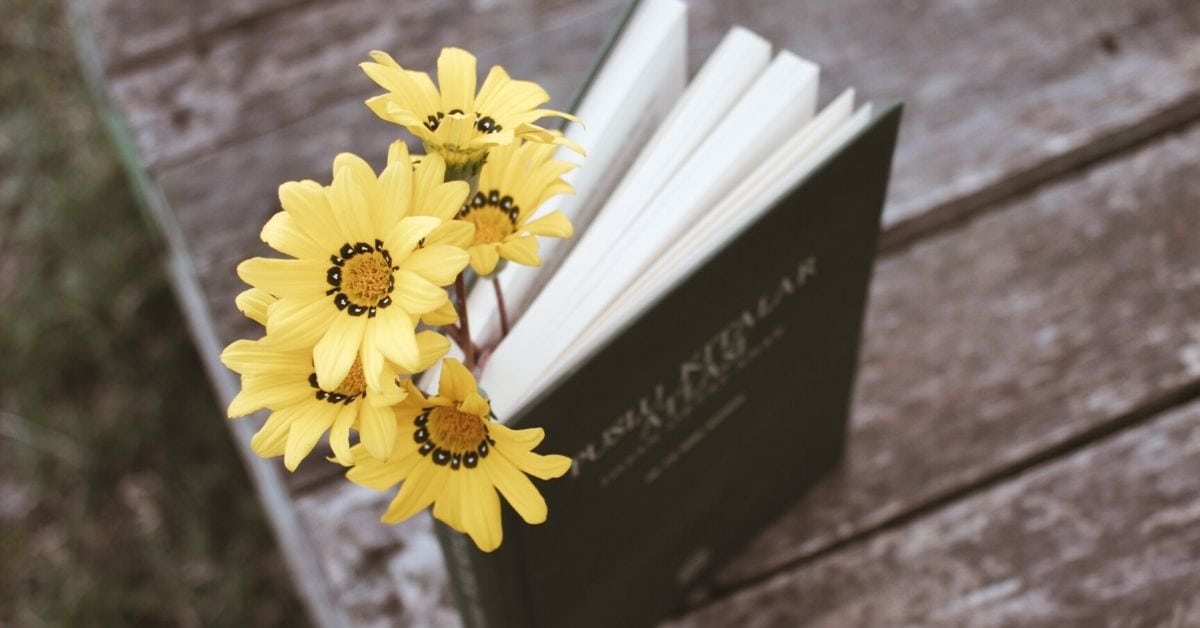
Final Thoughts On Travel Poems
These poems for travelers are powerful and inspiring.
We hope you enjoyed our list featuring the best adventure poems.
Looking for more inspiration? Take a look at the following blog posts:
- Travel expressions
- Best travel jokes
- Best mountain puns

MY TOP RECOMMENDATIONS
BOOK HOTEL ON BOOKING.COM
BOOK HOSTEL ON HOSTELWORLD
GET YOUR TRAVEL INSURANCE
LEARN HOW TO START A TRAVEL BLOG
LEARN HOW TO VOLUNTEER ABROAD

- Meet the Team
- Work with Us
- Czech Republic
- Netherlands
- Switzerland
- Scandinavia
- Philippines
- South Korea
- New Zealand
- South Africa
- Budget Travel
- Work & Travel
- The Broke Backpacker Manifesto
- Travel Resources
- How to Travel on $10/day
Home » Budget Travel » 25 Inspiring Poems about Adventure
25 Inspiring Poems about Adventure
Travel has always had the power to stir the soul and inspire works of great artistry. The feeling of freedom exploring offers us has inspired humans to create moving artworks, from paintings and songs to epic poems.
Great poets like Whitman and Tennyson have penned profound poems about adventure that have stood the test of time.
We’ve gathered this list of some of the best-known adventure poems, and some lesser-known but no less impactful poems to ignite your wanderlust. They capture the feeling of being out in the world immersing in new places.

Unlock Our GREATEST Travel Secrets!
Sign up for our newsletter and get the best travel tips delivered right to your inbox.
1. The Road Not Taken – Robert Frost
The Broke Backpacker is supported by you . Clicking through our links may earn us a small affiliate commission, and that's what allows us to keep producing free content 🙂 Learn more .
“I shall be telling this with a sigh Somewhere ages and ages hence: Two roads diverged in a wood, and I- I took the one less traveled by, And that has made all the difference.”
Robert Frost, regarded by many as one of America’s greatest poets, wrote this adventure poem which has no doubt inspired more travels than we could ever know. It’s a call to courage, to face the unknown, and to break from the crowd and follow your own path wherever it may lead.
2. Song of the Open Road – Walt Whitman
“Afoot and light-hearted I take to the open road, Healthy, free, the world before me, The long brown path before me leading wherever I choose. Henceforth I ask not good-fortune, I myself am good-fortune, Henceforth I whimper no more, postpone no more, need nothing, Done with indoor complaints, libraries, querulous criticisms, Strong and content I travel the open road.”

3. Freedom – Olive Runner
“Give me the long, straight road before me, A clear, cold day with a nipping air, Tall, bare trees to run on beside me, A heart that is light and free from care. Then let me go!-I care not whither My feet may lead, for my spirit shall be Free as the brook that flows to the river, Free as the river that flows to the sea.”
Oliver Runner’s poem about adventure captures so much of what drives every traveler. The sense of untethered wandering, free to go where the road may lead. As long as we’re treading new ground and experiencing new places, we’re at our happiest.
4. For the Traveller – John O’Donohue
“When you travel, you find yourself Alone in a different way, More attentive now To the self you bring along, Your more subtle eye watching You abroad; and how what meets you Touches that part of the heart That lies low at home:
How you unexpectedly attune To the timbre in some voice, Opening in conversation You want to take in To where your longing Has pressed hard enough Inward, on some unsaid dark, To create a crystal of insight You could not have known.”
When it comes to poems about adventure, this one by John O’Donohue does well to explain the changes that occur within us when we travel. We may see new horizons every day, and we may meet new people around each corner, but the thing that changes the most is the heart and mind of the traveler.
5. If Once You’ve Slept on an Island – Rachel Field
“If once you have slept on an island You’ll never be quite the same; You may look as you looked the day before And go by the same old name, You may bustle about in street and shop You may sit at home and sew, But you’ll see blue water and wheeling gulls Wherever your feet may go. You may chat with the neighbors of this and that And close to your fire keep, But you’ll hear ship whistle and lighthouse bell And tides beat through your sleep. Oh! you won’t know why and you can’t say how Such a change upon you came, But once you have slept on an island, You’ll never be quite the same.”

6. Travel – Robert Louis Stevenson
“I should like to rise and go Where the golden apples grow;— Where below another sky Parrot islands anchored lie, And, watched by cockatoos and goats, Lonely Crusoes building boats;— Where in sunshine reaching out Eastern cities, miles about, Are with mosque and minaret Among sandy gardens set, And the rich goods from near and far Hang for sale in the bazaar,— Where the Great Wall round China goes, And on one side the desert blows, And with bell and voice and drum Cities on the other hum;—”
7. Die Slowly – Martha Medeiros
“He who does not travel, who does not read, who can not hear music, who does not find grace in himself, she who does not find grace in herself, dies slowly.
He who slowly destroys his own self-esteem, who does not allow himself to be helped, who spends days on end complaining about his own bad luck, about the rain that never stops, dies slowly.”
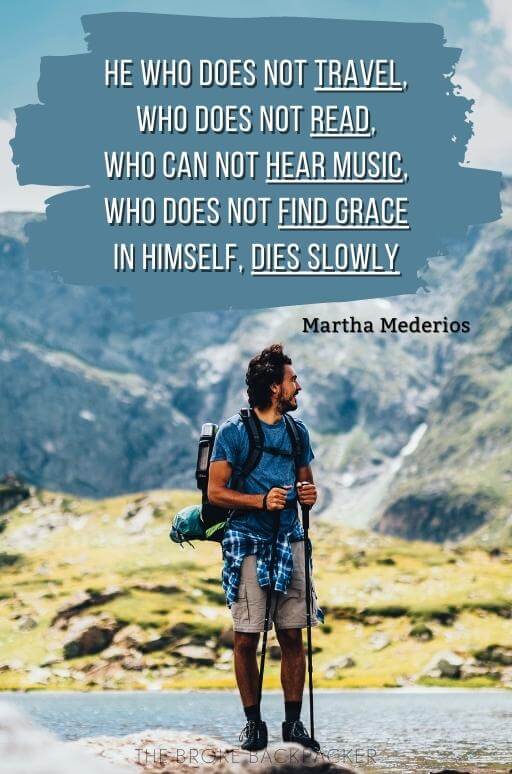
The title of this adventure poem may seem dark, and not much about adventure at all, but it’s really about living. Living so fully and so well that death seems to take its time arriving. We know that we all die one day, but we can make so much of our time, that once is enough.
Reducing our days on earth into an endless stream of items on a to-do list, fulfilling responsibilities, and going through the motions is not a way to get the most out of it.
8. Oh the Places You’ll Go – Dr. Seuss
“You’re off to Great Places! Today is your day! Your mountain is waiting, So… get on your way!”

This is the greatest poem about adventure that inspires both adults and children. At its heart, this poem is a call to adventure, encouraging readers to head off into the world with bravery, courage, and curiosity for the things that await to be seen and discovered.
9. Questions of Travel – Elizabeth Bishop
“Think of the long trip home. Should we have stayed at home and thought of here? Where should we be today?”
“But surely it would have been a pity not to have seen the trees along this road, really exaggerated in their beauty, not to have seen them gesturing like noble pantomimists, robed in pink.”
10. Over the Hills and Far Away – William Ernest Henley
“Where forlorn sunsets flare and fade On desolate sea and lonely sand, Out of the silence and the shade What is the voice of strange command Calling you still, as friend calls friend With love that cannot brook delay, To rise and follow the ways that wend Over the hills and far away? “
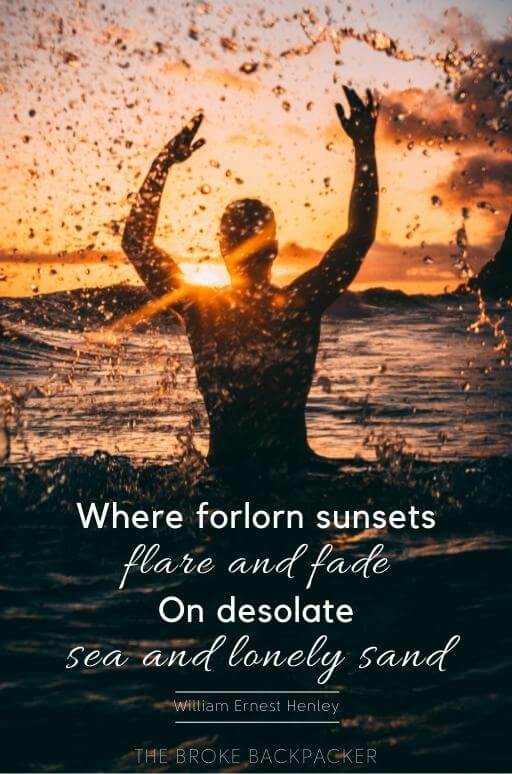
11. O to Sail – Walt Whitman
“O to sail in a ship, To leave this steady unendurable land, To leave this tiresome sameness of streets, the sidewalks and the houses, To leave you, O you solid motionless land, and entering the ship, To sail and sail and sail!”
12. Travel – Edna St Vincent Millay
“The railroad track is miles away, And the day is loud with voices speaking, Yet there isn’t a train goes by all day But I hear its whistle shrieking.
All night there isn’t a train goes by, Though the night is still for sleep and dreaming, But I see its cinders red on the sky, And hear its engine steaming.
My heart is warm with the friends I make, And better friends I’ll not be knowing; Yet there isn’t a train I wouldn’t take, No matter where it’s going.”
To the person with an adventurous heart, travel will call in many ways. The restlessness may wax and wane but it never leaves us entirely. The deep desire to explore will always be back to call us, to motion us onwards on our next journey. We can try to distract ourselves and live on regardless but the call will come again. It always does.
13. The Land of Beyond – Robert W Service
“Have ever you heard of the Land of Beyond, That dreams at the gates of the day? Alluring it lies at the skirts of the skies, And ever so far away; Alluring it calls: O ye the yoke galls, And ye of the trails overfond, With saddle and pack, by paddle and track, Let’s go to the Land of Beyond!”

14. Prayer for Travellers – Anon
“May the road rise up to meet you. May the wind be always at your back. May the sun shine warm upon your face; The rains fall soft upon your fields. And until we meet again, May God hold you in the palm of His hand.”
15. Ulysses – Alfred Tennyson
“For always roaming with a hungry heart Much have I seen and known; cities of men And manners, climates, councils, governments, Myself not least, but honour’d of them all; And drunk delight of battle with my peers, Far on the ringing plains of windy Troy. I am a part of all that I have met; Yet all experience is an arch wherethro’ Gleams that untravell’d world whose margin fades For ever and forever when I move.”
This epic adventure poem written by Tennyson tells of a life lived in pursuit of adventure. It’s told from the point of view of Ulysses, who is now old and unfulfilled by a sedentary life. Though his body has aged he still longs for adventure. The main theme is that as long as there are horizons to chase and strength in our bodies, we can always choose to set out and explore. We should use every day we’re given to its fullest, taking every morsel of adventure we can.
16. I Want a Life Measured – Tyler Knott Gregson
“I want a life measured in first steps on foreign soils and deep breaths in brand new seas I want a life measured in Welcome Signs, each stamped with a different name, borders marked with metal and paint. Show me the streets that don’t know the music of my meandering feet, and I will play their song upon them. Perfume me please in the smells of far away, I will never wash my hair if it promises to stay. I want a life measured in the places I haven’t gone, short sleeps on long flights, strange voices teaching me new words to describe the dawn.”
Tyler Knott Gregson’s poem enlists all the senses in describing the gifts that travel brings. We should measure our lives by the places we’ve been, and the experiences we’ve had in faraway places. The wanderer in us all can relate to this feeling of needing to fill our days with newness and unexplored places.

Our GREATEST Travel Secrets…
Pop your email here & get the original Broke Backpacker Bible for FREE.
17. Why Do I Travel – Unknown
“It is on the road that my inner voice speaks the loudest and my heart beats the strongest. It is on the road that I take extra pride in my wooly hair, full features and lineage. It is on the road that I develop extra senses and the hairs on my arms stand up and say “Sana, don’t go there”, and I listen. It’s when I safety pin my money to my underclothes and count it a million times before I go to sleep, It is on the road that I am a poet, an ambassador, a dancer, medicine woman, an angel and even a genius. It’s on the road that I am fearless and unstoppable and if necessary ball up my fist and fight back. It is on the road that I talk to my deceased parents and they speak back. It’s on the road that I reprimand myself, and set new goals, refuel, stop and begin again. It is on the road that I experience what freedom truly is. It is my travel that has transformed me making me a citizen of the world. When my humanness, compassion and affection are raised to a new level and I share unconditionally.”
While the author of this piece is unknown, it’s clear that this poem about adventure comes from the heart of an explorer. When we travel we change in ways we could never anticipate. We grow and we learn and we change, and we’re never the same again. With each adventure we take, we gain something and are forever transformed.
18. A Call to Adventure – John Mark Green
“Set fire to all your maps, Forget how it’s always been. We’re explorers of the heart, Learning to dream again. The adventure of a lifetime, With love along as our guide. Exotic places beyond imagination – Ones we’ve longed for deep inside.”

19. Returning – Erin Hanson
“Perhaps we only leave So we can once again arrive, To get a bird’s eye view Of what it means to be alive. For there is beauty in returning, Oh how wonderful, how strange, To see that everything’s different But know it is only you who changed.”
By leaving, we gain a new perspective on the world. This change within us makes it impossible to go back to who we were before we left, and when we return we can’t see things the same way anymore. Coming back is not the same as having never left.
20. Wanderlust – Richard Avedon
“You must not think because my glance is quick To shift from this to that, from here to there, Because I am most usually where The way is strangest and the wonders thick, Because when wind is wildest and the bay Swoops madly upward and the gulls are few And I am doing as I want to do, Leaving the town to go my aimless way; You must not think because I am the kind Who always shunned security and such As bother the responsible of mind That I shall never total up to much; I know my drifting will not prove a loss, For mine is a rolling stone that has gathered moss.”
21. The Enchanted Traveler – Bliss Carmen
“We travelled empty-handed With hearts all fear above, For we ate the bread of friendship, We drank the wine of love. Through many a wondrous autumn, Through many a magic spring, We hailed the scarlet banners, We heard the blue-bird sing. We looked on life and nature With the eager eyes of youth, And all we asked or cared for Was beauty, joy, and truth. We found no other wisdom, We learned no other way, Than the gladness of the morning, The glory of the day. So all our earthly treasure Shall go with us, my dears, Aboard the Shadow Liner, Across the sea of years.”
This is a simple and beautiful adventure poem about the joys of being free to wander. Our lives should be a series of adventures, through the seasons of our lives, and our treasure is the places we’ve been to and the people we’ve shared the journey with.
22. The Farewell – Khalil Gibran
“We wanderers, ever seeking the lonelier way, begin no day where we have ended another day; and no sunrise finds us where sunset left us. Even while the earth sleeps we travel. We are the seeds of the tenacious plant, and it is in our ripeness and our fullness of heart that we are given to the wind and are scattered.”
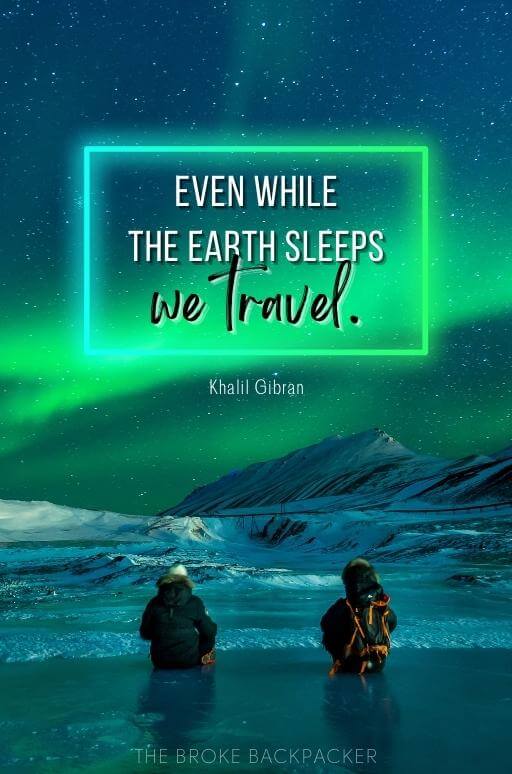
23. What if this Road – Sheenagh Pugh
“What if this road, that has held no surprises these many years, decided not to go home after all; what if it could turn left or right with no more ado than a kite-tail? What if its tarry skin were like a long, supple bolt of cloth, that is shaken and rolled out, and takes a new shape from the contours beneath? And if it chose to lay itself down in a new way, around a blind corner, across hills you must climb without knowing what’s on the other side, who would not hanker to be going, at all risks? Who wants to know a story’s end, or where a road will go?”
24. The Return – Geneen Marie Haugen
“Some day, if you are lucky, you’ll return from a thunderous journey trailing snake scales, wing fragments and the musk of Earth and moon. Eyes will examine you for signs of damage, or change and you, too, will wonder if your skin shows traces of fur, or leaves, if thrushes have built a nest of your hair, if Andromeda burns from your eyes.”
Geneen Marie Haugen talks about the lasting effect that travel has on us. When we return home to those who never left, we seem worlds apart. Do they envy us? Do they fear us for what we may know that they do not? We return changed and we can only hope that change inspires others to chase their adventures too.
25. On the World – Francis Quarles
“The world’s an Inn; and I her guest. I eat; I drink; I take my rest. My hostess, nature, does deny me Nothing, wherewith she can supply me; Where, having stayed a while, I pay Her lavish bills, and go my way. “

Final thoughts
There are so many more excellent poems about adventure out there to get your wanderlust juices flowing. These are just the tip of the iceberg for incredible adventure inspiration.
We hope these verses have ignited, or at least fanned the flames of exploration within you. Who knows, you might set off on an epic journey and be inspired to create your very own poem.

Rose Wilson
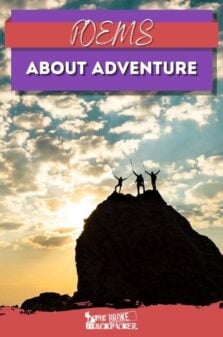
Share or save this post

I loving smelling my socks ?
Just Wonderful! No comment ?
Leave a Reply Cancel reply
Your email address will not be published. Required fields are marked *
Save my name, email, and website in this browser for the next time I comment.
Notify me of followup comments via e-mail.

- Search for:
No products in the cart.
Return to shop
- TRAVEL PLANNING SERVICES
- The Caribbean
- South Carolina
- Eastern Europe
- Switzerland
- The Netherlands
- SOLO FEMALE TRAVEL
- PRIVACY POLICY

Literary Travel , Travel Inspiration
10 travel poems that will inspire you to go.
FMTC Affiliate Disclosure: Blond Wayfarer contains affiliate links. If you make a purchase through these links, I earn a commission at no extra cost to you. This disclosure pertains to all affiliate links.
We all need beautiful travel poems.
Why? To inspire us to travel, embrace our inner bravery, and explore the world.
Take myself for instance. I love poetry. I also love travel. So it’s natural I’d write an entire post on poems that will inspire you to travel! But before I get too gushy, I have a confession to make:
It’s ironic that I love poetry so much.
When I attended college and decided to major in English, I enrolled in a poetry course for beginners, but dropped out once I learned the professor had rules against leaving the lecture to use the bathroom. (Ew).
I’ve also taken classes where poetry wasn’t open for student interpretation. Nope.
If you disagreed with the professor’s perspective, you were Dead Wrong and ought to feel sorry for bastardizing literature. So usually I’d zone out and think about my next meal, likely Wendys or a Fat Sandwich. Ahhh, memories.

Now, though, poetry inspires me. I know I probably sound like a huge nerd, but whatever, it’s the truth. I have a long list of favorite poems including travel-related ones. And what better place to share my love of travel poetry than on my blog?
Tuck in, readers! You’re in for a fun ride!
Now I hope these poems will inspire you to travel too!
Even if you hate poetry (I see you), still give these texts a fair chance. I know when I let these words flow through my mind I feel an urge to throw caution to the winds, step onto a plane, and enjoy the unknown.
Travel Poem 1: “I Wandered Lonely As A Cloud” – William Wordsworth
I’m a solo female traveler. Sure, I’ll join friends and family on trips, but I’ve visited a lot of new places alone. Just me and my backpack. I don’t mind solo travel.
If anything, exploring the world on your own terms is very, very, very liberating. You meet new people, choose your own activities, wake up whenever you want, the whole nine yards.
Besides I looooooove when no one else is around to tell me what to do. I’m an independent boss like that.
In the travel poem “I Wandered Lonely As a Cloud,” the speaker reflects on a beautiful daffodil field and all alone, he remembers their vibrant colors.
As a solo female traveler, I have a lot of memories that only I share. And yeah, I definitely reflect on those incredible times on miserable rainy NJ commutes.
Romanticism is a movement filled with travel poems of all shapes and sizes. Trust me, this isn’t the only travel poem of the era either.
Furthermore, Wordsworth wrote some of his finest poetry in the Lake District of England. I haven’t had the chance to visit (yet), but the pictures are spectacular, depicting green rolling hills and scenic lakes. No wonder he was so inspired.

Travel Poem 2. “Ulysses” – Alfred, Lord Tennyson
This travel poem is told from the perspective of Ulysses, the great ancient Greek hero of Odyssey fame. I wasn’t the biggest fan of the character when I read The Odyssey (cheater!), but I felt some sympathy for him in this poem.
In Tennyson’s work, we’ve presented with an aging and utterly bored king. Even though he’s reached old age, Ulysses decides to leave his kingdom and make new discoveries.
He simply can’t stand sitting on the throne for the rest of his life. Ulysses vows to “never yield” or give up on his journey, meaning it’s likely that he won’t return home ever again.
As you already know, I angsted a lot about turning 30. Probably too much. I worry sometimes that I’m too “old” to daydream about future trips – international and domestic – and I should just focus on, uh, more “normal” goals. Like buying a house, finding a husband, and having kids. Yawn.
But, you know what, if an adventurous life is good enough for Ulysses, then it’s good enough for me.
Ulysses is a fine piece of travel poetry even if it’s a little depressing. The lines allude Ulysses will never return to this kingdom again.

Travel Poem 3. “Song of Myself” – Walt Whitman
“Song of Myself” is a celebration of oneself. The theme absolutely shows in the title. And, as someone who practices self-love , I appreciate a travel poem that cheers on the self.
We’re often told to act humble. Not brag. To let others enjoy the spotlight. To give to charity. To remember family and friends.
Okay, I understand the importance of giving. I’ve been told I’m quite generous with my time and money, and I believe this is a positive trait of mine.
So while you don’t want to turn into an arrogant sack of awfulness, too much humbleness leads to weaker self-esteem which then leads to undermining one’s own special accomplishments.
So drop the excessive humbleness. Drop it now!
Travel requires confidence. Many people decide to travel for personal reasons such as healing a broken heart, re-discovering themselves, uncovering their family’s history, restarting their lives, etc. etc, but regardless, you need confidence to break outside your comfort zone.
“Song of Myself” is motivational and definitely can be considered a travel poem. Why? Well. This poem makes you feel as if you can do anything even travel the world.

Travel Poem 4. “The Road Not Taken” – Robert Frost
Okay, I’m entering into “cliche territory” now, but I had to include Frost’s famous travel poem on this list. It just felt incomplete without it.
In Frost’s poem, the speaker comes across two diverging paths in the woods. S/he decides to take the path not trodden by millions of others. The lesser traveled path is scarier, but the speaker treks onwards and claims the decision made a meaningful difference.
As you can see, the poem is a gigantic metaphor for making unconventional choices to benefit your life.
Solo travel especially is seen as an unusual choice but my trips have definitely molded me into the person who I am now, a stronger and more assured person. I don’t shudder at the idea of driving to new places, for example. I used to worry about getting lost all the time, but now I shrug, use my Waze app, and not worry too much.
Embark on the road not taken! You’d be surprised at what you discover on your journey.

Travel Poem 5. “Uphill” – Christina Rossetti
Eeeee, Christina Rossetti is one of my favorite Victorian poets! I’ll always hold a special place in my heart for “The Goblin Market.”
Meanwhile “Uphill” embodies all that is amazing and difficult about traveling.
The journey uphill takes the speaker the entire day, morning through night. Travel requires sleepless nights (argh, damn you, international flights), uncomfortable bus rides, and canceled train departures. I can’t count the number of times my transportation plans fell flat on its face.
Ultimately, the speaker is nervous about making it to the top of the hill. Understandable.
However, the inn at the top of the hill promises company and warm beds for all travelers. No one is ever turned away.
So, even if it’s physically and emotionally exhausting, travel also heals you beyond your wildest dreams. And the goodness of people? Wow. It still blows my mind. Both my lunch in Nazare and canceled Stockholm train prove kindness exists everywhere.
Travel Poem 6. “In a Station of the Metro” – Ezra Pound
This is one example of short travel poems. Actually, Pound’s “In a Station of the Metro” is very, very, very short. My students were shocked it even counted as a poem!
This poem gives the reader an image of nameless faces at a metro station. As travelers, we all spend time using public transportation, such as buses or trains, and watch the people around us.
Come on. Who doesn’t do this? I’m at the point where I automatically connect a subway station to traveling in a brand new city, haha.

Travel Poem 7. “The Lake Isle of Innisfree” – W. B. Yeats
W. B. Yeats might have had a bit of a creepy personal life, but his travel poem “The Lake Isle of Innisfree” deeply speaks to me.
For instance, I love huge international cities, but it’s not exactly a secret that I’m not a fan of hustle and bustle. Which is why I wonder if New Jersey is a true “fit” for my lifestyle but that’s a whole other post.
Unlike my hurried daily life, travel forces me to slow down and soak up every single experience, however small and discreet.
In Yeats’s poem, the speaker mentally returns to a beautiful lake as he stares at a road on a regular ol’ day. This poem reminds us that our journeys aren’t finished when they come to an end.
The memories of dancing on a beach in Croatia or snorkeling in Iceland or paragliding in Slovenia last forever , even in the middle of a crazy day on the job. Embrace them.
Yeats certainly knew how to write a true traveling poem.
Travel Poem 8. “The Unexplorer” – Edna St. Vincent Millay
Okay, this travel poem is totally “tongue-in-cheek,” which is exactly why I love it so very much!
The speaker is a young girl who wishes to see the end of a lovely road outside her house. Her mother tells her that the road leads to the milkman’s door, and this boooooring revelation stops the girl from traveling at all. Sad, huh?
Now I’m a traveler and proudly identify as such, but I also love staying in my apartment and watching hours of television. Sometimes I can’t even be bothered to stroll five minutes down the street to buy a carton of milk.
Millay’s poem helps me feel less guilty if I have those lazy or disappointed moments at home or abroad. Score!

Travel Poem 9. “Hearthside” – Dorothy Parker
A vivid poem that describes a speaker poking at the flames, while thinking about all the beautiful places s/he will not see.
This is one of many poems that will inspire you to travel, because do you truly want to only imagine places and never see them?
Sure, “now” is never the best time to travel, but if you wait for the perfect opportunity, while twiddling your thumbs in the safety of your room, perhaps your time will never, ever come. Better to impulsively book that low cost flight to Milan than wait and regret it.

Travel Poem 10. “Travel” – Robert Louis Stevenson
We’re all familiar with Robert Louis Stevenson, especially us literary nerds with a particular fondness for the Victorian Era. I mean, I read The Strange Case of Dr. Jekyll and Mr. Hyde when I was only sixteen and loved the creepy tale.
And now you’re telling me he wrote travel poems, too? How amazing is that?
Robert Louis Stevenson’s travel poem, simply called “Travel,” is packed with imagery of the Middle East, China, and Africa, making me want to push my comfort zone aside and branch out with my own adventures.

Why Should We Read Travel Poems?
A lot of people have a hard time grasping why poetry is valuable. And, okay, I understand their reluctance. Although I am a proud literary traveler, poetry isn’t always easy to fully comprehend especially a poem heavy in devices such as irony and allusion.
But poetry is written specifically to convey emotion. We are unable to see and touch emotion.
Read travel poem to feel the words, to dig deep and think about your upcoming journeys. Use the time for peaceful reflection, even. We don’t get enough quiet moments in our busy world.
So curl up with a pile of travel poems and read. Read til your heart is content. Much love to you.

Tell me your favorite poems – especially poems that will inspire you to travel. And remember to subscribe everywhere! Haha. I’m off to read some touching travel poems now. Be still my heart.

Rachel Elizabeth
At 22, I took my first overseas trip to Bermuda. Took a break to follow the "American Dream." Had my self-esteem broken. Embarked on my first solo trip to Scotland at 26. The travel bug dug its way under my skin. I now book multiple trips a year.
2 thoughts on “ 10 Travel Poems that will Inspire You to Go ”
Thanks for the poems, I hope to travel someday and encounter all the beautiful cornerstones of the earth.
Great post! So many poems to read and unpack!
Leave a Reply Cancel reply
You must be logged in to post a comment.
This site uses Akismet to reduce spam. Learn how your comment data is processed .
Privacy Overview
Username or email address *
Password *
Remember me Log in
Lost your password?

- Exploring the World Through Short Poems: Traveling in Verse
Embarking on a Poetic Journey
1. wanderlust, 2. a glimpse of serenity, 3. the road less traveled, 4. cultural encounter, 5. the endless journey, let your words take flight.
Traveling is a beautiful and transformative experience that allows us to explore the world, discover new cultures, and create lasting memories. While we often capture these moments through photographs and stories, poetry offers a unique way to express the essence of our travels. In just a few lines, short poems can encapsulate the emotions, sights, and experiences we encounter on our journey. Let's dive into the magical world of travel poetry and savor a few exquisite examples!
Wanderlust , a term that perfectly captures the insatiable desire to explore, is a common theme in travel poetry. This short poem by Langston Hughes beautifully encapsulates the yearning for adventure:
I tire of visiting places Of which I tire So I leave them For the places Of which I never tire.
In just a few lines, Hughes conveys a profound truth about the nature of travel. It is not the destinations themselves that captivate us, but rather the allure of the unknown, the unexplored, and the possibility of finding something truly extraordinary.
One of the most cherished aspects of travel is finding moments of tranquility amidst the chaos of the world. The following haiku by Matsuo Basho , a master of the form, captures the essence of a peaceful encounter with nature:
An old silent pond... A frog jumps into the pond— Splash! Silence again.
Through these seventeen syllables, Basho transports us to a serene setting, inviting us to reflect on the beauty and simplicity of the world around us.
Traveling often involves stepping out of our comfort zones and embracing the unfamiliar. Robert Frost's famous poem, The Road Not Taken , though not explicitly about travel, resonates deeply with those who embark on journeys of exploration:
Two roads diverged in a wood, and I— I took the one less traveled by, And that has made all the difference.
Frost's words serve as a reminder that our travels shape us, allowing us to grow and discover parts of ourselves we never knew existed.
One of the most enriching aspects of travel is immersing ourselves in different cultures. The following lines by Maya Angelou beautifully capture the essence of cultural encounters:
Ain't I a woman? I ask, as I take my place in this new land. My history, my voice, my rhythm They echo within me, forever to stand.
These words remind us of the power of travel to connect us with people from diverse backgrounds, fostering understanding, empathy, and appreciation for each other's unique stories.
Traveling is not just about reaching a destination; it is a journey that continues even after we return home. T.S. Eliot captures this sentiment in his famous poem, Little Gidding :
We shall not cease from exploration And the end of all our exploring Will be to arrive where we started And know the place for the first time.
Eliot's words remind us that travel is a lifelong pursuit, and each journey we undertake shapes our understanding of ourselves and the world.
Through short poems, we can encapsulate the essence of our travels, immortalizing the emotions and experiences that would otherwise fade with time. So, whether you embark on a grand adventure or find yourself exploring the hidden corners of your hometown, let your words take flight and capture the beauty of your journey in verse. Remember, it is in the realm of poetry that travel finds its eternal voice.
- Exploring Life Through Easy-to-Understand Poems
- Petrarch's Poems about Laura: The Eternal Muse
Entradas Relacionadas
Poems about Spain in English: A Melodic Journey Through History and Culture
Exploring the Rhythmic Journey: Poems about Trains and Railways
Famous Poems About Movement
Short Poems about Los Angeles: Capturing the City of Dreams
Poems About France: Celebrating the Enchanting Beauty in English Verse
Poems About Holidays Abroad: Exploring the Beauty of Travel

10 of the Best Poems about Roads
By Dr Oliver Tearle (Loughborough University)
Roads often feature in poetry, as symbols for our lives (the ‘journey’ we are travelling on, whether on our way to something, or heading away from it), or as markers of mankind’s interaction with nature. Below are ten of the greatest poems about roads in all of English literature, each of which does something rather different with the road or track it presents to us.
1. John Clare, ‘ On a Lane in Spring ’.
A Little Lane, the brook runs close beside And spangles in the sunshine while the fish glide swiftly by And hedges leafing with the green spring tide From out their greenery the old birds fly And chirp and whistle in the morning sun The pilewort glitters ’neath the pale blue sky …
The title of this poem by one of Romantic literature’s overlooked greats, John Clare (1793-1864), says it all: Clare describes the things he sees on a country lane during springtime, his observations tumbling out into the poem in gleeful abandon and apparent spontaneity.
Walt Whitman, ‘ Song of the Open Road ’.
Afoot and light-hearted I take to the open road, Healthy, free, the world before me, The long brown path before me leading wherever I choose.
Henceforth I ask not good-fortune, I myself am good-fortune, Henceforth I whimper no more, postpone no more, need nothing, Done with indoor complaints, libraries, querulous criticisms, Strong and content I travel the open road.
The earth, that is sufficient, I do not want the constellations any nearer, I know they are very well where they are, I know they suffice for those who belong to them …
First published in Whitman’s landmark 1856 collection Leaves of Grass , ‘Song of the Open Road’ celebrates the open road as a democratic place bringing people together from all walks of life: the road, we might say, is the great leveller.
A. E. Housman, ‘ White in the moon the long road lies ’.
White in the moon the long road lies, The moon stands blank above; White in the moon the long road lies That leads me from my love.
Still hangs the hedge without a gust, Still, still the shadows stay: My feet upon the moonlit dust Pursue the ceaseless way …
In this poem, the king of lugubrious English verse writes about leaving his beloved, with the road lying ahead of him that ‘leads me from my love’. And although he trusts that the same road will eventually lead him back to his love, first he must travel far, far away.
Rudyard Kipling, ‘ The Way through the Woods ’.
They shut the road through the woods Seventy years ago. Weather and rain have undone it again, And now you would never know There was once a road through the woods Before they planted the trees.
So begins this classic Kipling poem about an abandoned road in the woods, which turns into an almost haunted road in the final stanza, as Kipling suggests that the road ‘remembers’ the men and horses who used to pass through it.
Charlotte Mew, ‘ The Forest Road ’.
The forest road, The infinite straight road stretching away World without end: the breathless road between the walls Of the black listening trees: the hushed, grey road Beyond the window that you shut to-night Crying that you would look at it by day – There is a shadow there that sings and calls But not for you. Oh! hidden eyes that plead in sleep Against the lonely dark, if I could touch the fear And leave it kissed away on quiet lids – If I could hush these hands that are half-awake, Groping for me in sleep I could go free …
Another woodland road poem, but in this 1916 poem, Mew – a poet associated with the ‘Georgian’ school though also sometimes seen as proto-modernist – offers an altogether more macabre take on the road, as the poem’s speaker imagines her lover’s corpse rotting on a hillside.
G. K. Chesterton, ‘ The Rolling English Road ’.
Before the Roman came to Rye or out to Severn strode, The rolling English drunkard made the rolling English road. A reeling road, a rolling road, that rambles round the shire, And after him the parson ran, the sexton and the squire; A merry road, a mazy road, and such as we did tread The night we went to Birmingham by way of Beachy Head …
‘A merry road, a mazy road, and such as we did tread’: written in opposition to the prohibition of alcohol, this is one of Chesterton’s most famous poems. The poem celebrates having a few drinks and then merrily staggering home as almost a national pastime: ‘Before the Roman came to Rye or out to Severn strode, / The rolling English drunkard made the rolling English road.’
Robert Frost, ‘ The Road Not Taken ’.
Is this the most misinterpreted poem of the twentieth century ? Frost’s speaker recalls how he came to a fork in the road and opted to pursue ‘the one less travelled by’. Yet this isn’t quite true: both possible roads were equal, and Frost’s speaker admits that the idea that he chose to tread a less popular path is a bit of retrospective mythmaking. No list of great road poems could be without this.
Edward Thomas, ‘ Roads ’.
I love roads: The goddesses that dwell Far along invisible Are my favourite gods …
So begins this paean to roads by one of the great English poets of the early twentieth century. The shadow of the First World War (Thomas enlisted in 1915) can be seen in this poem, with its reference to ‘all roads’ now leading ‘to France’.
Wilfred Owen, ‘ The Roads Also ’.
The roads also have their wistful rest, When the weathercocks perch still and roost, And the looks of men turn kind to clocks And the trams go empty to their drome. The streets also dream their dream …
Written for the Sitwells’ anthology Wheels in summer 1918, ‘The Roads Also’ begins with the statement ‘The roads also have their wistful rest’, with Owen going on to reflect on the way the many lost lives in the war have impacted upon people back home.
Philip Larkin, ‘ No Road ’.
A poem called ‘No Road’ in a list of the best road poems? Well, yes, given how Larkin uses the metaphor of the road to describe a break-up, this is a fine example of how roads have been used (in countless songs as well as poems) to denote the distance between two lovers (or would-be lovers).
Continue to explore the world of poetry with these classic animal poems , these birthday poems , these classic religious poems , and these poems about Oxford .
Discover more from Interesting Literature
Subscribe to get the latest posts to your email.
Type your email…
1 thought on “10 of the Best Poems about Roads”
The Endless…Road…
I can’t see where it ends I have been running for long That I can’t even remember what I am running from I reach the first bend I take a second to catch my breath That’s when I realize I haven’t encountered a single soul Looking around, I am back to where I started from.
By Shalleen.
Leave a Reply Cancel reply
Subscribe now to keep reading and get access to the full archive.
Continue reading
- Best Member Poems
- Best Classical Poems
- Poems About
- Best Poems by Themes
- Explore Poems
- Poem Of The Day
- Best Member Poets
- Best Classical Poets
- Explore Poets
Travel Poems
Travel poems from famous poets and best beautiful poems to feel good. Best travel poems ever written. Read all poems about travel.
BEST POEMS ABOUT TRAVEL
Two roads diverged in a yellow wood, And sorry I could not travel both And be one traveler, long I stood And looked down one as far as I could ...
Indoors by technology, outdoors by speedy transport I travel the world Today in Japan, tomorrow in Rome, Next day by an ancient civilization or in Hawaii or Coast Ivory, ...
The art of losing isn't hard to master; so many things seem filled with the intent to be lost that their loss is no disaster, ...
Mother, the folk who live up in the clouds call out to me- 'We play from the time we wake till the day ends. We play with the golden dawn, we play with the silver moon.' I ask, 'But how am I to get up to you? ' ...
Once a dream did weave a shade O'er my angel-guarded bed, That an emmet lost its way ...
And now you're mine. Rest with your dream in my dream. Love and pain and work should all sleep, now. The night turns on its invisible wheels, and you are pure beside me as a sleeping amber. ...
I take my wine jug out among the flowers to drink alone, without friends. I raise my cup to entice the moon. ...
I wish I could take a quiet corner in the heart of my baby's very own world. I know it has stars that talk to him, and a sky that stoops down to his face to amuse him with its silly clouds and rainbows. ...
I speak not As I feel Speaking is not essential Silence speaks for itself ...
As the Sun withdrew his rays from the garden, and the moon threw cushioned beams upon the flowers, I sat under the trees pondering upon the phenomena of the atmosphere, looking through the branches at the strewn stars which glittered like chips of silver upon a blue carpet; and I could hear from a distance the agitated murmur of the rivulet singing its way briskly into the valley. ...
i am accused of tending to the past as if i made it, as if i sculpted it with my own hands. i did not. ...
Suzanne takes you down to her place near the river You can hear the boats go by You can spend the night beside her And you know that she's half crazy ...
When love flows between two yearning hearts, Even Gods and angels listen, As softly silence speaks, And softly silence speaks..... ...
A PROMISE to California, Also to the great Pastoral Plains, and for Oregon: Sojourning east a while longer, soon I travel toward you, to remain, ...
'Tis fine to see the Old World and travel up and down Among the famous palaces and cities of renown, To admire the crumblyh castles and the statues and kings But now I think I've had enough of antiquated things. ...
In winter we’ll travel in a little pink carriage With cushions of blue. We’ll be fine. A nest of mad kisses waits In each corner too. ...
In sealed box cars travel names across the land, and how far they will travel so, and will they ever get out, ...
DOES the road wind uphill all the way? Yes, to the very end. Will the day's journey take the whole long day? From morn to night, my friend. ...
Wrapped carefully in words, feelings travel across the miles. Edgy fingers; wait to kiss the heart of keyboard, mindful of space bar. ...
We'd rather have the iceberg than the ship, although it meant the end of travel. Although it stood stock-still like cloudy rock and all the sea were moving marble. ...
NEW POEMS ABOUT TRAVEL
Try to travel Let your mind and soul then unravel, Look about and listen and learn Let that be your yearn. ...
Today, I have the pleasure to interview Peshawa Kakayi پێشەوا کاکەیی, , a Kurdish poet from Iraq. I am happy to showcase international writers for ILA Magazine and Peshawa is extremely accomplished. Before we begin, I will share with you, his biography, and some publishing credits: Peshawa Abdalla Abdalrahman, also known as (Peshawa Kakayi پێشەوا کاکەیی,) , is a Kurdish poet and writer. He was born on April 19,1984 in Qaladze, Kurdistan Region of Iraq. He completed his primary, secondary and high school education in the same city. In 2008-2009, he obtained a bachelor's degree in political sciences from Sulaimaniyah University. He has published articles in many newspapers and publications. He has published 21 collections of poems, written and published a research book, and a book on poetry based on four in-depth interviews. He also wrote a literary diary. That's an average of 24 books so far. He also has four books ready for publication, two of which are research and two of which are poetry. ...
I walked many steps as a child I read many books while at school but travel was what fascinated me more than money; so I traveled the whole wide world many times, ...
An unknown holy force guides me Unattainable money waits for me But not blood money: Money that is instead made from wisdom ...
I drive the road you travel on. Some times, it is broad and cosy; Other times, it is narrow and lonely. ...
If when i left I did not say goodbye, It was because i kept you at my side. when at night I dream the dreams are with you. When in my dreams and thoughts I travel in my life with families and friends that I praise. ...
To some travelling is a part of education, to some travelling is mind and health uplifting, to some travelling is money wastage... To me it's life- ...
why travel? why not? aeroplanes are invented for travel travel to see the world ...
I travel with my thoughts As I do live, as I have life I travel with my thoughts ...
This Earth has witnessed so many wonders in the past; Also, relics of the past say so many incredible stories; Instant travel to anywhere in the Universe and time travel Though impossible human endeavours, had happened in the past! ...
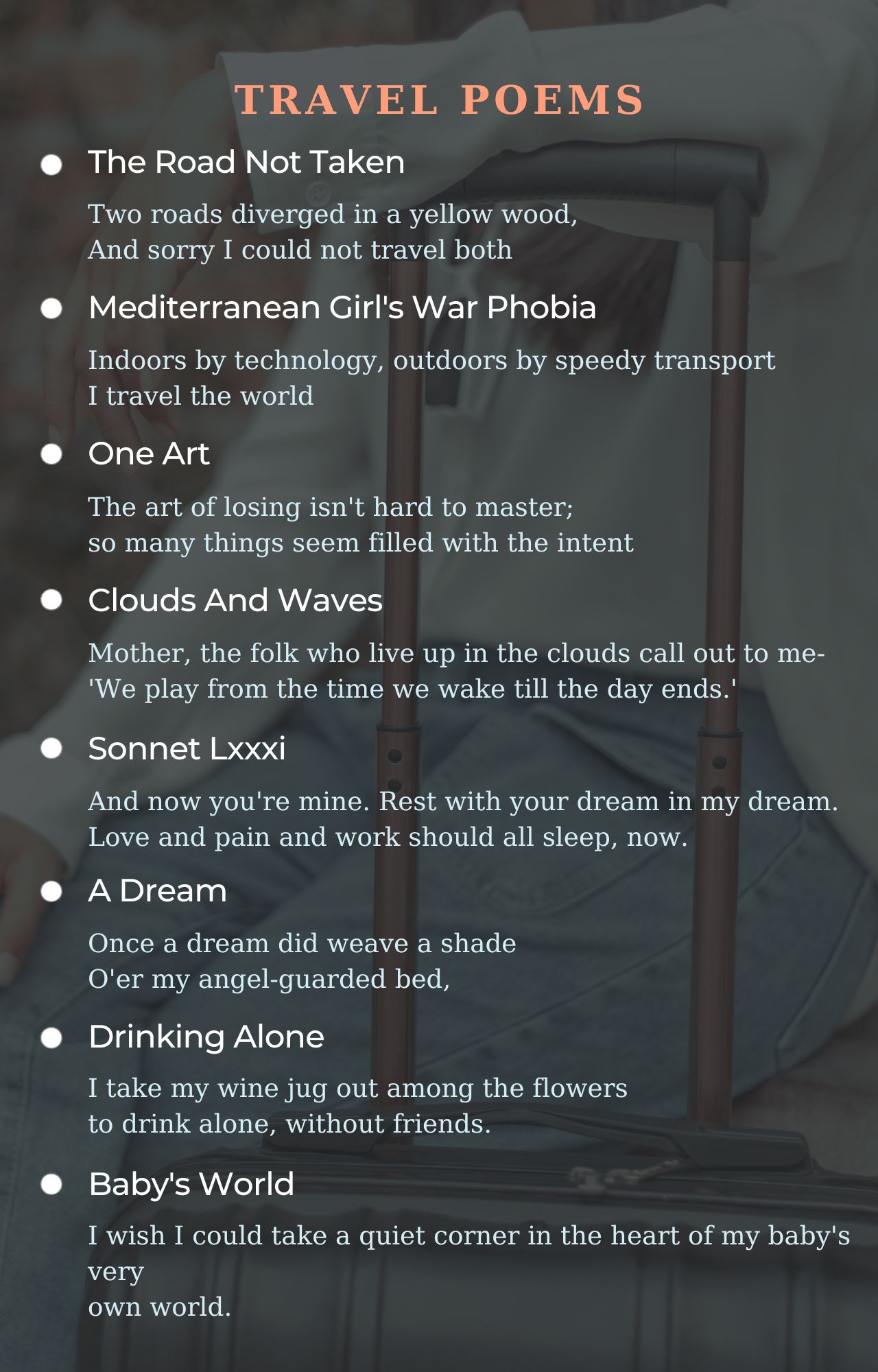
Writing a poem is not about bringing some words together to create some charming sentences. It's so much deeper than that. Writing poetry is a bridge that allows people to express their feelings and make others live every single word they read. Poetry is to educate people, to lead them away from hate to love, from violence to mercy and pity. Writing poetry is to help this community better understand life and live it more passionately. PoemHunter.com contains an enormous number of famous poems from all over the world, by both classical and modern poets. You can read as many as you want, and also submit your own poems to share your writings with all our poets, members, and visitors.
Travel Poets
Travel poets from members.
Delivering Poems Around The World
Poems are the property of their respective owners. All information has been reproduced here for educational and informational purposes to benefit site visitors, and is provided at no charge...
5/22/2024 1:13:22 PM # 1.0.0.1119

- Poetry Contests
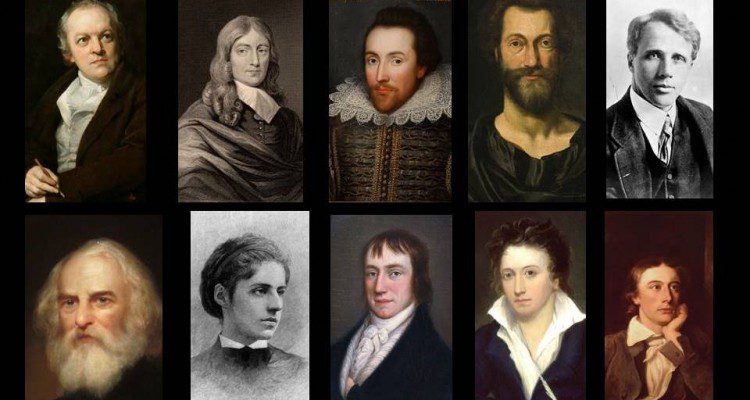
10 Greatest Poems Ever Written
Updated: April 26, 2024
An Ambitious “Best Poems” List Limited to Poems Originally Written in English and of 50 Lines or Less
by Evan Mantyk
What is poetry ? What is great poetry? The poems below answer these questions. From least greatest (10) to greatest greatest (1), the poems in this list are limited to ones originally written in the English language and which are 50 lines or less, excluding poems like Homer’s Iliad , Edgar Allan Poe’s “Raven,” Dante Alighieri’s Divine Comedy , and Lord Byron’s mock epic Don Juan . Each poem is followed by some brief analysis. Many good poems and poets had to be left off of this list. In the comments section below, feel free to make additions or construct your own lists. You can also submit analyses of classic poetry to [email protected]. They will be considered for publication on this website.
Related Content 10 Greatest Love Poems Ever Written 10 Greatest Sonnets Concerning Other Poets The Earliest English Poems Ever Written 10 Greatest Novels Ever Written 10 Greatest Poems about Death: A Grim Reader
10. “The Road Not Taken” by Robert Frost (1874-1963)

Then took the other, as just as fair, And having perhaps the better claim, Because it was grassy and wanted wear; Though as for that the passing there Had worn them really about the same,
And both that morning equally lay In leaves no step had trodden black. Oh, I kept the first for another day! Yet knowing how way leads on to way, I doubted if I should ever come back.
I shall be telling this with a sigh Somewhere ages and ages hence: Two roads diverged in a wood, and I— I took the one less traveled by, And that has made all the difference.
Analysis of the Poem
This poem deals with that big noble question of “How to make a difference in the world?” On first reading, it tells us that the choice one makes really does matter, ending: “I took the one less traveled by, / And that has made all the difference.”
A closer reading reveals that the lonely choice that was made earlier by our traveling narrator maybe wasn’t all that significant since both roads were pretty much the same anyway (“Had warn them really about the same”) and it is only in the remembering and retelling that it made a difference. We are left to ponder if the narrator had instead traveled down “The Road Not Taken” might it have also made a difference as well. In a sense, “The Road Not Taken” tears apart the traditional view of individualism, which hinges on the importance of choice, as in the case of democracy in general (choosing a candidate), as well as various constitutional freedoms: choice of religion, choice of words (freedom of speech), choice of group (freedom of assembly), and choice of source of information (freedom of press). For example, we might imagine a young man choosing between being a carpenter or a banker later seeing great significance in his choice to be a banker, but in fact there was not much in his original decision at all other than a passing fancy. In this, we see the universality of human beings: the roads leading to carpenter and banker being basically the same and the carpenters and bankers at the end of them—seeming like individuals who made significant choices—really being just part of the collective of the human race.
Then is this poem not about the question “How to make a difference in the world?” after all? No. It is still about this question. The ending is the most clear and striking part. If nothing else, readers are left with the impression that our narrator, who commands beautiful verse, profound imagery, and time itself (“ages and ages hence”) puts value on striving to make a difference. The striving is reconstituted and complicated here in reflection, but our hero wants to make a difference and so should we. That is why this is a great poem, from a basic or close reading perspective.
9. “The New Colossus” by Emma Lazarus (1849-1887)
Not like the brazen giant of Greek fame, With conquering limbs astride from land to land; Here at our sea-washed, sunset gates shall stand A mighty woman with a torch, whose flame Is the imprisoned lightning, and her name Mother of Exiles. From her beacon-hand Glows world-wide welcome; her mild eyes command The air-bridged harbor that twin cities frame. “Keep, ancient lands, your storied pomp!” cries she With silent lips. “Give me your tired, your poor, Your huddled masses yearning to breathe free, The wretched refuse of your teeming shore. Send these, the homeless, tempest-tossed to me, I lift my lamp beside the golden door!”
Inscribed on the Statue of Liberty in New York harbor, this sonnet may have the greatest placement of any English poem. It also has one of the greatest placements in history. Lazarus compares the Statue of Liberty to the Colossus of Rhodes, one of the Seven Wonders of the Ancient World. Like the Statue of Liberty, the Colossus of Rhodes was an enormous god-like statue positioned in a harbor. Although the Colossus of Rhodes no longer stands, it symbolizes the ancient Greek world and the greatness of the ancient Greek and Roman civilization, which was lost for a thousand years to the West, and only fully recovered again during the Renaissance. “The New Colossus” succinctly crystallizes the connection between the ancient world and America, a modern nation. It’s a connection that can be seen in the White House and other state and judicial buildings across America that architecturally mirror ancient Greek and Roman buildings; and in the American political system that mirrors Athenian Democracy and Roman Republicanism.
In the midst of this vast comparison of the ancient and the American, Lazarus still manages to clearly render America’s distinct character. It is the can-do spirit of taking those persecuted and poor from around the world and giving them a new opportunity and hope for the future, what she calls “the golden door.” It is a uniquely scrappy and compassionate quality that sets Americans apart from the ancients. The relevance of this poem stretches all the way back to the pilgrims fleeing religious persecution in Europe to the controversies surrounding modern immigrants from Mexico and the Middle East. While circumstances today have changed drastically, there is no denying that this open door was part of what made America great once upon a time. It’s the perfect depiction of this quintessential Americanness that makes “The New Colossus” also outstanding.
8. “Ozymandias” by Percy Bysshe Shelley (1792-1822)
I met a traveler from an antique land Who said: “Two vast and trunkless legs of stone Stand in the desert . . . Near them, on the sand, Half sunk, a shattered visage lies, whose frown, And wrinkled lip, and sneer of cold command, Tell that its sculptor well those passions read Which yet survive, stamped on these lifeless things, The hand that mocked them, and the heart that fed: And on the pedestal these words appear: ‘My name is Ozymandias, king of kings: Look on my works, ye Mighty, and despair!’ Nothing beside remains. Round the decay Of that colossal wreck, boundless and bare The lone and level sands stretch far away.”
In this winding story within a story within a poem, Shelley paints for us the image of the ruins of a statue of ancient Egyptian king Ozymandias, who is today commonly known as Ramesses II. This king is still regarded as the greatest and most powerful Egyptian pharaoh. Yet, all that’s left of the statue are his legs, which tell us it was huge and impressive; the shattered head and snarling face, which tell us how tyrannical he was; and his inscribed quote hailing the magnificent structures that he built and that have been reduced to dust, which tells us they might not have been quite as magnificent as Ozymandias imagined. The image of a dictator-like king whose kingdom is no more creates a palpable irony. But, beyond that there is a perennial lesson about the inescapable and destructive forces of time, history, and nature. Success, fame, power, money, health, and prosperity can only last so long before fading into “lone and level sands.”
There are yet more layers of meaning here that elevate this into one of the greatest poems. In terms of lost civilizations that show the ephemeralness of human pursuits, there is no better example than the Egyptians—who we associate with such dazzling monuments as the Sphinx and the Great Pyramid at Giza (that stands far taller than the Statue of Liberty)—yet who completely lost their spectacular language, culture, and civilization. If the forces of time, history, and nature can take down the Egyptian civilization, it begs the question, “Who’s next?” Additionally, Ozymandias is believed to have been the villainous pharaoh who enslaved the ancient Hebrews and who Moses led the exodus from. If all ordinary pursuits, such as power and fame, are but dust, what remains, the poem suggests, are spirituality and morality—embodied by the ancient Hebrew faith. If you don’t have those then in the long run you are a “colossal wreck.” Thus, the perfectly composed scene itself, the Egyptian imagery, and the Biblical backstory convey a perennial message and make this a great poem.
7. “Ode on a Grecian Urn” by John Keats (1795-1821)
Thou still unravish’d bride of quietness, Thou foster-child of silence and slow time, Sylvan historian, who canst thus express A flowery tale more sweetly than our rhyme: What leaf-fring’d legend haunts about thy shape Of deities or mortals, or of both, In Tempe or the dales of Arcady? What men or gods are these? What maidens loth? What mad pursuit? What struggle to escape? What pipes and timbrels? What wild ecstasy?
Heard melodies are sweet, but those unheard Are sweeter; therefore, ye soft pipes, play on; Not to the sensual ear, but, more endear’d, Pipe to the spirit ditties of no tone: Fair youth, beneath the trees, thou canst not leave Thy song, nor ever can those trees be bare; Bold Lover, never, never canst thou kiss, Though winning near the goal yet, do not grieve; She cannot fade, though thou hast not thy bliss, For ever wilt thou love, and she be fair!
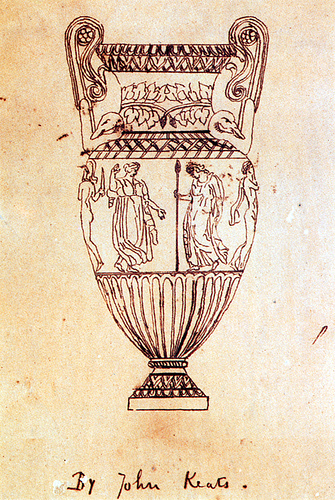
Keats’s own drawing of the Grecian Urn.
Ah, happy, happy boughs! that cannot shed Your leaves, nor ever bid the Spring adieu; And, happy melodist, unwearied, For ever piping songs for ever new; More happy love! more happy, happy love! For ever warm and still to be enjoy’d, For ever panting, and for ever young; All breathing human passion far above, That leaves a heart high-sorrowful and cloy’d, A burning forehead, and a parching tongue.
Who are these coming to the sacrifice? To what green altar, O mysterious priest, Lead’st thou that heifer lowing at the skies, And all her silken flanks with garlands drest? What little town by river or sea shore, Or mountain-built with peaceful citadel, Is emptied of this folk, this pious morn? And, little town, thy streets for evermore Will silent be; and not a soul to tell Why thou art desolate, can e’er return.
O Attic shape! Fair attitude! with brede Of marble men and maidens overwrought, With forest branches and the trodden weed; Thou, silent form, dost tease us out of thought As doth eternity: Cold Pastoral! When old age shall this generation waste, Thou shalt remain, in midst of other woe Than ours, a friend to man, to whom thou say’st, “Beauty is truth, truth beauty,—that is all Ye know on earth, and all ye need to know.”
As if in response to Shelley’s “Ozymandias,” Keats’s “Ode on a Grecian Urn” offers a sort of antidote to the inescapable and destructive force of time. Indeed, “Ode on a Grecian Urn” was published in 1819 just a year or so after “Ozymandias.” The antidote is simple: art. The art on the Grecian urn—which is basically a decorative pot from ancient Greece—has survived for thousands of years. While empires rose and fell, the Grecian urn survived. Musicians, trees, lovers, heifers, and priests all continue dying decade after decade and century after century, but their artistic depictions on the Grecian urn live on for what seems eternity.
This realization about the timeless nature of art is not new now nor was it in the 1800s, but Keats has chosen a perfect example since ancient Greek civilization so famously disappeared into the ages, being subsumed by the Romans, and mostly lost until the Renaissance a thousand years later. Now, the ancient Greeks are all certainly dead (like the king Ozymandias in Shelley’s poem) but the Greek art and culture live on through Renaissance painters, the Olympic Games, endemic Neoclassical architecture, and, of course, the Grecian urn.
Further, what is depicted on the Grecian urn is a variety of life that makes the otherwise cold urn feel alive and vibrant. This aliveness is accentuated by Keats’s barrage of questions and blaring exclamations: “More happy love! more happy, happy love!” Art, he seems to suggest, is more alive and real than we might imagine. Indeed, the last two lines can be read as the urn itself talking: “Beauty is truth, truth beauty,—that is all / Ye know on earth, and all ye need to know.” In these profound lines, Keats places us within ignorance, suggesting that what we know on earth is limited, but that artistic beauty, which he has now established is alive, is connected with truth. Thus, we can escape ignorance, humanness, and certain death and approach another form of life and truth through the beauty of art. This effectively completes the thought that began in Ozymandias and makes this a great poem one notch up from its predecessor.
6. “The Tiger” by William Blake (1757-1827)
Tiger Tiger, burning bright, In the forests of the night; What immortal hand or eye, Could frame thy fearful symmetry?
In what distant deeps or skies. Burnt the fire of thine eyes? On what wings dare he aspire? What the hand, dare seize the fire?
And what shoulder, and what art, Could twist the sinews of thy heart? And when thy heart began to beat, What dread hand? and what dread feet?
What the hammer? what the chain, In what furnace was thy brain? What the anvil? what dread grasp, Dare its deadly terrors clasp!
When the stars threw down their spears And water’d heaven with their tears: Did he smile his work to see? Did he who made the Lamb make thee?
Tiger Tiger burning bright, In the forests of the night: What immortal hand or eye, Dare frame thy fearful symmetry?
This poem contemplates a question arising from the idea of creation by an intelligent creator. The question is this: If there is a loving, compassionate God or gods who created human beings and whose great powers exceed the comprehension of human beings, as many major religions hold, then why would such a powerful being allow evil into the world. Evil here is represented by a tiger that might, should you be strolling in the Indian or Chinese wild in the 1700s, have leapt out and killed you. What would have created such a dangerous and evil creature? How could it possibly be the same divine blacksmith who created a cute harmless fluffy lamb or who created Jesus, also known as the “Lamb of God” (which the devoutly Christian Blake was probably also referring to here). To put it another way, why would such a divine blacksmith create beautiful innocent children and then also allow such children to be slaughtered. The battery of questions brings this mystery to life with lavish intensity.
Does Blake offer an answer to this question of evil from a good God? It would seem not on the surface. But, this wouldn’t be a great poem if it were really that open ended. The answer comes in the way that Blake explains the question. Blake’s language peels away the mundane world and offers a look at the super-reality to which poets are privy. We fly about in “forests of the night” through “distant deeps or skies” looking for where the fire in the tiger’s eye was taken from by the Creator. This is the reality of expanded time, space, and perception that Blake so clearly elucidates elsewhere with the lines “To see a world in a grain of sand / And a heaven in a wild flower, / Hold infinity in the palm of your hand, / And eternity in an hour” (“Auguries of Innocence”). This indirectly tells us that the reality that we ordinarily know and perceive is really insufficient, shallow, and deceptive. Where we perceive the injustice of the wild tiger something else entirely may be transpiring. What we ordinarily take for truth may really be far from it: a thought that is scary, yet also sublime or beautiful—like the beautiful and fearsome tiger. Thus, this poem is great because it concisely and compellingly presents a question that still plagues humanity today, as well as a key clue to the answer.
5. “On His Blindness” by John Milton (1608-1674)
When I consider how my light is spent Ere half my days in this dark world and wide, And that one talent which is death to hide Lodg’d with me useless, though my soul more bent To serve therewith my Maker, and present My true account, lest he returning chide, “Doth God exact day-labour, light denied?” I fondly ask. But Patience, to prevent That murmur, soon replies: “God doth not need Either man’s work or his own gifts: who best Bear his mild yoke, they serve him best. His state Is kingly; thousands at his bidding speed And post o’er land and ocean without rest: They also serve who only stand and wait.”
This poem deals with one’s limitations and shortcomings in life. Everyone has them and Milton’s blindness is a perfect example of this. His eyesight gradually worsened and he became totally blind at the age of 42. This happened after he served in an eminent position under Oliver Cromwell’s revolutionary Puritan government in England. To put it simply, Milton rose to the highest position an English writer might at the time and then sank all the way down to a state of being unable read or write on his own. How pathetic!
The genius of this poem comes in the way that Milton transcends the misery he feels. First, he frames himself, not as an individual suffering or lonely, but as a failed servant to the Creator: God. While Milton is disabled, God here is enabled through imagery of a king commanding thousands. This celestial monarch, his ministers and troops, and his kingdom itself are invisible to human eyes anyway, so already Milton has subtly undone much of his failing by subverting the necessity for human vision. More straightforwardly, through the voice of Patience, Milton explains that serving the celestial monarch only requires bearing those hardships, which really aren’t that bad (he calls them “mild”) that life has burdened you with (like a “yoke” put on an ox). This grand mission from heaven may be as simple as standing and waiting, having patience, and understanding the order of the universe. Thus, this is a great poem because Milton has not only dispelled sadness over a major shortcoming in life but also shown how the shortcoming is itself imbued with an extraordinary and uplifting purpose.
4. “A Psalm of Life” by Henry Wadsworth Longfellow (1807-1882)
What the heart of the young man said to the Psalmist
Tell me not, in mournful numbers, Life is but an empty dream! For the soul is dead that slumbers, And things are not what they seem.
Life is real! Life is earnest! And the grave is not its goal; Dust thou art, to dust returnest, Was not spoken of the soul.
Not enjoyment, and not sorrow, Is our destined end or way; But to act, that each tomorrow Find us farther than today.
Art is long, and Time is fleeting, And our hearts, though stout and brave, Still, like muffled drums, are beating Funeral marches to the grave.
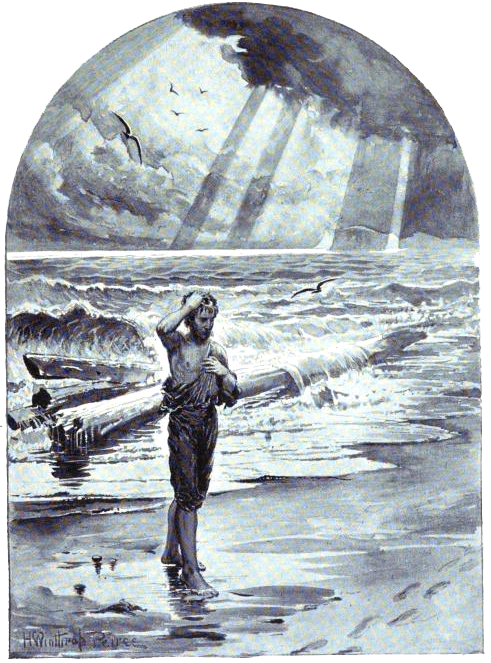
Trust no Future, howe’er pleasant! Let the dead Past bury its dead! Act,—act in the living Present! Heart within, and God o’erhead!
Lives of great men all remind us We can make our lives sublime, And, departing, leave behind us Footprints on the sands of time;—
Footprints, that perhaps another, Sailing o’er life’s solemn main, A forlorn and shipwrecked brother, Seeing, shall take heart again.
Let us, then, be up and doing, With a heart for any fate; Still achieving, still pursuing, Learn to labor and to wait.
In this nine-stanza poem, the first six stanzas are rather vague since each stanza seems to begin a new thought. Instead, the emphasis here is on a feeling rather than a rational train of thought. What feeling? It seems to be a reaction against science, which is focused on calculations (“mournful numbers”) and empirical evidence, of which there is no, or very little, to prove the existence of the soul. Longfellow lived when the Industrial Revolution was in high gear and the ideals of science, rationality, and reason flourished. From this perspective, the fact that the first six stanzas do not follow a rational train of thought makes perfect sense.
According to the poem, the force of science seems to restrain one’s spirit or soul (“for the soul is dead that slumbers”), lead to inaction and complacency from which we must break free (“Act,—act in the living Present! / Heart within, and God o’erhead!”) for lofty purposes such as Art, Heart, and God before time runs out (“Art is long, and Time is fleeting”). The last three stanzas—which, having broken free from science by this point in the poem, read more smoothly—suggest that this acting for lofty purposes can lead to greatness and can help our fellow man.
We might think of the entire poem as a clarion call to do great things, however insignificant they may seem in the present and on the empirically observable surface. That may mean writing a poem and entering it into a poetry contest, when you know the chances of your poem winning are very small; risking your life for something you believe in when you know it is not popular or it is misunderstood; or volunteering for a cause that, although it may seem hopeless, you feel is truly important. Thus, the greatness of this poem lies in its ability to so clearly prescribe a method for greatness in our modern world.

3. “Daffodils” by William Wordsworth (1770-1850)
I wandered lonely as a cloud That floats on high o’er vales and hills, When all at once I saw a crowd, A host, of golden daffodils; Beside the lake, beneath the trees, Fluttering and dancing in the breeze.
Continuous as the stars that shine And twinkle on the milky way, They stretched in never-ending line Along the margin of a bay: Ten thousand saw I at a glance, Tossing their heads in sprightly dance.
The waves beside them danced; but they Out-did the sparkling waves in glee: A poet could not but be gay, In such a jocund company: I gazed—and gazed—but little thought What wealth the show to me had brought:
For oft, when on my couch I lie In vacant or in pensive mood, They flash upon that inward eye Which is the bliss of solitude; And then my heart with pleasure fills, And dances with the daffodils.
Through the narrator’s chance encounter with a field of daffodils by the water, we are presented with the power and beauty of the natural world. It sounds simple enough, but there are several factors that contribute to this poem’s greatness. First, the poem comes at a time when the Western world is industrializing and man feels spiritually lonely in the face of an increasingly godless worldview. This feeling is perfectly harnessed by the depiction of wandering through the wilderness “lonely as a cloud” and by the ending scene of the narrator sadly lying on his couch “in vacant or in pensive mood” and finding happiness in solitude. The daffodils then become more than nature; they become a companion and a source of personal joy. Second, the very simplicity itself of enjoying nature—flowers, trees, the sea, the sky, the mountains etc.—is perfectly manifested by the simplicity of the poem: the four stanzas simply begin with daffodils, describe daffodils, compare daffodils to something else, and end on daffodils, respectively. Any common reader can easily get this poem, as easily as her or she might enjoy a walk around a lake.
Third, Wordsworth has subtly put forward more than just an ode to nature here. Every stanza mentions dancing and the third stanza even calls the daffodils “a show.” At this time in England, one might have paid money to see an opera or other performance of high artistic quality. Here, Wordsworth is putting forward the idea that nature can offer similar joys and even give you “wealth” instead of taking it from you, undoing the idea that beauty is attached to earthly money and social status. This, coupled with the language and topic of the poem, which are both relatively accessible to the common man, make for a great poem that demonstrates the all-encompassing and accessible nature of beauty and its associates, truth and bliss.
2. “Holy Sonnet 10: Death, Be Not Proud” by John Donne (1572-1631)
Death, be not proud, though some have called thee Mighty and dreadful, for thou art not so; For those whom thou think’st thou dost overthrow Die not, poor Death, nor yet canst thou kill me. From rest and sleep, which but thy pictures be, Much pleasure; then from thee much more must flow, And soonest our best men with thee do go, Rest of their bones, and soul’s delivery. Thou art slave to fate, chance, kings, and desperate men, And dost with poison, war, and sickness dwell, And poppy or charms can make us sleep as well And better than thy stroke; why swell’st thou then? One short sleep past, we wake eternally And death shall be no more; Death, thou shalt die.
Death is a perennial subject of fear and despair. But, this sonnet seems to say that it need not be this way. The highly focused attack on Death’s sense of pride uses a grocery list of rhetorical attacks: First, sleep, which is the closest human experience to death, is actually quite nice. Second, all great people die sooner or later and the process of death could be viewed as joining them. Third, Death is under the command of higher authorities such as fate, which controls accidents, and kings, who wage wars; from this perspective, Death seems no more than a pawn in a larger chess game within the universe. Fourth, Death must associate with some unsavory characters: “poison, wars, and sickness.” Yikes! They must make unpleasant coworkers! (You can almost see Donne laughing as he wrote this.) Fifth, “poppy and charms” (drugs) can do the sleep job as well as Death or better. Death, you’re fired!
The sixth, most compelling, and most serious reason is that if one truly believes in a soul then Death is really nothing to worry about. The soul lives eternally and this explains line 4, when Donne says that Death can’t kill him. If you recognize the subordinate position of the body in the universe and identify more fully with your soul, then you can’t be killed in an ordinary sense. Further, this poem is so great because of its universal application. Fear of death is so natural an instinct and Death itself so all-encompassing and inescapable for people, that the spirit of this poem and applicability of it extends to almost any fear or weakness of character that one might have. Confronting, head on, such a fear or weakness, as Donne has done here, allows human beings to transcend their condition and their perception of Death, more fully perhaps than one might through art by itself—as many poets from this top ten list seem to say—since the art may or may not survive may or may not be any good, but the intrinsic quality of one’s soul lives eternally. Thus, Donne leaves a powerful lesson to learn from: confront what you fear head on and remember that there is nothing to fear on earth if you believe in a soul.
1. “Sonnet 18” by William Shakespeare (1564-1616)
Shall I compare thee to a summer’s day? Thou art more lovely and more temperate: Rough winds do shake the darling buds of May, And summer’s lease hath all too short a date: Sometime too hot the eye of heaven shines, And often is his gold complexion dimm’d; And every fair from fair sometime declines, By chance, or nature’s changing course, untrimm’d; But thy eternal summer shall not fade Nor lose possession of that fair thou ow’st; Nor shall Death brag thou wander’st in his shade, When in eternal lines to time thou grow’st; So long as men can breathe or eyes can see, So long lives this, and this gives life to thee.
Basically, the narrator tells someone he esteems highly that this person is better than a summer’s day because a summer’s day is often too hot and too windy, and especially because a summer’s day doesn’t last; it must fade away just as people, plants, and animals die. But, this esteemed person does not lose beauty or fade away like a summer’s day because he or she is eternally preserved in the narrator’s own poetry. “So long lives this, and this gives life to thee” means “This poetry lives long, and this poetry gives life to you.”
From a modern perspective this poem might come off as pompous (assuming the greatness of one’s own poetry), arbitrary (criticizing a summer’s day upon what seems a whim), and sycophantic (praising someone without substantial evidence). How then could this possibly be number one? After the bad taste of an old flavor to a modern tongue wears off, we realize that this is the very best of poetry. This is not pompous because Shakespeare actually achieves greatness and creates an eternal poem. It is okay to recognize poetry as great if it is great and it is okay to recognize an artistic hierarchy. In fact, it is absolutely necessary in educating, guiding, and leading others. The attack on a summer’s day is not arbitrary. Woven throughout the language is an implicit connection between human beings, the natural world (“a summer’s day”), and heaven (the sun is “the eye of heaven”). A comparison of a human being to a summer’s day immediately opens the mind to unconventional possibilities; to spiritual perspectives; to the ethereal realm of poetry and beauty. The unabashed praise for someone without a hint as to even the gender or accomplishments of the person is not irrational or sycophantic. It is a pure and simple way of approaching our relationships with other people, assuming the best. It is a happier way to live—immediately free from the depression, stress, and cynicism that creeps into our hearts. Thus, this poem is strikingly and refreshingly bold, profound, and uplifting.
Finally, as to the question of overcoming death, fear, and the decay of time, an overarching question in these great poems, Shakespeare adroitly answers them all by skipping the question, suggesting it is of no consequence. He wields such sublime power that he is unmoved and can instead offer remedy, his verse, at will to those he sees befitting. How marvelous!
NOTE TO READERS: If you enjoyed this poem or other content, please consider making a donation to the Society of Classical Poets.
The Society of Classical Poets does not endorse any views expressed in individual poems or commentary.
CODEC Stories:
Share this:.
- Click to share on Twitter (Opens in new window)
- Click to share on Facebook (Opens in new window)
- Click to print (Opens in new window)
- Click to share on LinkedIn (Opens in new window)
- Click to share on WhatsApp (Opens in new window)
- Click to email a link to a friend (Opens in new window)
- Click to share on Pinterest (Opens in new window)
264 Responses
What an interesting enterprise, Evan? I have always loved lists. Thank you for taking the time to write out all of these insightful analyses. You really know how to capture a person’s attention with your headlines. “Ten Greatest Poems Ever Written” reminded me of what first drew me to your site in the first place, a few years back. I believe it was something as blunt and as brazen as this: “Poetry should be metered, because metered poetry is, quite simply, better than free verse.”
While my list may be different than yours (I probably would add a Yeats and Millay or a Hardy), it would obviously be difficult to bench any of the all-stars you have in your present lineup. What would make it easier, or more amenable to more great poems being subsumed in more lists, would be to narrow the scope of the lists. For example, Ten Greatest Sonnets Ever, Ten Greatest Ballads Ever, Ten Greatest Romantic Poems Ever, Ten Greatest Twentieth-Century Sonnets Ever, Ten Greatest Eulogies and Elegies Ever, etc.. For what constitutes a poem? We are obviously excluding Epics.
I have invariably been drawn to your brazenness though. You know how to get a crowd into it…
Concerning your analyses, I thought that it was interesting that you associated “mournful numbers” with a “reaction against science.” I have always been under the impression that Longfellow was referring to “morbid poems” or psalms: as Petrarch often called his poems “numbers,” which in a sense metered poetry is, a compilation of syllables and stresses (i.e. music); but your postulation seems to work as well, and would function propitiously in an essay for one of your students comparing and contrasting Poe’s “Sonnet–To Science” and Whitman’s (hate him or love him–unlike Pound, I have still not made my pact) “When I Heard the Learn’d Astronomer.”
I will have to start working on my own lists; although I believe it could be an eternal task, for “man is a giddy thing,” as Shakespeare wrote, and I thoroughly love so many diverse poems.
Thanks, Reid. I mention at the beginning that it is only short poems, not longer works or excerpts of longer works, so epics are out. If you want to make a top ten (or five?) list for specific poetry fields for the Society that would be great! I am contemplating one on war poems (again, short poems, not epics or excerpts). Any ideas?
For “numbers” in Psalm of Life, I’ve seen interpretations such as poetic meter, Bible or poetic verses, or the Book of Numbers in the Bible specifically. After studying Longfellow quite a bit and particularly this poem, memorizing it and teaching it to my students, my own interpretation is that Longfellow is basically saying “don’t be daunted by the odds” “take some risks” or “don’t approach things in such a calculating and scientific way” If you take a look at a map of the U.S. in the 1830s, you’ll see that most of the U.S. is territories, much of it unsettled. This was the time of the Wild West and Manifest Destiny (the pitfalls in expansion can be seen in Little House on the Prairie and that was 40 years later). Doing things by the numbers would not have meant a healthy, expanding U.S. in the long run. This also fits in with the recurring war theme since enlisting is a similarly risky proposition. IMO.
Arabic poetry is the best in history, it has far more words for description and it has deep meanings. But I see that this list should’ve been called ” In European History” since there’s no variety.
“Numbers” definitely means “verse” here, and nothing else at all. It is a Latinism. You can forget any other ideas!
Hello! For war poems, you can’t possibly go past Wilfred Owen’s ‘Futility’. Or any others of his. Oh, I see this is all so old. Oh well. It’s 2020 now and Wilfred Owen’s poems are still great!
Great poems last for a long time.
Read Felt very happy to know world-class literatures.
It was my first time reading the poem and I thought it meant the mournfully high number of people who say such things.
I like it. Maybe occam’s razor (the simplest explanation is most likely the right one) may apply here. We may be reading too much into it. Thank you!
This was my first thought too. I remember my high school teacher interpreting it in a similar way. Simple and succinct.
poetry is not compared , because it is the sum of feelings and emotions < even thoughts…the one has ….so no way but to find beauty in each and every line of verse
Superb…
50 Cent, In Da Club. Poetry for the working man.
After the rock poem to inst. of quer to way another charactor… in the poem of shask.
To ask to people in the near way of life
music could be than to Dead of new archeology in the world
Nice collection. It took me to the flashback, reminded of schooldays & collage as well. Can still imagine my lecturer standing & explaining in her own style.
You to change the title,, 10 of the best english poem ” . I do not like at least one of them. IF by Kipling is far far away more beautiful than this list. Man and Women by Victor Hugo, Eminescu. You should read more poem to do the best 10 ever written.
Kipling sensibly NEVER would have proclaimed he was a finer poet than any of these listed here (except possibly for Frost and Longfellow, whose styles are clearly closest to his). Still it seems strange not to mention Gerard Manley Hopkin, TSE, or Emily Dickinson, though I suspect you wouldn’t champion any of those three either.
I aint reading allthat
The title of this article should read “10 Greatest Poems Ever Written IN ENGLISH”. Anything written in other languages- poetry, literature, lyrics, etc. lose their beauty with translation.
If By Rudyard Kipling
If you can keep your head when all about you Are losing theirs and blaming it on you, If you can trust yourself when all men doubt you, But make allowance for their doubting too; If you can wait and not be tired by waiting, Or being lied about, don’t deal in lies, Or being hated, don’t give way to hating, And yet don’t look too good, nor talk too wise:
If you can dream—and not make dreams your master; If you can think—and not make thoughts your aim; If you can meet with Triumph and Disaster And treat those two impostors just the same; If you can bear to hear the truth you’ve spoken Twisted by knaves to make a trap for fools, Or watch the things you gave your life to, broken, And stoop and build ’em up with worn-out tools:
If you can make one heap of all your winnings And risk it on one turn of pitch-and-toss, And lose, and start again at your beginnings And never breathe a word about your loss; If you can force your heart and nerve and sinew To serve your turn long after they are gone, And so hold on when there is nothing in you Except the Will which says to them: ‘Hold on!’
If you can talk with crowds and keep your virtue, Or walk with Kings—nor lose the common touch, If neither foes nor loving friends can hurt you, If all men count with you, but none too much; If you can fill the unforgiving minute With sixty seconds’ worth of distance run, Yours is the Earth and everything that’s in it, And—which is more—you’ll be a Man, my son!
This is my favourite too .
good but how can i find jack and jill went up the hill
what do you think of this poem?
I reminisced of a time long ago when I was only twenty years old. I was studying English 101 at the University Of British Columbia in the summer of Eighty-Four. It was at a summer session because I had failed English 101 two years before. A failure due more to my citizenship in a different realm than to the failings of my intellect, aptitude or the magnanimity of my core. “You have such a poignant and evocative writing style,” wrote my teacher on the short-story I had submitted the week before. I had written about a lonely sojourn on a desolate beach in the pregnant moment, When sunset injures day’s abandon and grants night the freedom to roam. I had written about the mighty North Shore mountains, Hoary with age and reverberating with an energy ineffable to the mind, But savored by the soul. I remembered how exhausting of mind, but above all of the soul, writing that short-story had been. I tried to reveal my spirit bare and exposed. I tried to destroy the ramparts and blow open the heavy gates shielding my secretive core. But through my exhausting efforts I had only succeeded in weakening the facade between me and the world, Usually held at arm’s length, But through my story then, only slightly nearer yet still remote. There is an essence within everyone hidden in a chamber far beneath the veneer that encrusts our core. We seldom allow it expression beyond just its fractured shadows dancing on an external wall. But if we all dig deep and reach into this secretive chamber, We will, to our astonishment, discover we are all reaching into the same chamber, Not a separate one for each within the all. And then we will grasp each other’s same-hand. We all share the same soul. I knew that in the novel of my compulsion I would have to expose this chamber, Ramparts and heavy gates destroyed once and for all. And my novel would then cry out from this collective chamber, And speak for my left and for my right with one voice for all. It would be the ineffable ground of being reaching out to humanity from the navel of Creation, Proclaiming the dawn of a Third Age. It would announce the sunset of the Second Age before this coming dawn. A moment pregnant with change that will forever be remembered in the annals of the Civilization of Man. It would herald a paradigm shift far greater than the Renaissance, Not just an age of reason, but of reason and divinity intertwined as an inseparable whole. I envision the Third Age to be promoting the two primordial dancers, The abstract magical and the other its complementary whole. To engage in the Dance and thence unshard into the Eternal Garden from whence we all came forth. They are in Eternity entwined, but sharded into the realms of space and time. They are shards of the divine. Would composing such a novel be an arduous journey, Exhausting my body and above all my core? Would I be as a drowning man, Gasping for breath, Kicking and screaming while with futility grasping for shore? But would every paragraph and page exhaust me, Yet also leave me yearning for more? It would I am sure. This arduous compulsion will also uplift and invigorate me with waves of catharsis and frisson. And I pray dearly for the same in my reader, of soul-piercing joy. If I fail to evoke the same in my audience then I would have failed to breach the ramparts and the gates shielding my innermost chamber, Our collective soul. Only within this innermost shared sanctum can I truly touch someone’s soul. And by touching one, I will be touching them all.
Wicked!!!!!I think it should be on the list.
Thanks for the beautiful poem
This should definitely be on that list
My Dad often reminded me of this poem. So good. Thanks! Rick
That’s my favorite poem.
this is the thirteen chapter in class 9th
Well chosen. I always believed that “If” is without a doubt, the best poem ever written and the best message ever given about life…
THIS IS GOOD
Awesome and meaningful poem.
if is a great poem
Its eternal advice to all. Wonderfully, whole heartedly written poetry. Hats off to the poet.
so wonderful and amazing
Now that’s a masterpiece, to be sure!
That’s the greatest poetry ever
In the words of Auden: “[Time] Worships language and forgives / Everyone by whom it lives… Time that with this strange excuse / Pardoned Kipling and his views.” THE JUNGLE BOOK was one of my favorite stories as a kid and “IF” is an unforgettable poem.
I love this series of the ten best. To comment on the first two – whilst not disagreeing with Evan’s analysis, I think there is even more technical genius in this poem: for example, the rhyming of ‘hence’ obliquely with ‘difference’, that off-rhyme conveys just that sense of uncertainty about choice that Evan outlines. And as for Emma Lazarus – isn’t her surname part of the poem: America, the land where the dead came back and were welcomed to life? So brilliantly synchronous!
This is a wonderful list, Evan, and thank you for sharing!
Honey what are you doing on this website you are grounded for 5 months
In this data-rich period of the last 100 years, we have seen myriads of lists composed, the top 10 vehicles of the last fifty years, the top 40 songs of the week, the top 100 contributers to humanity of the last 1000 years, the 500 richest people in the World this year, and so forth. It is a way for us in mass society to make sense of all the information that comes our way. Another reason for compiling such lists is that it clarifies our own visions, artistic, scientific, philosophical, etc.
However, all lists are at best provisional. They are works in progress. Things change. The most popular meme this week might not be the most popular meme next week. Our favourite cuisine this season may not be our favourite the next. In fact, we are creatures of change. We thrive on variety. So it should not come as a surprise to anyone that even our own lists will alter over time.
Mr. Evan Mantyk has done us a great service in posting his list of the 10 Greatest Poems Ever Written, not because he was right (after all, who could be right? De gustibus non est disputandum.), but because he gets us thinking. As Mr. Mantyk knows, by emphasizing poems of 50 lines or less (not his exact requirement, but his example), one must exclude epics, poetic plays, narrative poems, dramatic monologues, didactic verse essays, satires and epistles, etc. One of the paradoxes of making a list of the greatest short poems ever written is in attributing greatness to the smaller works, when the very meaning of greatness implies a largeness of expanse, of vision, etc.
Perhaps his title could have been retitled The Ten Short Poems in English I Admire Most. However, his title is catchier, and may even draw more readers in to this growing site; but I can’t imagine anyone would have the exact same list in the exact same order. Even he, I suspect, will change his list over time. Here is his list. 1. Sonnet 18, Shall I Compare Thee William Shakespeare 2. Death, Be Not Proud John Donne 3. Daffodils William Wordsworth 4. A Psalm of Life Henry Wadsworth Longfellow 5. On His Blindness John Milton 6. The Tyger William Blake 7. Ode on a Grecian Urn John Keats 8. Ozymandias Percy Bysshe Shelley 9. The New Colossus Emma Lazarus 10. The Road Not Taken Robert Frost What is remarkable about his list is its specificity and his analyses, which I thoroughly enjoyed reading. As I read his list, however, I kept thinking, but what about this poem, or that poem?
First off, on his list, Shakespeare’s sonnet which begins with “Shall I compare thee to a summer’s day?” is a wonderful choice. I have always enjoyed his comparison with a summer’s day, because for me a summer’s day has always seemed the best of days, and Shakespeare indicates its flaws in marvelous diction. Yet, the theme of love being preserved in verse Shakespeare has used elsewhere, as so has Edmund Spenser in Amoretti, Sonnet 75, “Where whenas death shall all the world subdue,/ Our love shall live, and later life renew.” In addition, Spenser’s sonnet, which takes place upon a beach next to a sea, sets up a dramatic contrast of two points of view on the topic, in a dialogue between a man and a woman. Other Shakespearean sonnets are also in competition with Sonnet 30. One could, in fact, make a top 10 of Shakespeare’s sonnets. Sonnet 116 for me has always had a special place, because in its delivery, Shakespeare even goes so far as to suggest that if true love does not exist, then he never wrote a thing. It is the Shakespearean sonnet that most moves me, so much so I recited it at the wedding of my college roommate many years ago. This shows one of the pitfalls of poetic placement; various poems may suggest more to us than others because of our own particular circumstances. One more example will suffice. Although I do not think it superior (nor inferior) to Wordsworth’s Daffodils, his sonnet Composed On Westminster Bridge, September 3, 1802, has stirred me to write my own sonnet on Westminster Bridge in London. What appeals to me in that sonnet is its unusual vantage point, its precision, the use of particular words, like steep, and its terse landscaping.
Mr. Mantyk’s second choice, Death, Be Not Proud is a fine sonnet as well. As in Shakespeare’s Sonnet 116, what appeals to me is the audacity of the author, “And death shall be no more. Death thou shalt die.” One would be hard-pressed to find such confidence in the face of death in any writer since. But for me, the John Donne poem that takes my breath away is A Valediction: Forbidding Mourning, with its extraordinary conceit of love with a mathematical compass. It is a linguistic tour de force that sweeps me away with its idealism, its learning, and its paradoxically intricate simplicity. For me, nothing like it in English poetry reaches such a refined, intellectual brilliance; and for a long time, it has seemed a worthy paradigm to emulate in my poetry.
I agree with Reid McGrath that it would be difficult to bench any of the all-stars Mr. Mantyk has in his present lineup, and concur with his idea that there could be more lists with the narrowing of the scope, as one’s ten top sonnets, etc. I do admit to favouring Shelley’s Ozymandias over Ode to the West Wind, but is it a better poem? Blake’s The Tyger may be the most anthologized poem in English literature, but is it superior to Ode on a Grecian Urn? And at 50 lines long shouldn’t Keats’ Ode rather be compared to works, like Jonson’s To the Memory of My Beloved Author, Mr. William Shakespeare, Marvell’s To His Coy Mistress, Gray’s Elegy Written in a Country Churchyard, Browning’s My Last Duchess, Tennyson’s Ulysses, Poe’s The Raven, Longfellow’s Paul Revere’s Ride, T. S. Eliot’s The Lovesong of J. Alfred Prufrock, Dylan Thomas’ Fern Hill, Robert Lowell’s Mr. Edwards and the Spider, etc. I do think Frost’s The Road Not Taken is his best performance, but I very much admire Stopping By Woods on a Snowy Evening. And other poems come to mind: Auld Lang Syne author Burns’ lively To a Mouse, A. E. Housman’s terse To an Athlete Dying Young, (BJM’s offer of) Rudyard Kipling’s inspiring If, Matthew Arnold’s visionary, melancholic Dover Beach, Wilfred Owen’s Dulce et Decorum Est, Thomas’ villanelle Do Not Go Gentle Into That Good Night…the list going on to the crack of doom.
& the minority report is chosen
a hundred years from now at least one or two of the poems on your list will be voted off by future scholars (if humans have not already destroyed themselves), and bob dylan’s desolation row will be half way up the list.
And Ezra Pound and T. S. Eliot Fighting in the captain’s tower While calypso singers laugh at them And fishermen hold flowers
for my two cents worth the choices you made aren’t bad.
a lot of people now believe that the most beautiful image to be found anywhere in poetry is: “to dance beneath the diamond sky with one hand waving free, silhouetted by the sea…”
i never finished my ph.d. in english lit at uc berkeley. timothy leary whispered the siren words in my ear, “turn on, tune in, drop out,” but before i did, i read a lot of poetry, so my opinion is not without some professional value.
i love the silly and absurd as in laverne baker’s “jim dandy in a submarine got a message from a mermaid queen. she was hangin’ from a fishin’ line. jim dandy didn’t waste no time. jim dandy to the rescue. jim dandy to the rescue.”
hank williams cold, cold heart is one of the greatest poetic commentaries on love ever written.
O Captain! My Captain! By Walt Whitman (1819-1892)
O Captain! my Captain! our fearful trip is done, The ship has weather’d every rack, the prize we sought is won, The port is near, the bells I hear, the people all exulting, While follow eyes the steady keel, the vessel grim and daring; But O heart! heart! heart! O the bleeding drops of red, Where on the deck my Captain lies, Fallen cold and dead. O Captain! my Captain! rise up and hear the bells; Rise up- for you the flag is flung- for you the bugle trills,
For you bouquets and ribbon’d wreaths- for you the shores a-crowding, For you they call, the swaying mass, their eager faces turning; Here Captain! dear father! This arm beneath your head! It is some dream that on the deck, You’ve fallen cold and dead.
My Captain does not answer, his lips are pale and still, My father does not feel my arm, he has no pulse nor will, The ship is anchor’d safe and sound, its voyage closed and done, From fearful trip the victor ship comes in with object won; Exult O shores, and ring O bells! But I with mournful tread, Walk the deck my Captain lies, Fallen cold and dead.
I think your analysis of “The Tyger” is mistaken. Critics such as Harold Bloom have suggested the Tyger is actually a gentle, playful creature. It is seen in his carvings as a smiling, toy-like beast. I sometimes quote “The Tyger” when discussing inspiration as a Promethean current, the fire in the eyes being like the fire given to Man. However, the poet (as in Shelley’s Prometheus Unbound) is a Satanic figure, rebelling against orthodoxy. There was an error in Romantic literature that Satan was the hero of Paradise Lost but contemporary analysis suggests Adam is the hero, with Satan as an antihero. Satan became a mythical revolutionary telling God where to stick it for His oppressions. Blake in “The Tyger”, I think, is indicating that wisdom and inspiration are stolen from God Himself, a la Satan or Prometheus. I think this is validated by the lines “What immortal hand or eye/dare frame thy fearful symmetry?” The poet, as mythmaker, must have a solid set of experiences with the God he/she wishes to mythologize. Symmetry implies that order is addressed, a fearful order because it is misunderstood or new to the seer. The fact that Blake uses the word immortal in reference to eye and hand makes the poem extra enchanting– because he is calling poetry an immortal art that would not be what it is without a touch of the forbidden and the divine frenzy.
its really heart touching poem ,,,,, i know it was sung by american poet on the death of great leader ABRHAM LINCON,,,,,,,,
Some of them are inspired by artists and musician.
The list was great, like all lists go by, interesting …… But once the shopping done, To the bin of time it goes. For another one is on its way, for needs are different every day. So when a list is made one should realise, to add an “all time” tag, Is indeed the greatest folly. So forget it. Learn to shop from your heart.
Great excerpt of poems!
Where do I start? Half this list was on my school curriculum in Ireland in the “Soundings” books…
If I take Irish poets, I suggest Paudric Columb. While known more in America as a storyteller for children, he is best known in Ireland as a poet…
“A Drover”
To Meath of the pastures, From wet hills by the sea, Through Leitrim and Longford Go my cattle and me. I hear in the darkness Their slipping and breathing. I name them the bye-ways They’re to pass without heeding. Then the wet, winding roads, Brown bogs with black water; And my thoughts on white ships And the King o’ Spain’s daughter. O! farmer, strong farmer! You can spend at the fair But your face you must turn To your crops and your care. And soldiers—red soldiers! You’ve seen many lands; But you walk two by two, And by captain’s commands. O! the smell of the beasts, The wet wind in the morn; And the proud and hard earth Never broken for corn; And the crowds at the fair, The herds loosened and blind, Loud words and dark faces And the wild blood behind. (O! strong men with your best I would strive breast to breast I could quiet your herds With my words, with my words.) I will bring you, my kine, Where there’s grass to the knee; But you’ll think of scant croppings Harsh with salt of the sea.
The poems are beautiful, but the title is wrong. I mean, this are not THE 10 greatest poems ever, they are YOUR favorite 10 poems. But, anyway, I love your list. I’m a big romantic myself, specially a big fan of Shelley. Cheers!
passionately loving poem and so moved by words . poem makes my life grow with esteemed spirit.
Invictus – W.E. Henley
Out of the night that covers me, Black as the pit from pole to pole, I thank whatever gods may be For my unconquerable soul.
In the fell clutch of circumstance I have not winced nor cried aloud. Under the bludgeonings of chance My head is bloody, but unbowed.
Beyond this place of wrath and tears Looms but the Horror of the shade, And yet the menace of the years Finds and shall find me unafraid.
It matters not how strait the gate, How charged with punishments the scroll, I am the master of my fate, I am the captain of my soul.
INVICTUS my favorite of all time too!!!
I love this too. It’s my anchor.
Nothing by Goethe, Rilke, or Schiller? Nothing by Rumi, Homer, Li Bai, Dante Alighieri etc…? Or are great poems written only by native English speakers?
from the first line…
the poems in this list are limited to ones originally written in the English language and which are under 50 lines, excluding poems like Homer’s Iliad and Edgar Allan Poe’s “Raven.”
First Letter by M. Eminescu (1850-1889) When at night with a sleepy eye I blow the candle, The length of time’s flow: only the clock can handle. And as I pull the drapes in my room to the right, The moon engulfs everything with its warm light. It retrieves from my memory, endless thoughts. I feel the whole lot like in dreams that come in lots. You move on Earth’s dome, Moon you, mistress of the sea. You give life to one’s thoughts, and you lessen one’s misery. Virgin one you, thousand of wilds glow in your light. How many forests hide shimmer of water in their shade? As on top of the rough sheer size of the seas you drift, Over how many thousands of waves does your light shift? How many blossoming shores, what forts and castles too, Which flooded by your beauty, to yourself you put on view. Into how many thousands of homes, you gently touch? How many heads full of thought, you quietly watch? You spot a king, who webs the globe with plans for a century, While a poor guy dares not to think about the next day… While a new rank was drawn from the urn of fate for each guy, Your ray and the skill of death, rule them in the same way. To the same chain of passions, both guys are addicted, Be they weak or strong, stupid or smart. Some guy looks in the mirror and his hair he styles. Some other guy seeks the truth in this world, and in these times. From stained old files, thousand small pieces he folds. Their short-lived names he writes down on the script he holds. And some guy at his office desk carves up the world, and he tallies How much gold, the sea is hauling in its dark ships hulls. And there is the old professor, with his coat faded at the elbows. He searches, and in an endless count, he assesses. And he buttons up his old robe, of cold he freezes, He sinks his neck in his collar, plugs his ears, and he sneezes. Skinny as he is, frail and feeble as he appears, The vast Universe is in his reach, and it nears. Since at the back of his brow, the past and the future unite. On files, he makes sense of eternity’s deep night. Like Atlas of ancient times, who propped the sky on his shoulder, So, our professor props the space and the eternal time in a number. While over the old scripts, the moon lights with its glow, His thought takes him back billions of years, right now: To the beginning, when a living or nonliving thing there was not, When life and will, lacked for the whole lot, When hidden was nil, though the lot was out of sight, When weighed down with wisdom, the Hidden One relaxed His might. Was it a deep rift? Was it a sheer fall? Was it a vastness of water? Right… A conscious world, or a mind to figure it out, wasn’t in sight. Because there was darkness, like a sea without a ray of light, But there was nothing to look at, nor eye to see into the night. The shape of the un-formed did not start yet to work loose And the endless peace rules at ease… But all of a sudden, the first and the only one, a point stirs rather… Look how out of the chaos it forms a mother, and it grows to be the Father. That point of motion, even weaker than a bubble, It has total control over the entire Universe, without any trouble… Since then, the endless night sorts out in galaxies. Since then, come to light the Sun, the Earth, the Moon and the stars… Since then, up until now, colonies of lost worlds — with tales — Come from grey valleys of chaos on unknown trails. And they spring in swarms that glow from outer space. And by a boundless craving are lured to existence. And in this vast deep-space, we the tiny world’s brood We put together anthills on our globe, and we think it’s good. Tiny nations, kings, soldiers and the well read, We come in generations and we think we know everything from A to Z. Like flies that live a day, in a tiny world that is measured by the foot, In that deep space with no end, we spin following the same route. And we quite forget that this entire life is a poised instant, And at the beginning and at the end night is revealed, although is distant. As specks of dust move about in a ray-of-light’s field, Thousands of brisk specks waste away with the light. And so, in the on and on night that never ends, We have the instant; we have the ray that still stands… When it will switch off, everything will vanish, like a shadow into the night. Since the hazy deep space is a dream of nothingness. But wait… Now, the thinker doesn’t stop his search, and in the twinkling of an eye His contemplation takes him billions of years to the future to see a ray. The Sun that now shines, he sees it dim and red, like veiled in dust, How, like a wound among dark clouds, it goes bust. Everything freezes up. And in space, like rebels the spheres fling, And flee beyond the light’s reign, and Sun’s gravity ring. And the altar screen of the world has dimmed altogether its ray Like the autumn leaves, all the stars have gone astray. The ended time spreads out what’s left, and it turns into infinity, Since the bleak stretch is full of serenity. And all is quiet. All plunges into the night of non-existence. And in a state of ease, the eternal peace gets going again in this instance. …………………………………………………………………………… From the lowest rung of the crowd, up stepping, And to the royal heads, climbing ranking, Of his or her life mystery, everyone puzzled we see, With no way to say, worse off who will it be. The same as one is in all, all is in one. Ahead of the others, gets the one who can. While others with meek heart stand-alone and sigh, And do not grasp that like the unseen foam they quietly die. Whatever they want or think, what should the blind fate agonize? It is like wind that blows in gales over the folks’ days. Shall the whole world accept him? Shall writers cause him to feel at ease? What will the old professor gain out of all of these? Eternal life, they shall say. It is true that all his time, Like ivy on a tree, he clings to an aim. “If I die”— he says to himself, like the sages — “My name will pass on through the ages. Forever, in all places they shall pass it on, all the same, By word of mouth, by means of my fame, My writings shall find shelter in a spot of some head.” Oh, poor guy! Do you call to mind what in life you’ve read? What crossed in front of you? Or what to yourself you’ve said? Not much. From here or from there: a sketch’s bit, You remember you’ve done on a scrap of paper, or a hint of a thought. And when your own life, you don’t know by heart how it goes, Shall others be so keen to know how it was? Maybe over a century, a fussy man with his green eye, He shall sit among books of no use — himself, a redundant horse, let’s say — Your gift of style, he shall assess. Your book’s dust, he shall blow from his glasses. And he shall stack your work on two lines, in a tiny footnote. On a silly page, he shall put you last, with a dot. You can build a whole way of life. You can wreck it. Whatever you say, a shovel of dust shall stack over the whole lot. The hand that wanted the sceptre of the Universe, and higher ranks… And with vision to grasp the Cosmos, fits perfect in four planks. And with cold stares, like they are mocking you too, In the best funeral-procession, they shall walk behind you. And a shortie shall speak above everybody, reading your eulogy, Not to praise you… to polish himself in the shade of your celebrity. Look what awaits you. Oh yes, you shall see… The time yet to come, is even with more impartiality. They shall clap at your life’s skin-deep tale. It will aim to show that you weren’t big deal. You were a man like they are… everyone is content. Much more than him or her you weren’t. And in literary meetings, each guy with an ironic expression Will widen his or her nose, when about you they talk in session. It has to be said sincerely, With words, they shall praise you dearly. And so, fallen in the hands of anyone, they shall assess your toil. Everything they won’t be aware of, they shall soil. And apart from that, about your life, they shall stick their nose in. They shall look for dirt, faults and for some sin. All these brings you closer to them… Not the enlightenment That you shed on the world, but the sins, flaws and excitement, And blunders, and weak moments, and guilt from the past, Which, are linked in a fatal way to a hand of dust. All the little mess of a wretched soul that you’ve got Shall captivate them much more than all you’ve thought. ………………………………………………………….………………………………… Among the walls, flanked by the trees that shed flowers In the same way the full moon glows with gentle light for hours, It gets back much painful feeling from the faintness of our memories Eased is the pain, we feel everything like in dreams. As, it opens the star gate to our own dimension in a twinkling, And once the candle is quenched, it releases much inkling. Many a wilderness, glares in your glow, virgin one you. How many a forest, hide in its shade shimmer of springs, from your view? Over how many thousands of waves, does your glow shift When, over the rough expanse of the seas, your light shall drift? And everything that under the power of fate in this world stays, It’s ruled in the same way by the skill of the death and your rays.
(1881 February the 1st.)
Oh stop it! Don’t be that person!
Thoughts Words and a phrase and a song Repeating on and on In my head, in my brain Telling me just what to say But i dont cause i can’t Cause I’m not quite ready to let go yet
Mist, there’s a mist coming in Gold and silver on the clouds Riding high, look around And you just might see it Wait there’s a weight on the world And its falling but I can’t Let go yet
Fire, wildfire in my eyes Ragin loose and running wild In my head ‘til I’m dead And I’m going crazy What, what to say, but I know
Am I really ready to Let go yet
Thoughts, deepest thoughts On a page in a song Words, wary words In my mind they’re all wrong Write, write till i die Dead, Nothing else Nothing left
I absolutely love this one! I wish I could say I have achieved the privilege of mastering the worlds greatest poets, but blessed that I can appreciate ones beauty of expression! Can I ask who the poet is who wrote this and where you found it? Thank you!!
Great list. Ozymandias my favorite short-form poem ever. But where is something from Dickinson, the Bard of Amherst? Brilliant poems too numerous to enumerate…
A good list apart from number one by Shakespeare. This sonnet fails because it claims to give life to the subject but says nothing specific through which the reader could know anything about the subject; it’s just an ordinary rhyme. Number two by Donne is not bad. Number four by Longfellow is also okay especially the line “Be not like dumb driven cattle, be a hero in the strife”.
why would you say such things? How ironic are you to judge something and have zero information to explain or prove your words, yet your judgement words are identical to your expression of what you think of “mundane” is!!!
“but says nothing specific through which the reader could know anything about the subject;” What more about the subject do you wish to know? Perhaps he should have listed off her favorite foods.
I would have liked to know what made her interesting, unique or out of the ordinary; what she did with her life; what her personality was like; and / or what virtues she possessed. Or even something about her physical appearance would have been better than nothing. There really is nothing about her, assuming it is a she. Shakespeare is grossly overrated. Most of his work is unremarkable but gets more attention because when he was writing hardly anyone had written anything.
Persian poetry is the best in the history of poems; Our poets like “Hafez” and “sa’di shirazy” were unparalleled. If you read their poems you will sea they were great. Many people on the world have ridden them for many years… .
Did you intentionally use “sea” instead of “see”? Very clever. Persian poems are as great as the sea is expansive.
No mention of Invictus? That’s a shame. One of my personal favourites, Henley’s poem is. It evokes such raw willpower as to overcome any inner demon.
There seems to be a ground swell of support for Henley’s Invictus, so I may have to consider an Honorable Mention. That said, there is a sense, to me anyway, of godlessness to it. The depth of the darkness and terror is almost overwhelming, the gods “may be,” and you are “master” of your own fate. These strike me as relatively hollow reflections compared to those on the list. I’m still thinking this one over anyway.
I came across your list only yesterday. I think it’s terrific. At most, there may be a couple of substitutes I might make, but I’m not even sure of that. Great choices. By the way, I happen to agree with you regarding Invictus.
Please don’t change anything, unless it’s in your heart to do so. Your list is so beautiful, inspiring and for me personally extremely therapeutic! Whether or not your list gets changed, is most meaningful when it’s done by your own will. Again in my personal opinion ones own view is by far more interesting, pure and appreciated! Thank you for this list! As someone who’s been really struggling daily for almost a year now due to tragedy, heartache that proved to be very traumatic for me, reading your pick of poems for a moment soothed the pain I’ve been feeling as well as reminded me just how powerful expression and perception are. Most importantly it is not right nor wrong and should just simply (not literally) be appreciated! Thank you for lifting a tiny piece of fog that’s clouding my brain at this time!!!
Thank you, Kelly! Yours are some of the most encouraging words I think anyone’s poetry analysis could hope to receive.
A superb poem.
thank you for these deep and inspirational words! keep up your ongoing effort to expand your vocabulary (vocabulary means words that you know)
I don’t understand the last line of The Road Not Taken. Why does Frost say that his choice has made all the difference if the intent is that it hasn’t?
My understanding is that Frost is implying two different principles:
(1) what we think makes a difference may not make any difference at all. For instance, suppose you feel someone has wronged you, say a politician or perhaps someone close to you, and the actions you take driven by irrational emotion you realize later were silly. That person’s original actions you realize didn’t make a difference and your own subsequent actions didn’t make a difference.
(2) We should strive to make a positive difference in our world, even in whatever small and insignificant way it may seem. If something appears in need of attention and underserved or underutilized, as in the less warn path, then we should naturally feel inclined to help and participate where it is needed. We should naturally be open minded and compassionate to our fellow man, even if they suffer for a sound reason.
The two principles are perhaps contradictory, but I think Frost has experienced them and recognizes that he has them internalized, so the poem is an expression of that contradictory experience and elucidates the sometimes seemingly contradictory nature of life itself.
If there are layers of consciousness and layers of reality then the truth can perhaps be more closely approached. Principle 2 applies to ordinary human interactions at the most surface level and principle 1 demonstrates a larger scale principle that we can reflect upon in a more spiritual or philosophical state of mind but cannot entirely attain when confined to a human body.
An individuals choices will make a difference in their own life but will have no effect whatsoever on society as a whole in most cases.
It’s because he knows that it is a lie. The poem mentions: “I shall be telling this with a sigh somewhere ages and ages hence”. He is sighing because he knows that it’s wrong to lie about his past, but he also knows that people crave excitement, and that ordinary things go overlooked. So he makes it seem as if taking the path less traveled is what made the difference, when really, the were either the same, or there would have been no way to differentiate to begin with.
Thanks Evan. I do agree with those principles (#1 borne out many times) but the last line still flummoxes me a bit. I’m new to poetry though and suspect I’m approaching it with too much concrete thinking.
this was nice poems ive ever read… pls send me poems via email thank you GODBLESS more powers. [email protected]
did you mean these were the nicest poems that you’ve ever read or this was one of the nicest poems that you’ve ever read? re-read your comment before you post it next time Jenica 🙂
Unnecessary. Maybe the original poster is not a native English speaker. Don’t be condescending and rude.
A great list. I would add one more though, High Flight by John Magee
Oh! I have slipped the surly bonds of Earth And danced the skies on laughter-silvered wings; Sunward I’ve climbed, and joined the tumbling mirth Of sun-split clouds, — and done a hundred things You have not dreamed of — wheeled and soared and swung High in the sunlit silence. Hov’ring there, I’ve chased the shouting wind along, and flung My eager craft through footless halls of air . . .
Up, up the long, delirious burning blue I’ve topped the wind-swept heights with easy grace Where never lark, or ever eagle flew — And, while with silent, lifting mind I’ve trod The high untrespassed sanctity of space, Put out my hand, and touched the face of God.
Great thought. I love that poem also. The story that goes with it makes it all the more moving.
*I also love that poem 🙂
Dom, Yes — wonderful poem, but a sad story. Very moving. Good thought! Ron
Thank you for taking the time to compile this list. I was inspired to revisit poetry after teaching it to my 3rd grade students. They seem to really enjoy poetry and grasping meaning from it. After reading all the comments, it’s reassuring to know that adults take the time to slow down and contemplate such written work. Thank you again!
I would love to understand these poems. Even reading them gives me a good feeling.
I like poems full of internal music , rich in rhythm ,touching mature thought ,of well-engineered words … please should you come across one of these ,be kind to send … Christina Rossetti’s poems are readable for me . … Good list !
I suspect that if Wordsworth had compiled a list of his best 10 poems, Daffodils would not have been on it. It’s funny how time and criticism (both formal and popular) separates out who and what is “great” whether in poetry, music, painting or any of the the arts. Personally, I would have had Burns in there somewhere, either “To a Louse” or “To a Mouse.” Even so, each poem in the list is worthy of admiration and the analysis is, for the most part, spot on. Thanks for sharing.
James, I suspect you’re probably right about Wordsworth not including Daffodils, but that doesn’t change my love of it one bit, and most people I know feel the same. Plus, as you’re aware, Wordsworth’s “greatest” list would have a number over the 50-line limit, so we’d have to set them aside to meet the criteria. By the way, I love your mention of “To a Mouse” — one of my favorites. Ron
I really Thanks to All Friends thos who shared these poems because these poems are related to our study course in ( ENGLISH LITERATURE )
Can’t disagree with your list. Thank you for sharing.
What a wonderful set of poems! Thank you for sharing.
I was also thinking of John Donne’s beautiful poem a little bit more as you shared it, along with your thoughts. As you outline it, the sixth reason death is not to be feared is that death is not extinction for John Donne. But what is the victory he imagines? What does it mean that death will die?
Certainly John Donne believed in an enduring soul, but I would submit that the reason in his poem hinges instead on his Christian belief in the resurrection of the body, not on the continuation of a non-physical soul. I would suggest it is not primarily a realization that the body is subordinate, nor that there is a greater identification with the soul. It is that one day, “when we wake” as he says, the body will be remade. And in that day, corruption, decay, and death will no longer exist. This is the source of his hope and how he sees the powerlessness of death.
The most obvious reason for this is that in the last line of his poem there is a clear allusion, if not a direct quote, from his treasured scriptures, “And death shall be no more” (Rev 21:4). The reality he is undoubtedly picturing is this same reality the writer of Revelation is picturing. It is a physical world that is being remade. It is not a world of disembodied souls. It is a world where the former order of things has passed away, corruption and death itself have become extinct. As the poem says, death thou shalt die.
And if this is true, I wonder if the possible applications you envision might need to be narrowed a bit more. Love to hear your thoughts. Thanks again for sharing.
Dear Anthony,
Thank you for your thoughtful analysis and question. Given Donne’s Christian background, you have a solid case for that interpretation for sure.
To me, there is not necessarily any contradiction between our two interpretations. If the soul is made of matter, possibly itself composed of yet unknown or yet enigmatic particles that far exceed current scientific understanding, then from the perspective of the other side, from heavenly realms, the soul is the real body, potentially capable of regenerating or reconstituting lesser forms of matter, which include what we human beings perceive to be the physical human body. Perhaps it is like a photograph. The human body is flat and two dimensional and captures a mere glimpse of the person, but the source of the photo, capable of generating more photos, is the soul. Both we might say present to us a complete physical body and a complete being, although the person obviously trumps the photo.
Okay, you hooked me into another question! It sounds like what you’re envisioning is a deeper physical reality, that perhaps science has not uncovered. You definitely have a revision of the traditional understanding of the soul when you say it can be composed of physical matter. But I’d be intrigued to know how the regeneration and reconstitution would work as you see it? When a person dies and all their physical parts decompose, are you imagining a scenario where some of those physical particles of matter (the ones that make up the “soul”) would actually reform together through natural processes… such that the same conscious soul is truly regenerated?
Dear Anthony, hahaha, we are getting very theoretical now and I’m not sure that I’m understanding the terms you’re using correctly. I apologize if I am not. I am imagining that the physical matter, or super matter, never usually decomposes, just what we perceive on the surface as the physical body decomposes. Another metaphor: the physical body is like clothing and the soul is the body, so the consciousness is the same. At death, it is merely that the dirty or worn clothes are taken off. Without the restraints of this physical dimension there is an expanded consciousness encompassing our human consciousness. To put it another way, if someone dies, the atoms don’t stop working. The electrons keep spinning and they maintain their atomic structure. Our bodies are made of cells and molecules that maintain an overall macro-structure, so it could be that our souls are composed of atoms and subatomic particles and also have an overall macro-structure. If you were to destroy the atoms or split them, then you would be destroying the soul and releasing a huge amount of energy, which is basically a nuclear explosion or nuclear energy. That is the power of but a few particles of the soul (I cannot mention this last metaphor and proceeding discourse without citing my own spiritual mentor Master Li Hongzhi: http://en.falundafa.org/eng/pdf/ZFL2014.pdf )
I disagree with the title of this list. It should be the “10 most famous and memorable poems”. These are definitely not the 10 greatest poems ever written. At least half of these poems are quaint trifles. The list also exaggerates the importance of rhyme in English poetry. Let’s face it, the great classical poets (including Milton and Wordsworth) and most modern poets eventually rejected rhyme as an annoying and embarrassing, pointless hindrance and good riddance. Or they transformed the way rhyme is used to make it less conspicuous and awkward. Furthermore, the under-representation of modern poetry in this list gives the impression that the compiler of the list hasn’t actually read that much poetry. Compare the poems in this list to the power and wizardry of a work like “The Windhover” by G.M. Hopkins.
You give a passionate attack on rhyme and then go on to cite a sonnet, Hopkins’ “The Windhover,” (which I have pasted below) which is bursting not only with an only somewhat subtle Petrarchan rhyme scheme but also copious and completely conspicuous alliteration. Alliteration predates rhyme as the “annoying and embarrassing” English poetry device of choice. Perhaps, if you try this argument elsewhere, you may consider using a different example.
(Hopkins by the way is featured in our 10 Greatest Poems about Death: http://classicalpoets.org/10-greatest-poems-about-death-a-grim-reader/ )
You do have an interesting point in which you correlate power and wizardry to greatness, but do no correlate posthumous fame or memorableness to greatness. What exactly is found in this “power and wizardry” of which you speak? Perhaps you have your own top ten list that you can compile and share.
I think in the future the list will need to be rewritten or expanded to include 21st century poets too, but we are not there yet.
The Windhover By Gerard Manley Hopkins To Christ our Lord
I caught this morning morning’s minion, king- dom of daylight’s dauphin, dapple-dawn-drawn Falcon, in his riding Of the rolling level underneath him steady air, and striding High there, how he rung upon the rein of a wimpling wing In his ecstasy! then off, off forth on swing, As a skate’s heel sweeps smooth on a bow-bend: the hurl and gliding Rebuffed the big wind. My heart in hiding Stirred for a bird, – the achieve of, the mastery of the thing!
Brute beauty and valour and act, oh, air, pride, plume, here Buckle! AND the fire that breaks from thee then, a billion Times told lovelier, more dangerous, O my chevalier!
No wonder of it: shéer plód makes plough down sillion Shine, and blue-bleak embers, ah my dear, Fall, gall themselves, and gash gold-vermilion.
Kind regards, The Author
thank you for your response. I would argue that Hopkins is using rhyme here in a very natural and unique manner, not in the service of an awkward convention. The sheer number of internal rhymes and alliterative and assonant phrases in this poem that do not feel forced is impressive. The experimental technical elements of the poem and its exciting rhythm do not in any way impair the poem’s ability to convey its principal theme, which is “being inspired by nature and the mundane”. In, fact I think they help to convey this theme most powerfully. I have not read enough to confidently conclude, as one critic did, that it is the “most beautiful poem in the English language”, but I think it is up there among the greatest. Hopkins himself said it was the best thing he ever wrote.
Poetry is our hearts, our lives, our pain, and pleasure all penned for sheer enjoyment or reflection. I enjoyed the list (Shake’s is a amazing) especially to measure my own works against how clearly the others conveyed their message and the emotion they were trying to reach. My own poem below is my personal favorite amongst those I’ve written, but friends love many others because they find a personal message in the words I’ve written. Enjoy and comment on the below.
“The Test”
What mettle are you made of my son? From what fiber have you been cast? In glass, or wood, or iron are thee? By your life are these questions asked.
You may learn much about a man By his fortitude and his grain, Only in time will each be tested Under stress, through fire, or disdain.
When life’s pressures are brought to bear On the road which you have been sent, Will you shatter or splinter in angst, Or will your mettle only be bent?
When love is blessed, but then meets dour; Enter your heart ‘pon the funeral pyre, Will you warp and crack, or fume in rage, Or shall you temper while engulfed by fire?
Now a man of glass can be seen through With simply a look or a glance. A man of wood, or what’s left of him Is by grace of hatchet or lance.
But an iron man, steadfast and true, With fortitude that time has shapened, May be bent, and marred, and hardened, but He can laugh at the test he’s taken.
L.F. Richard Smith December 18, 1994
It is a shame a summer day come to, I for summers’ day is not a day, I am bequeathed to tie. Thine self ist warned that such a bond be worthy not at all, but thine forgets the words of thou when he has lost it all.
Rumi should be on the list perhaps the one of the most popular poets of the day
im ayub and iwant to be the member of poems
Dirge Without Music Launch Audio in a New Window BY EDNA ST. VINCENT MILLAY I am not resigned to the shutting away of loving hearts in the hard ground. So it is, and so it will be, for so it has been, time out of mind: Into the darkness they go, the wise and the lovely. Crowned With lilies and with laurel they go; but I am not resigned.
Lovers and thinkers, into the earth with you. Be one with the dull, the indiscriminate dust. A fragment of what you felt, of what you knew, A formula, a phrase remains,—but the best is lost.
The answers quick and keen, the honest look, the laughter, the love,— They are gone. They are gone to feed the roses. Elegant and curled Is the blossom. Fragrant is the blossom. I know. But I do not approve. More precious was the light in your eyes than all the roses in the world.
Down, down, down into the darkness of the grave Gently they go, the beautiful, the tender, the kind; Quietly they go, the intelligent, the witty, the brave. I know. But I do not approve. And I am not resigned.
William Blake’s poem is actually called “The Tyger” rather than “The Tiger” (common mistake)
Of course, originally it was “Tyger.” Here the spelling has been updated to avoid confusion (a common editorial choice). We have the original spelling here: http://classicalpoets.org/tyger-tiger-william-blake/
Good name of a website.
Most of the interpretations of these poems are not profound at all. Very shallow. Also the writer used the word “basically” which if informal and not appropriate for the caliber of writing glorified by classicalpoets.org
Thank you for your feedback. Feel free to offer your own interpretation of any of the poems, either in the comments section or for submission for publication to [email protected] . Alternatively, you may post a link to an interpretation that you feel is worthy.
Perhaps the style is too informal in places, I agree. However, recently I’ve found my self de-formalizing my prose because I feel it quickly becomes stuffy, inaccessible, and irrelevant. It seems to me that the place of “the writer” currently is to reach people of all socioeconomic backgrounds across a large segment of the world, not echo hallow sentiments in small and entrenched communities. The Society of Classical Poets is hopefully raising poetry to greater heights and opening it up to common people who find that prevailing modes of poetry nonsensical and dull, and again inaccessible and irrelevant.
Regards, The Writer
As a writer, one can express their ideas in any form of prose that suits them. However, the poems listed here are unlike counterculture lyric, haiku, limerick, mock poems, shape, and free verse poetry. They demonstrate immense skill in producing lyric and cohesiveness in thought through the use of innovative prosodic features and metrics, respectively; writing a basic explanation for them needs to be done by not only making the analysis accessible but, also slightly learned and comprehensive. Hitherto, all discussion on sonnets is done in a formal manner of writing, so I agree with the reader wholeheartedly, that being said, writing has to be made readable and understandable to prevent redundancy that is so common with “stuffy” formal prose. Notwithstanding, the excellent approach, the use of some phrases seems questionable such as ‘succinctly crystallized’ (I would prefer conflated) and ‘architecturally mirror’ (?).
Rabindranath Tagore…. An Indian writer…. Where the mind is without fear and the head is held high; Where knowledge is free; Where the world has not been broken up into fragments by narrow domestic walls; Where words come out from the depth of truth; Where tireless striving stretches its arms towards perfection: Where the clear stream of reason has not lost its way into the dreary desert sand of dead habit; Where the mind is lead forward by thee into ever-widening thought and action– Into that heaven of freedom, my Father, let my country awake.
Leave this chanting and singing and telling of beads! Whom dost thou worship in this lonely dark corner of a temple with doors all shut? Open thine eyes and see thy God is not before thee! He is there where the tiller is tilling the hard ground and where the pathmaker is breaking stones. He is with them in sun and in shower, and his garment is covered with dust. Put off thy holy mantle and even like him come down on the dusty soil!
The poem ‘Leave This’ addresses the hypocrisy within our hearts in the name of religion. In our pursuit of God, we truly seem to be running away from Him.
‘Let Me Not Forget’
If it is not my portion to meet thee in this life then let me ever feel that I have missed thy sight —let me not forget for a moment, let me carry the pangs of this sorrow in my dreams and in my wakeful hours. As my days pass in the crowded market of this world and my hands grow full with the daily profits, let me ever feel that I have gained nothing —let me not forget for a moment, let me carry the pangs of this sorrow in my dreams and in my wakeful hours. When I sit by the roadside, tired and panting, when I spread my bed low in the dust, let me ever feel that the long journey is still before me —let me not forget a moment, let me carry the pangs of this sorrow in my dreams and in my wakeful hours. When my rooms have been decked out and the flutes sound and the laughter there is loud, let me ever feel that I have not invited thee to my house —let me not forget for a moment, let me carry the pangs of this sorrow in my dreams and in my wakeful hours.
This exquisite piece of poetry, ‘Let Me Not Forget’ expresses the melancholic emptiness behind missing the beloved. The lines are beautiful yet they carry spasms of distress.
And many more….
Try and the logophiles like me would definitely enjoy with mirth because words rearranged beautifully always fascinate the likes of us…
A good thesis when we mention the list but the fact that the greatest poems cannot be listed ,as there are innumerable languages in the world and the essence of a poem felt in its own language cannot be easily engrossed in a translation, cannot be ignored. Thanking you.
Hitting the nail on its head! Incidentally, there are many more and better English poems than these listed. What is a great poem? What is a good poem? What is a classic poem? What is simply a brilliant poem? People tend to get fixated on classic poets.
I disagree. While there are subtleties of semantics that evade translation and wordplay can be lost unless it is specifically explained outside of a poem, the truly great poems are universally transcendent. In my subjective opinion, I mean. And ALL poetry’s value is subjective in nature; so any metric necessarily involves the consciousness of the person reading a poem.
Because all of the above poems on the top 10 list have been written by white men (excepting Lazarus, who is also white), it seems to me there is a sort of confirmation bias at work here. It is a pretty easy thing to forget that other cultures exist when one is steeped in the a given academic tradition. The author above seems to be heavily invested in his European progenitors’ literary traditions. I share much of that bias- regarded Blake, Dante, and Shakespeare as Holy Men. (I still do, but have extended my notion of Holy along various avenues. One example of Holiness: ‘that which does not privilege a particular inertial reference frame.’)
It is also fairly typical to regard more modern poets as less profound because they may have recognition outside of academic cultures. I tend to regard some sermons as a kind of poem. If “Howl” is a poem, then “I have a Dream” is too. Both would be included in my personal top 10. I would be tempted to add Dr. Dre’s “N.W.A” in Straight Outta Compton, but I suppose Dr King’s “Dream” already fulfills the Black socialist bracket. I am partial to socialist poetry, I may as well admit it. Take for instance what George Orwell wrote in _Why I Write_, reflecting on a poem he wrote while recuperating from a Fascist bullet in the throat that he received while fighting in Spain (skipping the first half or so):
But girl’s bellies and apricots, Roach in a shaded stream, Horses, ducks in flight at dawn, All these are a dream.
It is forbidden to dream again; We maim our joys or hide them: Horses are made of chromium steel And little fat men shall ride them.
I am the worm who never turned, The eunuch without a harem; Between the priest and the commissar I walk like Eugene Aram;
And the commissar is telling my fortune While the radio plays, But the priest has promised an Austin Seven, For Duggie always pays.
I dreamt I dwelt in marble halls, And woke to find it true; I wasn’t born for an age like this; Was Smith? Was Jones? Were you?
Speaking of dreams, this is my all-time favorite poem:
Once upon a time, I dreamt I was a butterfly, fluttering hither and thither, to all intents and purposes a butterfly. I was conscious only of my happiness as a butterfly, unaware that I was myself. Soon I awakened, and there I was, veritably myself again. Now I do not know whether I was then a man dreaming I was a butterfly, or whether I am now a butterfly, dreaming I am a man.” ― Zhuangzi, (Chuang-tzu) (369 BCE to 286 BCE)
ps: I hadn’t read that particular Wordsworth or Milton. Thank you!
I rather like the list, but I think there is some room for debate and discourse. With that being said, allow me to throw my favorite poem in the ring.
“Do Not Go Gentle Into That Good Night” by Dylan Thomas
Do not go gentle into that good night, Old age should burn and rave at close of day; Rage, rage against the dying of the light.
Though wise men at their end know dark is right, Because their words had forked no lightning they Do not go gentle into that good night.
Good men, the last wave by, crying how bright Their frail deeds might have danced in a green bay, Rage, rage against the dying of the light.
Wild men who caught and sang the sun in flight, And learn, too late, they grieved it on its way, Do not go gentle into that good night.
Grave men, near death, who see with blinding sight Blind eyes could blaze like meteors and be gay, Rage, rage against the dying of the light.
And you, my father, there on the sad height, Curse, bless, me now with your fierce tears, I pray. Do not go gentle into that good night. Rage, rage against the dying of the light.
Smallest and Comforted, sitting on the rock, in the field.
Insulated and alone, sitting in my room, sobbing.
Sleeping and burned, Gone and lost to the wind, not seen again.
Chuckling and snickering, Taking my breath away, In my room.
Wiggling and eating, In the garbage, Eat what they can get.
Definitely great poems. But what are the ‘greatest’? In my opinion not the best ever written. And these are for the English language. In German, Dutch, French and Afrikaans poems just as great or even better have been written
I always liked Richard Cory, Winifred Owen’s “dulce et decorum est” and in a similar vein ” death of a ball turret gunner. All are kind of shocking, and some may feel cheap. But I think they are good.
But I like them. I DO think you could pull out a Wadsworth and throw in an Emily Dickinson. ( and there are a lot of hers to consider)
Frost likely has 4 poems worth considering. The two mentioned above as well as “out, out-” and ” mending wall”.
Overall a great list
BTW… I know Wadsworth wrote one, and Wadsworth Longfellow wrote two…. but I had guessed you would catch my drift
It was excellent and useful. Thank you very much from the members of your website.
Genial me encantan los poemas cortos en ingles, me gustaria que uno de ustedes me ayude a escribir algunos poemas cortos cuánto me cobran?
I enjoyed your list and your commentary on each poem. I ran into it looking for a poem that I memorized at least 60 years ago. I do not know who wrote it, do you? This is my memory of it. “Some look behind and say, Alas, alack! If only I could go back. Some look ahead and say , Ah then I will be happy then. But I, I look out on today, I clasp it close and kiss it’s radiant brow. Here in the perfect present let me stay For I am happy now. “
I believe that this is the poem you are looking for:
Now by Ella Wheeler Wilcox One looks behind him to some vanished time And says, Ah, I was happy then, alack! I did not know it was my life’s best prime — Oh, if I could go back! Another looks, with eager eyes aglow, To some glad day of joy that yet will dawn, And sighs, I shall be happy then, I know. Oh, let me hurry on. But I – I look out on my fair To-day; I clasp it close and kiss its radiant brow, Here with the perfect present let me stay, For I am happy now!
How much more enriched we all are after such contributions! Excellent.
This is definitely an amazing collection but I believe that everyone has a different perspective of analyzing a piece of poetry. So, coming up with a single meaning is not just and it often hinders the feelings with which a poets writes his poetry. Poems are worth feeling than understanding and no poem is great or the greatest its just the reader’s connection with it that makes it great. Moreover, I loved the collection as it was more about the truth of the world rather than some orthodox philosophy.
How many different ways to describe just one fleeting facet ofGod’s Creation – life. And obversely Death. These significantly beautiful Poems and the import latent in them takes my mind right to the meaning imparted by the sculptures created on the walls of The Holy Temples of Angkor. Each Pilgrim visiting Angkor carries back as varied meanings from the Temples as any reader shall after making a serious endeavor of understanding these lovely pieces of literary art.
Though these Poems and those Temples belong to entirely different time-frames in our Historical past, both underscore the beauty of God’s Creativity and its understanding by the human being, perhaps as He might have willed.
My mind also goes to yet another time slot when visionaries such as Aristotle, Socrates, and Plato also threw light on virtues related to inner-bliss and well-being of humanity and creativity of our maker in order to facilitate a better understanding of the ethereal facets of our existence. And after that.
Hope that we all individually as also collectively are able to make some tiny difference to the times that we all live in.
Re: Frost’s “The Road Not Taken” commentary:
Sometimes commentaries reflect the personal obsessions of the individual writing them far more than they do the poem itself. I believe that is what’s going on here. Robert Frost’s short, profound poem is about many different things and can have many different interpretations. But the last thing I see it as being about is the simple heroic narrative: making a difference in the world because the Hero Knows which is the Right Path to take.
To me it’s a commentary on tremendous unknown complexity of the world around us and how an almost random minor decision or event leads one, over time to a vastly different and completely unpredictable future than one ever imagined for oneself.
The individual at the crossroads is jejune, a immature youth or an innocent mind, inexperienced with life, who believes his clear choices, even ones make for shallow, almost random reasons, are always for the good or are always right, reflect deep intelligence and thought, and always have a strong impact on the world.
The individual looking back on that early decision point in time is a more experienced and wiser man and understands the effect of randomness on human beings, creatures who always falsely try to force order and “narrative” (to use that self-important and egregious popular term in the way that is a bit more accurate), a soothing coherent self-lullaby onto ones’ life. As one ages and one learns, however, you start to see how really random and chaotic the world (and your own personal “life story”) is. One starts to get a bit more honest and clear-sighted. One starts to grasp that one’s neat little life story (I did *this* very clearly and consciously because of *that*) isn’t actually how things actually transpired: happenstance and random chance played a far greater role in one’s life than one’s personal (and, to be honest, immature) meaningful heroic narrative allowed one to admit. With experience and age, the ego starts to get over itself, and other, more relevant information than that allowed by one’s youthful personal self-absorbed heroic fairy tale, starts to seep in. Or, at least, that’s what happens if one is lucky and one’s mental maturity progresses in pace with one’s physical aging.
The Road Less Traveled looks at a youthful decision-point, one of many, and sees how this rather light and ego-driven (I’ll be cool and do what others _don’t_ do) decision had echoing repercussions down the halls of time and made a tremendous difference on the narrator’s life. We aren’t told if the repercussions were good or bad (it’s the egotistic desire to believe one always chooses rightly, even when one is young and inexperienced that leads the reader to that conclusion). What we are told is that one minor, almost trivial decision had a tremendous effect on the writer’s life over time. It hints at the way little actions or choices can snowball as they roll forward into time and have tremendous effects. It’s not a warning to “choose wisely” because we can’t do that, really, at any time in life. We just haven’t enough information, except in the most overly simplistic of cases.
And yet we try. We always strive to know more, to get an edge, to discover the secrets that will make “it all” make sense. That’s human nature, and results in some of the finest behavior and effects on society. But sometimes I do wonder if we’re striving in the right direction. As people mature, they start to see how precarious, unknown, and unpredictable the world and one’s life in it actually is. Life can turn on the drop of a can of soup in a grocery aisle. To me, Frost’s poem gently suggests the reader take a break from self-absorbed life-story narratives (or fairy tales, from one perspective) and start looking a bit more closely at how the world actually works. There may be something worth learning from that.
Yes. This. So much this. We forgo pragmatism (and why not of course, it’s boring!) for loftiness; our head in the clouds filled with rabbit holes lit by the light of our own ideals and self involved interpretation. We come by it earnest if only by basic human nature but even moreso because we are thinkers, creators, dreamers, seekers of beauty and purpose and mystery- and all those things that make some of us to be perceived as a little weird and seemingly irrelevant. Pointless observation perhaps, as I lack any formal training whatsoever in the way of dictation of observation or rhetoric or what have you. I just love the music of word- or the attempt to happen upon a piece or compose something akin to the type of melodies that provoke a chill or a tear or a feeling in the pit of your stomach. Beautiful art. How weird of me to leave a comment like this.
The Road Not Taken seems to be an inadvertent inspiration or source for cause to pause and ponder in wonderment for some; A happy unintentional gift, to it’s now readers. A closer look, however, may reveal a question that begs to be unavoidable and sneeringly unanswerable at the readers expense. The way it is written romances us into false wonderment and sense of security about the choices we have made. however, there’s still the matter of: what about the Road not Taken? What about that sigh? I think it’s interesting how we analyze and have a need to interpret a deep meaning and we expect so much purpose from the writings of others. And that we actually find deep meaning in the poetry of others. It can bring healing to our souls even when not intended to do so. This poem actually originated as an ironic jest written for Frost’s friend Edward Thomas (with whom he would take frequent walks in the woods and without fail, Thomas would always grumble about choosing the wrong path or wrong way or wrong turn while they walked and talked. But Thomas’ personality and temperament was such that the he took the poem seriously as somewhat of a slight towards his inability to make decisions and make the right decisions that it affected his confidence about his own writings and seemed have an affect on his impending decision to fight in the war- even though Frost related to him the playfulness of spirit in which it was written). All of it is just intersting and it reveals something about the nature of humans in general. I wonder what Frost would have to say about the the influence and popularity and sheer endearment of his poem that was written out of playfulness.
Read Kalidas’s and then compare all above with him.
yes …. thanks … lovely poems … any more ?
Nice poems you have an amazing collection
There must be at least 6 Keats poems which I prefer to the Urn. Autumn and/or Nightingale must be included in any top 10.
These are all great poets and yet the superiority of Shakespeare is astounding. He is on a different level, inhabiting a different world, speaking a different language. Was he a man or an alien or a god? How the hell did he do it? Astonishing.
Hamilton, I respect your opinion, but allow me to point out that Nightingale is longer than 50 lines, and thus ineligible for the list.
hi, i love you so muchhhh
“Where the mind is without fear and the head is held high, where knowledge is free. Where the world has not been broken up into fragments by narrow domestic walls. Where words come out from the depth of truth, where tireless striving stretches its arms toward perfection. Where the clear stream of reason has not lost its way into the dreary desert sand of dead habit. Where the mind is led forward by thee into ever widening thought and action. In to that heaven of freedom, my father, LET MY COUNTRY AWAKE!” ― Nobel Prize Winner Rabindranath Tagore, Gitanjali
I enjoyed the immense dialogue. Here’s one of mine: Well In interstices of contingency every task can find its mastery. So then the crisis unfolding in folding time discloses its wine and roses rhapsody. Ronald Thorpe Jorgensen
I must say that Columbus, by Joaquin Miller, is my favorite of all time.
Behind him lay the gray Azores, Behind the Gates of Hercules; Before him not the ghost of shores, Before him only shoreless seas. The good mate said: “Now must we pray, For lo! the very stars are gone. Brave Admiral, speak, what shall I say?” “Why, say, ‘Sail on! sail on! and on!’”
“My men grow mutinous day by day; My men grow ghastly wan and weak.” The stout mate thought of home; a spray Of salt wave washed his swarthy cheek. “What shall I say, brave Admiral, say, If we sight naught but seas at dawn?” “Why, you shall say at break of day, ‘Sail on! sail on! sail on! and on!’”
They sailed and sailed, as winds might blow, Until at last the blanched mate said: “Why, now not even God would know Should I and all my men fall dead. These very winds forget their way, For God from these dread seas is gone. Now speak, brave Admiral, speak and say”— He said: “Sail on! sail on! and on!”
They sailed. They sailed. Then spake the mate: “This mad sea shows his teeth to-night. He curls his lip, he lies in wait, With lifted teeth, as if to bite! Brave Admiral, say but one good word: What shall we do when hope is gone?” The words leapt like a leaping sword: “Sail on! sail on! sail on! and on!”
Then, pale and worn, he kept his deck, And peered through darkness. Ah, that night Of all dark nights! And then a speck— A light! A light! A light! A light! It grew, a starlit flag unfurled! It grew to be Time’s burst of dawn. He gained a world; he gave that world Its grandest lesson: “On! sail on!”
When I was young, my mother read me most of these poems! 🙂
Great list, thanks. Sea Fever by John Masefield gives me goosebumps:
„I must go down to the seas again, to the lonely sea and the sky…
Which do you choose?? Good or bad, love or hate, anger or joy, happy or sad, heaven or hell, tears or smile pain or gain “I would pick the pain in the gain so I never forget how the game is being played Learn to love as much as I hate To every tears in my eye I put a smile in another person’s face Good or bad I don’t judge cause am not God Hell is a place but I pray I die save cause heaven is a place of joy and I don’t want to have everlasting sadness…… Make your poem with those words from the heart and see how deep the wound hurt……
I feel the same way. My wonderful 10th grade English teacher read it to our class and it gave me chills.
You are very fortunate that your mother read you such great poems.
Great selection and commentary.
Did you notice that 9 out of 10 are males?
Ode to nightingale by keats Should be in top 3
Ode to a Nightingale is truly great, but longer than 50 lines, so it doesn’t meet the criteria.
Thanks for taking the time to write all of that out. You are clearly very knowledgable and passionate about poetry.
*whispers* Just one thing though, they don’t have wild tigers in Africa.
*even quieter* My favourite is The Jabberwocky.
I’ll get my coat.
Me too, but say it loud – jabberwocky rocks! Take your coat off and join me by the fire!
These are good, but I think there are lots of other poem which deserve to be in top ten list.
I’m sure everyone reading this has their own top ten, likely completely different from everyone else’s.
Thinking more about this, how could anyone who knows poetry at all list whom they think wrote the 10 greatest poems and leave out Emily Dickinson, Gerard Manly Hopkins, Dylan Thomas, ee cummings, Wallace Stevens, WS Graham, and other modern poets? Haven’t you been paying attention to what’s been going on in poetry since the 19th century?
Hmmmmmm People *_names_* All like a _*game*_ Cus all they _*say*_ *Is lose or gain*
Names are *_symbolic_* *_Frolicking_* *_Rollicking_* And some even *_diabolic_* ♂️
*If you know, you know*
*But ain’t basing on this* ♂♂♂
People give themselves *_titles_* ☹ Which they ain’t *_fit_* They say *_this_* But at the end, they don’t *_fulfill it_* *_ Why give yourselves title_* ♂♂♂ When you know *_inside_* You aren’t *_dim fit_* Lots of *_pretence everywhere_* In order to get their *_wants_* But at the *_end_* We don’t *_exist anymore_*
*Rather than give yourself a name* *Rather than give yourself a title* *Rather than give yourself a post* *Why not let those who see you* *Give you as you dim fit* *_Cus what you portray on the inside_* *_Attracts what’s on the outside_*
*_Remember the day you were born_* *_You didn’t chose your name_* *_But was given to you_* *_As you dim fit…_* *_By those who see you…_* *_By those who see your worth…_* *_And felt the mirth…_*
“`*So as for me*“`
I don’t wanna give myself a *~title~* I don’t wanna say *~this~* And ~*I don’t fulfill it*~
But it’s your *_choice_* ☺ To give as you *_dim fit_* Cus it’s what you see of *_me_* That I’ll portray to *_all_* ♂
So take a *jotter* Inscribe with your *pen* And give a *name* Of what you *see* Cus it’s what I’ll *be* *To you*
Remember *Emmanuel cares*☺
Written by: *_OJO EMMANUEL OLUMIDE_* COLLEGE: *_COSIT_* DEPT: *_COMPUTER SCIENCE_*
NETWORKING THE WORLD *_all by the inspiration of the HolySpirit_*
*Which do you choose??* *Good or bad,* *love or hate,* *anger or joy,* *happiness or sadness,* *heaven or hell,* *tears or smile,* *pain or gain*
Have a taste of *sadness* To know the value of *happiness* Cus you can’t *love* If you never *hate*
Or *smile* ☺ Without tasting *pain* In the midst of *anger*
But there is always an insight of *joy*
Whatever *bad*♂ Or *good* None can *exist* Without the *other being dominant or successive*
With lots of *tears* Cus *hell* is *near* And I don’t wanna go *there* Save *heaven*
If only you could *hear* To avoid what’s *there*
Inscribe in your *heart*♥ *_All is here to take you there_* (heaven) cus it’s your *gain*
Thanks bro for your lovely top 10 quotes
My favourite poem is Robert Browning’s “My Last Duchess”. Wonderful, unique story and exquisitly constructed.
(THE DAWN OF EVIL) LIFE FROM MY OWN PERSPECTIVE IS A, (MOVIE),HORROR,SCRIPT WHICH HAS NO NECCESSARY END EVEN WHEN DEATH OVERCOME WORTHLESS BODIES! I AM A LIAR,REFUSING TO ACCEPT THE TRUTH AND FACE REALITY THE WAY IT IS,I WILL FOREVER REAMAIN.I AM A CRIMINAL,A PRISONER, A MENACE TO SOCIETY,AM IMPRISONED BY FLOW OF HATE,HATE OF EVERYTHING SANE.I SEE THINGS DIFFEIENTLY,MY GOOD IS BAD AND MY BAD GOOD,HOW COME,IS THIS A CURSE OR JUST PLAIN ME,AND IF IT’S A CURESE,THEN,I SHALL CONTINUE TO LIVE WITH THE MONSTERS IN MY CLOSET,ONLY HEARD AND SEEN BY ME,AND IF IT WAS AN EPIDEMIC,I WOULD HAVE FELT THE SENCE OF BELONGING,BUT NO,IT ME, MYSELF AND I ALONE.DEPRESSION IS THE WAY OF LIFE AS WELL AS SUICIDAL AMBITION.ON MINUTE,IT CAME OVER ME LIKE A SWAM OF LOCUST,DESTROYING EVERYTHING FROM IT’S PAST,BUT,THOSE OF HIS OWN KIND STILL REMAIN.WE ARE BLINDED BY FEAR AND THE FEARS OF OUR NIGHTMARES TURNING INTO REALITY,THAT WE OVERLOOK THINGS,EVEN IN THE TIME OF THE APOCALYPSE.EVIL IS THE WAY AND LIFE-STYLE OF MAN.
That truly is one facet of reality. Some of the poems in this list speak to it. Keats and Wordsworth both acknowledge it, urging us to hold on to ecstatic, in-the-flow moments that can live in us always. Lazarus urges us to compassion — recent challenge to that stance led me, at least, to consider the many humanitarian achievements of the 20thC (the dissolution of empires, the notion of civil rights for all, criminalizing the beating of women children & animals…). If we look only at the century’s faults we’ll be mired in despair, but there is actually much to build on and building is ongoing. Longfellow says: the present moment is where we live — don’t be stuck in longing for or regretting the past, nor in fearing or dreaming of the future; one can only make a little progress in the now, but one can do that, and it will give heart to others. All I’m getting at is — yes, what you write is true, and so are some other things, and some of these poets hold out a way to get to those too.
I see you don’t monetize classicalpoets.org, don’t waste your traffic, you can earn extra cash every month with new monetization method. This is the best adsense alternative for any type of website (they approve all websites), for more info simply search in gooogle: murgrabia’s tools
None of these have edge, have a joker’s tone, have a being that is not sculpted to a monolith of plainness, or do they? It’s posh poetry birthed from the ridges of aristocracy or docile humanity. We desire fire, all you have to do is look in the mirror.
Edgy thought need not be conveyed in edgy words. Hope you will give them another shot, ignoring the form & listening to the content.
At least three say, in various ways, “What, are you Stupid? you are stuck in trivialities when there is greatness to be seen and done.” A different set of three explores aspects of the inherent brutality of existence. One that purports to be about the soul is disputing the sinfulness of suicide. Another offers a counter to despair. At least one endorses transgressive action. Several represent a moment of exaltation with such vivid presence as to remind one, even in the dumps, that it’s possible.
Thing is — these are mostly 19thC or earlier, a somewhat different culture, so one has to think beyond the surface. Blake’s Tyger for example relies on a gentleman’s literary education to catch the allusions to Icarus who dared to attempt flight, Prometheus who stole fire from heaven, Hephaestus (iron-worker) who tried to thwart Zeus, and Lucifer who challenged God — and also historical awareness of the time, viz. the terrible mob that overthrew the divinely-sanctioned earthly order in the French Revolution of 1789, year of the poem’s publication. Is that power — the tiger — also divinely sanctioned? Remember: today we think the democratic revolutionaries justified, but at the time that was not at all a consensus. The question of whether & when transgression is “right” is very much alive — and edgy — today.
Its not be good to compare with any poet to anyone, but Its 100000% true that no one can be near to Rabindranath Tagore.
(If you don’t know the language then learn Bengali most beautiful language ever, sweetest language in the world). Its better than any other poet in the world.
Thanks me letter
I would have to agree that Bengali is much better than your butchery of the English language.
Awesome.. Best Software Company in Dehradun Best IT company in Dehradun
these poems are awsome pleas give me a responce i want to tell you my poem it is called roads
You may email submissions to [email protected]
I am by no means a poetry buff, but of the poetry I have read my favorite is ‘The Ballad of Reading Gaol’ by Oscar Wilde. Great list though, I recognized seven out of ten.
How is The Waste Land by T.S. Eliot not on this list.
No Anne Sexton? Tsk,Tsk. She has a list of 10 on her own.
you missed one. michael rosen’s chocolate cake. that goes before anything
Where’s The Raven
WHERE’S THE RAVEN
Read the introduction.
X~God came to me in a dream a vaporous image hot like steam with a bright luminous golden gleem. I was an Albatross lost in a sea of chaos S~spoke was his voice a trumpets noise and the whispers of a ghost the Angel was my Savior my maker my host E~ everyone was counted His palm the ocean his fingers the seas seven the number Heavened sentences blessed this message V~ veiled was the Mother wailed was the child nailed was the cross a snow white dove leads a wayward Albatross E~eternity was the taste of the clouds R~ red was the blood of the lamb Wet were the tears of the lost abandoned and fearful S~ speaking from the flames a burning snake screams my name I~ invited denied blighted we die incited we try silver tongue tied taut Spittle burst forth steamy and hot brimstone burns an image of rot U~ undying invincible invisible this principality of life S~ shall the savior deliver the lost Albatross caught in a storm of pain loss and chaos
©DRBII☆2019 ©CNNCHAOSNEWSNETWORK
Life give it a try you will like it I end with no lie Lost no more in life’s awesome anonymous riot Now lay me down soothing soul so quiet As I bask with the comets and stars come night May my spirit float streamingly softly effortlessly light As I question the inevitable and Heaven and might To surmise it all ends in darkness this plight Arduous it seems this life of surprise delights romance and fights I succeed to no longer breathe in this earthly existence battle As it all unravels and drips to the bottom of my pitter patter heart rattle Summers end and Autumns frost brings these things Sun gleams on tears from cheeks as they stream Crossing my trembling lips they sting It seems my desires are embers from yesterday’s fires No longer to be in darkness be mired Dreaming of dying no Hearts beside me nothing but hate Screaming inside so hard my insides ached
Excellent collection, keep up!
On William Blake’s “Tiger” poem.
If the hand or eye is immortal, it could succeed in doing that.
If the hand or eye is immortal, it should be able to dare to do so.
I suppose he means that the hand or eye can only be “immortal” if it did so. However he didn’t say that. Could he or dare he if he is immortal? Could he or dare he to become immortal?
He could if the Tiger is viewed from a safe distance or in a cage. He dare not if he is before a wild Tiger while attempting to draw or paint it. He certainly is not likely to live long while attempting that.
Your comment reveals a few confusions. “Framing” the fearful symmetry is talking about designing the organism, the tiger in this case. Being a “safe distance” from it or not is irrelevant.
And what does immortality have to do with anything here? If someone designed a building, or a sculpture, or anything – how does that make that person immortal?
I believe you’re conflating or confusing or mashing together several notions, neither of which have anything at all to do with any other notion.
My comment does not have any confusions. You are giving the poem a meaning which it doesn’t have, and are not understanding me. Even what you are saying is not clear. What do you mean by “designing the organism”? I am just reading exactly what is written in Blake’s poem. If Blake meant for the poem to have “hidden meaning,” that’s fine, however, the meaning of the words must work on a surface level also, to be logical.
Further, what makes you think he did not speak of “framing” the symmetry of the Tiger in the sense of actually capturing it in some form of artwork? If he did not, his meaning is unclear and therefore his verse is not even “good”. But if he does mean this, then of course, it is not good because he is not logically considering his words or meaning, but is simply being enamored with the sound of his own words because of its effect. That’s not enough to make a good poem. Speaking for effect in a poem is good but not if it doesn’t flow logically.
And why would anyone not “dare” to frame the Tiger’s symmetry? Looking for hidden meaning without first following the clear surface meaning of words is just ignoring what he is actually saying. What he is actually saying, I proved to be without good sense. For he uses the word “immortal” pointlessly, for example.
Not even your comments make sense, and I am not confusing anything. It is not I that used the word “immortal,” but I am just reading what is there in the poem, and proving that Blake is pointlessly using the word or not making sense with that word. One can just imagine any meaning he likes, however, what Blake is saying is just for effect, not because he has clearly comprehended what his own words are saying. That’s why I spoke to make my points sound funny (considering only the first and last verses), because it is funny. And yet people would imagine something so “profound” when it doesn’t even make sense properly on a surface level.
Actually, I was confused, and yet justifiably so. Perhaps by not taking the poem seriously enough. For Blake is speaking about God making the Tiger.
When the stars threw down their spears And water’d heaven with their tears: Did he smile his work to see? Did he who made the Lamb make thee?
So all Blake is saying is stating the obvious then. God made the Tiger. But he is confusing me. I should have read it better, yet even then it doesn’t work for me. Why would it be a “dare” for an immortal God to make a Tiger? Of course God “could” frame or design him. And of course God could “dare” to make him. God is not so easily frightened.
I read it superficially not knowing immediately that he was speaking of God throughout. But why did I make this mistake? Because I see that God is not awed or frightened by a Tiger. Blake wrongly then makes the Tiger approach the greatness of God.
“On what wings dare he aspire? What the hand, dare seize the fire?”
“What the anvil? what dread grasp, Dare its deadly terrors clasp!”
Really now? What a tiny concept of God in this poem. No wonder I missed this. His “Tiger” is more terrible than the mightiness of God, so that it was a “dare” for God to make him. This sounds like exalting the creature over the Creator. So the poem is STILL not a good one. But I admit to you that I was blinded; and I see why. Because my concept of God is infinitely bigger than a Tiger.
This is a poem that is apparently supposed to exalt God in his creation, however, it does the opposite in exalting the Tiger (the creation) rather than God.
Everything is very open with a clear clarification of the challenges. It was really informative. Your site is useful. Thank you for sharing!
Nice Post, Awesome collection
Fantastic collection of poems with a very thoughtful writeup. I couldn’t pick a favourite as I thought they were all very powerful. Do you post new and upcoming poets? Just wondered.
Thank you for the very informative article.
When I was young, my mother read me most of these poems!
What a tremendous discovery to have stumbled accidently over this website ! Rita
I discovered this site by sheer accident – will definitely follow up in the future. Rita
We now have established a chat room that’s text. https://rhodeislandblankprintabledivorcepapers.wordpress.com
Awesome assortment of poems with an attentive writeup. I was unable to pick a most loved as I suspected they were all incredible. Do you post new and up and coming writers? Just pondered.
Everything is very open with a clear clarification of the challenges. It was really informative. Your site is useful. Thank you for sharing!…
Dear Evan, I am a novice at poetry myself but fortunately I can admire the greatness of classics and love your list. I would, however, like to improve my own poetry and would be grateful if the classicalpoets society could help. If I could send you, or the society, a mail with my poetry attached and get a opinion on it privately I’d be very grateful. Sincerely Rishi
You have to be a Member to receive feedback. To become a Member, you have to purchase the newest Journal and email me the receipt. If you live somewhere, such as India, where it is expensive to ship, or if your income is very limited, you may make a $15 USD donation and receive Membership and a PDF of the Journal.
Death by thee, shall not harm me.
Very Interesting Information. I loved Very Much Love From India
I have never ever read these poems before but thank you for sharing all these poems
I wrote poems and this whole poem give me hope and passion. I really love it and it also help especially for those who don’t express their feeling by talking but writing.
“The Raven” deserves a spot on this list.
John, the list is restricted to shorter poems. But we have a lot on the Raven that you may enjoy: https://classicalpoets.org/category/the-raven/
“Good Timber” by Douglas Malloch
I really like Shakespeare’s poem because it uses good words and stuff.
These are definitely not the 10 greatest poems ever written. I read poems in Arabic, they’re 10 times better, they have deeper meaning and they’re so so beautiful. I’m pretty sure there are better poems in other languages too! the list should’ve been called: “10 Greatest Poems Ever Written In English”. But thank you for the list.
I love Shakespeare’s poem because it uses magical words and stuff to make the best poem.
I have a publication that cites the title of Wordsworths poem as “I Wandered Lonely As a Cloud.” Not “Daffodils”.
It would be great if someone could clarify as this is one of my favorites.
Also, I love the idea of the daffodils being a surprise to the poet and if they are in the title they are not the gift they should be if the title is “I Wandered Lonely as a Cloud.”
“The Road Not Taken” and “Daffodils” are two which I really love. All the poem are good. Thanks for sharing this list.
When I was young, my mother read most of these poems!
I love these poems and they’re well chosen, as works in English. The heading ‘Greatest poems ever written’ is however myopic and embarrassing. What about the great Persian works by Rumi, Hafez et al? The countless masterpieces in dozens of other languages?
And how embarrassing and short-sighted of YOU, Mr Digby, to be commenting in English, of all languages, when there are so many beautiful languages available! On my God!! And I find myself so utterly embarrassed that I am speaking in English as well. Enough of the self-loathing. Talk about nit-picking…
Dear Ian Digby, as with any list, there are parameters. The list states in its opening paragraph: “the poems in this list are limited to ones originally written in the English language and which are under 50 lines.”
-Evan Mantyk
The Tiger is the one of the best poem for me. This is very funny to read. But the actual meaning of this poem is so great.
Falling in Love Falling in love is like jumping in the Cold open water. It’s impossible to Describe the feeling! But you know it When your in it.
Bill Montague 4-17-2013
This is a great list of eminent personalities in English Poetry. No doubt. However, I am shocked to find the absense of any mention about Sri Aurobindo. For those who are immersed in the world of poetry, it would be noteworthy to know that the well known Hindu mystic, author, philosopher, and yes poet, of the twentieth century, is omitted from this great list. Is it an act of deliberate exclusion? More likely, it is an oversight. I would rather hope it is the latter because poets are expected to harbor an inclusive, contemplative outlook by nature. Aurobindo wrote “Savitri – A Legend and a Symbol”, recognized as the longest poem in English literature. Its 24,000 lines are packed with words that convey beauty and power. While the subject matter of the poem may not deal with the mundane world, at least the style and language should have caught the attention of those in this august body. Let me quote few lines from the beginning of this epic composition for those who are new to his work:
The Symbol Dawn
IT WAS the hour before the Gods awake. Across the path of the divine Event The huge foreboding mind of Night, alone In her unlit temple of eternity, Lay stretched immobile upon Silence’ marge. Almost one felt, opaque, impenetrable, In the sombre symbol of her eyeless muse The abysm of the unbodied Infinite; A fathomless zero occupied the world. A power of fallen boundless self awake Between the first and the last Nothingness, Recalling the tenebrous womb from which it came, Turned from the insoluble mystery of birth And the tardy process of mortality And longed to reach its end in vacant Nought. As in a dark beginning of all things, A mute featureless semblance of the Unknown Repeating for ever the unconscious act, Prolonging for ever the unseeing will, Cradled the cosmic drowse of ignorant Force Whose moved creative slumber kindles the suns And carries our lives in its somnambulist whirl. Athwart the vain enormous trance of Space, Its formless stupor without mind or life, A shadow spinning through a soulless Void, Thrown back once more into unthinking dreams, Earth wheeled abandoned in the hollow gulfs Forgetful of her spirit and her fate. The impassive skies were neutral, empty, still. Then something in the inscrutable darkness stirred; A nameless movement, an unthought Idea BOOK I: The Book of Beginnings 2 Insistent, dissatisfied, without an aim, Something that wished but knew not how to be, Teased the Inconscient to wake Ignorance. A throe that came and left a quivering trace, Gave room for an old tired want unfilled, At peace in its subconscient moonless cave To raise its head and look for absent light, Straining closed eyes of vanished memory, Like one who searches for a bygone self And only meets the corpse of his desire. It was as though even in this Nought’s profound, Even in this ultimate dissolution’s core, There lurked an unremembering entity, Survivor of a slain and buried past Condemned to resume the effort and the pang, Reviving in another frustrate world. An unshaped consciousness desired light And a blank prescience yearned towards distant change. As if a childlike finger laid on a cheek Reminded of the endless need in things The heedless Mother of the universe, An infant longing clutched the sombre Vast. Insensibly somewhere a breach began: A long lone line of hesitating hue Like a vague smile tempting a desert heart Troubled the far rim of life’s obscure sleep. Arrived from the other side of boundlessness An eye of deity peered through the dumb deeps; A scout in a reconnaissance from the sun, It seemed amid a heavy cosmic rest, The torpor of a sick and weary world, To seek for a spirit sole and desolate Too fallen to recollect forgotten bliss. Intervening in a mindless universe, Its message crept through the reluctant hush Calling the adventure of consciousness and joy CANTO I: The Symbol Dawn 3 And, conquering Nature’s disillusioned breast, Compelled renewed consent to see and feel. A thought was sown in the unsounded Void, A sense was born within the darkness’ depths, A memory quivered in the heart of Time As if a soul long dead were moved to live: But the oblivion that succeeds the fall, Had blotted the crowded tablets of the past, And all that was destroyed must be rebuilt And old experience laboured out once more. All can be done if the god-touch is there. A hope stole in that hardly dared to be Amid the Night’s forlorn indifference. As if solicited in an alien world With timid and hazardous instinctive grace, Orphaned and driven out to seek a home, An errant marvel with no place to live, Into a far-off nook of heaven there came A slow miraculous gesture’s dim appeal. The persistent thrill of a transfiguring touch Persuaded the inert black quietude And beauty and wonder disturbed the fields of God. A wandering hand of pale enchanted light That glowed along a fading moment’s brink, Fixed with gold panel and opalescent hinge A gate of dreams ajar on mystery’s verge. One lucent corner windowing hidden things Forced the world’s blind immensity to sight. The darkness failed and slipped like a falling cloak From the reclining body of a god. Then through the pallid rift that seemed at first Hardly enough for a trickle from the suns, Outpoured the revelation and the flame. The brief perpetual sign recurred above. A glamour from unreached transcendences Iridescent with the glory of the Unseen, BOOK I: The Book of Beginnings 4 A message from the unknown immortal Light Ablaze upon creation’s quivering edge, Dawn built her aura of magnificent hues And buried its seed of grandeur in the hours. An instant’s visitor the godhead shone. On life’s thin border awhile the Vision stood And bent over earth’s pondering forehead curve. Interpreting a recondite beauty and bliss In colour’s hieroglyphs of mystic sense, It wrote the lines of a significant myth Telling of a greatness of spiritual dawns, A brilliant code penned with the sky for page. Almost that day the epiphany was disclosed Of which our thoughts and hopes are signal flares; A lonely splendour from the invisible goal Almost was flung on the opaque Inane. Once more a tread perturbed the vacant Vasts; Infinity’s centre, a Face of rapturous calm Parted the eternal lids that open heaven; A Form from far beatitudes seemed to near. Ambassadress twixt eternity and change, The omniscient Goddess leaned across the breadths That wrap the fated journeyings of the stars And saw the spaces ready for her feet. Once she half looked behind for her veiled sun, Then, thoughtful, went to her immortal work. Earth felt the Imperishable’s passage close: The waking ear of Nature heard her steps And wideness turned to her its limitless eye, And, scattered on sealed depths, her luminous smile Kindled to fire the silence of the worlds. All grew a consecration and a rite. Air was a vibrant link between earth and heaven; The wide-winged hymn of a great priestly wind Arose and failed upon the altar hills; The high boughs prayed in a revealing sky.
For the curious who wish to read the entire text of the poem, please click here: http://savitrithepoem.com/toc.html
Don’t be silly.
These english poems are very good to read, i remember, few of them i learn when i was a kid of near about 9 or 10 years old. Thanks for sharing this, subscribed your blog for more updates.
Best poems ever!!:)
Poem Number 3 Touches My Heart.
What if I really enjoy writing poetry like this? You said that Shakespeare’s Sonnet to Hamnet is “Pompous” “Arbitrary” and whatnot. Well, what if I really like to write poems in this style? Does that make me pompous? Maybe I like the style of poetry, and think modern poetry is full of hubris and arbitrariness.
Frankly, the modern taste is a pissing mannequin. I think if poetry is rebellion, going back to the classical style is as much of a rebellion against the modern era as there can be. As I find modern poets Kitsch. Robert Frost’s poem is okay, yet according to modern literary analyses, the poem is just about taking a walk in the park, and does not mean anything about making a decision. That’s real literary theory going on right now. I think you ought to reconsider this idea that Shakespeare is stale. There’s nothing stale about him. If you’d just read him and understand he’s singing about the death of his son—who probably died while courting a woman, and died because he was black—then we wouldn’t be sitting here calling his praise to his son arbitrary. It even mentions how Hamnet will be immortalized in verse.
For a classical society, there’s not much class.
Woww! Isn’t it beautiful just to read this. and your analysis is just what we needed next! Beautiful work Evan! thank you for taking time to do this!
This is definitely an amazing collection but I believe that everyone has a different perspective of analyzing a piece of poetry. So, coming up with a single meaning is not just and it often hinders the feelings with which a poets writes his poetry. Poems are worth feeling than understanding and no poem is great or the greatest its just the reader’s connection with it that makes it great.
What an enhancing afternoon, to get some ideas, learn some history and feel such enlightenment with the poem about daffodils. Very good..GO
The English Poems are so good to read if someone understands the meaning. Well written.
Woww! Isn’t it beautiful just to read this. and your analysis is just what we needed next! Beautiful work Evan! Thank you so much for taking time to do this!
Though all are the great poems but what seems to me is of Robert Frost. His poems always appeal me and especially this poems ‘The Road Not Taken”. When you read this poems it feels that it is urging us to follow our dreams the roads you afraid to go on while you must. And this line “I took the one less traveled by, And that has made all the difference”, is all the courage and motivation.
Thanks for providing such amazing poems.
“I absolutely loved reading this post about the 10 greatest poems ever written. As a lover of literature, I appreciate the care and consideration that went into selecting these works. Each poem on this list is a masterpiece in its own right, and it’s wonderful to see such a diverse range of writers and styles represented. From the epic scale of Dante’s ‘The Divine Comedy’ to the intimate beauty of Emily Dickinson’s ‘Because I could not stop for Death,’ these poems have the power to move, inspire, and transform us. Reading them is like taking a journey through the history of human experience, and I feel privileged to have been introduced to these incredible works. Thank you for sharing this list – it’s a true treasure trove for any lover of poetry.”
Thank you for showcasing the beauty of the natural world through your blog. Your vivid descriptions and stunning photography transport me to breathtaking landscapes and awaken a deep appreciation for our planet’s wonders.
Thanks for sharing high value and informative article with us.
Thanks, you for sharing such a beautiful poem.
I absolutely loved reading this post about the 10 greatest poems ever written. As a lover of literature, I appreciate the care and consideration that went into selecting these works. Each poem on this list is a masterpiece in its own right, and it’s wonderful to see such a diverse range of writers and styles represented. From the epic scale of Dante’s ‘The Divine Comedy’ to the intimate beauty of Emily Dickinson’s ‘Because I could not stop for Death,’ these poems have the power to move, inspire, and transform us. Reading them is like taking a journey through the history of human experience, and I feel privileged to have been introduced to these incredible works. Thank you for sharing this list – it’s a true treasure trove for any lover of poetry.
This sonnet is not only a celebration of the beloved’s enduring beauty but also serves as a testament to the power of poetry itself, as it immortalizes the beloved’s beauty in the verses of the poem.
This has to be one of my favorite posts! And on top of thats its also very helpful topic for newbies. thank a lot for the info!
These are not the top 10 greatest poems ever written. They are not even all “good” poems, to say the very least. It would take revelation from God to know the top 10 greatest poems ever written. Only God knows and can reveal this. But as a Christian I know certain things and because God has revealed the truth to me about this. The number one greatest poem ever written is in the Bible (the Authorized King James), and is called, The Song of Songs. It is both literally and allegorically true. Also it is worth noting that a poem cannot be hundreds of pages long. “The Divine Comedy”, by Dante, or “The Faerie Queen”, by Spencer, are not poems; because they are far too long to be poems. Edgar Poe also believed this and made a good point about it. What such works may be are a collection of very many poems. Now, in the case of Dante’s work, I’d like to point out, it is blasphemous, and a heap of rubbish. It is a work of vanity, showing his evil mind. Don’t mistake skill in writing for goodness or greatness. Many have or have had great skill in writing but that doesn’t mean that what is produced is great or even good. The popularity of a poem also is not proof that a poem is even good.
Richard, thanks for sharing your opinions. If the Song of Songs is truly the greatest poem ever written, surely it would be in the original Hebrew. I had not heard that a poem cannot be hundreds of pages long. Does that mean that the cutoff point is 199 pages to qualify as a poem?
I do agree that, as the epitome of goodness and greatness, only God could compile the list of the greatest poems ever written, however since you seem to have a pretty good understanding of Him, maybe you could make a short list of the greatest poems ever written in the English language for our edification.
Who knows, the editor might publish it!
I did not share my opinions but knowledge. If I thought they were opinions, I would have said so. 🙂 I have no doubt because I believe in God who showed me. But I am not attempting to prove anything here as that would be impossible. I just wanted to make the statement of facts as I know them. Of course, The Song of Songs is written in the Hebrew language as being the greatest poem of all. It was called, “The Song of Songs,” in ancient Hebrew, and was translated into English. Its very title is saying that it is the greatest poem of all. But one would have to accept the divine inspiration of the Bible to believe that. A poem can be “long”, but what is meant by “long”? The Song of Songs is a long poem but it is 2,651 words long in English, and that means a few pages. A poem can’t be “long” by definition in the sense that Edgar Poe stated. He made the point that a poem (in his experience) which takes longer than half an hour to read begins to become a tedium rather than a delight, which destroys the poem from being a poem. I don’t think that one can say that a poem can’t be more than half an hour in the reading. I don’t think we can make a rule or an exact cut off point. But it is certainly impossible for a poem to be hundreds of pages long or even a hundred pages long. A poem is not a novel or like a novel, for it has to be a kind of song. Is a novel a song? One cannot sing a song that is a hundred pages long. There can be no sustained emotion for that long. Such lengthy works either fail as poems or break into a series of poems. The Faerie Queen for instance is clearly a great multitude of poems. To call it a poem is in ignorance of what defines a poem. Although Edgar Poe’s essay isn’t perfect or telling all the truth about poetry, he does bring forth a true point about this. (Who but God can define poetry perfectly?) If you want to read his essay, you can find it online. It is called, “The Poetic Principle”. I quote from a statement online concerning the essay: “He also argues against the concept of a long poem, saying that an epic, if it is to be worth anything, must instead be structured as a collection of shorter pieces, each of which is not too long to be read in a single sitting.” But then, how long is a single sitting? One can only determine if a poem is too long by reading it and see if it destroys itself in the process of being too long. I know for example, The Song of Hiawatha, by Longfellow, certainly destroys itself by being too long. About half way, interest in the said poem is lost. As for my understanding of what the 10 greatest poems are, I do know, but they are not all in the English language. However I would only subject myself to ridicule (as I could not prove anything) by proclaiming them, and the editor certainly would not accept my list! If you get to heaven, you will find out eventually anyhow. It won’t be such a long wait. 🙂
Sir, you obviously did not read the article. If you had, I’m sure you would have a completely different set of complaints. There are plenty of readers that might appreciate your take on the ten greatest poems in any language. Like I said, write it up and send it to Evan. First, though, read the article above. Thanks for your interest.
There’s always somebody who wants to turn this place into Piety Corner. But when they also claim that they have a direct link to God, Who tells them the proper aesthetic views on the value of poems, their proper length, and the very best poem of all (in the specific translation given in a 1611 edition), then you know you’re dealing with a crackpot.
To Mike Bryant: Sir, your reply does not even make sense. I would not have “a completely different set of complaints”. And you did not listen to what I wrote at all. I told you why I would not send my list to Evan or give you my list. The list above is completely ignorant and people don’t even know how to define a poem, much less assess the greatness of one. Is there any proof of why the list above is greater than many other poems? Is it because pagan critics said so? One has to believe in God and the Bible to even have a good understanding. It’s totally ignorant to ignore the Bible and uphold pagan ideas of what great poetry is, and which God has no esteem for.
To Joseph S. Salemi I am not a “crackpot”. A crackpot is someone who thinks there is no God and believes in evolution. But to think there is a God who does not communicate, or is not willing to reveal things, is silly.
Sir, your reply does not even make sense. I would not have “a completely different set of complaints”. And you did not listen to what I wrote at all. I told you why I would not send my list to Evan or give you my list. The list above is completely ignorant and people don’t even know how to define a poem, much less assess the greatness of one. Is there any proof of why the list above is greater than many other poems? Is it because pagan critics said so? One has to believe in God and the Bible to even have a good understanding. It’s totally ignorant to ignore the Bible and uphold pagan ideas of what great poetry is, and which God has no esteem for.
Mr. Paulson, this is not a religious website. Persons of many different faiths (and non-faiths) come here to post material and join in discussions. We re not obliged to follow your dictates about what kind of poetry God likes.
Are you saying then that this site is an irreligious website? But Donne’s “religious” or Christian view of death being destroyed is even in one of the poems quoted above. And you did not object to that. Your words are so foolish and totally irrelevant to what I wrote. I did not ask you to believe me, but I made a statement which I should be free to make. I stated that I disagree with the list above. There is no reason at all for me to believe the list above of the alleged 10 greatest poems ever written either universally or in English is correct. I did not make any dictates (authoritative orders or commands). I simply told my convictions and made a point about what a poem is or is not (which agrees with Edgar Poe, that what are called epic poems are falsely so-called.) How do you know I am wrong in any way? You don’t. So you are making a useless and false reply to me.
Poems that are excellently written, whether religious in theme or not, can be enjoyed by anyone, religious or not. An atheist architect can admire the beauty and craftsmanship of a cathedral, and an agnostic can enjoy the religious poetry of Milton or Donne.
When I say that this is not a religious website, that does NOT mean that it is an irreligious one. It means that anyone of any opinion or faith can come here and post poems or make comments. The SCP is not connected with any denomination or church or sect. It is simply dedicated to traditional English verse. Is that so hard for you to understand?
Yes, you did express your opinion concerning the ten poems chosen to be on the list. But that is not all you did. You also made absurd statements about poetry in general, insisting that all good poems must be short, and that universally acclaimed epics like the Iliad, the Odyssey, and other classic works are not really poetry, and that God “showed” you the truth of these statements. You also made the idiotic statement that Dante’s poetry is “blasphemous” and “a heap of rubbish” produced by someone with an “evil mind,” and that the only valid version of the Bible is the 1611 King James translation.
Frankly, these statements show that you are more than a crackpot. You are a Low-Church Protestant fanatic of the sort who inhabit the backwoods area of the Bible belt.
I did not make any idiotic statements at all. And I did not give any opinions. I said God revealed to me the truth. You should just be silent, if you had any sense at all. But you can’t, because it is obvious that you do not believe in God, because you are a fool. You think that it is impossible for God to reveal or communicate to someone. That makes you completely stupid. You are stupid because you do not believe in God. And you are stupid in thinking God would not communicate if he does exist and that someone could know things others do not know through seeking God. But God is the only way anyone can really know anything at all. Moreover, you cannot disprove ANYTHING I said. So why are you even writing to me? If you don’t think I am correct, that is only your opinion, but you have not proven anything you have said. You derided me from the very beginning. So why are you still talking? You are a crackpot who knows nothing. The work of Dante is blasphemous indeed. Have you read the whole Bible? Do you understand Christian doctrine? No. Well Dante indeed was blasphemous in his views and his so-called “Divine Comedy” therefore is a heap of rubbish. Do you think popular opinion makes me wrong? Is popular opinion where your confidence lies? Certainly, because you are an idiot who is not able to think and come to truth for himself. It doesn’t matter that Dante could write skillfully, for that does not make a work great. But why am I writing to a fool? You can’t be told anything. You are too much of an idiot to understand the truth. I did not need your permission to write here. Could you at least understand that? But your foolishness prompts you to continue to write nothing but silly and empty words.
Congratulations, Paulson. You have revealed to us, in a glaringly florid manner, that you are a complete jackass.
Why don’t you write a book telling the world about all the truths that God has personally told you? I’m sure there must be quite a few of them, on many subjects.
To Joseph S. Salemi.
“But your foolishness prompts you to continue to write nothing but silly and empty words.”
A “complete jackass” is not someone who writes reasonably as I have done. A complete jackass is someone who like you falsely and wrongly and personally insults and mocks without proving anything.
To Mike Bryant: I did read the article above. The article does not even make sense. The title is wrongly called, “The 10 greatest poems ever written”. Also because there is a following explanation that this only is referring to poems written in English and which are “under” 50 lines. So this is a contradiction if it is only referring to English poems. And why only limit it to poems under 50 lines? That is a further contradiction. And also it is not even technically accurate. The poem by Keats is 50 lines and not “under” 50 lines, which therefore has to be excluded. But given all of this, if you are to assess the 10 greatest poems only written in English and under 50 lines, I still don’t agree with the list. And why would I be offered to make my own list of the 10 greatest poems ever written in English if there is any truth in the title of this article? So this is wholly nonsensical.
Dear Richard Paulson,
Thank you for catching the error. The language has been changed to 50 lines or less. What is listed above is only my opinion, though it happens to be the case that I am the Editor and President of the SCP. We have many other top ten lists written by others that I do not 100% agree with. They can be found here: https://classicalpoets.org/category/best-poems/
Feel free to post a poem you like or post a list of poems you like in the comments section here, or contact me at [email protected] if you are interested in contributing a piece of prose or poetry for publication.
Kind regards, Evan Mantyk
Thanks Evan for your reply. But I think you should change the title also, because it is misleading and the title is not saying the truth. Because you are only referring to English poems of a certain length the title really can’t be called, “10 greatest poems ever written”. How can this be the title if you are only referring to short poems and which are only in English? As for my poems, I had sent you one poem years ago, and so I do not think you will give my poetry the place it deserves. The truth is that those who should know better either still don’t understand poetry well enough or are more likely too envious to respond to me. Also, properly assessing poetry is a matter of knowing God. It does stir me up when I recognize the eternal poems that are in the Bible not being regarded, and someone like Shakespeare, whose poetry is earthy and not “eternal”, being esteemed above all. The true “eternal poems” will exist even when the earth and heaven pass away. And there are so few of them in existence.
Thank you, Richard, for your attention to the presentation, which I have updated based on your feedback. A clarifying subtitle has been added.
Regarding your own poetry, it may interest you that virtually all of the poets you see appear frequently on the SCP’s website have received feedback, edited their work, and had some of their works rejected… this includes myself as a poet as well. Do not be discouraged from participating. You may seek constructive feedback from others you know or, if you become an SCP Member (by purchasing our newest Journal), then I can give you feedback on your work directly.
From what I understand, there are a number of Christian poetry sites on the internet. If you feel the world view present at this website anathema to yours, you may consider checking those sites out.
—Evan Mantyk
“But your foolishness prompts you to continue to write nothing but silly and empty words.”
A “complete jackass” is not someone who writes reasonably as I have done. A complete jackass is someone who like you falsely and wrongly and personally insults and mocks without proving anything.
In case of misunderstanding, the above comment is meant only for Joseph S. Salemi. It was accidently published twice.
Leave a Reply Cancel Reply
Your email address will not be published.
Captcha loading... In order to pass the CAPTCHA please enable JavaScript.
Notify me of follow-up comments by email.
Notify me of new posts by email.
This site uses Akismet to reduce spam. Learn how your comment data is processed .
An Unforgettable Trip Down One of Montana’s Most Threatened Rivers
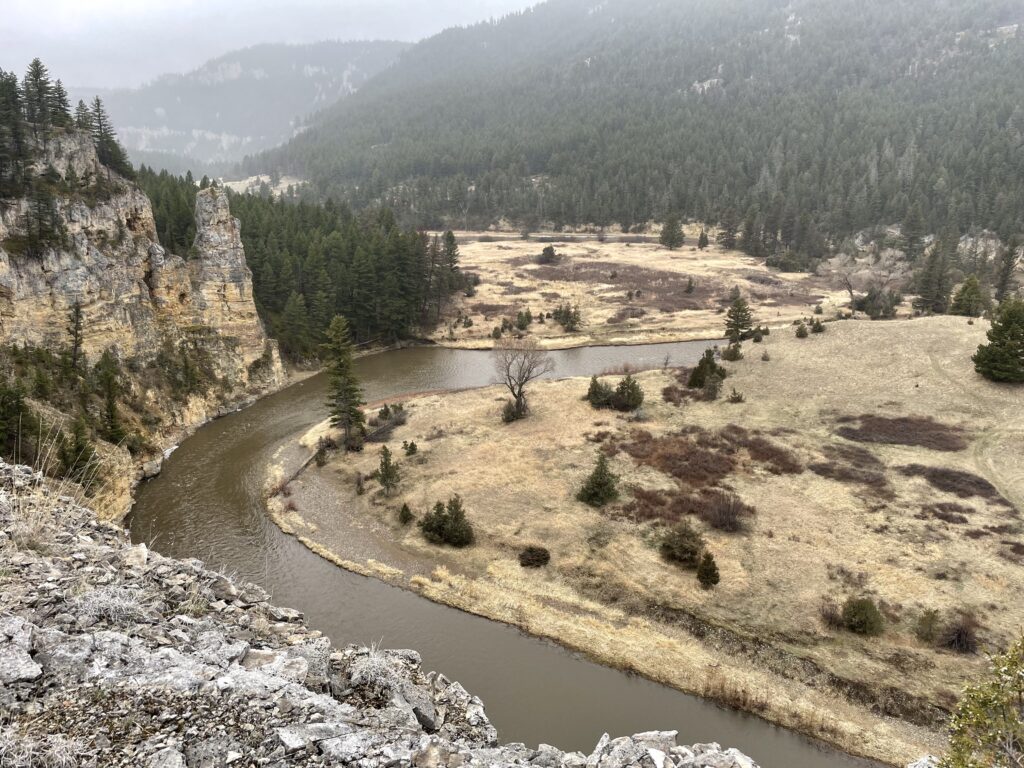
Guest blogger Tess McEnroe is a river conservationist with Idaho Rivers United and shares her recent experiences on Montana’s Smith River.
Taking a Smith River trip in early April is a rite of passage for river runners in Big Sky Country. Our recent trip was just the ninth launch of 2024, kicking off the season with typical Montana spring weather – a slice of teaser sun followed by two solid days of rain and snow, blanketing the canyon and our rafts with three inches of snow and soaking us to the bone for nearly 60 miles.
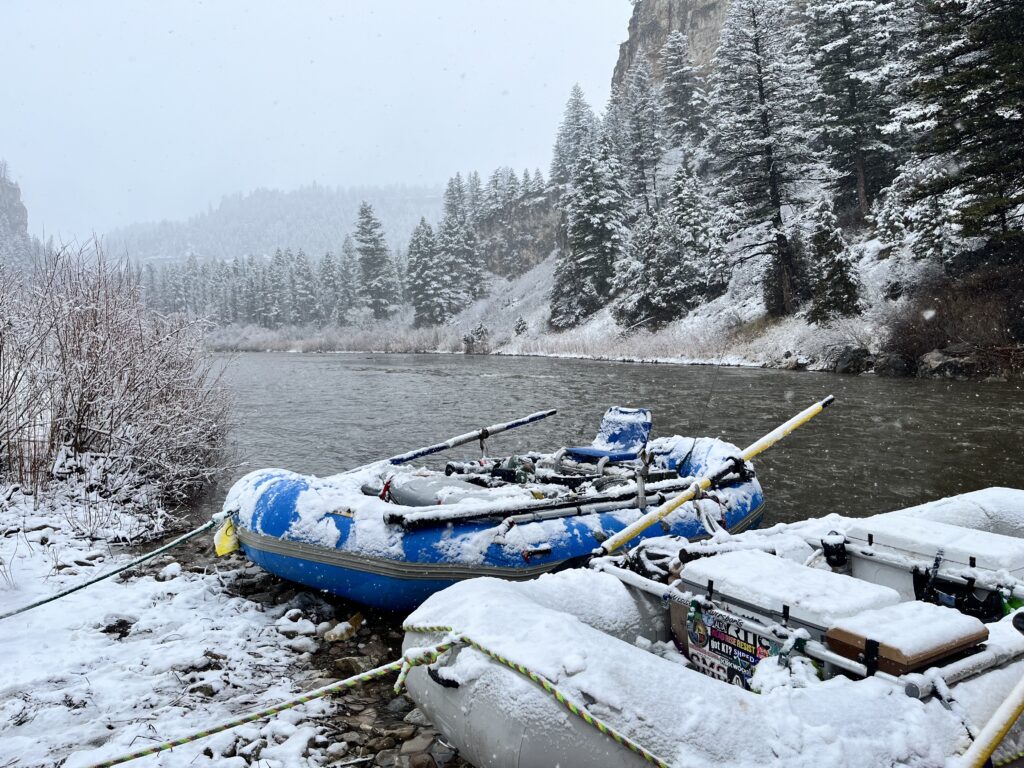
We had heard other stories about early season Smith trips being “stuck at a camp for five days because the river froze over,” or “having to break into a nearby home to warm the kids up.” But as with any good river trip, you laugh, snack, shiver, and imbibe through the frozen feet together. It’s “type two fun” and we would do it again in a minute. We paddle for preservation, just as anglers can cast for conservation, and by doing so we are actively connecting to the natural world while protecting these important wild places for now and future generations.
The Smith River is threatened by the Black Butte Copper Mine, which is being built about 17 miles up Sheep Creek. Sheep Creek is a clear-flowing trout spawning tributary that flows into the Smith at the Camp Baker boat launch, which is about a half hour drive from the small ranching community of White Sulphur Springs.
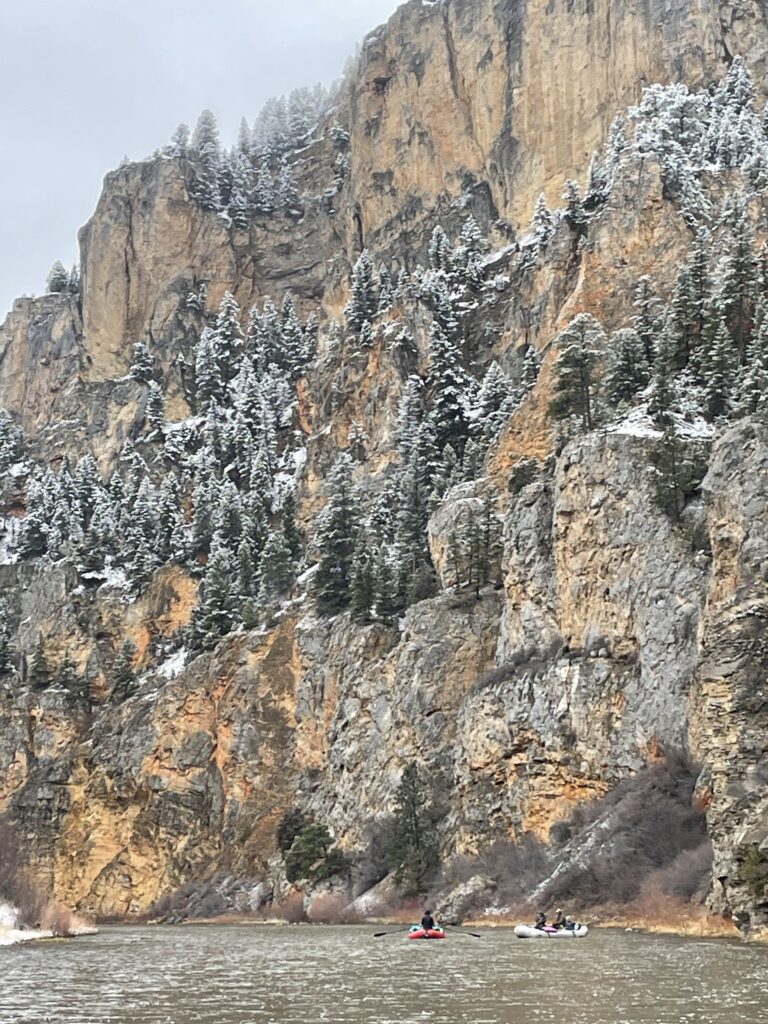
According to Earthjustice, the copper mine would produce nearly 13 million tons of acid-generating waste, threatening water quality and trout populations in Sheep Creek, the Smith River, and eventually the Missouri River, into which the Smith flows. Not only does the Black Butte Mine threaten a world-class wild trout fishery, but the Smith River canyon also has irreplaceable cultural value in the form of over 70 Native American pictograph sites hidden amongst its limestone walls and caves.
The Black Butte Copper Mine was temporarily stopped in April 2022 when a state district court judge ruled in favor of American Rivers and its co-plaintiffs, who argued the Montana Department of Environmental Quality (DEQ) failed to conduct a thorough enough environmental analysis. But last February, the Montana Supreme Court overturned that decision , reinstating the operating permit for the mine.
The battle is not over, however. The mining company still needs to survive another court challenge pertaining to the water rights the mine needs to operate. In late March, the Montana Supreme Court heard oral arguments in that case, and it is expected to issue a ruling by November. In the meantime, conservation groups are urging the Bureau of Land Management and Forest Service to implement a 20-year administrative mineral withdrawal on public lands in the Smith River watershed to ensure that any mining that occurs at the Black Butte Mine doesn’t spread onto the adjacent Helena – Lewis and Clark National Forest.
Another important way to protect the Smith River is through passage of the Montana Headwaters Legacy Act , sponsored by US Senator Jon Tester (D-MT). The MHLA would safeguard 384 miles of Montana’s most prized rivers as Wild and Scenic – including the Smith River and Tenderfoot Creek, its most pristine tributary. This legislation would also protect 18 other waterways in the Greater Yellowstone area, including portions of the Gallatin, Madison, and Yellowstone rivers.
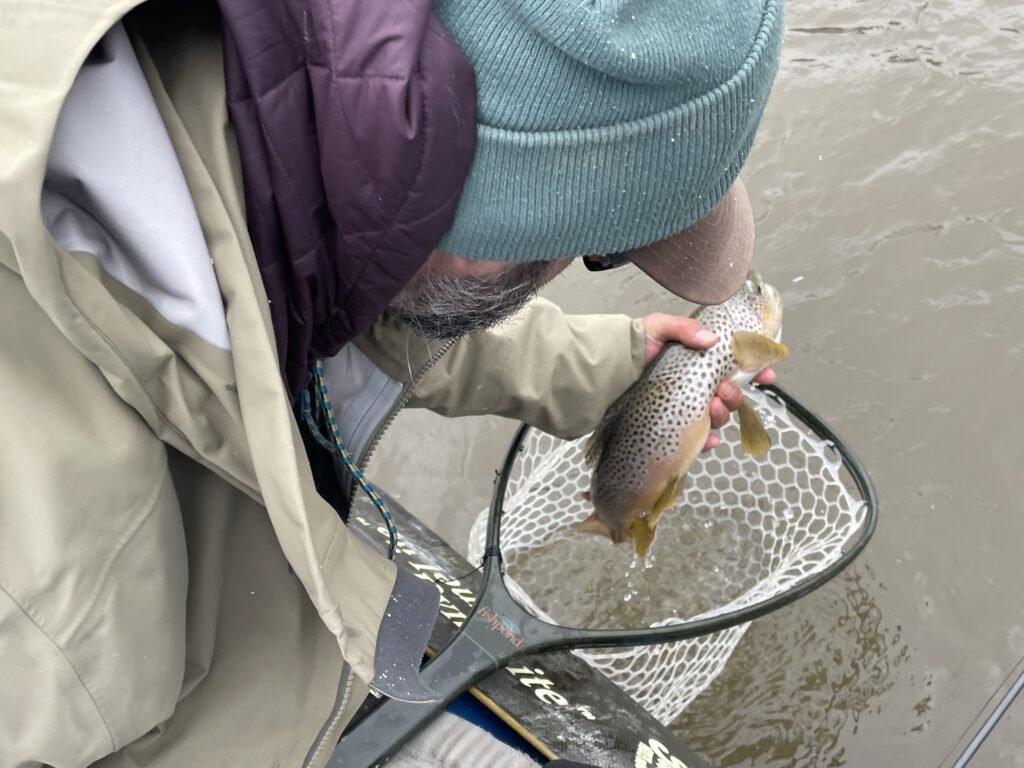
The Smith River clearly deserves to be designated as a Wild and Scenic River and protected in perpetuity. As the only permitted river in Montana, the Smith is unique. It possesses stunning scenery, abundant wildlife, and an exceptional wild trout fishery, which generates over $10 million annually for nearby rural communities. Passing the Montana Headwaters Legacy Act and implementing a mineral withdrawal in the Smith River headwaters are two critical steps needed to protect this remarkable river and preserve the opportunity for others to experience their own snow-covered sufferfest like the one I just endured.
Rivers connect landscapes and humanity – they are the lifeblood of Earth, the pulsing, freshwater arteries of the planet. After floating the Smith this spring, I have a much better understanding of why the Smith is one of our state’s most treasured rivers. Let’s keep it that way.
Tell Senator Daines to support the Montana Headwaters Legacy Act , and sign the Smith River mineral withdrawal petition .
Tess McEnroe is a river conservationist at Idaho Rivers United and has river guided across the west for 18 years. She lives in Missoula, MT along the Clark Fork River.
Leave a reply Cancel reply
Your email address will not be published. Required fields are marked *
Save my name, email, and website in this browser for the next time I comment.
Related Articles
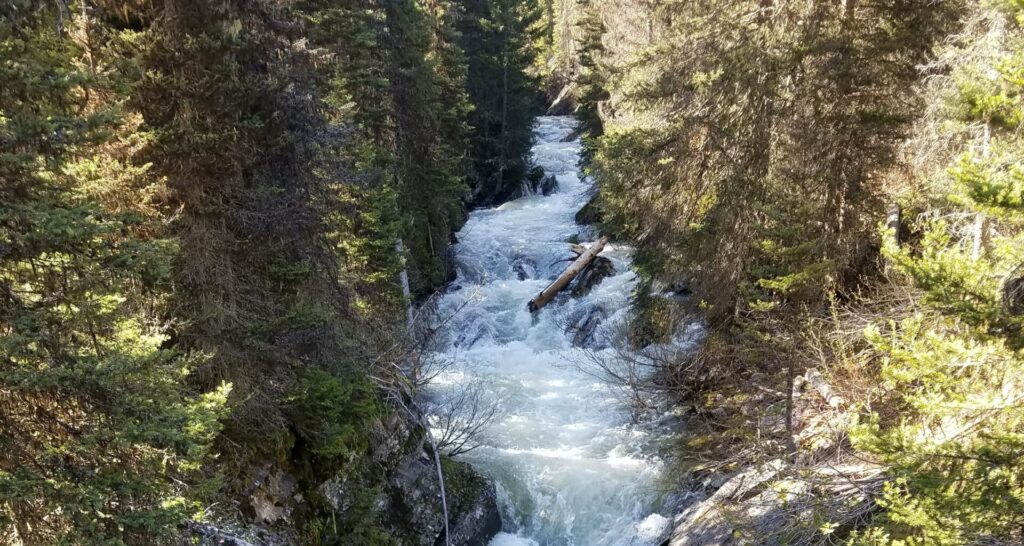
Seven River and Nature Poems
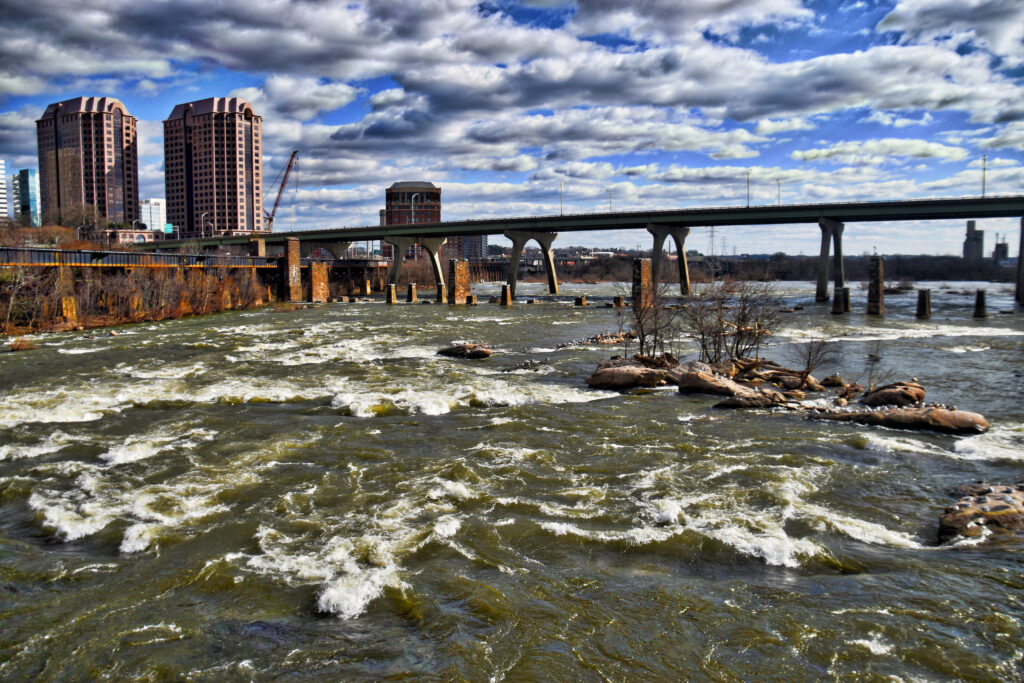
Women’s History Month – Where We Find Motivation
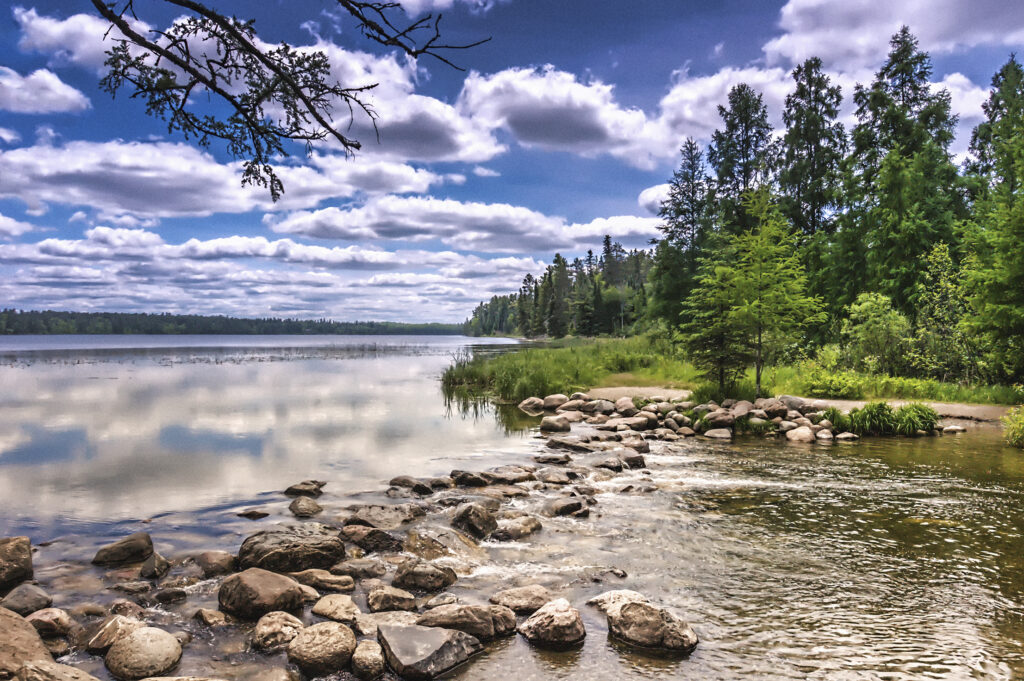
Black History Month River Reflections: Water and Writers


100 Most Famous Poems
The following is a list of the top 100 most famous poems of all time in the English language. There's always room for debate when creating a "top 100" list, and let's face it, fame is a pretty fickle thing. It changes over time. But that said, we did our best to use available objective data in putting together this ranked list of the 100 most widely recognized and enduring poems ever written. To create this list, the following criteria was used: 1) Only poems that have "stood the test of time" were considered. Therefore, modern poetry of the last century was not included. 2) Each poem's ranking is based on its relative fame within the English language. 3) In order to create more even ground for comparison, we have not included in this list nursery rhymes, or poems whose fame was primarily gained from being set to music.
More Lists of Famous Poems
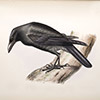
Follow Us On:

- Weird But True
- Sex & Relationships
- Viral Trends
- Human Interest
- Fashion & Beauty
- Food & Drink
latest in Astrology

It's Gemini season, and the dead are trying to communicate —...

Bad trip: Which zodiac signs should never vacation together —...

Are you a Gemini? Everything you need to know about your zodiac...

Doomed to die alone? These birth chart placements hint at...

On National Endangered Species Day, see what wildlife aligns with...

Why May 18 is the luckiest day of the year, according to an...

Bottoms up! Here's the aperitif that aligns with your zodiac sign
Unlock your hidden power: Embrace the secret planetary ruler...
It’s gemini season, and the dead are trying to communicate — here’s how to safely talk back.
- View Author Archive
- Get author RSS feed
Thanks for contacting us. We've received your submission.

Double trouble — it’s Gemini season folks, that hyperverbal, chaos as currency, gossip as cardio, poetry in motion, high-octane time of year when communication and curiosity become our governing tenants.
And it’s not just the living getting loud.
Rachel Stavis , world-renowned exorcist, and best-selling author of “Sister of Darkness: The Chronicles of a Modern Exorcist,” said that Gemini season represents a time when the veil that separates the worlds of the living and the dead grows thin, enhancing and enabling communion between.

Stavis told The Post, “During these times, communication with our deceased loved ones can become stronger and clearer, which can be amazing for those seeking messages from people they’ve lost. It can also be a time when more negative energy comes through as well, so it’s important we take the proper precautions to protect our own energy and keep that vibration high!”
Gemini, represented by the twins, is the sign of duality; dark and light, masculine and feminine, day and night, living and dead.
Stavis explained that the thinning of the veil reflects these dichotomies and the energy cycles of the earth.
“People often associate Halloween with the thinnest veil of the year due to the beginning of the dark season, and though that is true, it’s not the only time this happens. Each year is a little different, and this year, we have a very thin veil occurring right now,” she said.
@rhstavis If your beloved pet has crossed to the other side, please try this to see them again. ❤️ #dogsoftiktok #catsoftiktok #dog #cat #love #joy #spirit #afterlife #heaven #soulmate #medium #mediumship #sister #darkness ♬ original sound – RHStavis
Energy is amplified at this time and as a result, living can feel particularly trying.
“Those who are sensitive to energy fluctuations might notice they’re more anxious, tired, excitable, and less motivated. They might also be having trouble sleeping. It can really take its toll on our bodies and personal energies, but it can also be an exciting opportunity to lean into mediumship skills and get those answers from Spirit,” Stavis said.
Here are her recommendations on how to protect your energy and safely commune with the long gone.
To prepare your home for spiritual visitation, Stavis recommended spreading a mixture of black salt and fennel seeds outside your front door and all windows. To double down on banishing the baddies, you can place the mixture around the entire perimeter of your home,
To draw loving, honest spirits into your space, she suggested placing a vase of roses and sunflowers in each room.
Clean for clarity

Stavis told the Post that to prepare and protect, all reflective surfaces in your home should be cleansed with Four Thieves Vinegar , an ancient blend that clears and invites energy.
To make your own iteration of Four Thieves, Stavis provided the following recipe:
INGREDIENTS:
2 CUPS OF APPLE CIDER OR WHITE WINE VINEGAR
¼ CUP ROSEMARY
¼ CUP LAVENDER
¼ CUP THYME
4 CLOVES GARLIC or 2 TSP GARLIC POWDER
DIRECTIONS: Place all items in a spray bottle. Used together, these herbs combine to make a powerful spiritual cleanser.
Set clear intentions

Once your surfaces are cleansed and before making contact with the dead, Stavis recommended setting clear intentions and boundaries by lighting a white candle and asking yourself the following questions;
WHO DO YOU WANT TO COMMUNICATE WITH?
WHY DO YOU WANT THIS COMMUNICATION?
HOW DO YOU WANT TO RECEIVE THIS COMMUNICATION? (In dreams? By sight? By sound?)
“When you have your answers, spend some time focusing on exactly what you want this communication to be. This intention will radiate through that thin veil, and will be received by Spirit,” she told the Post.
Keep in mind that communication comes in many forms

Stavis stressed the importance of an open mind, keen observation, and a flexible approach,
“Communication comes in all forms, and though deceased people try to send messages in ways that are easiest for you to receive, it doesn’t always come through exactly how you ask. But that doesn’t mean it isn’t coming through! PAY ATTENTION! Notice any: flickering lights, doors opening and closing, feathers and coins, items falling from shelves, whispers, and other out-of-the-ordinary occurrences now.”
Ritual for communing with the dead

Write your deceased loved one’s name on a piece of paper. Keep an item of theirs close by if you have it, along with a photo. Light a white tea light. Take three deep breaths, picture the person in your mind, and then say out loud:
“I am inviting (their name) in during this thin veil. I am hoping to receive your messages, gifts, and visitation now. I would prefer (type of communication), but I am open to receiving in whatever way is best.”
Once you’ve said this, you can add anything personal you want them to know and hear.
Then your job is to pay attention to what comes in. This can take as little as minutes and as long as two full weeks. Watch and listen closely — you may get the message you’ve been waiting for this month.
Astrology 101: Your guide to the star
- The 12 zodiac signs
- What are the astrology houses
- Here’s what each planet represents
- Sun, moon and rising signs: Get to know your Big 3
Astrologer Reda Wigle researches and irreverently reports back on planetary configurations and their effect on each zodiac sign. Her horoscopes integrate history, poetry, pop culture, and personal experience. To book a birth chart reading, contact her via her website.
Share this article:

Advertisement

IMAGES
VIDEO
COMMENTS
Backwaters of Alleppey in the south of India. 1. The Farewell by Kahlil Gibran. Even though the poetry about travel in this list is in no particular order, the first poem I had to think of was The Farewell by Kahlil Gibran (1883-1931). This beautiful poem can be found in Gibran's book The Prophet, which is one of the most translated books in ...
Poems about travel ignite curiosity and leave a longing to embrace the diversity of our planet, fostering a deeper appreciation for the world. ... 'Ravenna' by Oscar Wilde is the poet's recollection of a trip to the culturally and historically important Italian city of Ravenna. ... English. Themes: Nature, Beauty. Emotions: Amusement ...
Song of the Open Road by Walt Whitman. 6. Travel by Edna St. Vincent Millay. 7. On the World by Francis Quarles. 8. Die Slowly by Martha Medeiros. 9. If Once You Have Slept on an Island by Rachel Field.
Poems about Travel - Take a poetry road trip across the United States and abroad with this curated collection of poems about vacation and travel, videos on poetic trips and poets abroad, poetry landmarks, walking tours, featured poetry books for literary travelers, and postcards from poets on summer vacations.
Afoot and light-hearted I take to the open road, Healthy, free, the world before me, The long brown path before me leading me wherever I choose, Henceforth I ask not good-fortune, I myself am good-fortune, Henceforth I whimper no more, postpone no more, need nothing, Done with indoor complaints, libraries, querulous criticisms, Strong and ...
A clear, cold day with a nipping air, Tall, bare trees to run on beside me, A heart that is light and free from care. Then let me go! - I care not whither. My feet may lead, for my spirit shall be. Free as the brook that flows to the river, Free as the river that flows to the sea. Olive Runner.
Table of Contents. If You Were in Cairo by Simon Constam. Viaggiate by Gio Evan. Consolation by Billy Collins. Dislocation by Simon Constam. Learning to Travel by Julene Tripp Weaver. Majorca by John Cooper Clarke. Questions of Travel by Elizabeth Bishop. For the Traveler by John O'Donohue.
Whether you're dreaming of new vistas or hitting the road yourself, here are ten favorite travel poems from JSTOR's digital library, available for free download: "Questions of Travel," Elizabeth Bishop. "Her Island," Rita Dove. "Crossing Boston Harbor," Richard Blanco. "At the Bambi Motel," Elizabeth Spires.
In this article, we will delve into some of the most famous poems about travel, showcasing the power of poetry in capturing the essence of wanderlust and the beauty of the world. Índice. "I Wandered Lonely as a Cloud" by William Wordsworth. "The Road Not Taken" by Robert Frost. "Ode to the West Wind" by Percy Bysshe Shelley.
Along the sea-sands damp and brown. The traveler hastens toward the town, And the tide rises, the tide falls. Darkness settles on roofs and walls, But the sea, the sea in the darkness calls; The little waves, with their soft, white hands, Efface the footprints in the sands, And the tide rises, the tide falls. Memorize Poem.
Without further ado, let's take a look at these unique poems for travelers. Contents hide. If Once You Have Slept On An Island. The Road Not Taken. Hearthside. The Opportune Moment. I Want A Life Measured. Travel Poem (Untitled) The Far North.
A. E. Housman, ' White in the moon the long road lies '. White in the moon the long road lies, The moon stands blank above; White in the moon the long road lies. That leads me from my love. Still hangs the hedge without a gust, Still, still the shadows stay: My feet upon the moonlit dust.
Below are some of the very best poems about transport, travel, movement, and related themes - everything from walking, to driving, to travelling on the Tube. Thomas Traherne, ' Walking '. In terms of having the longest wait for a posthumous poetic reputation to begin, the seventeenth-century poet Thomas Traherne (c. 1637-74) may take ...
Oliver Runner's poem about adventure captures so much of what drives every traveler. The sense of untethered wandering, free to go where the road may lead. As long as we're treading new ground and experiencing new places, we're at our happiest. 4. For the Traveller - John O'Donohue.
Travel Poem 7. "The Lake Isle of Innisfree" - W. B. Yeats. W. B. Yeats might have had a bit of a creepy personal life, but his travel poem "The Lake Isle of Innisfree" deeply speaks to me. For instance, I love huge international cities, but it's not exactly a secret that I'm not a fan of hustle and bustle.
1. Wanderlust. Wanderlust, a term that perfectly captures the insatiable desire to explore, is a common theme in travel poetry. This short poem by Langston Hughes beautifully encapsulates the yearning for adventure: I tire of visiting places. Of which I tire. So I leave them. For the places. Of which I never tire.
Below are ten of the greatest poems about roads in all of English literature, each of which does something rather different with the road or track it presents to us. 1. John Clare, ' On a Lane in Spring '. A Little Lane, the brook runs close beside. And spangles in the sunshine while the fish glide swiftly by.
Read Poem. Dreams That Travel From The Past Ronald Strickland. If when i left I did not say goodbye, It was because i kept you at my side. when at night I dream the dreams are with you. When in my dreams and thoughts I travel in my life with families and friends that I praise.
The Enchanted Traveller by Bliss Carman. Pioneers! O Pioneers! by Walt Whitman. The Pioneers by Hannah Flagg Gould. Birch and Paddle by Sir Charles George Douglas Roberts. Columbus by Helen L. Smith. Butterfly Adventure by Hilda Conkling. Fierce Adventures by Annette Wynne. A Norse Lad by Oscar H. Roesner.
Bringing you the best in poetry. "I've had a vacation," said Timothy Brown; "A fine one, although I have not left the town. I merely vacated my worries and fears, And at once became younger by fairly five years. I vacated my ruts, and began to enjoy My regular, humdrum, but useful employ. I changed my whole outlook and vision of life, And made it a pastime instead of a strife.
The Earliest English Poems Ever Written. 10 Greatest Novels Ever Written. 10 Greatest Poems about Death: A Grim Reader. . 10. "The Road Not Taken" by Robert Frost (1874-1963) Two roads diverged in a yellow wood, And sorry I could not travel both. And be one traveler, long I stood.
Wang and Thang went on a field trip to the Farmer's Mill, When they got there Thang told Wang, "man there's nothing here to steal, Wang says "hey let's climb this ladder to get some hay", Thang replies, "climb that ladder all the way up there just to get hay, no way", Farmer asks, "Hey you two what you're doing over there,
From fearful trip the victor ship comes in with object won; Exult O shores, and ring O bells! ... Anybody slightly familiar with English poetry will instantly recognize the name Lord Byron—and ...
Taking a Smith River trip in early April is a rite of passage for river runners in Big Sky Country. Our recent trip was just the ninth launch of 2024, kicking off the season with typical Montana spring weather - a slice of teaser sun followed by two solid days of rain and snow, blanketing the canyon and our rafts with three inches of snow and ...
Teachers will gain confidence in their own skills as readers of poetry and learn strategies for engaging their students in reading poetry. Willie Perdomo is the author ofThe Crazy Bunch and The Essential Hits of Shorty Bon Bon, among others. A finalist for the National Book Critics Circle Award, he currently teaches English at Phillips Exeter ...
100 Most Famous Poems Home Poems 100 Most Famous Poems. The following is a list of the top 100 most famous poems of all time in the English language. There's always room for debate when creating a "top 100" list, and let's face it, fame is a pretty fickle thing. It changes over time.
Double trouble — it's Gemini season 2024 folks, that hyperverbal, chaos as currency, gossip as cardio, poetry in motion, high-octane time of year when communication and curiosity become our ...
Rescuers are searching for a helicopter that crashed while carrying Iranian President Ebrahim Raisi in northern Iran, according to Iranian officials. Raisi's condition and that of Iranian ...